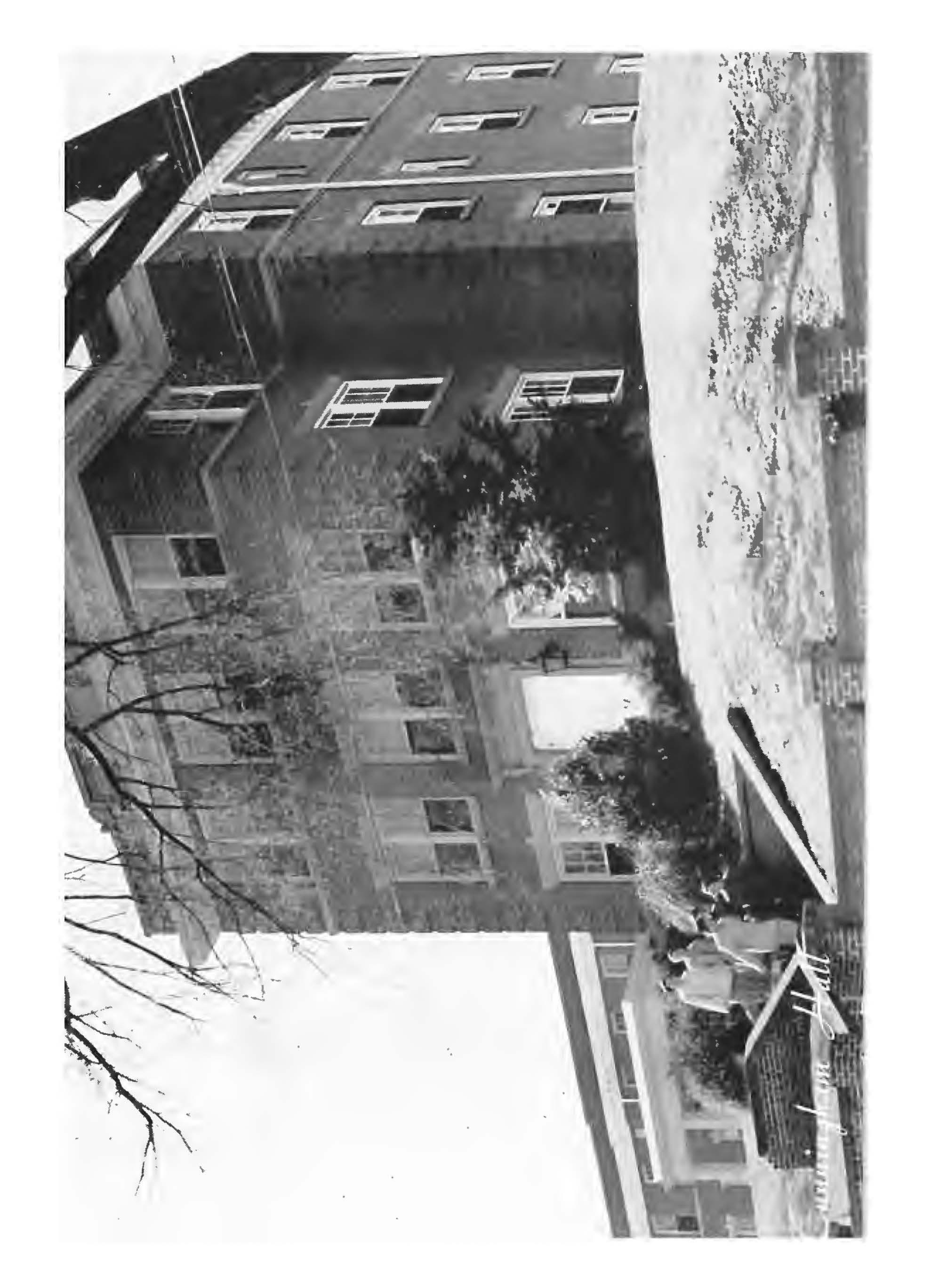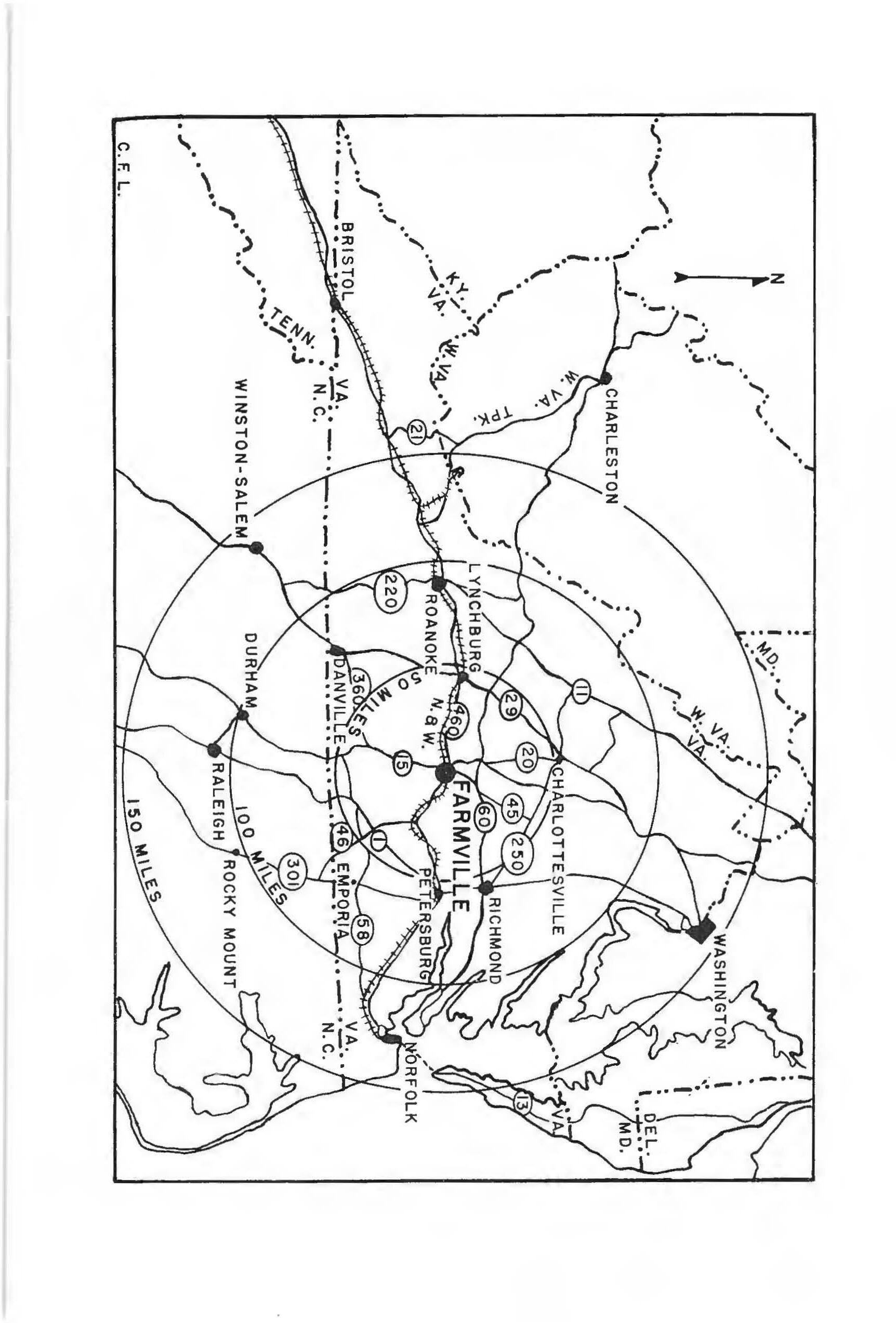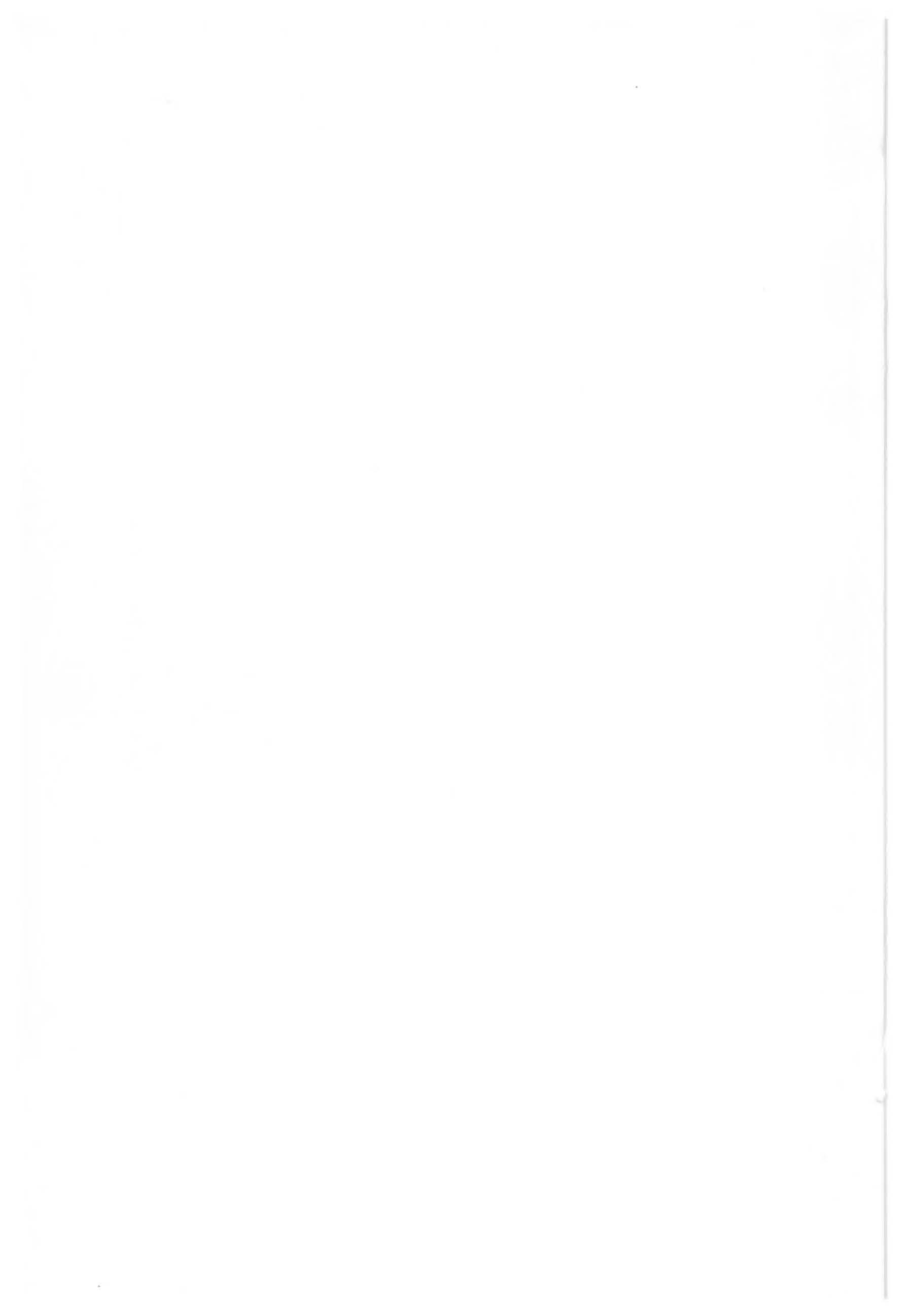





Announcements, Session 1959-60
Virginia's First State College for Women
Accredited by : Southem Association of Colleges and Secondary Schools, -National Council for Accreditation of Teacher Education, Virginia State Board of Education.
Seventy-sixth session begins September 13, 1959
NUMBER 2
APRIL, 1959
Published quarterly by Longwood College, Farmville, Va. Second class malling privilege authorized at Farmville, Va.
1959
SEPTEMBER
SMTWTFS
I 2 3 4 5 6 7 8 9 10 11 12 13 14 15 16 17 18 19 20 21 22 23 24 25 26 27 28 29 30
OCTOBER
SMTWTFS I 2 3 4 5 6 7 8 9 10 II 12 13 14 15 16 17 18 19 20 21 22 23 24 25 26 27 28 29 30 31
NOVEMBER
SMTWTFS 1234567 8 9 10 11 12 13 14 15 16 17 1g 19 20 21 22 23 24 25 26 27 28 29 30
DECEMBER
SMTWTFS I 2 3 4 5 6 7 8 9 10 11 12 13 14 15 16 17 18 19 20 21 22 23 24 25 26 27 28 29 30 3 I 1960 JANUARY
SMTWTFS I 2 3 4 5 6 7 8 9 IO II 12 13 14 15 I 6 17 18 19 20 21 22 23 24 25 26 27 28 29 30 3 I
FEBRUARY
SMTWTFS 123456 7 8 9 10 11 12 13 14 15 16 17 18 19 20 21 22 23 24 25 26 27 28 29
Septem~er 13-Sunday-Freshmen and transfer students arnve.
September 14-Monday-Orientation program begins for new students.
September 16 Wednesday Freshmen register for classes.
September 17 Thursday Sophomores, juniors, and seniors make schedule changes.
September 18 Friday Fall classes begin at 8 :OS a.m.
October 2 Friday Last day on which changes in class schedules of students may be made.
November 25 Wednesday Thanksgiving holiday begins at 11 :SO a.m. November 30 Monday Classes are resumed at 8:05 a.m.
December 17 Thursday Christmas holiday begins at 11 :SO a.m.
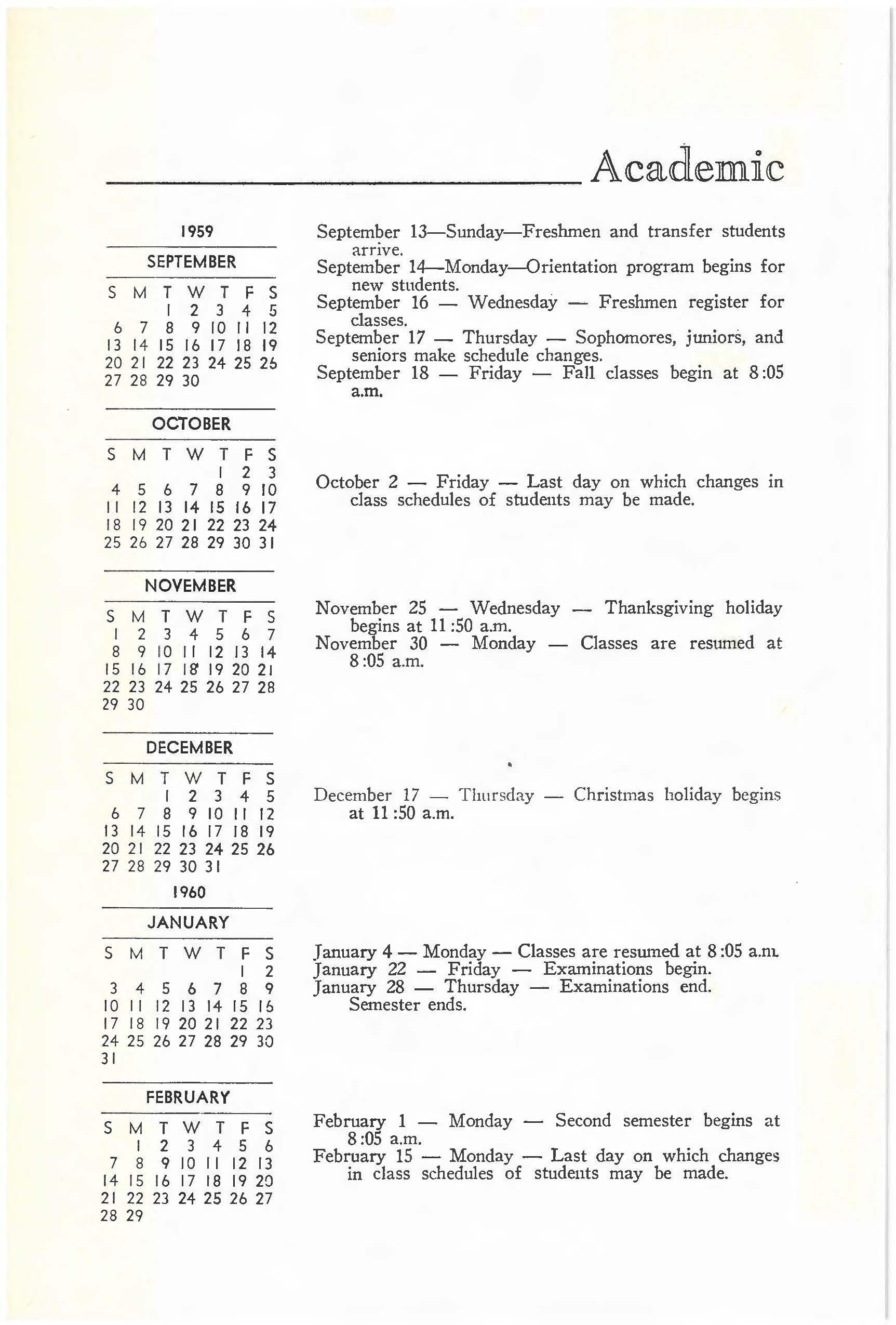
January 4 Monday Classes are resumed at 8 :OS a.m January 22 Friday Examinations begin. January 28 Thursday Examinations end. Semester ends.
February 1 Monday Second semester begins at 8:05 a.m.
February 15 Monday Last day on which changes in class schedules of students may be made.
· March 12 Saturday Founders Day.
April 14 Thursday Easter vacation begins at 11 :50 a.m.

April 19 Tuesday Classes are resumed at 8 :OS a.m.
1960
MARCH
SMTWTFS
I 2 3 4 5
6 7 8 9 10 11 12 13 14 15 16 17 18 19 20 21 22 23 24 25 26 27 28 29 30 31
APRIL
SMTWTFS I 2 3456789 10 11 12 13 14 15 lo 17 18 19 20 21 22 23 24 25 26 27 28 29 30
May 21 Saturday Examinations begin.
May 27 Friday Examinations end.
May 28 Saturday Class Day exercises.
May 29 Sunday Baccalaureate Sermon.
May 29 Sunday Graduation exercises. Semester ends.
June 19 Sunday Summer Session begins. Dormitories open.
June 20 Monday Registration of students.
June 21 Tuesday Classes begin.
August 13 Saturday Summer Session ends
MAY SMTWTFS 1234567 891011121314 15 16 17 18 19 20 21 22 23 24 25 26 27 2g 29 30 31
JUNE
SMTWTFS I 2 3 4 5 6 7 8 9 10 11 12 13 14 15 16 17 18 19 20 21 22 23 24 25 26 27 28 29 30
JULY
SMTWTFS I 2 3456789 10 II 12 13 14 15 16 17 18 19 20 21 22 23 24 25 26 27 28 29 30 3 I
AUGUST
SMTWTFS 123456
7 8 9 10 11 12 I 3 14 15 16 17 18 19 20 21 22 23 24 25 26 27 28 29 30 31
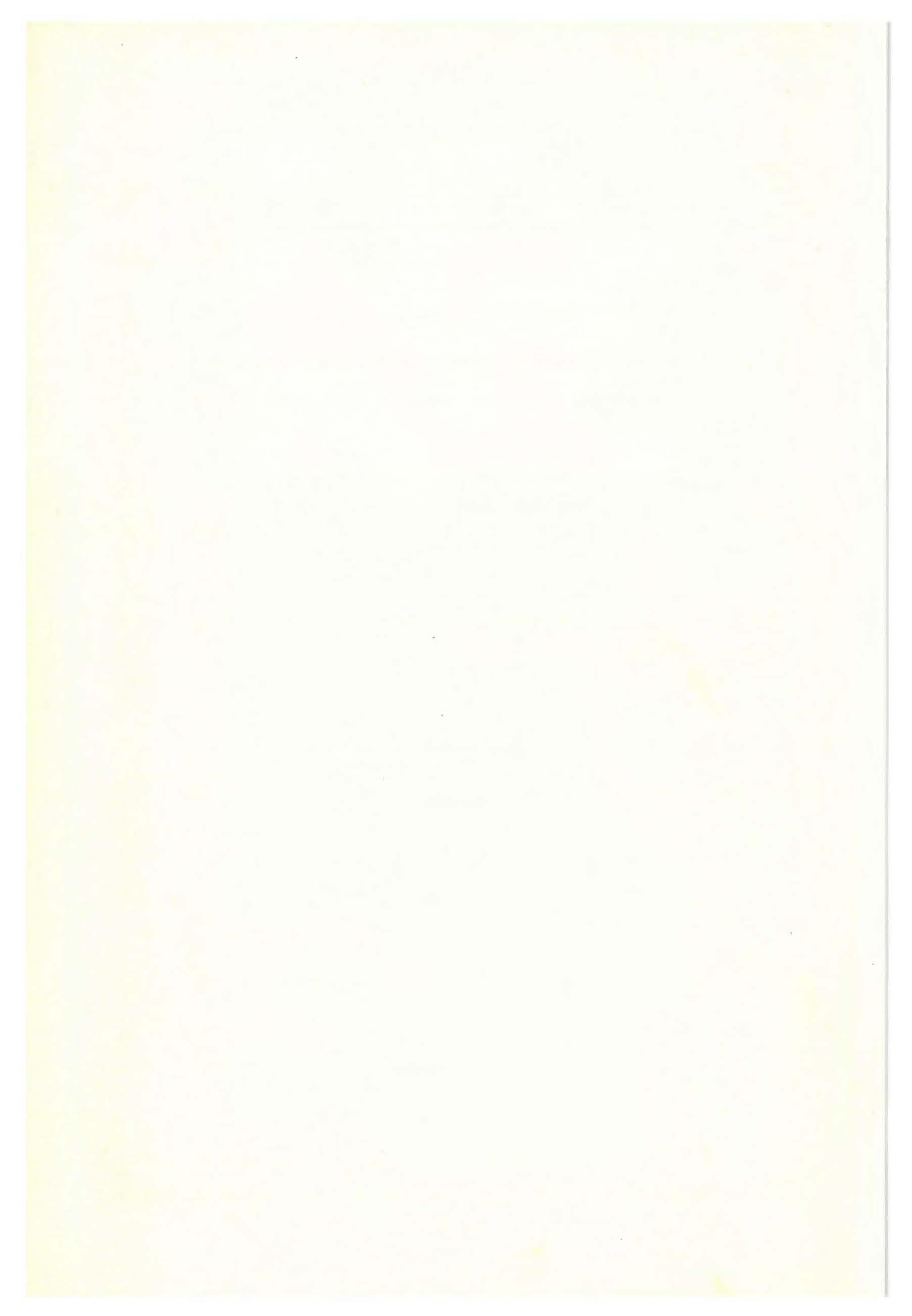
The State Board of Education of the Commonwealth of Virginia is the governing board of Longwood College.
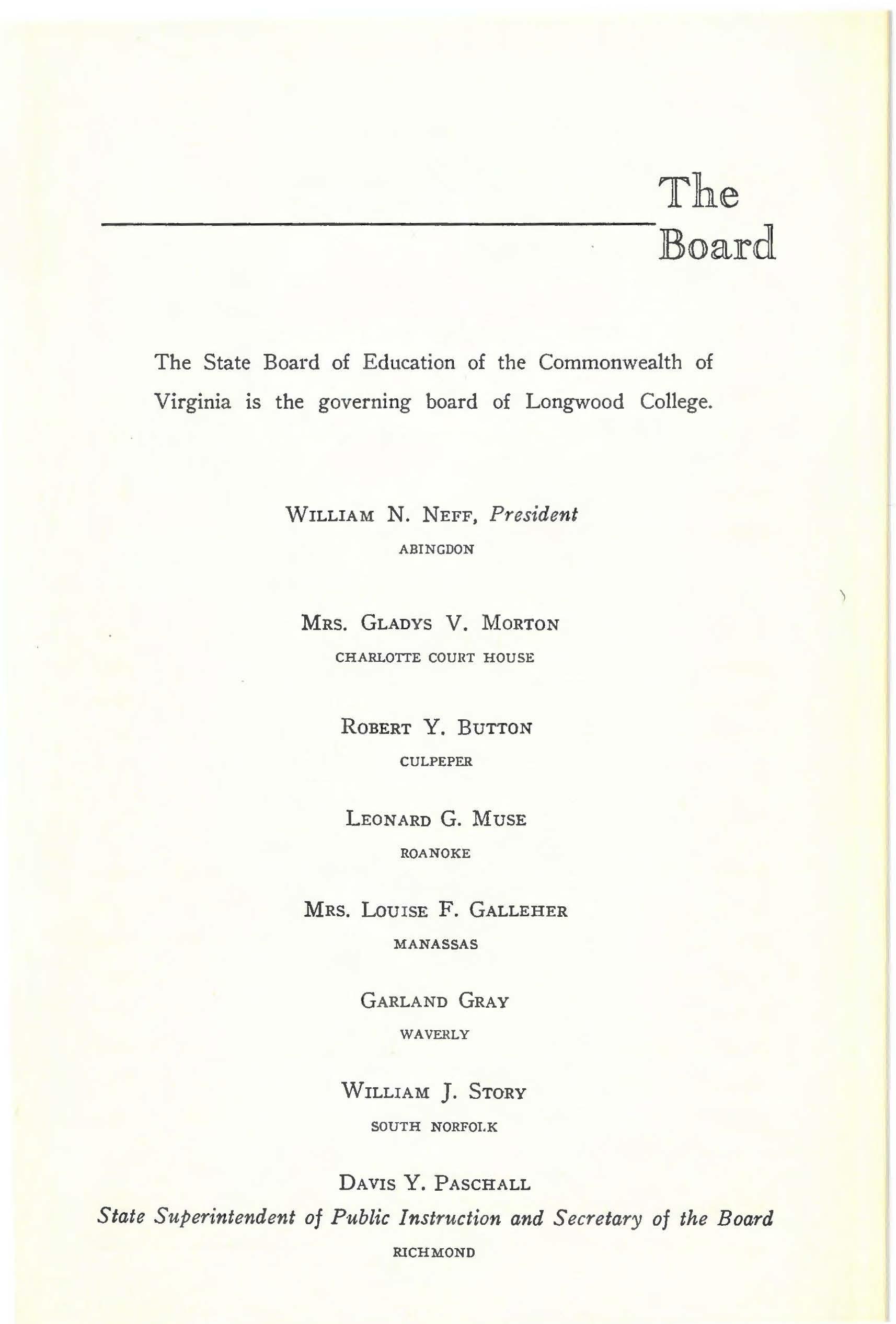
WILLIAM N. NEFF, President ABINGDON MRS. GLADYS V. MORTON CHARLOITE COURT HOUSE ROBERT Y. BUTTON CULPEPER
LEONARD G. MusE ROANOKE
MRS. LOUISE F. GALLEHER MANASSAS
GARLAND GRAY WAVERLY
WILLIAM J. STORY SOUTH NORFOLK
DAVIS Y. PASCHALL
State Superintendent of Public Instruction and Secretary of the Board, RICHMOND
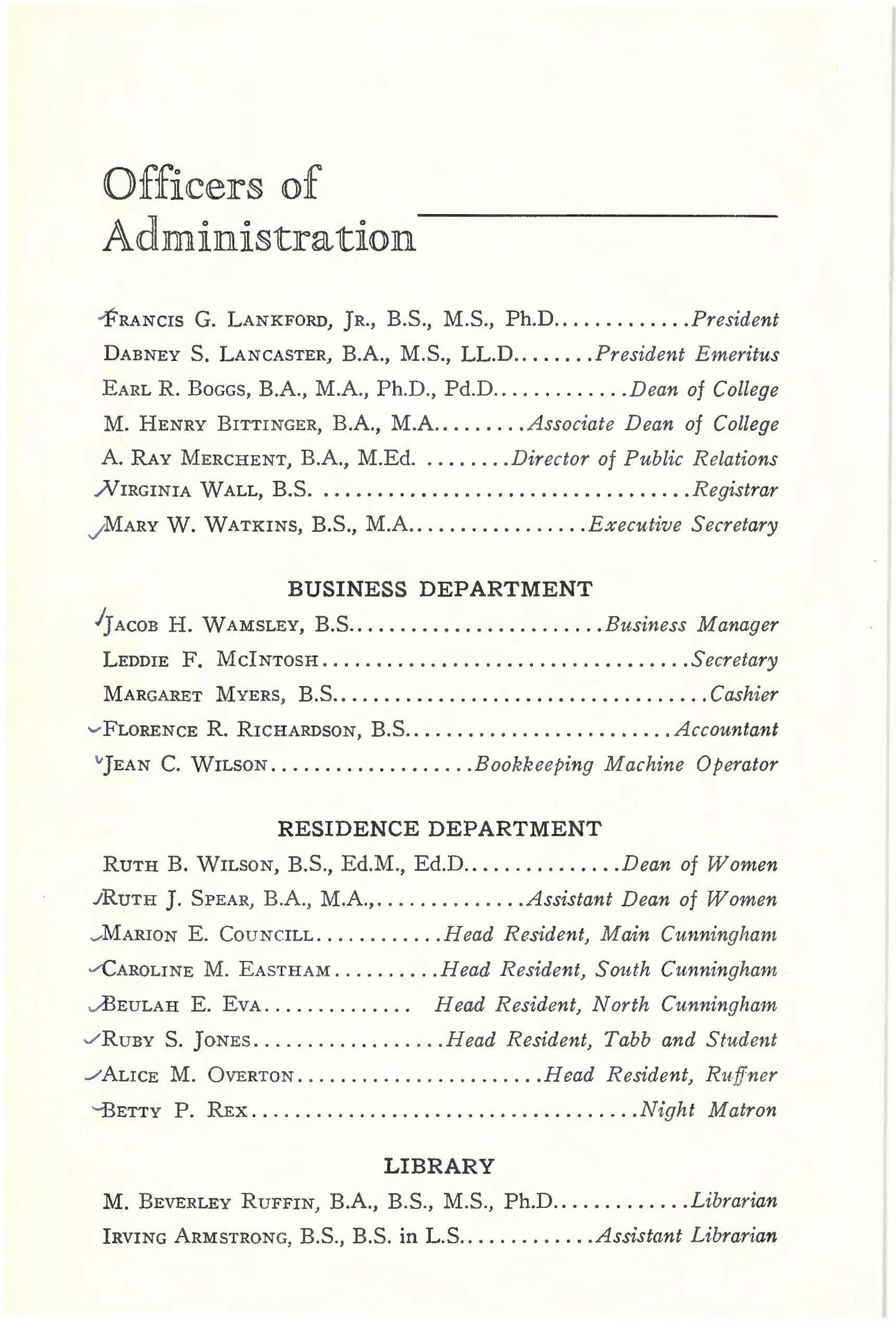
-FRANCIS G. LANKFORD, JR., B.S ., M.S., Ph.D . .. ......... . Pr esid ent
DABNEY S. LANCASTER, B.A., M.S., LL.D .. . .... . President Emeritus
EARL R. BoGGS, B.A., M.A., Ph.D., Pd.D Dean of College M. HENRY BITTINGER, B.A., M.A Associat e Dean of College A. RAY MERCHENT, B.A., M .Ed........ . Dir ector of Public R elations ;\TIRGINIA WALL, B.S R egistrar W. WATKINS, B.S., M.A ................ . Executive S ecretary
/JACOB H. WAMSLEY, B.S • Business Manager LEDDIE F. McINTOSH ................................. . Secretary MARGARET MYERS, B.S ................................... Cashier ,.... FLORENCE R. RICHARDSON, B.S Accountant "JEAN C. WILSON .. .. .............. . Bookke eping Machine Operator
RUTH B. WILSON, B.S., Ed .M., Ed.D .............. Dean of Women /RUTH J. SPEAR, B.A., M.A., ........ .. ... . Assistant Dean of Women __ MARION E. Co u NCILL ....... ... . . Head Resident, Main Cunningham ./(:AROLINE M. EASTHAM . .. ...... . Head Resident, South Cunningham ....£EULAH E. EvA......... Head Resident, North Cunningham S. JONES ............... .. . Head Resident, Tabb and St u d ent ../ALICE M. OVERTON ...................... . Head Resident, Ru ff n er --BETTY P. REX ................................... . Night Matron
M. BEVERLEY RuFFIN, B.A., B.S., M.S., Ph.D ............ Librarian
IRVING ARMSTRONG, B.S., B.S. in L.S ...... . ..... Assistant Librarian
MARTHA H. LESTOURGEON, B.S., M.A. .....•.•••• Library Assistant
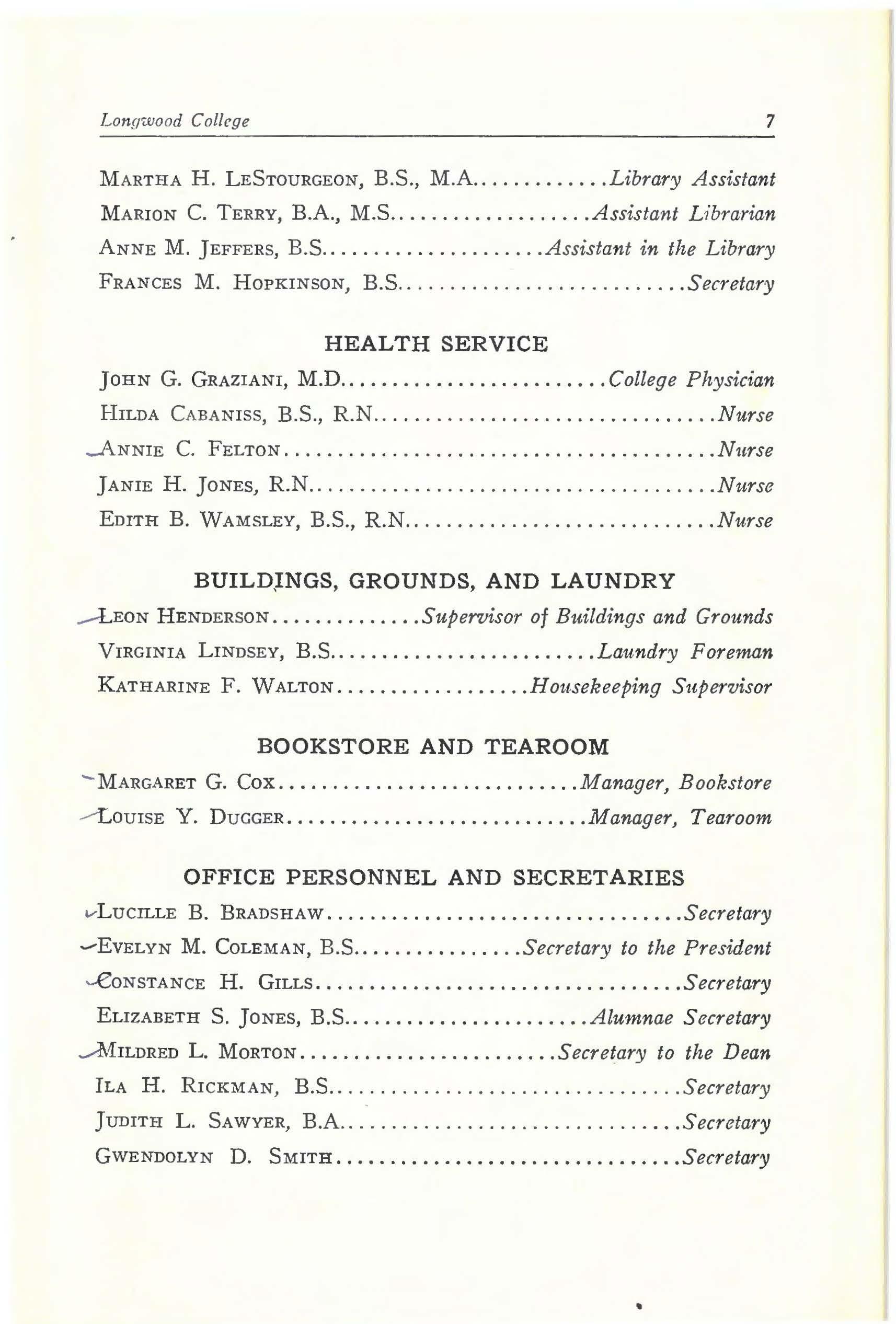
MARION C. TERRY, B.A., M.S Assistant Librarian
ANNE M. JEFFERS, B.S ...•..•..•......... Assistant in the Library
FRANCES M. HOPKINSON, B.S Secretary
JOHN G. GRAZIANI, M.D ..•••.•..••.....•••..•••• College Physician
HILDA CABANISS, B.S., R.N Nurse _A NNIE C. FELTON .........•......•.........•...•....•... Nurse
JANIE H. JONES, R.N Nurse
B. WAMSLEY, B.S., R.N
Nurse
FRANCIS G. LANKFORD, JR., B.S., M.S., Ph.D President B.S., Randolph-Macon College; M.S., Ph.D., University of Virginia.

DABNEY S. LANCASTER, B.A .., M.S., LL.D ........ President Emeritus B.A., University of Virginia; M.S., Virginia Polytechnic Institute; LL D., University of Richmond.
Lucy GORDON ADAMS, B.S., M.A., Assistant Professor of Education and Principal of the Farmville Elementary School B.S., Longwood College; M.A., Teachers College, Columbia University.
ANNA KATHERINE APPLEGATE, A.B., Instructor in English and Speech A.B., Indiana University.
/4NNE IRVING ARMSTRONG, B.S., B.S. in L.S., Assistant Librarian B.S., Longwood College; B.S. in L.S., University of North Carolina.
,.....BLANCHE C. BADGER, A.B., M.A., Ph.D., Associate Professor of Mathematics A.B., Winthrop College; M.A., University of Tennesse e; Ph.D., George Peabody College for Teachers.
JOSEPHINE L. BAILEY, B.S., B.M., M.M., Assistant Professor of Mttsic B.S., Johns Hopkins University; B.M., M.M., Peabody Conservatory of Music.
~MILY BARKSDALE, B.A., M.A., Associate Professor of Modern Language s B.A., Randol ph-Macon Woman's College; M.A., Universidad Nacional de Mexico
....VIRGINIA BEDFORD, B.S ., M.A., Associate Professor of Art B.S., University of Missouri; M.A., Teachers College, Columbia University.
LORA M. BERNARD, B.S., M.S., Assistant Professor of Home Economics B.S., Carson-Newman College; M.S., University of Tennessee.
vM. HENRY BITTINGER, B.A., M.A., Associate Professor of History and Social Sciences and Associate Dean of the College B.A., Hampden-Sydney College; M.A., University of Virginia .
.;EARL R. BoGGS, B.A., M.A., Ph.D., Pd .D., Professor of Editcation and Dean of the College B.A., Glenville State College; M.A., West Virginia University; Ph.D., George Peabody College for Teachers ; Pd.D., Morris Harvey College.
REBECCA L. BROCKENBROUGH, B.A., M.A., Associa.te Professor of Physical and Health Education B.A., Westhampton College; M.A., Teachers College, Columbia University.
RICHARD B. BROOKS, B.P.E., M.A., Associate Professor of Education B.P.E., Springfield 'College; M.A., University of Pennsylvania.
ROBERT T. BRUMFIELD, B.S., M.A., Ph.D., Professor of Biology B.S ., Hampden-Sydney College; M .A., University of Virginia; Ph.D., Yale University.
.....£LIZABETH BURGER, B.S., M.A., Associate Professor of Science B.S., M.A., College of William and Mary.
EMILY CLARKE, B.S., M.A., Associate Professor .of Music B.S., Johns Hopkins University; M.A., Teachers College, Columbia University.
S. V. Cm.LEY, B.A., M.A., Principal of the Farmville High School B.A., Abilene Christian College; M.A., Texas Technological College. .,.-KATHLEEN G. COVER, B.A., M.A., Associate Professor of History and Social Sciences B.A., Randolph-Macon Woman's College; M.A., College of William and Mary.
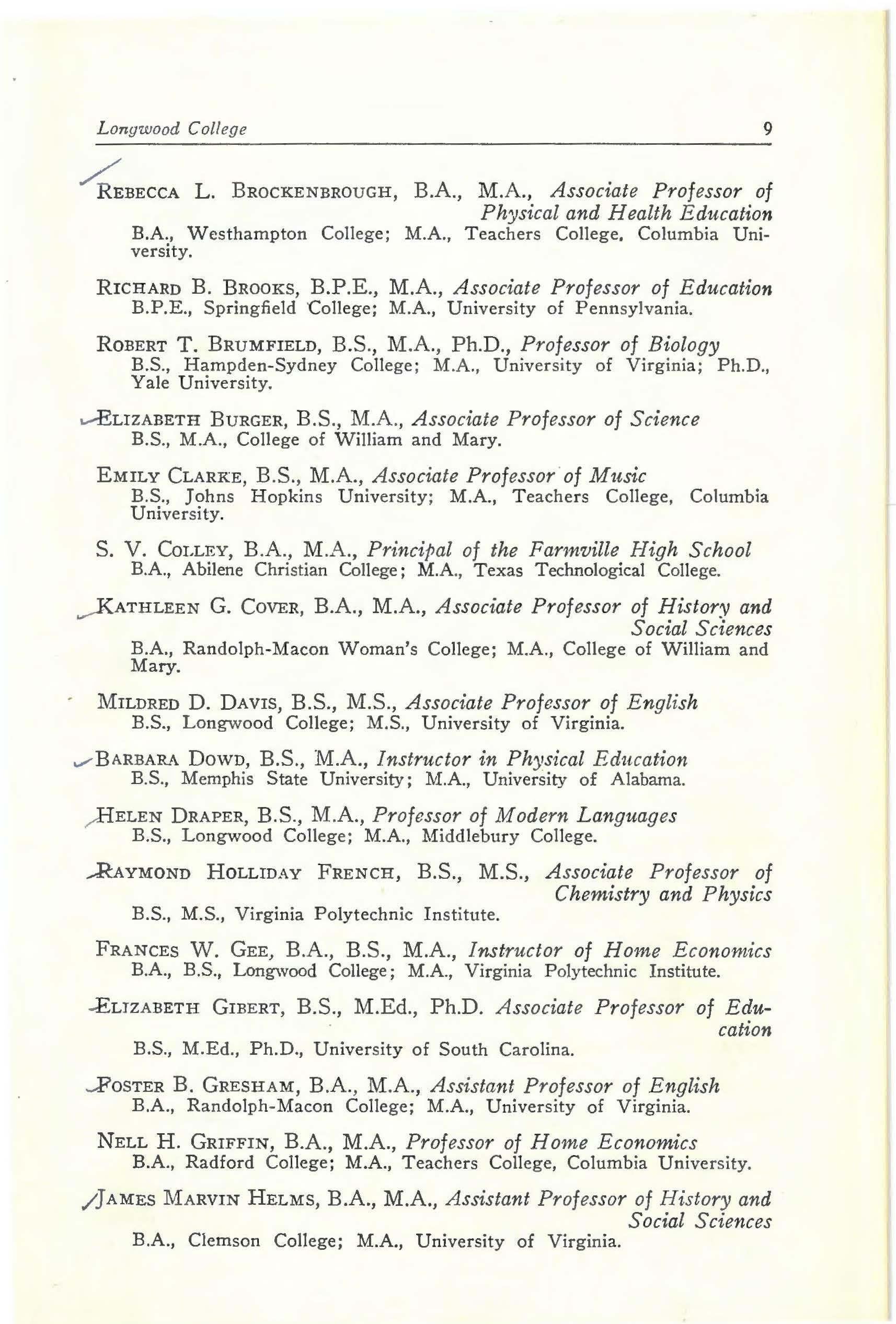
MILDRED D. DAVIS, B.S., M.S., Associate Professor of English B.S., Longwood College; M.S., University of Virginia . ..,.,.
BARBARA Down, B.S., M.A., Instructor in Physical Education B.S., Memphis State University; M.A., University of Alabama
.,,HELEN DRAPER, B.S., M.A., Professor of Modern Languages B.S., Longwood College; M.A., Middlebury College
...RAYMOND HOLLIDAY FRENCH, B.S., M.S., Associate Professor of B.S., M.S., Virginia Polytechnic Institute. Chemistry and Physics
FRANCES W. GEE, B.A., B.S., M.A., Instructor of Home Economics B.A., B.S., Longwood College; M.A., Virginia Polytechnic Institute.
--ELIZABETH GIBERT, B.S., M.Ed., Ph.D. Associate Professor of Education B.S., M.Ed., Ph.D., University of South Carolina
...FOSTER B. GRESHAM, B.A., M.A., Assistant Professor of English B.A., Randolph-Macon College; M.A., University of Virginia.
NELL H. GRIFFIN, B.A., M.A., Professor of Home Economics B.A., Radford College; M.A., Teachers College, Columbia University
/JAMES MARVIN HELMS, B.A., M.A., Assistant Professor of History and Social Sciences B.A., Clemson College; M.A., University of Virginia.
v
..,OLIVET. ILER, B.S., M.A., Associate Professor of Physical and Health Education Graduate, Sargent School of Physical Education; B.S., Longwood College; M.A., Teachers College, Columbia University.
--GEORGE W. JEFFERS, B.S., M.A., Ph.D., Professor of Biology B.S., M.A., Boston University; Ph.D., University of Toronto.
J EDGAR M. JOHNSON, B.A., B.D., M.A., Ed.D., Professor of Editcation and Director of the Bureau of Teaching Materials B.A., University of Richmond; B.D., Yale University; M.A., Ed.D., Teachers College, Columbia University.
~ARY A. F. KEMBLE, B.S., M.S., Assistant Professor of Music B.S. in Public School Music, Mansfield State Teachers College; M.S. in Music Education, University of Pennsylvania.
JOHN P. KENNEDY, B.A., M.A., Instructor in History and Social Sciences B.A., M.A., Emory University.
/ EMILY K. LANDRUM, B.S., M.A., Associate Professor of Physical and Health Education B.S., University of Illinois; M.A., Teachers College, Columbia University.
-.1 MERLE L. LANDRUM, B.S., M.A., Ed.D., Professor of Business Education B.S., Columbus Business University, Columbus, Ohio; M.A., New York University; Ed.D., Indiana University.
J CHARLES F. LANE, B.A., M.S., Ph.D., Professor of Geography and Geology B.A., M.S., University of Tennessee; Ph.D., Northwestern University.
/WILLARD GLENN LEEPER, B.S., M.Ed., Assistant Professor of Business Education B.S., Longwood College; M.Ed., University of Florida.
SPEER LEMEN, B.S., M.A., Associate Professor of Art B.S , Southeast Missouri State College; M.A., George Peabody College for Teachers.
MARTHA H. LESTOURGEON, B.S., M.A., Library Assistant B.S., Longwood College; M.A., George Peabody College for Teachers.

,;JAMES K. McCoMBS, B.M., M.M., M.A., Assistant Professor of Music B.M., M.M., Mississippi Southern College; M.A., Teachers College, Columbia University
.JTHOMAS A. McCoRKLE, B.A., M.S., Professor of Chemistry and Physics B.A., Washington and Lee University; M.S., University of Chicago.
JOSEPHINE H. MAGNIFICO, A.B., M.Ed., Assistant Professor of Mathematics A.B., Mary Baldwin College; M.Ed., University of Virginia.
RICHARD K. MEEKER, B.A., M.A., Ph.D., Associate Professor of Eng lish B.A ., Lafayette College; M.A., Ph.D., University of Pennsylvania . ,..,.ROBERT E. MERRITT, B.A. M.S., Assistant Professor of Biology B.A., New York State College for Teachers, Albany; M.S ., Cornell University.

/ JOHN W. M~L~AR, ~.Mus., B. Sc., M.Ed:, Ed.D., Professor of Mu~c B.Mus., Cmcmnatt Conservatory of Music; B.Sc., M.Ed., Ed.D., University of Cincinnati. _,,, C. G. GORDON Moss, B.A., M.A., Ph.D., Professor of History and .,, Social Sciences B.A., Washington and Lee University; M.A., Ph.D., Yale University ..,..--NORMAN 0. MYERS, B.S., Ed.M., Associate Professor of Business Education B.S., Grove City College; Ed.M., University of Pittsburgh.
MARY NICHOLS, B.S. , M.S., Associate Professor of English B.S., Longwood College ; M.S., University of Virginia . ......-\i\TILLIAM A. NOBLE, B.A., M.A., Instructor in History and Social Sciences B.A., Emory University; M.A., University of Georgia ../ CHARLES H. PATTERSON, JR., B.S., M.A., Associate Professor of Education B.S., M.A., University of Virginia . .,....
JESSIE ANDERS PATTERSON, A.B., B.S., M.A., Associate Professor of Music A.B., Oberlin College; B.S., M.A., New York University.
BARBARA B. POLLARD, B.A., Instructor in English B.A., Westhampton College. · ...-ANNIE LEE Ross, B.F.A., M.A., Assistant Professor of Art B.F.A., Bethany College; M.A., Ohio State University.
M. BEVERLEY RuFFIN, B.A., B.S., M.S., Ph.D., Librarian and Professor of Library Science B.A., College of William and Mary; B.S., M .S., Columbia University; Ph.D., University of Chicago.
DOROTHY SCHLEGEL, B.A., M.A., Ph.D., Associate Professor of English B.A., Dickinson College; M.A., College of William and Mary; Ph.D., University of North Carolina.
MARVIN W. SCHLEGEL, B.A., M.A., Ph.D., Professor of History and Social Sciences B.A., Susquehanna University; M.A., Ph.D ., Columbia University.
FRANCIS BUTLER SIMKINS, B.A., M.A., Ph.D., Professor of History ,/ and Social Sciences B.A., University of South Carolina; M.A., Ph.D., Columbia University. v-RINALDO C. SIMO NINI, JR., B.A., M.A., Ph.D., Professor of English B.A., Johns Hopkins University; M.A., Ph.D., University of North Carolina.
Bitlletin of
..--CLIFFORD SMITH, B.S., M.Ed., Assistant Professor of ·Music B.S., Indiana State Teachers College; M.Ed., Pennsylvania State University.
*CHRISTY SNEAD, B.A., M.A., Assistant Professor of Business Education B.A., Bowling Green Business University; M.A., University of Kentucky.
EDGAR F. STILLWELL, B.S., M.A., Ph.D., Assistant Professor of Biology B.S., Wagner College; M.A., Ph.D., Duke University.
vFLOYD F. SwERTFEGER, B.S., M.S., Ph.D., Professor of Education B.S., M .S., Ph.D., University of Virginia.
S. TALIAFERRO, B.S., LL.B., M.A.,Assistant Professor of Business Education B.S., Mississippi State College for Women; LL.B., University of Virginia; M.A., Longwood College.
**GARDNER B. TAPLIN, A.B., A.M., Ph.D., Associate Professor of English A.B., Amherst College; A.M., Ph.D., Harvard University . .l'.MARION C. TERRY, B.A., M.S., Assistant Librarian B.A., Oberlin College; M.S., Columbia University.
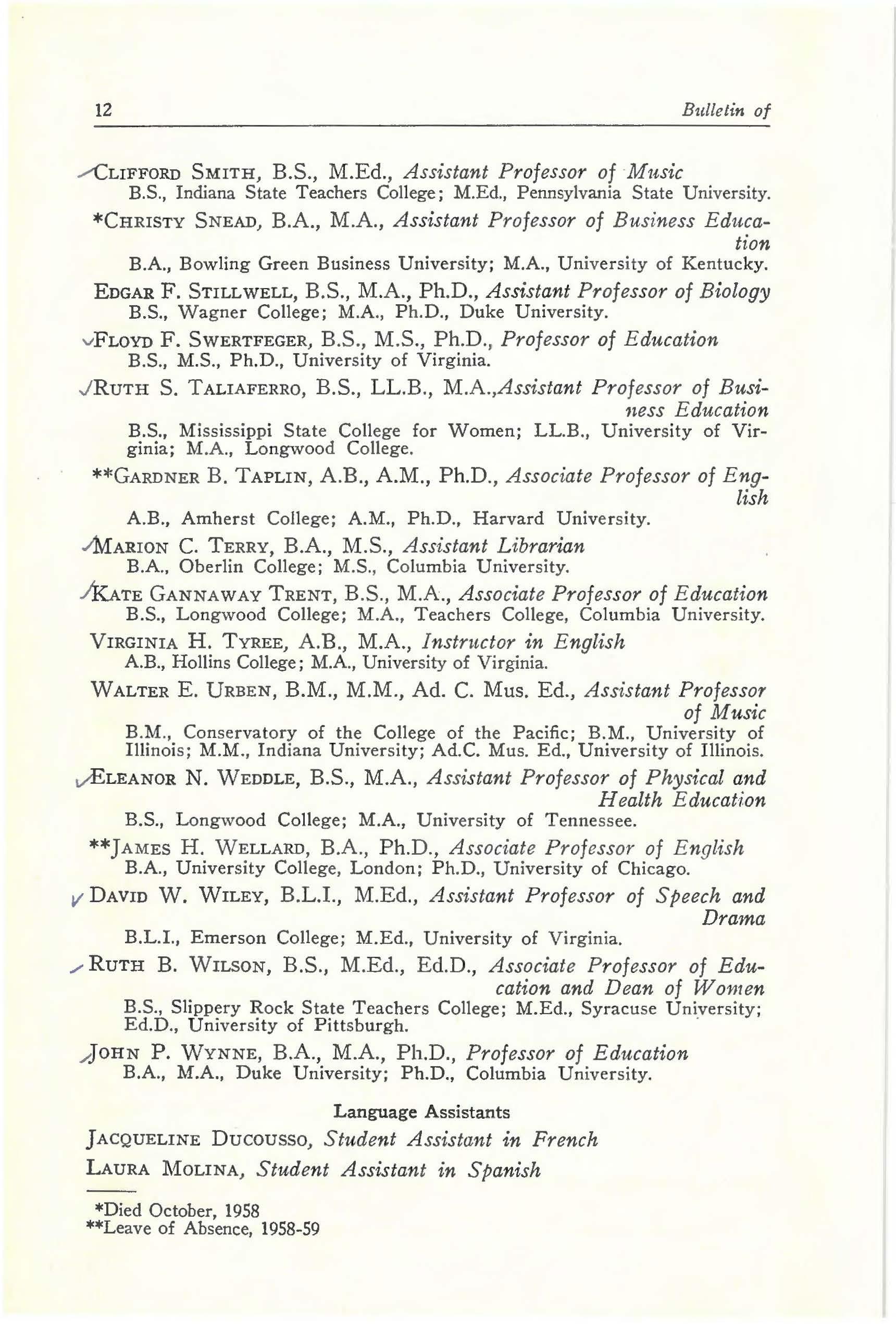
!KATE GANNAWAY TRENT, B.S., M.A., Associate Professor of Education B.S., Longwood College; M.A., Teachers College, Columbia University.
VIRGINIA H. TYREE, AB., M.A., lnstrnctor in English A.B., Hollins College; M.A., University of Virginia.
WALTER E. URBEN, B.M., M.M., Ad. C. Mus. Ed., Assistant Professor of Music B.M , Conservatory of the College of the Pacific; B.M., University of Illinois; M.M., Indiana University; Ad.C. Mus. Ed., University of Illinois. N. WEDDLE, B.S., M.A., Assistant Professor of Physical and Health Education B.S., Longwood College; M.A., University of Tennessee.
**JAMES H. WELLARD, B.A., Ph.D., Associate Professor of English B.A., University College, London; Ph.D., University of Chicago. v DAVID W. WILEY, B.L.I., M.Ed., Assistant Professor of Speech and Drama B.L.I., Emerson College; M.Ed., University of Virginia .,,,.
RuTH B. WILSON, B.S., M.Ed., Ed.D., Associate Professor of Education and Dean of Women B.S., Slippery Rock State Teachers College; M.Ed., Syracuse University; Ed.D., University of Pittsburgh. ·
.,,JOHN P. WYNNE, B.A., M.A., Ph.D., Professor of Education B.A., M.A., Duke University; Ph.D., Columbia University.
JACQUELINE Ducousso, Student Assistant in French LAURA MOLINA, Student Assistant in Spanish
*Died October, 1958 **Leave of Absence, 1958-59
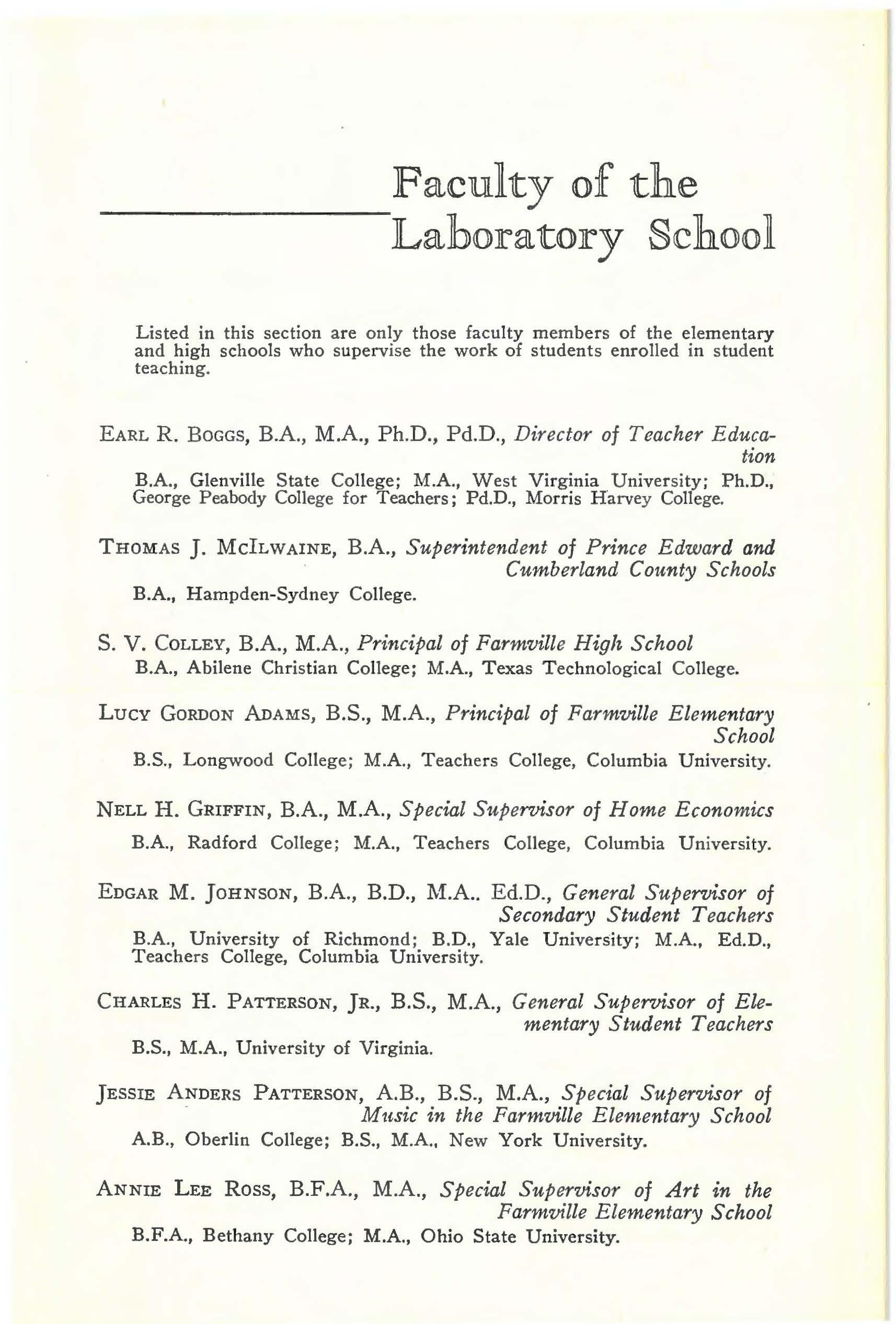
Listed in this section are only those faculty members of the elementary and high schools who supervise the work of students enrolled in student teaching.
EARL R. BoGGS, B.A., M.A., Ph.D., Pd.D., Director of Teacher Education B.A., Glenville State College; M.A., West Virginia University; Ph.D., George Peabody College for Teachers; Pd.D., Morris Harvey College
THOMAS J. MclLWAINE, B.A., Superintendent of Prince Edward and Cumberland County Schools B.A., Hampden Sydney College.
S. V. COLLEY, B.A., M.A., Principal of Farmville High School B.A., Abilene Christian College; M.A., Texas Technological College.
Lucy GORDON ADAMS, B.S., M.A., Principal of Farmville Elementary School B.S., Longwood College; M.A., Teachers College, Columbia University
NELL H. GRIFFIN, B.A., M.A., Special Supervisor of Home Economics B.A., Radford College; M.A., Teachers College, Columbia University.
EDGAR M. JOHNSON, B.A., B.D., M.A .. Ed.D., General Supervisor of Secondary Student Teachers B.A., University of Richmond; B.D., Yale University; M.A., Ed.D., Teachers College, Columbia University.
CHARLES H. PATTERSON, JR., B.S., M.A., General Supervisor of Elementary Student Teachers B.S., M.A., University of Virginia.
JESSIE ANDERS PATTERSON, A.B., B.S., M.A., Special Supervisor of - Music in the Farmville Elementary School A.B., Oberlin College; B.S., M.A., New York University.
ANNIE LEE Ross, B.F.A., M A., Special Supervisor of Art in the Farmville Elementary School B.F.A., Bethany College; M.A., Ohio State University.
KATE G. TRENT, B.S., M.A., Supervisor in the Farmville Elementary School B.S., Longwood College; M.A., Teachers College, Columbia University .

FRANCES E. ARMISTEAD, B.S., Supervising Teacher in the Farmville High School B.S., Longwood College.
JOHN M. AUSTIN, B.S., Supervising Teacher of Science in the Farmville High School B.S., Longwood College.
RUBY OVERTON BROOKS, Demonstration Teacher in the Farmville Elementary School Diploma, Longwood College.
NELL MORRISON BucK, B.S., Supervising Teacher in the Farmville Elementary School B.S., Longwood College.
DOROTHY CANADA, B.S., Supervising Teacher in the Farmville Elementary School B.S ., Longwood College.
BONNIE B. COLEMAN, B.S., Supervising Teacher in the Farmville Elementary School B.S., Concord College.
LENOIR H. COLEMAN, B.S., Supervising Teacher in the Farmville High School B.S., Longwood College.
LUCILLE O'BRIEN DAHL, B.A., Supervising Teacher of English in the Farmville High School B.A ., Westhampton College.
DORIS 0. DAVIS, B.S., Supervising Teacher in the Farmville Elementary School B S., Longwood College
MARY R. EDWARDS, B.S., Supervising Teacher of Science in the Farmville High School B.S., Longwood College.
HALLIE H. FLEETWOOD, B.S., Superv-ising Teacher of Mathematics in the Farmville High School B.S., Longwood College.
GLADYS R. FosTER, B.S., M.A., Supervising Teacher in the Fartnville Elementary School B.S , M.A., University of Virginia.
ELIZABETH C. GooDE, B.S., Supervising Teacher in the Farmville Elementary School B.S., Longwood College.
SALLY LOUISE JOHNSON, B.S., Supervising Teacher in the Farmville Elementary School B.S., Madison College.
HALLIE A. McCRAW, B.S., M.A., Supervisor in the Farmville Elementary School B.S., Longwood College; M.A., Teachers College, Columbia University.
HAROLD K. MAGNUSSON, B.S., Supervising Teacher in the Farmville Elementary School B.S., Longwood College.
LILLIAN A. MINKEL, B.S., M.A., Supervisor of Mathematics in the Farmville High School B.S., Longwood College; M.A., Teachers College, Columbia University.
MARY J. MORGAN, B.A., Supervising Teacher of Health and Physical Education for Girls in the Farmville High School B.A., Lynchburg College.
NANCY B. NOEL, B.S., Supervising Teacher of Home Economics in the Farmville High School B.S., Longwood College.
KATE E. O'BRIEN, B.A., B.S. in L.S., School Librarian in the Farmville High School B.A., Westhampton College; B.S. in L.S., Columbia University.

ALMA PORTER, B.S., Supervising Teacher of Mathematics in the Farmville High School B.S., Longwood College.
J. MEREDITH ROBESON, B.A., M.A., Sitpervisor of Social Studies in the Farmville High School B.A., M.A., Syracuse University.
ANN R. ROBINSON, B.A., M.A., Supervising Teacher of English and French in the Farmville High School B.A., M.A., West Virginia University.
MARGARET R. SEARS, B.A., Supervising Teacher of Social Studies in the Farmville High School B.A., College of William and Mary.
MARGARET L. SIMKINS, B.S., Supervising Teacher of English in the Farmville High School B.S., Longwood College.
PORTIA L. SPENCER, Demonstration Teacher in the Farmville Elementary School Diploma, Longwood College.
MARGARET STUART, B.S., Supervising Teacher of English in the Farmville High School B.S., Longwood College.
ADELE H. WATKINS, B.S., Supervising Teacher in the Farmville Elementary School B.S., Longwood College.
AGNES VENABLE WATKINS, B.S., Supervising Teacher in the Farmville Elementary School B.S., Longwood College.
KATHERINE WATKINS, B.S., Supervising Teacher in the Farmville Elementary School B.S., Longwood College.
KATHERINE A. WATKINS, B.S., Supervising Teacher in the Farmville Elementary School B.S., College of William and Mary.
MARY WICKER WITCHER, B.S., Supervising Teacher of Business S1tbjects in the Farmville High School B.S., Longwood College.
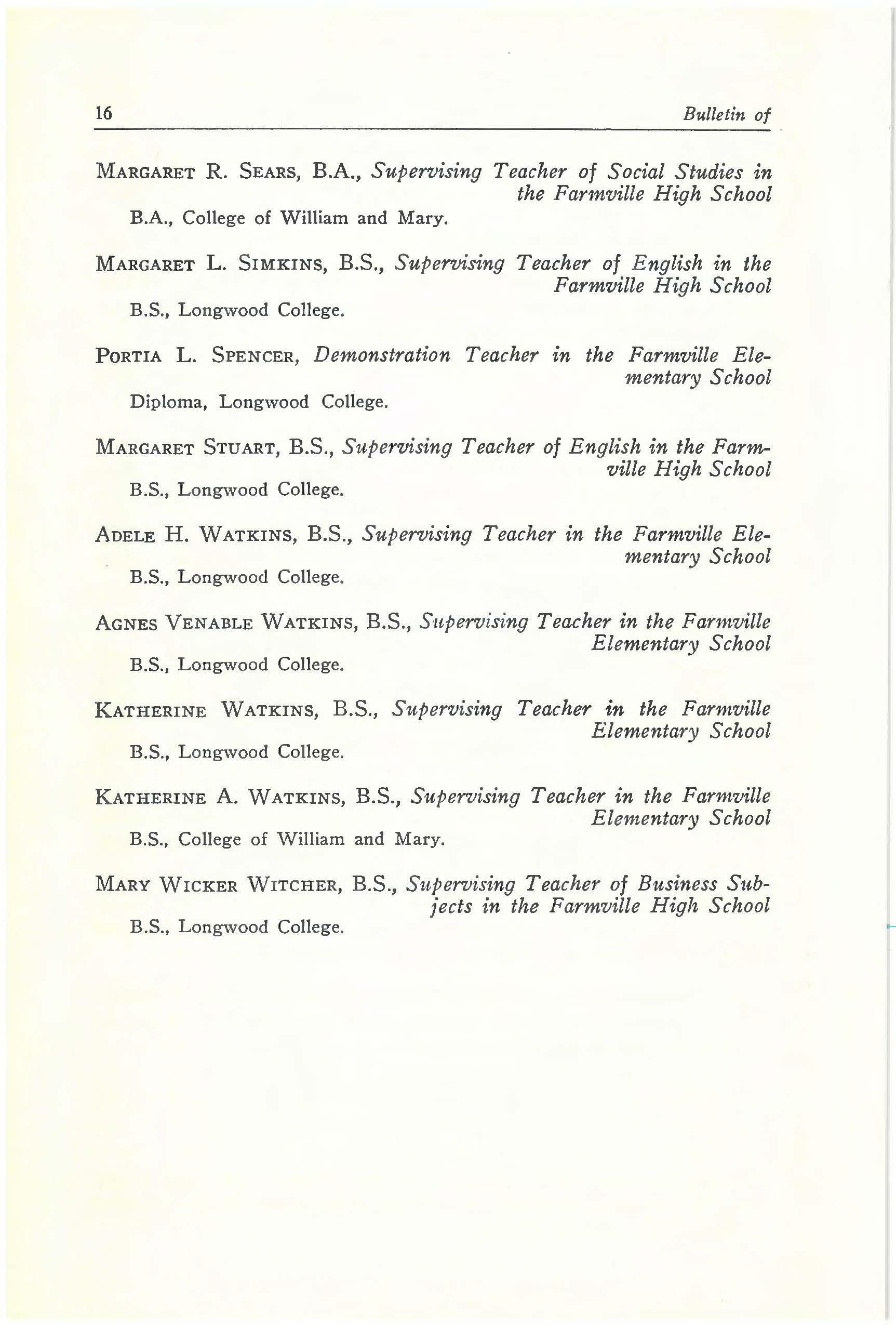
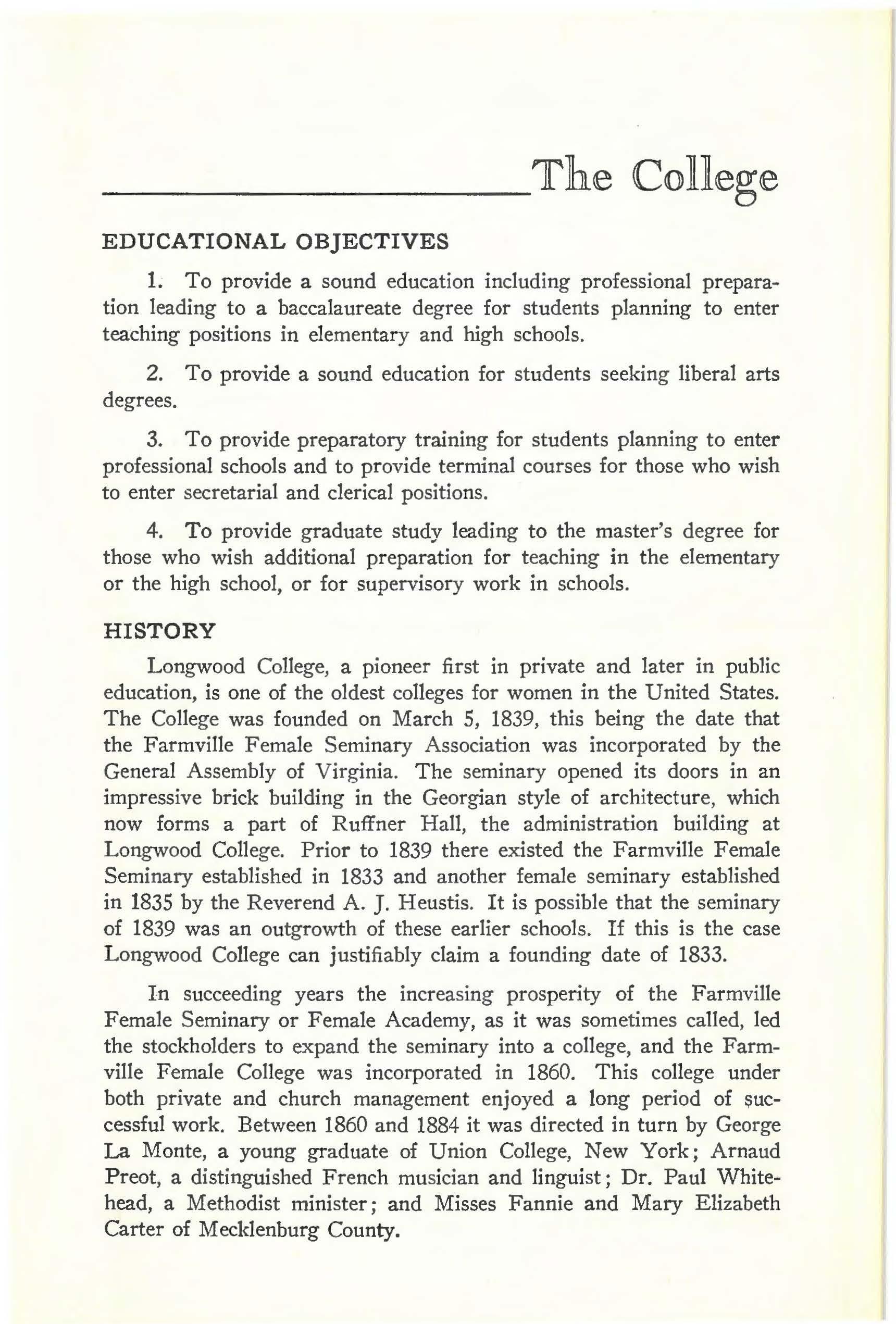
L To provide a sound education including professional preparation leading to a baccalaureate degree for students planning to enter teaching positions in elementary and high schools.
2. To provide a sound education for students seeking liberal arts degrees.
3. To provide preparatory training for students planning to enter professional schools and to provide terminal courses for those who wish to enter secretarial and clerical positions.
4. To provide graduate study leading to the master's degree for those who wish additional preparation for teaching in the elementary or the high school, or for supervisory work in schools.
Longwood College, a pioneer first in private and later in public education, is one of the oldest colleges for women in the United States. The College was founded on March 5, 1839, this being the date that the Farmville Female Seminary Association was incorporated by the General Assembly of Virginia. The seminary opened its doors in an impressive brick building in the Georgian style of architecture, which now forms a part of Ruffner Hall, the administration building at Longwood College. Prior to 1839 there existed the Farmville Female Seminary established in 1833 and another female seminary established in 1835 by the Reverend A. J. Heustis. It is possible that the seminary of 1839 was an outgrowth of these earlier schools. If this is the case Longwood College can justifiably claim a founding date of 1833.
In succeeding years the increasing prosperity of the Farmville Female Seminary or Female Academy, as it was sometimes called, led the stockholders to expand the seminary into a college, and the Farmville Female College was incorporated in 1860. This college under both private and church management enjoyed a long period of ~uccessful work. Between 1860 and 1884 it was directed in turn by George La Monte, a young graduate of Union College, New York; Arnaud Preot, a distinguished French musician and linguist; Dr. Paul Whitehead, a Methodist minister; and Misses Fannie and Mary Elizabeth Carter of Mecklenburg County.
The first State legislature to assemble after the adoption of the postbellum constitution established a system of public schools in Virginia on July 11, 1870. For twelve years or more the conduct of these schools was entrusted to such teaching forces as were found ready at hand. However, during this period it became evident to educational leaders that some provision must be made for the training of teachers. To meet this demand, the legislature on March 7, 1884, passed an act establishing a State Female Normal School. On April 7, 1884, the State of Virginia acquired the property of the Farmville Female College, and in October of the same year the Normal School opened with 110 students enrolled. This was the first state institution of higher learning for women in Virginia.
With the passage of the years, the Normal School expanded its curricula and ran through a succession of names. It became the State Normal School for Women in 1914, the State Teachers College at Farmville in 1924, and Longwood College in 1949.
The college's present name was derived from Longwood Estate, a tract of 103 acres acquired by the institution in 1928. This beautiful property, then consisting of thousands of acres, was purchased by Peter Johnston in 1765, and was the home of Peter Johnston, Jr., a lieutenant in Light Horse Harry Lee's famed legion and judge of the Circuit Court of Virginia. There, also was born General Joseph E. Johnston, confederate military figure.
In 1811 the estate was bought by Abram Bedford Venable, a United States Senator and the organizer and first president of the first bank in Virginia. After the destruction by fire of the original house on the estate, the present house was erected in 1815 by Nathaniel E. Venable, an officer in the War of 1812 and a member of the Virginia House of Delegates and the Senate. It is the birthplace of Lieutenant Colonel Charles Scott Venable, who was a member of General Robert E. Lee's staff, and professor of mathematics and chairman of the faculty of the University of Virginia.

The college was first authorized to offer four-year curricula leading to the degree of bachelor of science in education in 1916. It was authorized to offer the degree of bachelor of arts in 1935, the degree of bachelor of science in 1938, curricula in business education the same year, and courses leading to a degree in music education in 1949. In 1954, graduate programs were authorized.
Primarily a college for women, Longwood now offers eight baccalaureate degrees and two masters degrees in education.
The college is located in Farmville, a progressive community with a population of 5,000. The town is the business and educational center of this area of Virginia. Located here are good schools, churches, hotels, and the modern Southside Community Hospital. HampdenSydney College, a liberal arts college for men, is within five miles of Farmville.

Farmville is fifty miles east of Lynchburg and approximately sixty-five miles west of Richmond and Petersburg. It is situated on the Norfolk and Western Railroad. Serving it also are the Greyhound and Trailways bus systems. Excellent highways including U. S. 15 and U. S. 460, intersect here.
The climate is pleasant the year around. The geographic location of the college assures the absence of extremes in temperature and weather.
The campus is on an 18 acre plot of ground to the west of the business section of Farmville. The campus is compact; the buildings are arranged for usefulness and convenience. Ruffner Hall is located in the center of the campus and is probably the first building the student will enter upon her arrival at Longwood College. On the first floor of this building is the Rotunda which is attractively furnished as a reception hall. To the left of the Rotunda are the offices of the President, Deans, and Business Manager. To the right, is the Home Office and the office of the Dean of Women.
To the rear of the Rotunda is the dining hall of the College, which is equipped to seat one thousand persons. Each table in the room seats eight students. At each table a student serves as hostess. The dining facilities of the College are operated by the Slater Food Service Management, Inc., a nation-wide corporation which specializes in college food service management.
A number of classrooms will be found on the first floor of Ruffner Hall, and the College Post Office and Book Shop are located on the ground level section of this building. Here textbooks, both new and used, and supplies for use in classes may be purchased. Mail boxes with combination locks are provided for the convenience of the students.
Freshmen students are housed on the second and third floors of Ruffner. To the east of Ruffner is located Tabb Hall, a freshman and sophomore dormitory. On the first floor of Tabb may be found the office of the Registrar. Connected to Tabb Hall by an enclosed Colonnade is the College Infirmary, a modern structure fully equipped to accommodate all students who normally require medical attention at any one time. It is staffed by the College Physician and four nurses.
The Student Building is located on the eastern end of the campus. This building contains a modern gymnasium, shower rooms, and an indoor swimming pool. To the rear of this building are tennis courts and an athletic field used for archery, hockey, soccer, and other outdoor athletic contests. A nine-hole golf course is maintained at Longwood Estate. The Y.W.C.A. cabinet room and reception room, the Student Government Room, Monogram Club Room, Town Students' Room, and a small auditorium are located in the Student Building. Here, too, are rooms for each of the eight national social sororities having chapters at Longwood College.
At the western end of Ruffner Hall is the West Wing, the location of many of the classrooms. Housed on the first floor of this building is the regional Bureau of Teaching Materials which contains a large library of films and slides and numerous types of audio-visual equipment.
To the west of Ruffner we find the Library and the Jarman Auditorium and Music Building. To the south of these buildings is located Stevens Hall, housing the science departments, and Cunningham Hall, a modern dormitory.
The Library contains approximately 69,000 bound volumes, in•• eluding books in the Morrison Memorial Collection and those purchased through the Goldman Memorial Fund, the Faye Johnson Memorial Fund, the Mix Memorial Fund, and the Wilson Memorial Fund. It receives fourteen daily newspapers and some 330 current magazines. Also in the library is the main archival collection of the College, including the bound editions of student publications, college catalogues, and alumnae bulletins. Among the manuscripts are the earliest known minutes of the Board of Trustees, faculty minutes, and student registers . Club minutes, old letters, scrap books, and photographs are also represented.

Other special files in the library include a vocational file of more than 4,000 items, a general pamphlet file of nearly 7,000 items, a picture file of 6,300 items, and over 1,050 maps.
All books and other materials in the library are open to student use. Reading rooms, reference rooms, and lecture rooms are available with a staff of professional librarians on hand to assist in study and research.
Jarman Hall houses an auditorium which seats 1,235 persons and contains all equipment, including a four-manual pipe organ, and space necessary to stage elaborate productions of varied types. The music building, which is a part of Jarman Hall, contains classrooms, office s, so undproof individual practice rooms and studios, an instrument storage room, and a large band and orchestra rehearsal room. Among the various types of equipment there are twenty pianos ; electronic organs ; a Steinway and a Mason and Hamlin concert grand piano; a Baldwin small grand piano; all types of string, reed, brass, and percussion instruments; a library of recordings and music; phonog raphs , tape recorders, and a listening room for recorded music.
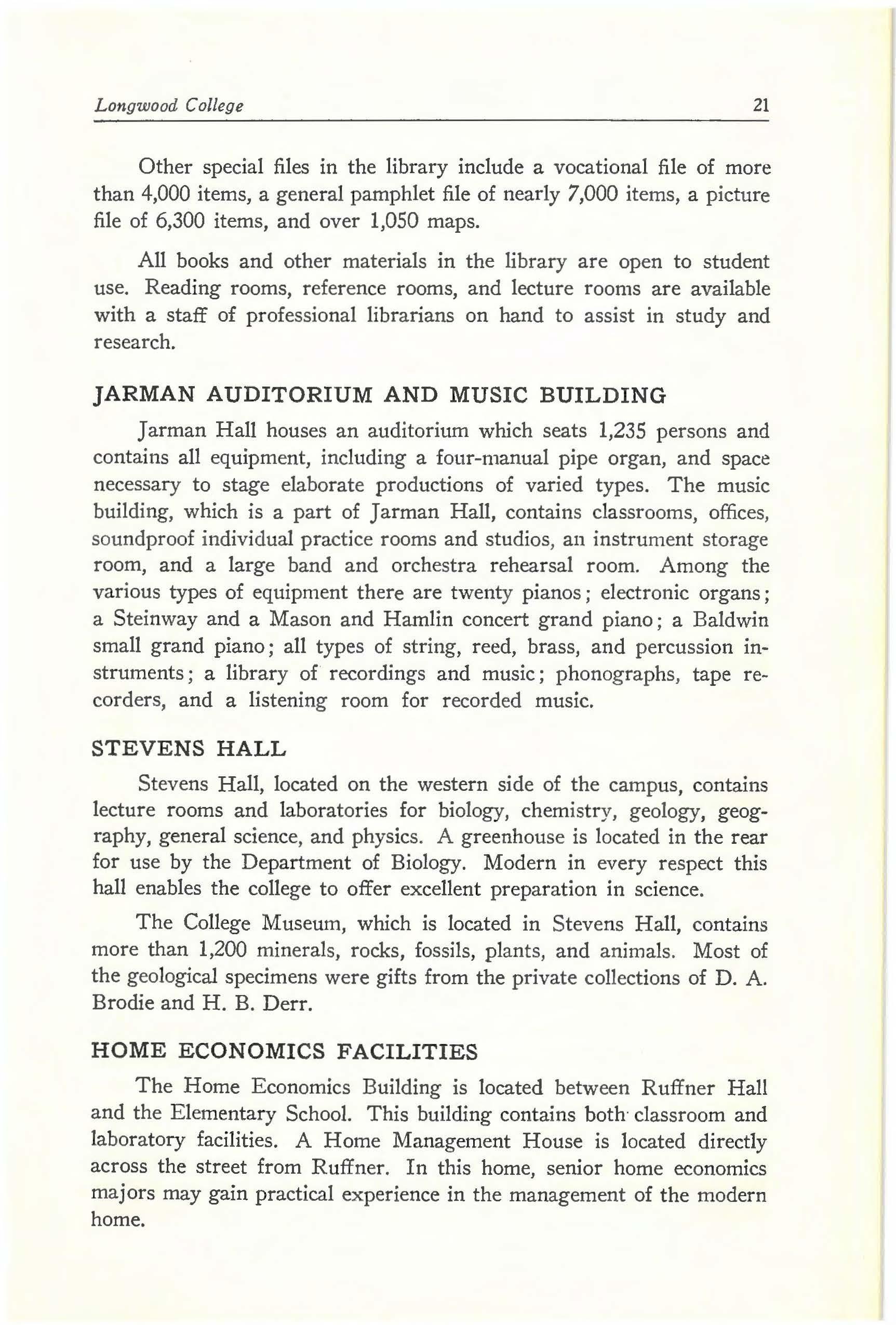
Stevens Hall, located on the western side of the campus, contains lecture rooms and laboratories for biology, chemistr y, geology, geography, general science, and physics . A greenhouse is located in the rear for use by the Department of Biology. Modern in every respect this hall enables the college to offer excellent preparation in science.
The College Museum, which is located in Stevens Hall, contains more than 1,200 minerals, rocks, fossils, plants, and animals. Most of the g eological specimens were gifts from the private collections of D. A. Brodie and H. B. Derr.
The Home Economics Building is located between Ruffner Hall and the Elementary School. This building contains both · classroom and laboratory facilities. A Home Management House is located directly across the street from Ruffner. In this home, senior home economics majors may gain practical experience in the management of the modern home.
Freshmen and a part of the sophomores live on the second and third floors of Ruffner Hall, in Tabb Hall, and in the Student Building. Cunningham Hall consists of three large wings connected to form an H-shaped building. The rooms are arranged in suites with a connecting bath between two rooms. Approximately 450 sophomores , juniors and seniors are housed in Cunningham Hall.
Student life in each dormitory is supervised by a Head Resident. The care of all dormitory rooms and buildings is under the supervision of a Housekeeping Supervisor.
The dormitories are designed especially to meet the living need3 of college students. A typical room has two single beds, two desks, a dresser, bookshelves, chairs, and two closets. Study lamps, bedspreads, bed linen, blankets, and towels are to be furnished by the student. Drapes and rugs may be furnished by the student if desired . The College Laundry is located on the campus and is equipped with the necessary personnel and machinery to render excellent service to students. Automatic washing machines are also available for student use and are located in the dormitories in rooms planned for this purpose.

Various recreation centers are located on the campus. Beneath the dining room in Ruffner Hall is a recreation hall where students hold dances, play table tennis and shuffleboard, watch television, and meet for various other types of informal gatherings. Located in a part of this recreation center is the "Snack Bar," a modern soda fountain operated by the Alumnae Association.
Each dormitory has a pleasant lounge with television where students can relax when studying is finished for the evening or where relatives and friends can be entertained when they come for a visit. Each dormitory is also equipped with formal entertainment rooms.
A Tearoom, well-known for its delicious food, is operated by the College and is located in Ruffner Hall. Here students , visitors, or faculty members may obtain breakfast and lunch at reasonable cost.
The Longwood Estate, located at the eastern edge of Farmville, is owned and maintained by the college. ( See the section of this catalogue describing the history of the college.) Here, in the atmosphere of the Old South, students have teas, banquets, receptions, and weekend parties in the historic home. The estate comprises 103 acres of beautiful, rolling grounds with a nine-hole golf course. In a wooden section of the place is a natural amphitheatre where May Day festivals are held and a log cabin where students and chaperones may stay overnight.
The Farmville Elementary and High Schools are used as laboratory schools for observation and student teaching. These schools are well equipped with laboratories, libraries, cafeterias, and workrooms. The faculties include teachers who are well qualified as supervising teachers.
The Roanoke City Public School System cooperates with the College in making facilities available for off-campus student teaching.
The College program and the program of student teaching are coordinated through the Department of Education.
The college year consists of a regular session, includin g two semesters of 18 weeks each, and a summer session of eight weeks. The summer session consists of an eight-week undergraduate term running concurrently with two graduate sessions of three and five weeks each. Graduate classes are scheduled during the five-week session six days each week. Students may enter in the summer or at the beginning of either semester of the regular session.
The college is fully accredited as a professional school for the training of teachers and as a liberal arts college. It is accredited by the Southern Association of Colleges and Secondary Schools, the National Council for Accreditation of Teacher Education, and the Virginia State Board of Education. It is on the list of colleges approved by the American Association of University Women. Its

pre-medical curriculum is approved by the Council on Medical Education and Hospitals of the American Medical Association. Its preprofessional curricula in nursing and medical and X-ray techniques prepare students for admission to accredited schools.
The college is a member of the Association of American Colleges, American Association of Colleges for Teacher Education, Association of Virginia Colleges, National Association of Business Teachers Training Institutions, American Association of College Registrars and Admissions Officers, Southern Association of Colleges for Women, American Library Association, and the Virginia Museum of Fine Arts.
Longwood College is affiliated with the University Center, in Virginia, an agency which brings nationally-known scholars and lecturers to the Virginia area and arranges programs of research, cooperative professorships, adult education, and library exchanges among member colleges. Longwood shares directly in the enriched educational activity made possible through the joint efforts of the seventeen institutions affiliated with the Center.
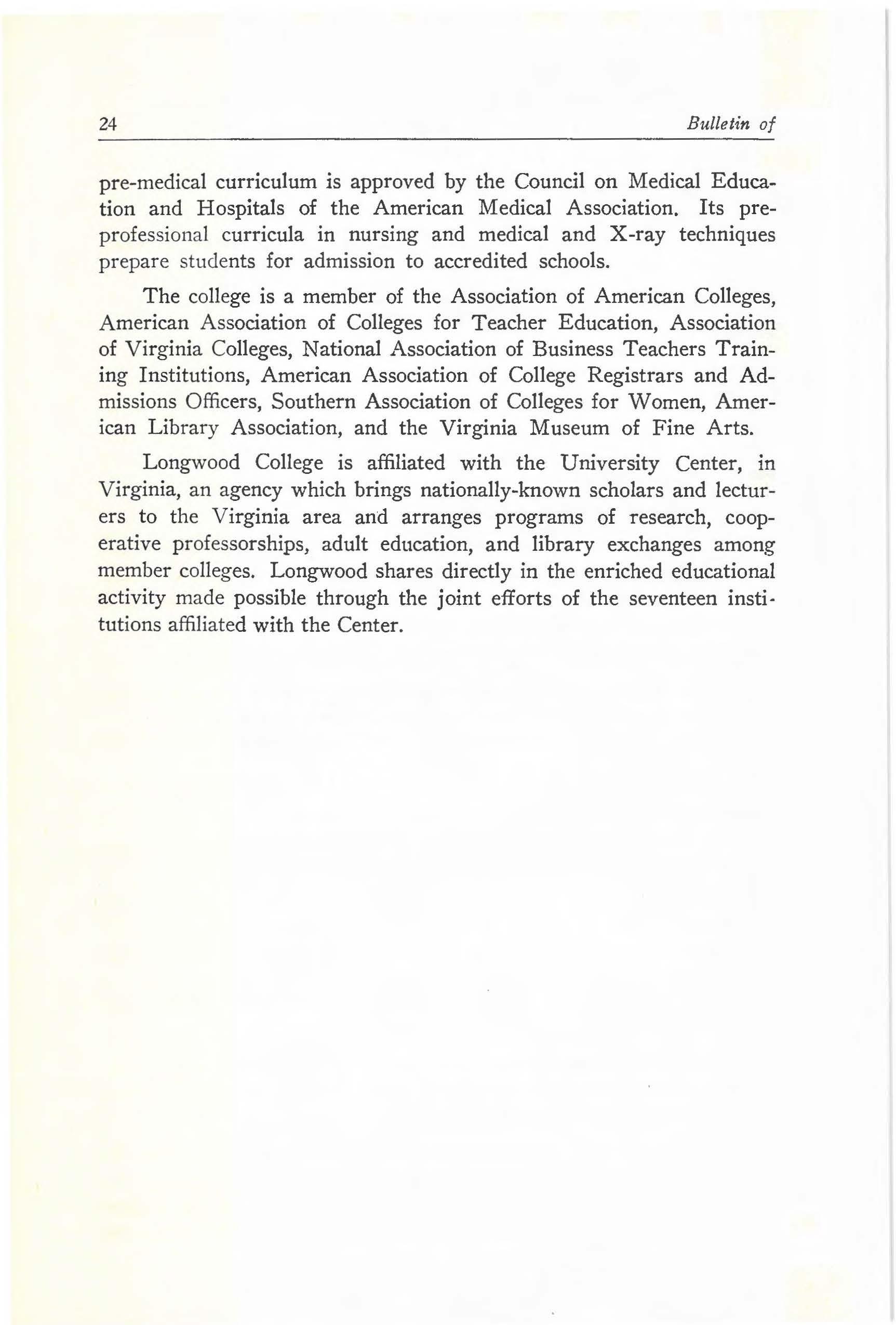
Eligibility for admission. The following students are eligible to apply for admission to the College:
1. Graduates of public and private high schools accredited by the State Department of Education in Virginia or the accepted accrediting agency of any other state. The State Board of Education has ruled that preference be given to Virginia students of academic and personal qualities of a high order who desire to teach.
2. Advanced students transferring from other recognized colleges and universities. Such students are given a fair equivalent in credit for courses they have taken, provided they are entitled to honorable dismissal from other institutions they have attended and that they meet the other admission requirements of the College.

High school ci-edits. Longwood College requires for admission: 4 units in English, 1 unit in American history, 1 unit in American government, 1 unit in science, and 1 unit in mathematics.
Application procedures. In order to apply for admission a student must take the following steps :
1. Submit the preliminary application blank found in the back of this catalogue. This must be accompanied by an application fee of ten dollars. The fee is used as a deposit for students who are accepted for admission. It is returned to those whose applications are rejected. It is forfeited by those who fail to complete their applications and by those who fail to attend after their applications are accepted . Checks and money orders should be made payable to Longwood College.
2. Fill out and return to the Dean of the College a detailed application blank that will be sent to her when the College receives the preliminary application blank.
3. Request that the principal of the high school from which she was ( or is to be) graduated submit to the Dean of the College a transcript of her high school record on a form provided by the College. This form is sent directly to the principal by the College after it receives
the student's preliminary application. Students who have attended other colleges and universities must likewise request that the registrars of those institutions send complete transcripts of their records.
Applicants who have not attended college previously and who have not taken the scholastic aptitude test administered to all high school students by the State Department of Education in cooperation with the local schools must take such a test. It may be administered by a local school official of an applicant's choice or by an official of the College. The College will provide all necessary test material.
When the college receives the student's application, application fee, scholastic aptitude test ( if any), and the transcripts of her records, its Committee on Admissions examines her qualifications carefully and notifies her as to whether or not her application is accepted. If it is, she and her parents are assured that in the opinion of an impartial committee she is qualified to undertake studies at Longwood College.

The College recognizes that the giving of information is only one phase of the student's education. It must also assist each student to develop in all areas of her life. It must be prepared to assist her in making plans for the future and in solving problems of the present. It must be interested in her as a person as well as a member of a class group. Therefore, every faculty member has guidance responsibilities involving work with students on a personal basis. A Student Counselor is available to provide counseling in the areas of vocational and personal adjustment for those students who request it.
The work of the Home Department, directed by the Dean of Women, is likewise an integral part of the student personnel program. This department is responsible for student life in the dormitories and for the social activities of the students. It has intimate daily contact with all students and is in a position to assist them at all times with their social adjustment. Its work is coordinated with that of the faculty so that there is continuity and purpose in the personal assistance rendered to students throughout their college careers.
The Student Health Service, directed by the College Physician, cooperates in every way with other activities of the student personnel program. The physical condition of every student is a primary factor
in her adjustment while in college and the cooperation of the Health Service, the faculty, and administrative officials, is considered essential.
, Each student's contact with the student personnel program begins with the consideration of her qualifications by the Committee on Admissions when she applies for admission. At the time that she is accepted, the College already has a knowledge of her background, achievement, abilities, and interests. Soon after she matriculates at the College, each freshman is assigned an adviser who is likewise her instructor in at least one class. This faculty member is available at all times to give her assistance in making her plans and solving her problems in an intelligent manner. The Student Counselor maintains extensive personnel records on each student.
The College recognizes that many students have not decided definitely on a specific course of study or vocation at the time that they enter as freshmen. Therefore, they are not required to make a choice at the time that they begin their studies. All freshmen take a general course. The required subjects in this are English, history or geography, a science, and physical education . In addition, they elect courses in other subjects in which they are interested. This gives them an opportunity to "explore" during their freshman year in such a way that they are better prepared to make definite choices as to what they will study _beginning with their sophomore year.
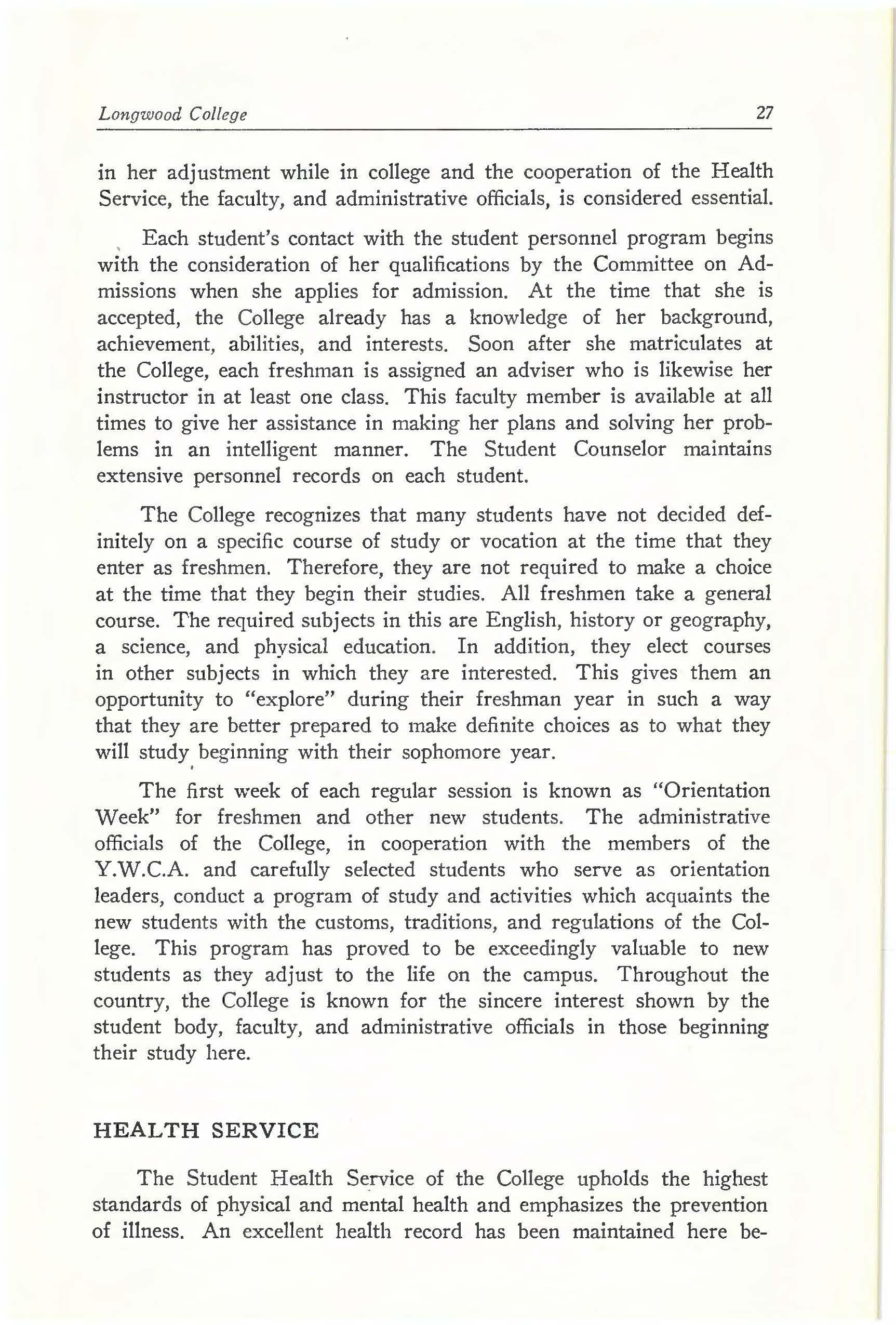
The first week of each regular session is known as "Orientation Week" for freshmen and other new students. The administrative officials of the College, in cooperation with the members of the Y.W.C.A. and carefully selected students who serve as orientation leaders, conduct a program of study and activities which acquaints the new students with the customs, traditions, and regulations of the College. This program has proved to be exceedingly valuable to new students as they adjust to the life on the campus. Throughout the country, the College is known for the sincere interest shown by the student body, faculty, and administrative officials in those beginning their study here.
The Student Health Se rvice of the College upholds the highest standards of physical and mental health and emphasizes the prevention of illness. An excellent health record has been maintained here be-
B u lletin of
cause of the close cooperation between the College Physician and other departments that are in a position to assist in the promotion of student health.
The Service is staffed by the College Physician who is a member of the College staff, and four nurses.
Students needing medical attention are treated in the modern, well equipped infirmary maintained by the College. The infirmary gives a twenty-four hour service with a nurse available at all times. The College Physician is available on call at any hour. The College does not assume responsibility for any medical attention except that given by the College Physician and by the nurses. Consultants, hospitalization, private nurses, special prescriptions , X-rays, other laboratory work, etc., are at the expense of the student. The College Physician communicates with the parents immediately in case of serious illness.
The Southside Community Hospital is located only a few blocks from the College in Farmville. It is well equipped and is in the charge of a capable staff of physicians and surgeons. The College Physician is a member of the staff, and a Diplomate of the American Board of Internal Medicine.
A library orientation program is required of all freshmen. This program is given by members of the English department in cooperation with the library staff. By means of this program students become familiar with the library building and its functional divisions, with the various book collections, and with general and special reference tools. They learn how to borrow library materials, how to use the Faculty Reserve Collection, and how to locate subject material or specific books. This program is followed by individual and group instruction throughout the entire four years of college.
Library service to alumnae is continued in the form of services locally rendered or services by mail. Loan service to teachers in southside Virginia is formally organized according to the regional plan put into effect by the State Board of Education. It is the policy of the library to obtain maximum use of its materials in the interest of students, alumnae, teachers, and other friends of the College

The College maintains a placement service, directed by the Executive Secretary, for the benefit of its students and alumnae. Notices of vacancies are secured from superintendents, principals, supervisors, other employer~, and alumnae. Qualified students and alumnae are notified of these and are placed in contact with the employers.
In order to secure the best possible service, administrative officials should state clearly the character of positions to be filled, and the alumnae needing help should state clearly their needs and promptly make known their acceptance of positions or change in positions.

The faculty members and administrative officials of the College believe that their primary responsibility is to assist students to be welladj usted, useful citizens in the state and nation. Therefore, attention is given to all aspects of student life on the campus.
In the section of this catalogue describing the Student Health Service, the College's activities relating to physical life are outlined. Summarized below are other aspects of college life which receive careful attention.
The moral and religious aspects of education are considered as important as are the physical and intellectual. During the history of the College a tradition of good will, cooperation, and high standards of personal relationship has developed. Such a stabilizing influence cannot be described; it can be appreciated only through living in the atmosphere it engenders. But this intangible influence is experienced by both students and faculty to such a degree that it has become a distinct moral force in the whole College community.
The College is a home in which everyone is expected to do his part and share in a give-and-take relationship with others. Certain modes of life are prized and valued because in a long history they have proved their worth. In such an atmosphere it is difficult for the young student to fail to develop high ideals and a wholesome moral outlook on life.
The Young Women's Christian Association is a strong religious force in the college. It provides training and experience for the officers and others interested in religious work. The Y.W.C.A. conducts daily evening prayer services, urges attendance at church school and church, and fosters a spirit of religious life and service. Under its auspices a Religious Emphasis Week is observed; a series of addresses by some Christian leader is given each year on the fundamental principles of the Christian religion, and noted speakers representing the international point of view address the students on important current movements.

Students are also encouraged to participate in the religious life of the community. They receive a cordial welcome from the ministers of the town to attend their church functions, which include regular Sunday services, prayer meetings, Sunday School classes, and social gatherings. Special leaders, working with students through the medium of student organizations, are provided by many of the churches.
Farmville churches include the Baptist, Episcopal, Lutheran, Methodist, Presbyterian, Roman Catholic, and Wesleyan Methodist. \¥here there is no organized church leadership, as in the case of the Christian Scientists , students of the respective faiths usually have contact with local residents having similar church affiliations.
The individual with a well-rounded personality is social in outlook and attitude. She is able to work and to play with other people. The community life on the campus provides many opportunities for every student to participate in various social, recreational, and cultural activities.
Various receptions and parties at the beginning of the college year enable new students to meet the upper classmen, faculty members, and administrative officials. The College Circus , presented each fall by the four classes, provides entertainment and develops a spirit of cooperation and friendliness among the students. The Founders Day celebration, held yearly in March, brings together alumnae, students, and faculty members. The May Day Festival, held at the Longwood Estate on the first Saturday in May, is an outstanding event sponsored by a general committee chosen from the student body.
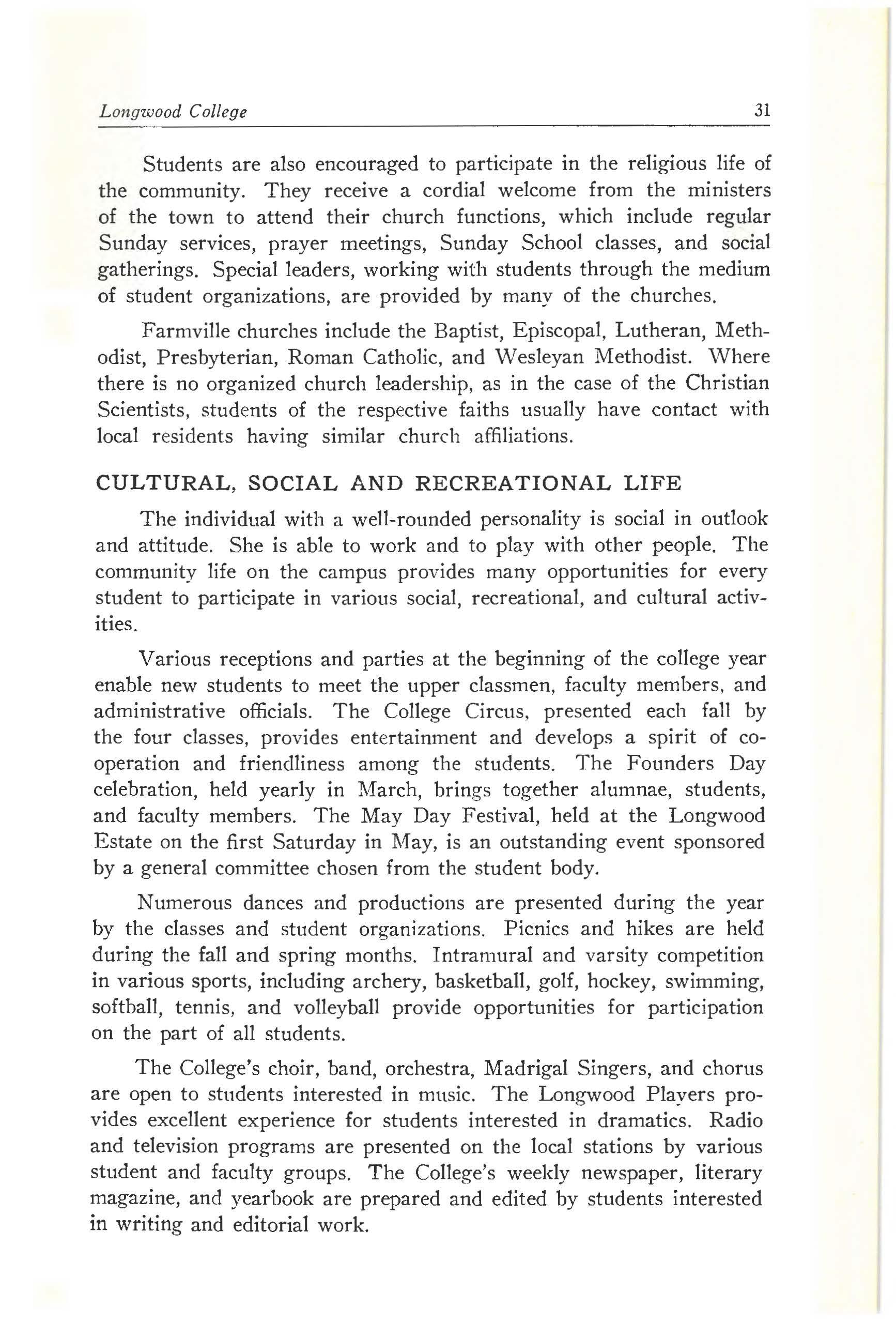
Numerous dances and productions are presented during the year by the classes and student organizations. Picnics and hikes are held during the fall and spring months. Intramural and varsity competition in various sports, including archery, basketball, golf, hockey, swimming, softball, tennis, and volleyball provide opportunities for participation on the part of all students.
The College's choir, band, orchestra, Madrigal Singers, and chorus are open to students interested in music. The Longwood Players provides excellent experience for students interested in dramatics . Radio and television programs are presented on the local stations by various student and faculty groups. The College's weekly newspaper, literary magazine, and yearbook are prepared and edited by students interested in writing and editorial work.
A weekly assembly is attended by all students. Distinguished speakers and other programs of interest are presented. Artist Series, programs featuring outstanding lectures and various artists of the entertainment world are presented at intervals during the year. Among the outstanding speakers, artists, and programs presented on the Longwood campus during the 1958-59 session were the following:
Phyllis Hartnoll, Editor of The Oxford Companion to the Theatre .
"The Reluctant Debutante," The Barter Theatre.
"Pygmalion," Longwood Players.
Little Singers of Paris.
"La Boheme ," Wagner Opera Company.
"Twelfth Night," Players, Inc.
Katherine Anne Porter, Author and Lecturer.
Mary Elizabeth Massey, Professor of History, Winthrop College, "Civil War Comes to the Campus ."
John Bettersworth , Dean of Mississippi State College , "A Phase of the Ante--bellum Education of Women."
The Institute of Southern Culture was established at Longwood College in 1956 to promote the study of traditional aspects of Southern civilization through academic course work, special lectures, and through the publication of research in the field. The Institute is currently sponsoring two series of lectures in the spring and summer by visiting scholars and members of the faculty. Course work in several departments of the college also provides a means for the exchange of ideas about various aspects of Southern life. Financial support for the Institute- is provided by the Longwood College Alumnae Association.
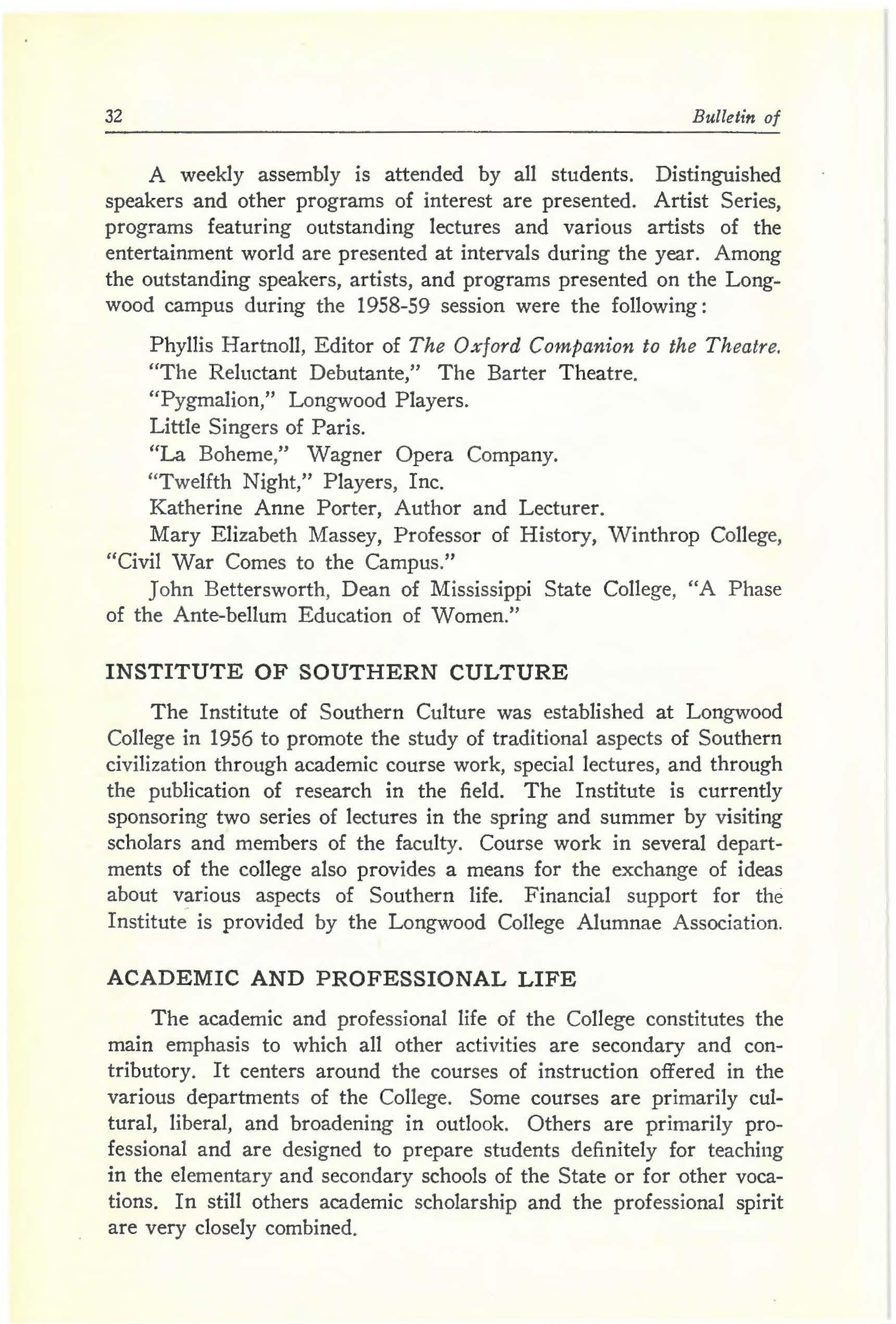
The academic and professional life of the College constitutes the main emphasis to which all other activities are secondary and contributory. It centers around the courses of instruction offered in the various departments of the College. Some courses are primarily cultural, liberal, and broadening in outlook. Others are primarily professional and are designed to prepare students definitely for teaching in the elementary and secondary schools of the State or for other vocations. In still others academic scholarship and the professional spirit are very closely combined.
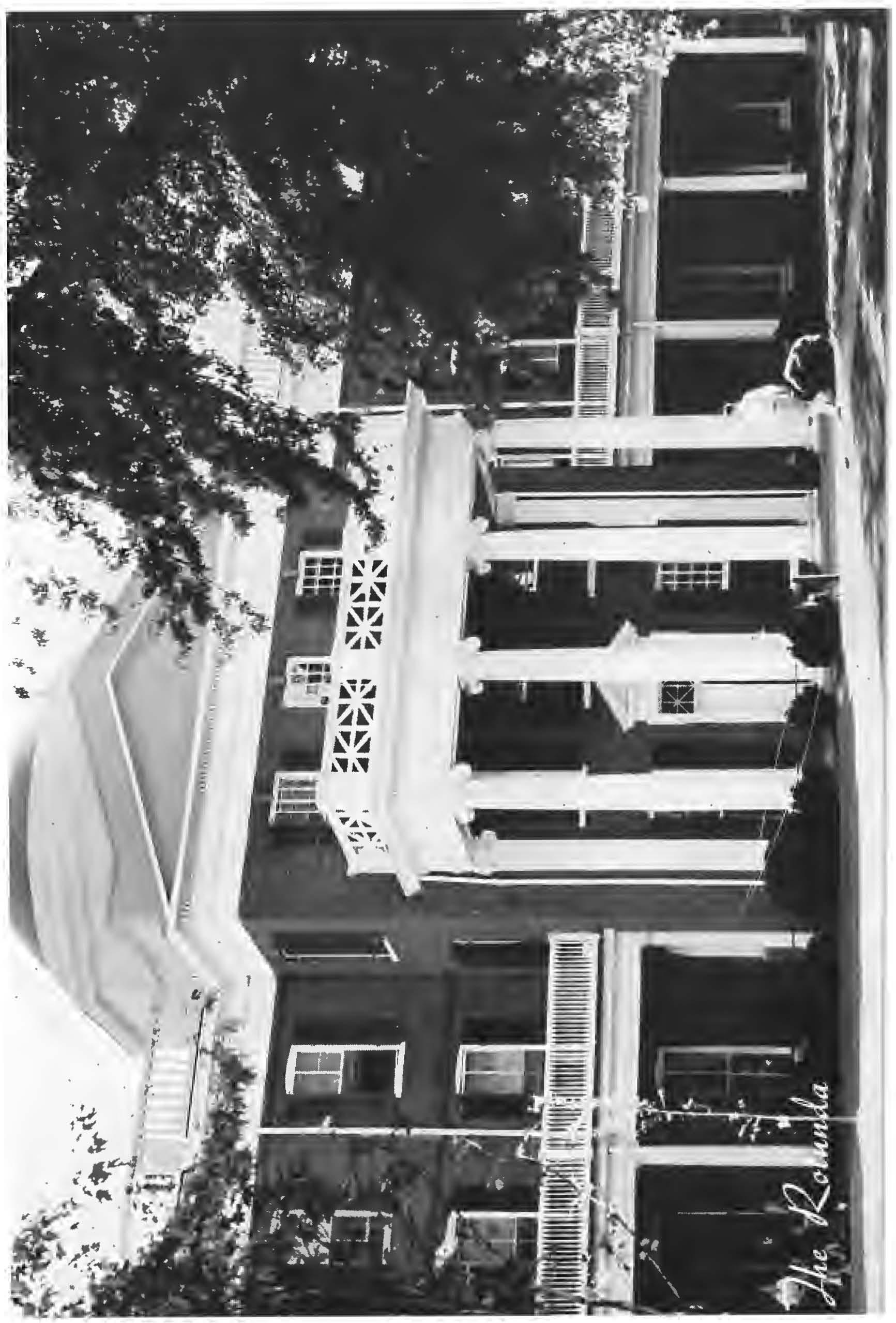

The spirit of the class work is free and natural. The members of the faculty and the students work together as members of a large family in which every one is expected to do her part. Through such a spirit of fellowship and good-will are developed initiative, cooperation, responsibility, self-control, and other intangible qualities of personality and character.
The College is a community, the residents of which are the students, faculty members, and administrative officials. These persons work together to maintain high standards of conduct and, like all other communities, have developed regulations by which social life of the student body is governed. ·
Students are expected to conduct themselves as ladies and gentlemen while on the campus, in the community, and at other colleges. They must keep in mind at all times that they are representatives of the College and that their conduct brings credit or discredit to the College as well as to themselves. Any questionable conduct will he dealt with at the discretion of the Student Government Association.
Boarding students are not permitted to keep cars on the campus nor in Farmville during the College session. Seniors may have cars at the College during the commencement period which is approximately two months preceding the date of graduation.
Complete information regarding all social regulations is given in the Student Handbook sent to every student during the summer preceding the opening of the new session.
Numerous student groups on the campus assure a well-rounded program of activity for each student as well as the opportunity for student participation in the affairs of the College.
All students of the College are members of the Student Government Association which is directed by a Student Council composed of officers and members elected by the student body. This group manages the affairs of the students in cooperation with the administrative officials of the College. Regulations governing the conduct of students both on and off the campus are enacted and enforced by them.

The underlying principles of conduct and relationship of the students, faculty members and administrative officials are embodied in the honor system, a cherished tradition of the College. The way of life on the campus is based on the Honor Code.
A high sense of honor, in all his relationships and activities, should be one of a person's most cherished possessions. It is the one essential that enables a person to respect himself, and to merit the respect of others. It is the one thing that makes it possible for a group of people to live together with perfect confidence. Such an effective honor system is one of the oldest and highest traditions of Longwood College.
Upon entrance here a stttdent is assumed to be a person of absolitte honor until he proves himself otherwise. This nieans absolute honor in all academic work, financial and property matters, and personal relationships, whether supervised or not. It cannot be over-emphasized that this places upon each individual student the obligation of constant 'Vigilance to maintain absolutely honorable conduct.
The Honor Code requires a student to remain not only honorable in his own condttct but also to report all infractions of the honor system he observes. This latter is in many respects the most difficult phase of the system. The measure of a student's love of the system and of his College, nevertheless, is the extent to which he is willing to shoulder this burden.
When a possible infraction of the honor system is reported to the Student Council, a careful and secret trial is conducted. The accused will be given every opportunity of proving his innocence. If the verdict is innocent, the minutes of the trial will be destroyed, but if the verdict is guilty the decision will be announced to the student body.
The House Council of the College is composed of four officers elected by the student body and of the students who are appointed presidents of the various halls in the dormitories by the President of the Council. It is the responsibility of this group to set up and enforce the regulations governing student life in the dormitories.
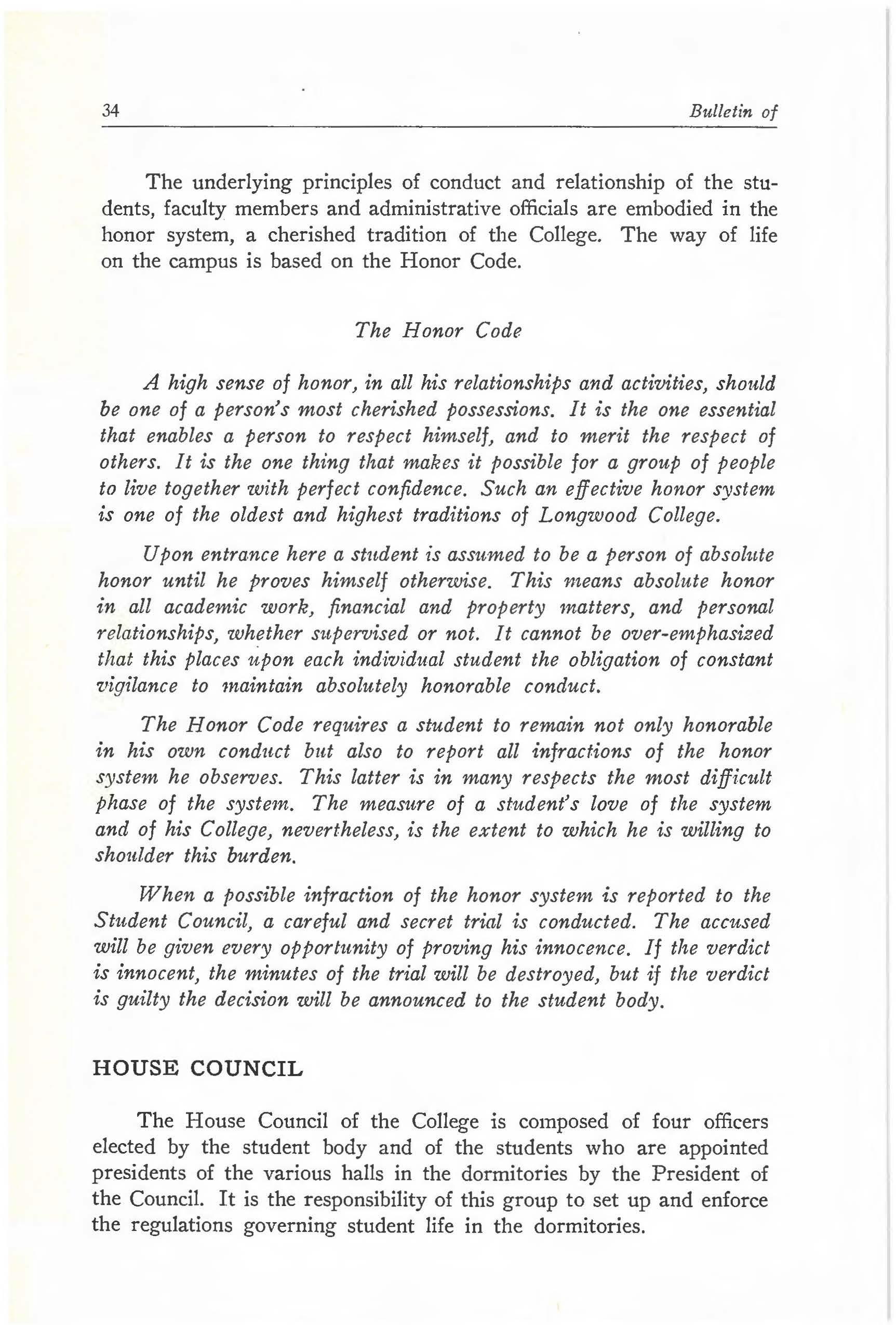
The Y.W.C.A. in the College is a branch of the national Y.W C.A. The administrative direction is in the hands of the students, assisted by an advisory committee of the faculty. It promotes a number of religious activities. Religious leaders are brought to the campus by the Association to discuss with students questions of religious interest and to help individuals with personal religious problems. Vesper services are held each evening in one of the nearby churches. The organization through its committees welcomes new students indiv idually and sponsors a reception to freshmen early in the fall. It likewise provides informal entertainment for other groups of students from time to time during the year.

All students are members of the Athletic Association . The Athletic Council, consisting of students and a facult y adviser, has control of both intramural and inter-collegiate sports and contests, and attends to all the business of the organization . Contests are held in tennis, basketball, softball, hockey, volleyball, golf, archery, and swimming. The nine-hole course at Longwood gives students an opportunity to play golf. In collegiate sports, teams are maintained in tennis , basketball, hockey, and swimming.
There are a number of honor societies designed to recognize excellence in various fields. Alpha Kappa Gamma, a national honor ·society for leadership, was organized in 1928 with the Longwood chapter as one of its charter members . Kappa Delta Pi is a national honor society for students interested in the activities of the teaching profession. Its membership is limited to juniors and seniors whose scholasti c records place them in the upper fifth of the student body. Organized in 1918 as a local honor society, it affiliated with the national group ten years later. Outstanding students in English are invited to join Beorc Eh Thorn, a local society, and students with good records in history and social sciences are admitted to Pi Gamma Mu, a national honorary social science society. Alpha Psi Omega , a national dramatic organization, recognizes outstanding dramatic achievement. Editors, business managers , and others in key positions on any of the student publications are eligible for membership in Pi Delta Epsilon , a national honorary journalism fraternity. The local chapter was organized in
1950. Sigma Alpha Iota is a national professional music fraternity for women. Lynchos Society is a local honorary organization in science and mathematics. The M anagram Club recognizes leadership and participation in sports; its membership is limited to twenty-five.

Longwood has many organizations intended to bring together students with common interests. Among the regional clubs for students from the same area are the Eastern Shore Club, the Northern N eek Club, the Richmond Club, the Southwest Virginia Club, and the Tri-County Club. A unique organization is the Granddaughters Club, composed of students whose mothers or grandmothers attended the college. Other student clubs include:
Le Cercle Francais and El Club Espanol are clubs to which all modern language students are eligible. The programs of the regular monthly meetings, which are given in the foreign languages, consist of songs, skits, games, current events, and short talks on cultural subjects.
The Future Business Leaders of America is a national organization of prospective business teachers and leaders in the field. Participation in this organization will be of great help to Longwood students who teach business subjects and who serve as advisers to this or to similar types of co-curricular activities.
The Home Economics Club strives to develop a better understanding of home economics and its contribution to personal and family living. Membership is open to all girls enrolled in home economics courses. The club is affiliated with the state and national Home Economics Association.
The H,O Club is an honorary swimming club. The members are chosen from the student body because of their ability and participation in swimming. Student members must pass the Red Cross Senior Life Saving Test to be eligible for membership. The annual water pageant, the Intercollegiate Telegraphic Swimming Meet, and recreational swimming are sponsored by this group.
The Longwood Library League includes in its membership students who are on the college library staff and students who are in training as future librarians. These Tri-L members meet together for the purpose of integrating and developing their common interests in books and libraries.
The Longwood Players is a group open to all students interested in dramatics. Any student may register for an apprentice period of one semester. At the end of this time the students who have shown an active interest in any phase of the drama will be elected to full membership. The club aims to provide the best in dramatic entertainment for the college students and the people of the community. Two threeact plays are presented each session . Twice during the school year the Players presents a series of one-act plays, and at least one speech assembly is presented to the student body. For the past few years the club has sponsored a trip to New York for the primary purpose of attending the Broadway shows. Anyone in the student body is eligible to take this trip. If the student works with the club's competent director and the other club members, she will find the Longwood Players an organization worthy of her time and effort.
The music organizations of the College are the College Choir, Madrigal Singers, Choral Club, band, and orchestra. These are important factors in the life of the College. They select their members through try-outs at the beginning of the session and give several concerts each year.
Orchesis is an honorary dance group whose purpose is to foster creative interest in dance among students in the College, and to further and widen that interest through contacts with other college groups. Students are chosen as apprentices and qualify for membership by participating in two major dance events of the college year.
The Student Education Association is a national organization of prospective teachers enrolled in colleges and universities. The J. L. Jarman Chapter was organized at Longwood College in 1939. It is affiliated with the Virginia Educational Association and the National Education Association . Its purpose is to foster professional interest in the field of education.
In addition to these organizations eight national sororities have chapters on the campus. They are Alpha Sigma Alpha, Alpha Sigma Tau, Delta Zeta, Kappa Delta, Pi Kappa Sigma, Sigma Sigma Sigma, Theta Sigma Upsilon, and Zeta Tau Alpha. Another social organization is the Cotillion Club, which sponsors a major dance each spring.

The students of the College sponsor four publications: The Rotunda, The Colonnade, The Virginian, and the Student Handbook.
The Rotunda is a weekly newspaper which keeps the students and faculty informed of the College news and the interests of the College as observed from the point of view of the students. It not only expresses the attitude of the students towards various phases of College life and current activities but also exerts an important influence in the development of the ideals of the community.
The Colonnade is a literary magazine to which students contribute essays, poetry, short stories, and other writings. It sponsors contests, from time to time, to stimulate literary effort.
The Virginian is the yearbook of the College. Students are responsible for the art work, the editing, and the management of the publication. Each issue represents a cross section of the College life for the year. It is, therefore, highly valued by the members of the graduating class.
The Student Handbook is the manual of rules and regulations governing the conduct of the students. In addition, it contains the constitutions and by-laws of the Student Government Association, the Young Women's Christian Association, and the Athletic Association, briefer descriptions of other organizations, and a description of the customs and traditions of the College. It serves as the orientation textbook for all new students.

The cost of attending the College is quite moderate. Outlined below are the charges made to both boarding and day students.
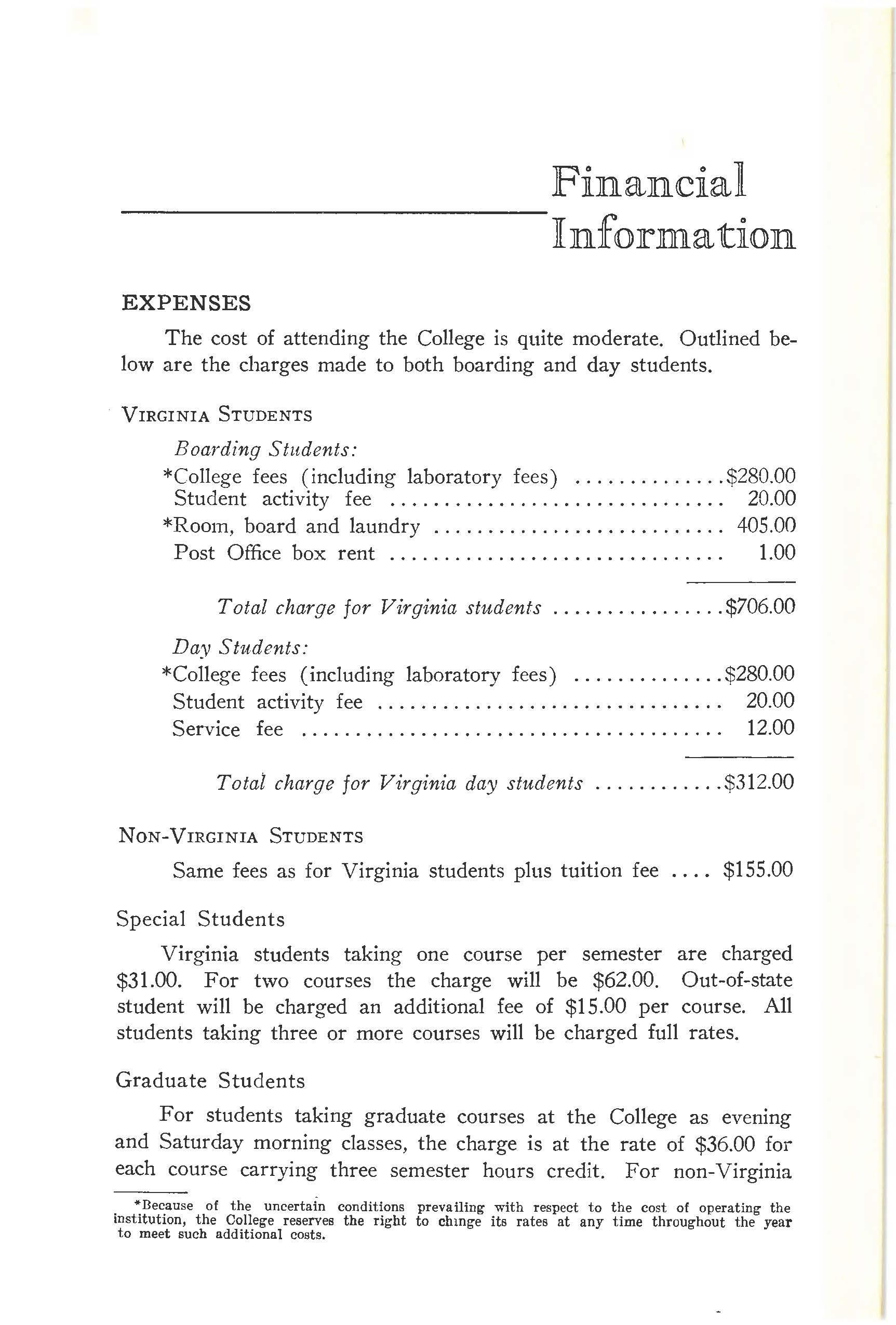
Boarding Students:
*College fees ( including laboratory fees) $280.00 Student activity fee 20.00
*Room, board and laundry . . . . . . . . . . . . . . . . . . . . . . . . . . . 405.00 Post Office box rent . . . . . . . . . . . . . . . . . . . . . . . . . . . . . . . 1.00
Total charge for Virginia students ................ $706.00
Day Students:
*College fees (including laboratory fees) .............. $280.00 Student activity fee . . . . . . . . . . . . . . . . . . . . . . . . . . . . . . . . 20.00 Service fee . . . . . . . . . . . . . . . . . . . . . . . . . . . . . . . . . . . . . . . 12.00
Total charge for Virginia day students $312.00
Same fees as for Virginia students plus tuition fee .... $155.00
Virginia students taking one course per semester are charged $31.00. For two courses the charge will be $62.00. Out-of-state student will be charged an additional fee of $15.00 per course. All students taking three or more courses will be charged full rates.
For students taking graduate courses at the College as evening and Saturday morning classes, the charge is at the rate of $36.00 for each course carrying three semester hours credit. For non-Virginia
*Ilecause of the uncertain conditions prevailing with respect to the cost of operating the institution, the College reserves the right to chmge its rates at any time throughout the year to meet such additional costs.
students, the out-of-state tuition fee of $155.00 will be paid on a prorated basis. Graduate students registering for thesis work will pay a fee of $45.00. This amount is to be paid only once.
Any student enrolled in student teaching will be classed as a full-time student and will be charged full rates.
A charge of $3.50 per week or $17.50 per semester ts made for the privilege of auditing a course.
For individual lessons in music: voice, piano, violin, or other orchestral or band instruments, the fees will be as follows : Practice 1 hour Total Fee per day 2 lessons per week per semester .......... $50.00 $5.00 $55.00 1 lesson per week per semester .......... 30.00 5.00 35.00 Class of two, per semester ... . .......... 25.00 5.00 30.00 Class of four, per semester .............. 12.50 5.00 17.50 Class of eight, per semester . . . . . . . . . . . . . . 10.00 10.00
For individual lessons in organ: 2 lessons per week per semester ........ $50.00 $10.00 1 lesson per week per semester 30.00 10.00 Class of two, per semester . . . . . . . . . . . . . 25 .00 10.00
$60.00 40.00 35 .00
Students may rent band and orchestral instruments from the college. The rental fee is $5.00 per semester. Students must furnish reeds and strings as needed. Practice rooms are available at a rental of $5.00 per semester, 1 hour each day.
All students applying for admission must submit an application fee of ten dollars. This is returned to those whose applications are rejected. It is forfeited by those who fail to attend after their applications are accepted or who cancel their applications prior to action by the Committee on Admissions. For those who are accepted and enroll

in September this is not an additional charge. It is credited at that time toward total charges for the first semester.
On or before June 15 of each year a payment of $50.00 must be made in order to reserve a room in the dormitories. This deposit is to be made by both new and former students and will not be refunded. The deposit will be credited on the amount to be paid by the student at the beginning of the session in September.
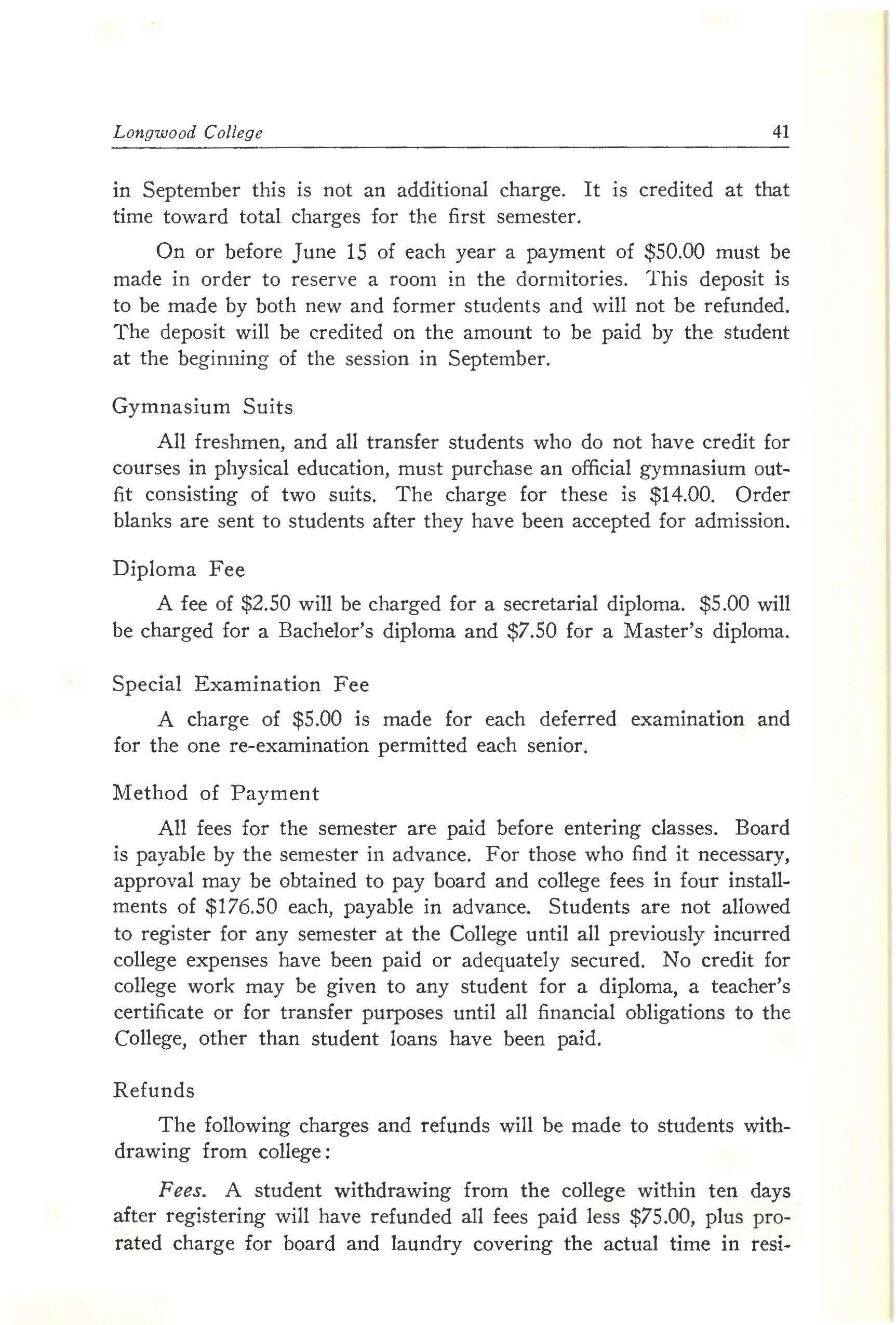
All freshmen, and all transfer students who do not have credit for courses in physical education, must purchase an official gymnasium outfit consisting of two suits. The charge for these is $14.00. Order blanks are sent to students after they have been accepted for admission.
A fee of $2.50 will be charged for a secretarial diploma. $5.00 will be charged for a Bachelor's diploma and $7.50 for a Master's diploma.
A charge of $5.00 is made for each deferred examination and for the one re-examination permitted each senior.
All fees for the semester are paid before entering classes. Board is payable by the semester in advance. For those who find it necessary, approval may be obtained to pay board and college fees in four installments of $176.50 each, payable in advance. Students are not allowed to register for any semester at the College until all previously incurred college expenses have been paid or adequately secured. No credit for college work may be given to any student for a diploma, a teacher's certificate or for transfer purposes until all financial obligations to the College, other than student loans have been paid.
The following charges and refunds will be made to students withdrawing from college:
Fees. A student withdrawing from the college within ten days after registering will have refunded all fees paid less $75.00, plus prorated charge for board and laundry covering the actual time in resi-
dence. This amount not refunded includes $15.00 for registration, $10.00 application fee, and $50.00 room rent. A student withdrawing from the college after the first ten days, but before the middle of the semester, will have refunded all fees paid less $95.00, plus prorated charge for board and laundry covering the actual time in residence. This amount not refunded includes $15.00 for registration, $10.00 student activity fee, $10.00 application fee, $50.00 room rent, and $10 .00 general expense. In addition to these charges, out-of-state students will pay full tuition for the semester.
After the middle of the semester there will be no refund of fees, out-of-state tuition, or room rent made to a student withdrawing from the college.
Exceptions. Refunds will be made at the discretion of the President of the College to students whose connection with the college terminates on account of personal illness, certified by the College Physician, unavoidable emergency, or whose connection with the College terminates on account of disciplinary action or enforced withdrawal.

Students entertaining guests in the College dining hall are charged the following rates: Breakfast, S0c; lunch, 60c; dinner, 75c.
Former students of the College are always welcome, and are not charged for meals or accommodations for a period not exceeding two days, with the exception of two week ends. On the week ends of the College Circus and May Day, guests, including alumnae, are charged for meals at the rate stated above. The Dean of Women must be notified in advance of a contemplated overnight visit to the College by former students. All available space in the dormitories has been used to room students.
Students are not permitted to invite guests for week end visits unless the invitation is approved by the Dean of Women. Meals for guests, other than alumnae, are charged at the rate stated above. Meal tickets may be secured from the Business Office or the Home Office.
The College maintains a Campus Bank in the Treasurer's Office. Students should deposit spending money in the Student Deposit Account and withdraw it as needed.
The College offers three types of financial assistance to students in need of such aid: part-time employment, scholarships, and loans.
A limited number of part-time positions are available each year in the dining room, library, and offices of the College. New students employed in the dining room earn $ 250.00 per session. After one session, students may earn $325 .00 per ses s ion . Those employed in clerical and library positions may earn from $100.00 to $150.00 per ses sion. Application for a part time position should be made to the Executive Secretary before May 1. Early application is advised.
Alumnae Scholarships. The following Alumnae chapters give scholarships to outstanding graduates of high schools in their respective communities: Farmville ( Mary White Cox Memorial Scholarship), Lynchburg, Norfolk, Peninsula (J. L. Jarman Scholarship), Richmond, and Roanoke.
Dabney Stewart Lancaster Scholarship. Established in 1955 by the Student Government Association. This scholarship is awarded annually to a member of the sophomore, junior or senior class . The name of the winner of the award is announced at Senior Assembly in May.
Eureka Ashburn Oli1Jer Scholarship. The Mrs. Samuel C. Oliver (Eureka Ashburn, 1891-93) scholarship of $100 each year for four years awarded to lineal descendants _ If there should be no lineal descendant, then the scholarship is to be given to students of outstanding ability who need financial assistance from Nansemond County, selected at the discretion of the Admissions Committee of the College. When there are no applicants, the funds shall accumulate until there are applicants from her lineal descendants or from N ansemond County.
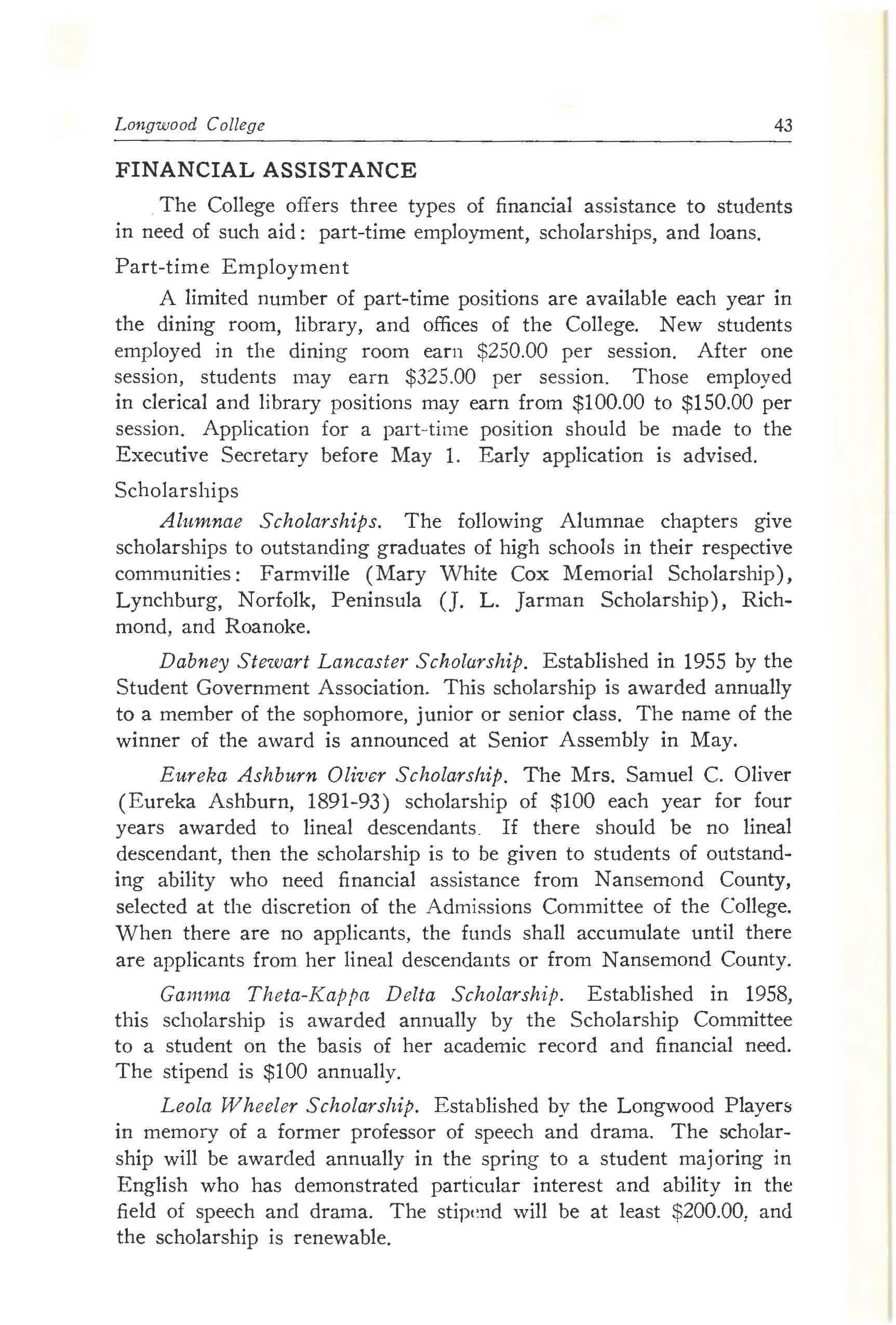
Gamma Th eta-Kappa Delta Scholarship. Established in 1958, this scholarship is awarded annually by the Scholarship Committee to a student on the basis of her academic record and financial need. The stipend is $100 annually.
Leola Whe eler Scholarship. Est a blished by the Longwood Player,; in memory of a former professor of speech and drama. The scholarship will be a warded annually in the spring to a student majoring in English who has demonstrated particular interest and ability in the field of speech and drama. The stipt'.nd will be at least $ 200.00, and the scholarship is renewable.
Lions Club Scholarships. The Farmville Lions Oub offers annually two scholarships of $150.00 each to be awarded to a boy and a girl from Prince Edward County c.,r vicinity. The main factor in choosing between acceptable applicants shall be financial need. All other factors being equal, preference shall be given to applicants for Hampden-Sydney College and Longwood College. The scholarships are renewable.
Longwood Scholarships for Freshmen . In 1952, the General Assembly of Virginia enacted legislation permitting state colleges to utilize a part of their state student loan funds as scholarships for freshmen and sophomores of outstanding ability who need financial assistance in order to attend college. On the basis of this authorization, Longwood Coll eg e will award each year a limited number of scholarships to freshmen , each worth from $300 to $500 for the year. A few others may be awarded to sophomores whose academic records in th.eir freshmen year are outstanding.

A student may apply for a Longwood Scholarship during her senior year in high school. Each applicant must meet the following requirements :
1. Rank academically in the highest fourth of the senior class in high school.
2. Earn an above-average ia;core on the test of scholastic aptitude now administered to all Virginia high school students or an aboveaverage score on a similar test, according to national norms .
3. Be enrolled in, or a graduate of, a Virginia high school.
4. Present evidence of need for financial assistance in order to attend college.
These scholarships are outright grants of funds, not repayable by the students receiving them. Students to whom they are awarded are permitted to enroll in any program of study offered by the College.
Students who wish to apply for this assistance should write to the Dean of the College, describing their accomplishments and activities in high school, indicating the program of study they should like to undertake in college, and stating their need for financial assistance. Such letter must be submitted prior to April 1 of each year. Each applicant must have three persons, one of whom shall be the principal of the high school in which she is enrolled or from which she was graduated, send letters of recommendation to the Dean of the College.
Awards will be announced not later than June 1 of each year. The number of awards made will be dependent upon the amount of funds available and the qualifications and needs of students applying. Winners of scholarships will receive one-half of the grant at the beginning of each of the two semesters in the college year.
Scholarships for Prospective Teachers. The General Assembly of Virginia has provided a number of scholarships for students in Virginia colleges who are residents of the State and who are enrolled in approved courses of study preparing them to be teachers in the public elementary and secondary schoois. These scholarships are valued at $350.00 per year. They are open to qualified sophomores, juniors, and seniors. Freshmen who have superior academic records in high school, who earn superior scores on a standard scholastic aptitude test, and who appear to be personally qualified for careers in teaching, are likewise eligible. For each year that the student receives a scholarshir,, she must agree to teach in Virginia's public schools one year, thereby cancelling the indebtedness and interest. If she does not teach, she must repay the amount received plus interest.
All scholarship applications must be endorsed by the college and sent to the State Department of Education, Richmond, prior to July 1.
Unless 1t is otherwise noted in the description of the funds listed below, applic:ations for loans should be made to the Dean of the College. Except in cases where a different rate is indicated, all loans bear three per cent interest. Loan funds are used to aid worthy students.
Alpha Kappa Gamma Loan. This loan of $100.00 is awarded annually in memory of Edith Stevens, Associate Professor of Biology at Longwood College from 1925 to 1945. Interest at 2 per cent begins on the date of graduation or upon leaving college.
Alpha Phi Sigma Loan Fund. Established in 1931 by Alpha Phi Sigma Society.
Alpha Sigma Alpha Loan Fund. Established by the Alpha Sigma Alpha Sorority March 6, 1937.
Alpha Sigma Tau Loan Fund. Established by the Alpha Sigma Tau Sorority in March, 1942.

Bull e tin of
Carrie Fowles Memorial Loan Fund. Established in 1945 by the will of Mrs. Lula Bradshaw Turpin in memory of Carrie Fowles, who was a student at the College in 1899.
Cunningham Memorial Loan Fund. The alumnae of the College who were graduated during the administration of Dr. John A. Cunningham, from 1886 to 1896, raised a fund, intending to establish a scholarship in memory of his faithful and loving service to them and to the State, feeling that the most fitting tribute that could be paid him would be the effort to give to those who are unable to obtain it for themselves the training for the work to which he devoted his life. When this fund amounted to $1,000 it was changed from a scholarship to a loan fund.
Daughters of the American Revolution Loan Fund. The Daughters of the American Revolution have established a student loan fund for the aid of worthy students in Virginia colleges. Not more than $300 is available for any one institution, and no student may borrow more than $300 or more than $150 in one session. This loan is available only to juniors and seniors.
Daughters of the American Revolution Loan Fund. Thomas Nelson Ompter, Arlington, Virginia. A revolving loan fund of $100, without interest, has been made available by the Chapter. Preference will be given to applicants from the Arlington area of Virginia.

Fay Byrd Johnson Memorial Loan Fund. Established in 1930 by the Mu Omega Sorority.
Gamma Theta Alumnae Loan hmd. In 1949 the Gamma Theta local sorority ( 1911-1949) became the reactivated Alpha chapter of the Kappa Delta national sorority. The two Gamma Theta loan funds are being continued as the Gamma Theta Alumnae Loan Fund in memory of the local sorority.
Jennie Masters Tabb Memorial Fund. The alumnae and friends of Jennie Masters Tabb, Registrar in the College and secretary to the President from 1904-1934, established in 1945 a loan fund in her memory.
J. L. Jarman Loan Fund. The Norfolk Chapter of the Alumnae Association established in 1942 a loan fund in honor of Dr. J. L. Jarman.
Junior Woman's Club Loan F u nd. The fund was established by the Farmville Junior Woman's Club in 1938. It is to be used to assist local students.
Longwood Players Loan Fund. Established by the Dramatic Club, March, 1940.
Mary White C o.i- Memorial Loan Fund. Established in 1945 as a memorial to Miss Mary vVhite Cox by a gift from an alumna of the College.
Methodist Student Loan Fund. Available to qualified Methodist students. Application should be made to the Director, \i\lesley Foundation, Farmville, Virginia .
Prince Edward Chapter Alumnae Loan Fund. This fund was started as a branch of the Virginia Normal League. For years many Prince Edward County girls received assistance from this fund without interest. Loans are made now at a small rate of interest. Applications for loans should be made to Mrs. W. J. Sydnor, Farmville, Virginia.
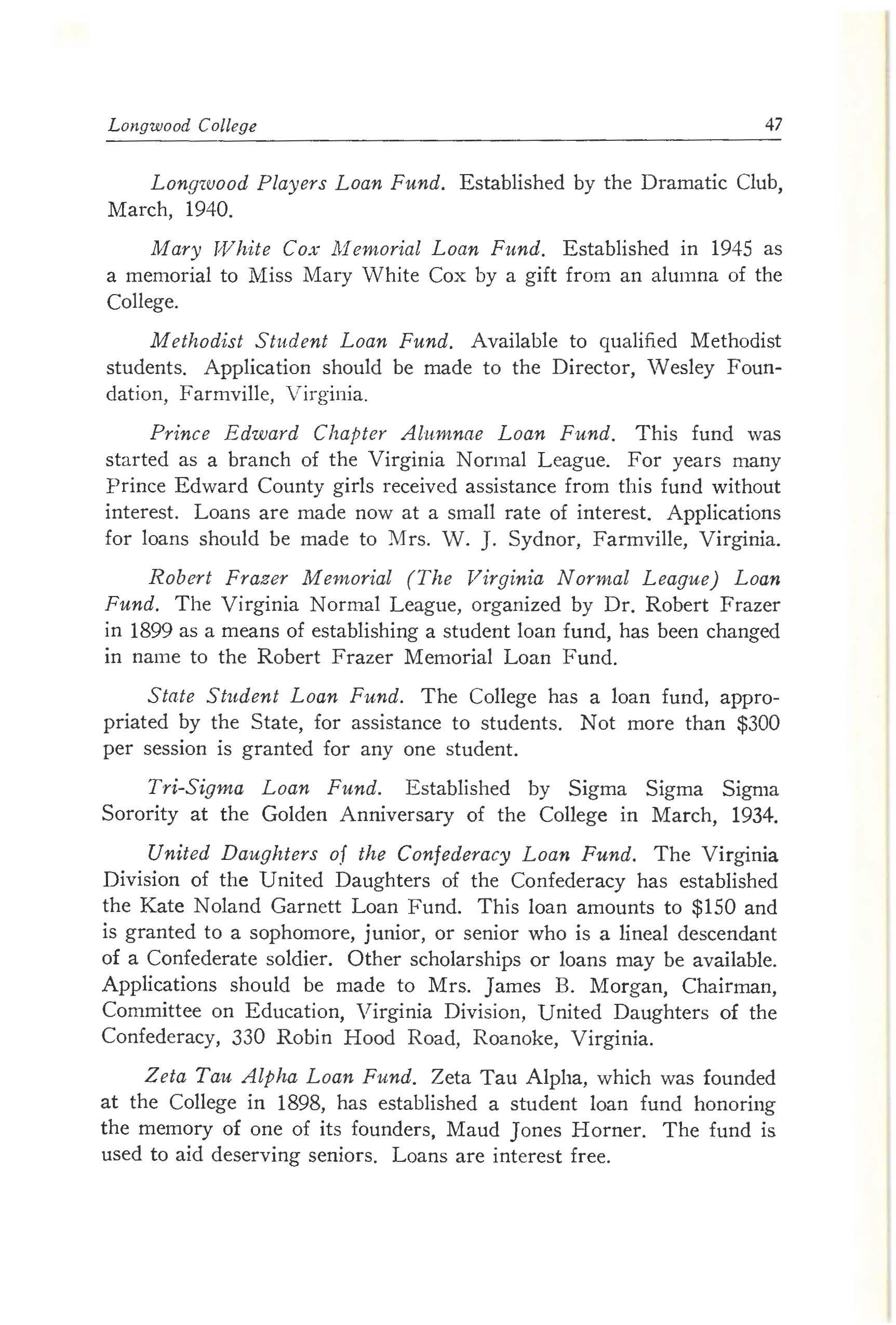
Robert Frazer Memorial (The Virginia Normal League) Loan Fund. The Virginia Normal League, organized by Dr. Robert Frazer in 1899 as a means of establishing a student loan fund, has been changed m name to the Robert Frazer Memorial Loan Fund.
State Student Loan Fund. The College has a loan fund, appropriated by the State, for assistance to students. Not more than $300 per session is granted for any one student.
Tri-Sigma Loan Fund. Established by Sigma Sigma Sigma Sorority at the Golden Anniversary of the College in March, 1934.
United Daughters of the Confederacy Loan Fund. The Virginia Division of the United Daughters of the Confederacy has established the Kate Noland Garnett Loan Fund. This loan amounts to $150 and is granted to a sophomore, junior, or senior who is a lineal descendant of a Confederate soldier. Other scholarships or loans may be available. Applications should be made to Mrs. James B. Morgan, Chairman, Committee on Education, Virginia Division, United Daughters of the Confederacy, 330 Robin Hood Road, Roanoke, Virginia.
Zeta Tau Alpha Loan Fund. Zeta Tau Alpha, which was founded at the College in 1898, has established a student loan fund honoring the memory of one of its founders, Maud Jones Horner. The fund is used to aid deserving seniors. Loans are interest free.
Summarized in this section are important regulations related to academic work in the College. Students should be familiar with these as they undertake their studies in this institution.
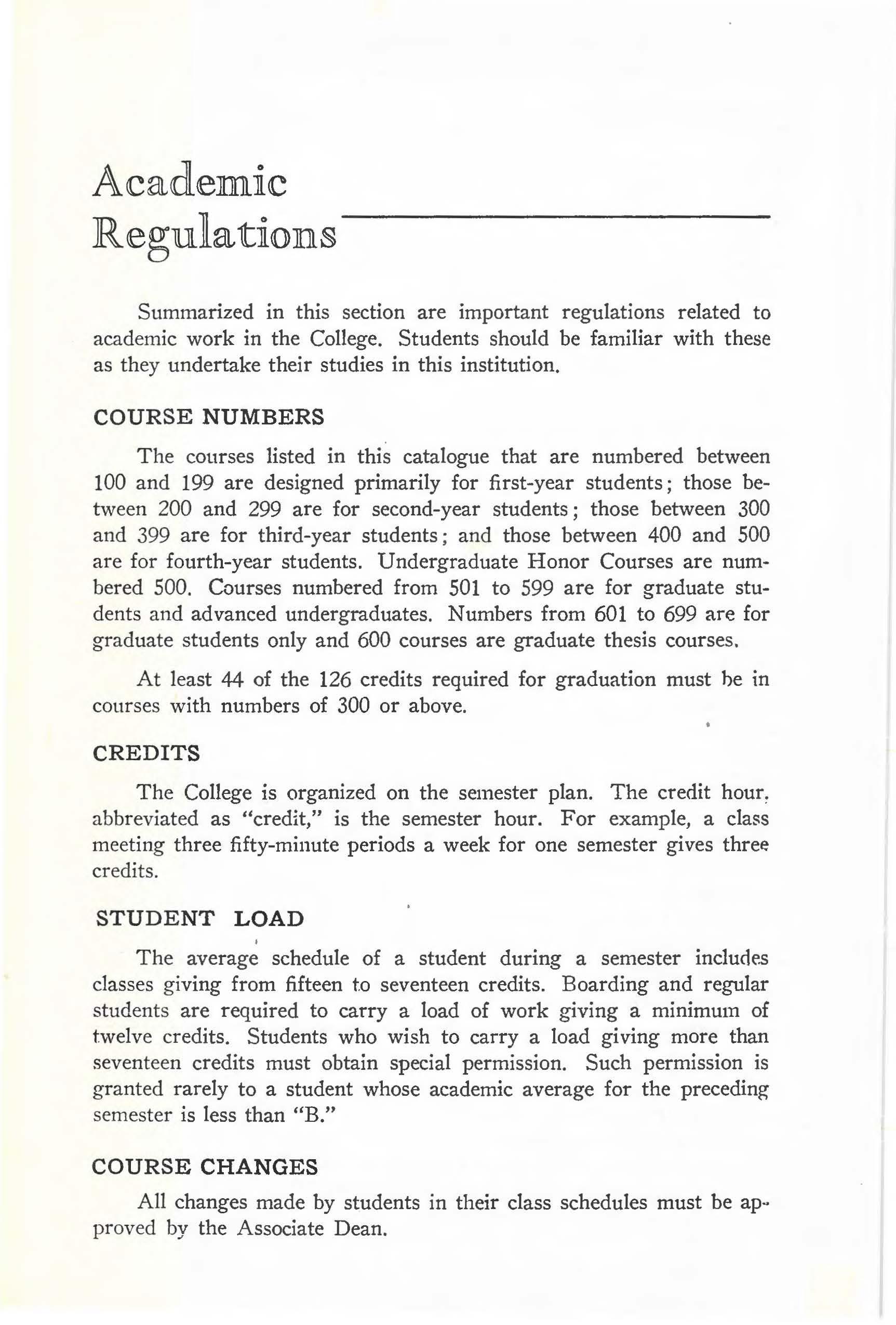
The courses listed in this catalogue that are numbered between 100 and 199 are designed primarily for first-year students; those between 200 and 299 are for second-year students ; those between 300 and 399 are for third-year students ; and those between 400 and 500 are for fourth-year students. Undergraduate Honor Courses are numbered 500. Courses numbered from 501 to 599 are for graduate students and advanced undergraduates. Numbers from 601 to 699 are for graduate students only and 600 courses are graduate thesis courses.
At least 44 of the 126 credits required for graduation must he in courses with numbers of 300 or above.
The College is organized on the semester plan. The credit hour. abbreviated as "credit," is the semester hour. For example, a class meeting three fifty-minute periods a week for one semester gives three credits .
'
The average schedule of a student during a semester includes classes giving from fifteen to seventeen credits. Boarding and regular students are required to carry a load of work giving a minimum of twelve credits. Students who wish to carry a load giving more than seventeen credits must obtain special permission. Such permission is granted rarely to a student whose academic average for the preceding semester is less than "B."
All changes made by students in their class schedules must be ap~ proved by the Associate Dean.
No student is permitted to enroll in a course for credit later than two weeks after classes begin in any semester. The exact date will be announced at the beginning of each semester. Any student who withdraws from or "drops" a course after four weeks from the date that classes begin in any semester will receive a grade of "F" in the course unless the withdrawal is due to advice of the College Physician or the student withdraws from college.
No credit is allowed for any course taken for which the student has not registered and which is not listed on the approved schedule card filed in the Registrar's office.
The College recognizes that the prior achievement of the students whom it admits varies greatly in the subject matter fields. For example, some are much more proficient in a subject such as English grammar than are others. As a result, any requirement that all students must enroll in identical basic courses in the freshman or later years usually results in heterogeneous classes in which the well-prepared student is not challenged or the student with the usual preparation is confronted with exceedingly difficult tasks.

Because of these differences in prior achievement, the College offers every student an opportunity to demonstrate her achievement in a required subject prior to enrolling in it . This may be done by the use of an oral or written examination, or a conference, at the discretion of the faculty member involved. At times, this evaluation may be made after the student has been enrolled in a course for one semester. Unusual proficiency demonstrated in the first semester of a two-semester course may indicate that the student should not continue in the same course but enroll in one of a more advanced nature.
In any case wherein the student is found to have a satisfactory knowledge of a subject prior to enrolling in it, or after completing a part of her study in it, the chairman of the department in which the subject is taught will notify the Registrar. In such a notification, he will state that the student is excused from taking the subject and will indicate the subject or course that may be taken in its stead. This may be an advanced course in the same subject or an elective course in any field to be selected by the student.
so Bulletin of
As the above indicates, the student is not granted college credit for prior achievement. However, recognition of such achievement enables her to plan a program of study that is challenging and in accord with her needs.
Longwood College offers advanced standing to superior students in the fields of English composition, literature, European history , American history, French, Spanish, biology, chemistry, physics, mathematics, and music. Advanced Placement examinations, with the exception of music, are given by the COLLEGE ENTRANCE
BOARD . It should be noted that these are different from the usual College entrance e..'Caminations given by the same Board. This Board makes available each year in May, and at regular examination centers, advanced placement examinations in the several fields. Any student whose performance on these tests is satisfactory will be allowed to skip the beginning course in the particular field and obtain the semester hours of credit which that course carries toward the bachelor ' s de g ree For example, if the student takes the advanced placement examination in American history and makes a satisfactory score, that student will not be required to take the beginning course in American history, and he will be granted six semester hours of credit toward his degree on the basis of the examinat~on. The examinations are administered by the Educational Testing Servic~. Detailed information on testing dates. examination centers, and all other matters relating to the administration of the examinations, is available without cost in the bulletin of information entitled "Advanced Placement Examinations." This bulletin may be obtained by writing to: College Board Advanced Placement Examinations, Box 592, Princeton, New Jersey.
Examinations for advagced standing in music are administered by the Longwood College music faculty by appointment. Requests for such examinations in music should be filed with the Chairman of the Music Department, Longwood College, Farmville, Virginia.
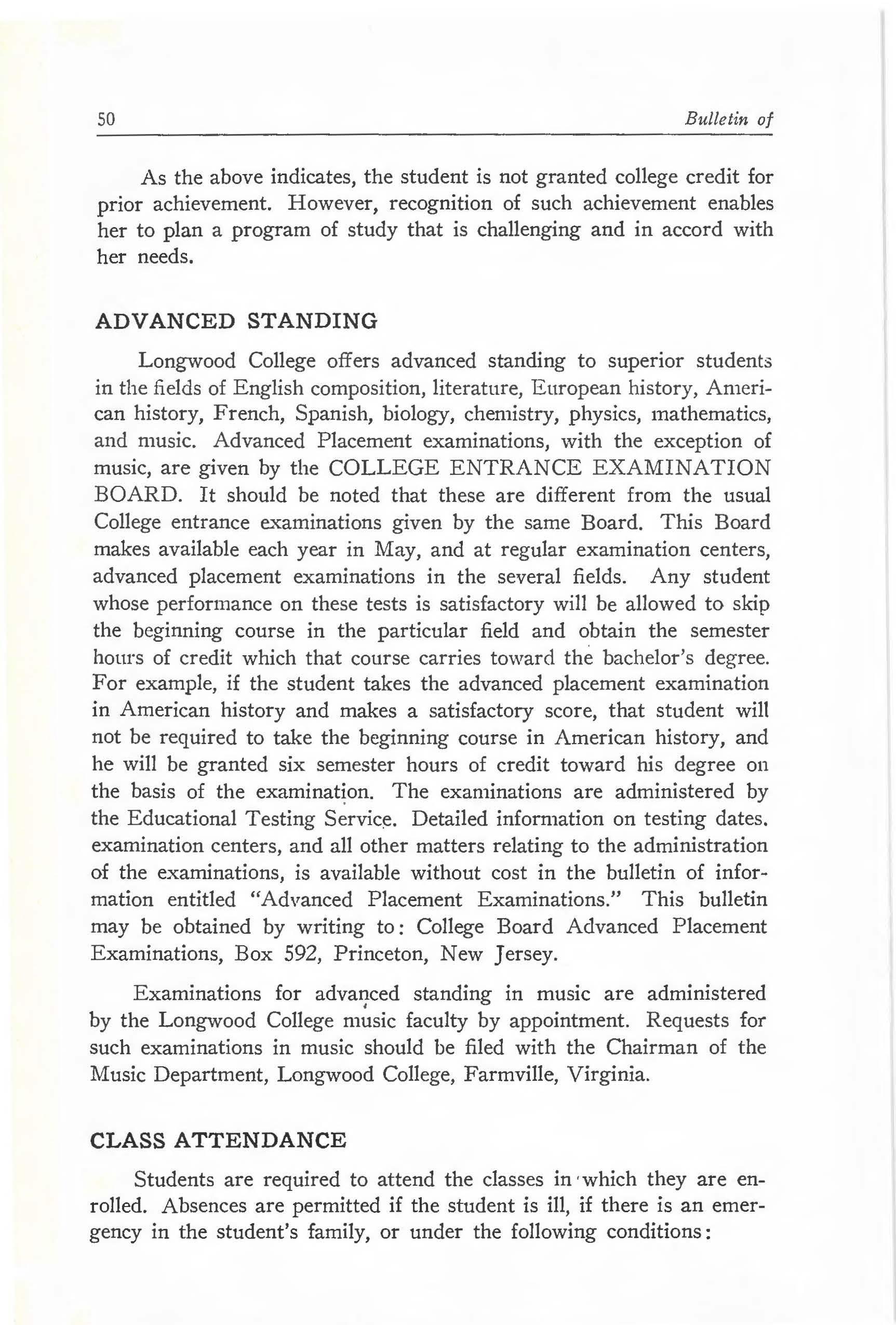
Students are required to attend the classes in ·which they are enrolled. Absences are permitted if the student is ill, if there is an emergency in the student's family, or under the following conditions:
1. A student whose name appears on the Dean's List for the preceding semester is entitled to be absent from classes on any day that she can use her time in ways that seem to her more profitable.
2. A student with a "B" average for the preceding semester is entitled to three absences from each class during a semester.
3. A student with a "C" average for the preceding semester and who received no grade of "F" is entitled to two absences from each class during a semester. (Freshmen and transfer students are assumed to have averages of "C" during the first semester of their enrollment.)
4. A student with less than a "C" average for the preceding semester is entitled to one absence from each class during the semester. No credit will be given for any course in which a student fails to attend at least two-thirds of the class meetings, even though her absences are due to illness or emergency.
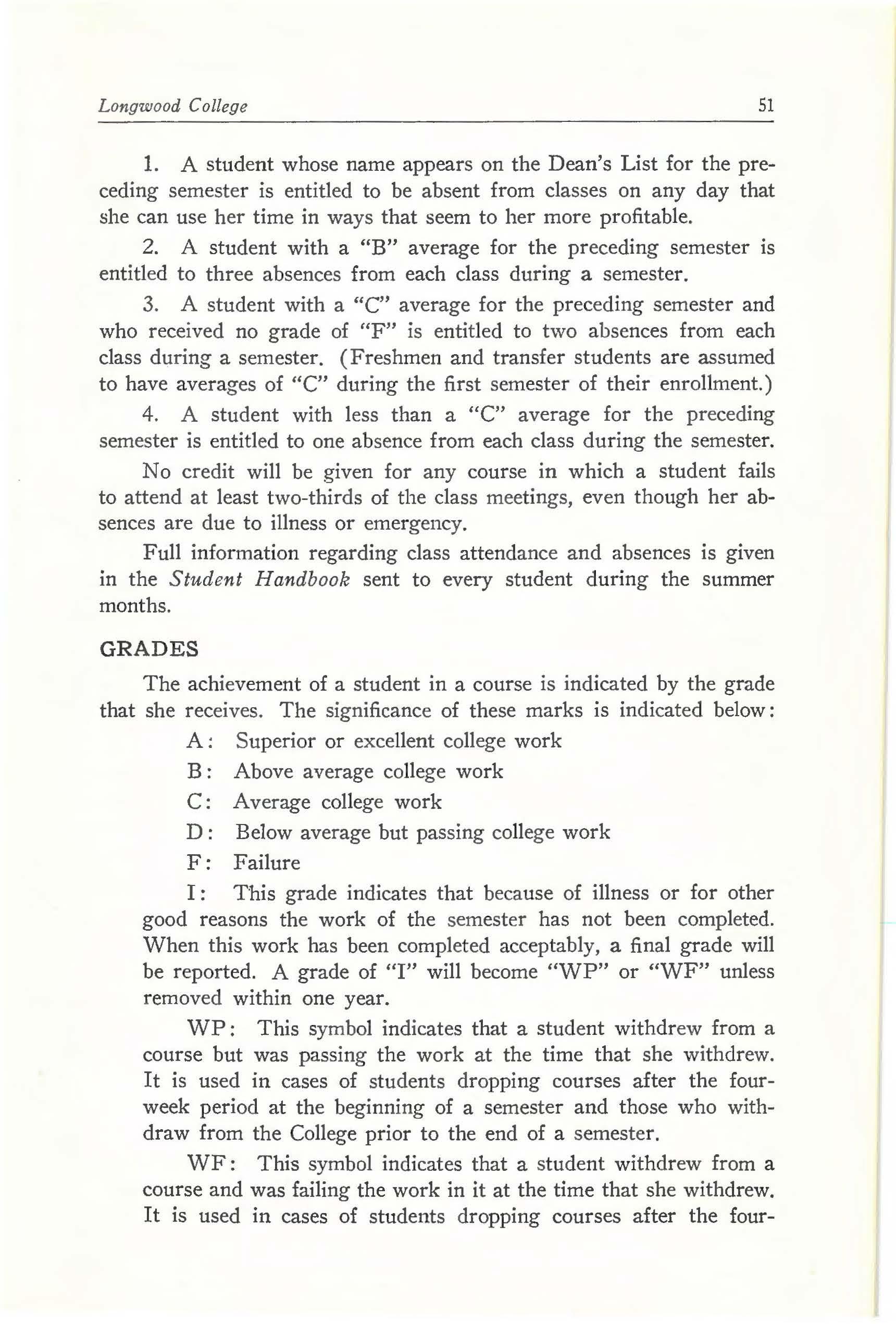
Full information regarding class attendance and absences is given in the Student Handbook sent to every student during the summer months.
The achievement of a student in a course is indicated by the grade that she receives. The significance of these marks is indicated below:
A : Superior or excellent college work
B : Above average college work
C : Average college work
D : Below average but passing college work
F: Failure
I: This grade indicates that because of illness or for other good reasons the work of the semester has not been completed. When this work has been completed acceptably, a final grade will be reported. A grade of "I" will become "WP" or "WF" unless removed within one year.
WP: This symbol indicates that a student withdrew from a course but was passing the work at the time that she withdrew. It is used in cases of students dropping courses after the fourweek period at the beginning of a semester and those who withdraw from the College prior to the end of a semester.
WF : This symbol indicates that a student withdrew from a course and was failing the work in it at the time that she withdrew. It is used in cases of students dropping courses after the four-
week period at the beginning of a semester and those who withdraw from the College prior to the end of a semester.
The lowest passing grade is "D." However, for a degree or a certificate a student must earn a general average of "C" ( a quality point average of 1.00) on all of her college work. She must have also a general average of "C" in those courses constituting her major subject or field At times, it is necessary for a student to repeat certain courses or enroll in additional courses in order to raise her averages to these requirements.
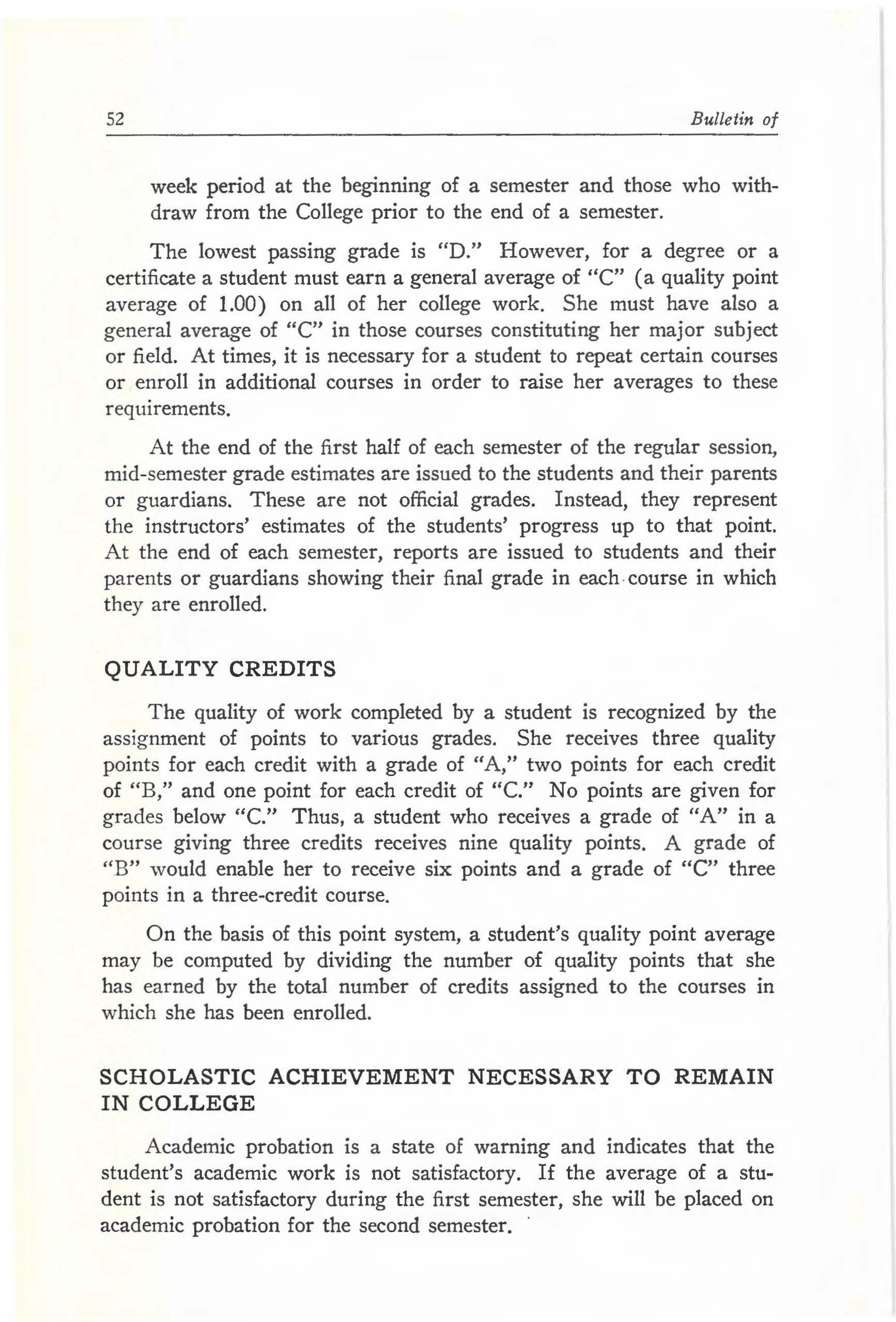
At the end of the first half of each semester of the regular session, mid-semester grade estimates are issued to the students and their parents or guardians. These are not official grades. Instead, they represent the instructors' estimates of the students' progress up to that point. At the end of each semester, reports are issued to students and their parents or guardians showing their final grade in each course in which they are enrolled.
The quality of work completed by a student is recognized by the ass ignment of points to various grades. She receives three quality points for each credit with a grade of "A," two points for each credit of "B," and one point for each credit of "C." No points are given for grades below "C." Thus, a student who receives a grade of "A" in a course giving three credits receives nine quality points. A grade of "B" would enable her to receive six points and a grade of "C" three points in a three-credit course.
On the basis of this point system, a student's quality point average may be computed by dividing the number of quality points that she has earned by the total number of credits assigned to the courses in which she has been enrolled.
Academic probation is a state of warning and indicates that the student's academic work is not satisfactory. If the average of a student is not satisfactory during the first semester, she will be placed on academic probation for the second semester. ·
Students will be placed on probation if their averages fall below the following: freshmen, 0 .50; sophomores , 0.78 ; juniors , 0.90. In order to be eligible to return for another session, a student must attain the academic average of her classification.
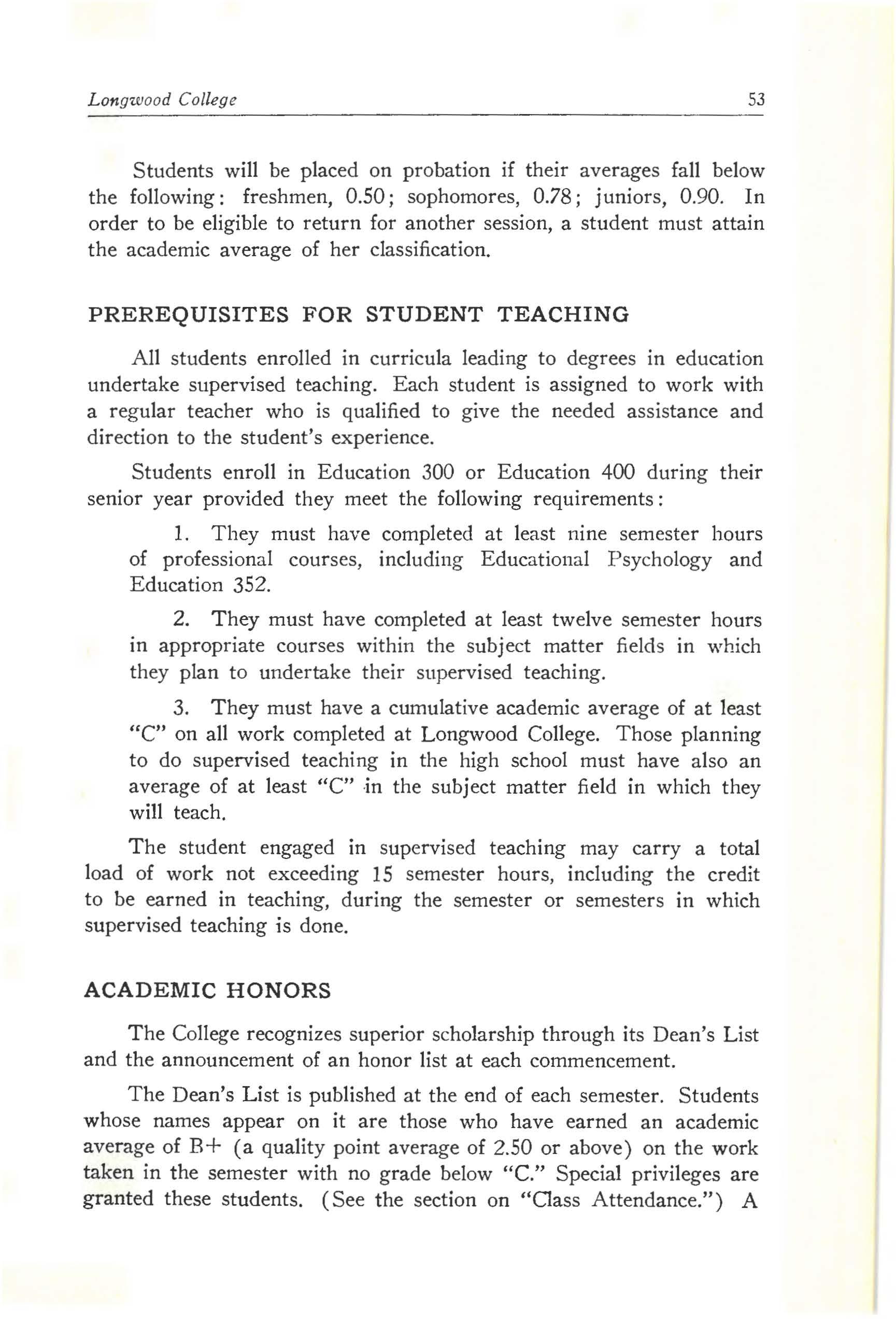
All students enrolled in curricula leading to degrees in education undertake supervised teaching. Each student is assigned to work with a reg ular teacher who is qualified to give the needed assistance and dir ection to the student's experience.
Students enroll in Education 300 or Education 400 during their senior year provided they meet the following requirements :
1. They must have completed at least nine semester hours of professional courses, includin g Educational P sy chology and Education 352
2. They must have completed at least twelve semester hours in appropriate courses within the subject matter field s in which the y plan to undertake their supervised teaching.
3. They must have a cumulative academic average of at least "C" on all work completed at Longwood College. Those planning to do supervised teaching in the high school must have also an average of at least "C" in the subject matter field in which they will teach .
The student engaged in supervised teaching may carry a total load of work not exceeding 15 semester hours, including the credit to be earned in teaching, during the semester or semesters in which supervised teaching is done.
The College recognizes superior scholarship through its Dean's List and the announcement of an honor list at each commencement.
The Dean's List is published at the end of each semester. Students whose names appear on it are those who have earned an academic average of B + (a quality point average of 2.50 or above) on the work taken in the semester with no grade below "C." Special privileges are granted these students. ( See the section on "Oass Attendance.") A
student's name may be removed from the list at the middle of the semester if her mid-semester grade estimates do not meet the required standard.
Those students whose general averages for four years of study are above B+ (a quality point average of 2.35 or above) are graduated "With Honor."
Written examinations are given during a designated period at the end of each semester and summer session to every student enrolled in each course in the College. These are each three hours in length.
Deferred examinations for the first semester must be taken within thirty days after the beginning of the second semester. Those deferred from the second semester must be taken during the summer session or during the last two days preceding the date set for the return of upperclassmen to the College in September. Those deferred from the summer session must be removed during the same two days. ( See page 41 for fees).
Re-examinations are not permitted for freshmen, sophomores, or juniors. A senior student is permitted one re-examination during her senior year. This may be in either the first or second semester. If it is the first, she is not entitled to another in the second semester.
Students may repeat courses in which they have passing grades in an effort to raise such grades. However, when this is done the grade earned when the course is repeated will be the one utilized by the College in computing the student's average or evaluating her record for the purposes of graduation even if the grade is lower than the one received when the student enrolled in the course for the first time.

All grades earned by a student are recorded on her record in the office of the Registrar. Thus when a grade of "F" is raised to a higher grade by the repetition of a course, a line is drawn through the "F" and the new grade is recorded by it, indicating that the "F" has been removed and that the student has demonstrated greater achievement in the subject.
The College accepts, on transfer, credits of acceptable grade earned in other accredited colleges and universities provided such credits may be applied toward the requirements for a degree in this institution.
Credits of a grade quality of below "C" are not accepted on transfer unless there is definite evidence that the student has attained a greater mastery of the subject than the grade indicates.
The scholastic indexes of transfer students are computed twice. One index includes only the work taken at Longwood College; the other includes all work taken at Longwood College and els ew here (including D's and F's which are not transferable) . The lower of the two is considered the official scholastic index for purposes of the award of academic honors and election to honor societie s . This regulation applies also to regularl y enrolled students who may take extension, correspondence , or summer session work in another institution
Not more than fourteen semester hours of correspondence course credit and not more than thirty semester hours of extension class and correspondence study combined may be credited toward a degree . The College does not accept, on transfer , credits earned through correspondence courses in the natural and physical sciences and certain other subjects. Students must obtain approval to include in their degree program correspondence and extension courses prior to enrolling in them. Otherwise, the College can assume no responsibility for accepting such credits on transfer.

The College cannot grant a student permission to enroll in a correspondence or e x tension course until after the student has attended this institution for at least one full summer session or a semester of the regular ses sion.
When a student is enrolled in the College and enrolls also in a correspondence or extension course, the credit to be earned in the course will be counted in the total load of work that she is permitted to take.
The College awards the bachelor's degree to a student who has fulfilled the following requirements :
1. Completion of all study required in one of the eight curricula offered by the College.
2. Completion of a course of study g1vmg a minimum of 126 semester hours of credit with a minimum general average of "C" ( or 1.00 quality points) in all work taken and a minimum general average of "C" in courses taken in the major subject or field.
3. Attendance as a student for at least one session consisting of two semesters, including the last semester immediately preceding graduation. (Two consecutive summer sessions may be substituted for one semester. A summer session would consist of one eight-week term or one three-week term plus one five-week term.)
4. Approval of the individual by the general faculty as a worthy candidate for graduation.
Progressive development in the College forces frequent revision of curricula. In every new catalogue some improvements are indicated. When no hardship is imposed on the student because of changes, and when the facilities of the College permit, the student is expected to meet the requirements of the latest catalogue. In this way, the student may realize the benefits of improvements in her curriculum that she would be unable to realize were she to follow the curriculum tabulated in the catalogue at the time that she entered the College.
Students returning to the College after an interruption of four or more years of their college study are required to conform to the requirements of the latest catalogue.
As indicated in the curricula outlined in this catalogue all freshmen enroll in a program of study which is essentially the same regardless of the curricula in which they plan to major or specialize. During the first year, the student studies English; history or geography; a science; physical education ; and two courses selected on the basis of her tentative plans for the future. Suggestions are made in the outline of each curriculum regarding these courses. A definite choice of a curriculum and major is not made until the beginning of the sophomore year. Thus, the student who is uncertain as to her choice of a major or a curriculum may explore the opportunities available to her. The College offers assistance to her in making such a choice. See the section of this catalogue entitled "Student Personnel Program."
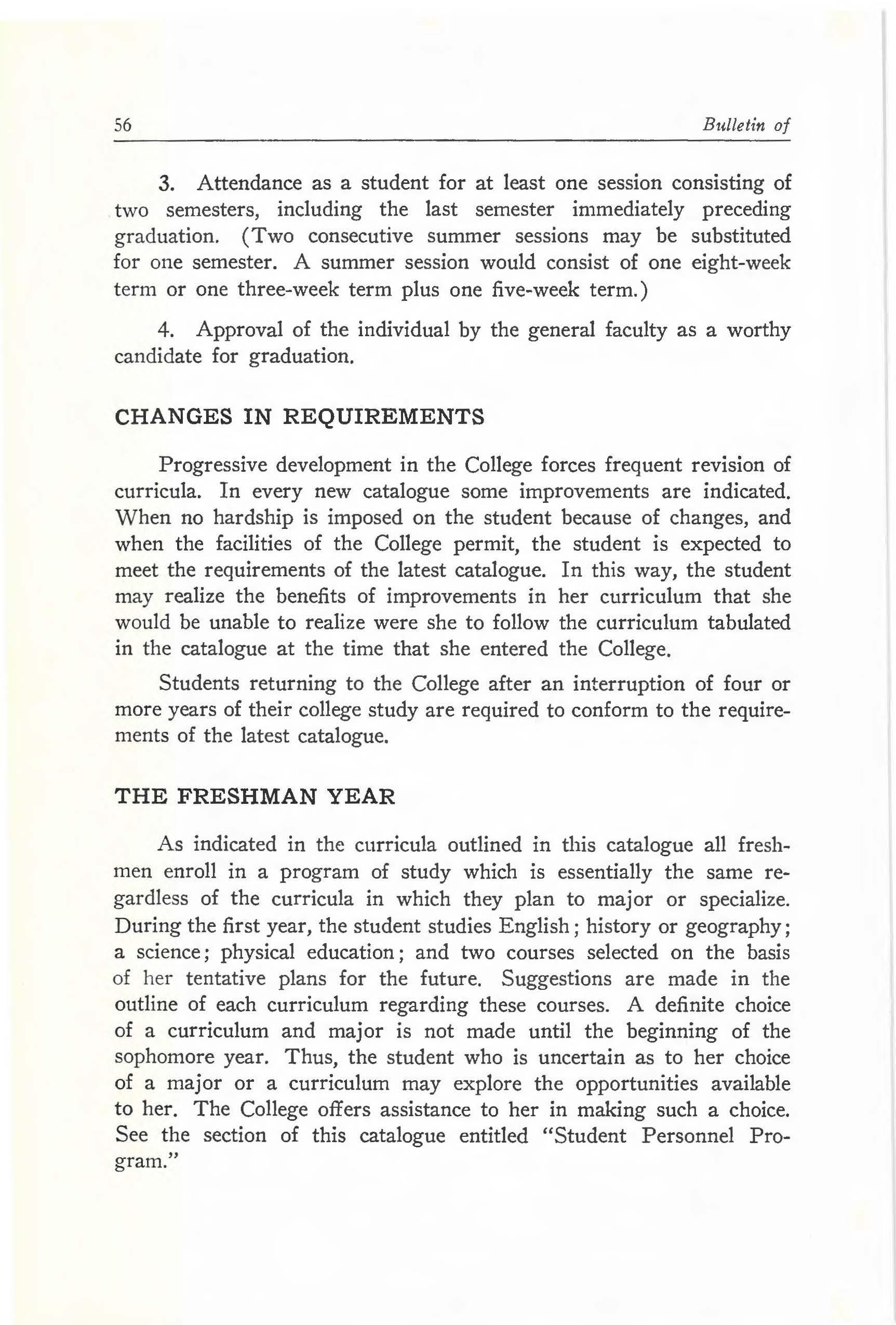
The course of study outlined below leads to the degree of Bachelor of Science in Elementary Education. Students receiving this degree are fully qualified to be teachers in kindergartens and elementary schools. The Virginia State Board of Education will issue to them the Collegiate Professional Certificate. Students enrolled in this curiculum may obtain sufficient credit, through elective courses, to qualify for teaching in one of the high school subject matter fields.

First semester Second semester
English 111-112 3 3 History 111-112 or Geography 141-142 . . . . . . 3 3 Science 141, 142 4 4 Physical Education 111, 112 1 1 Music 123, 124 . . . . . . . . . . . . . . . . . . . . . . . . . . . . 1 1 Home Economics 121 or elective 3 0 Art 121 or elective 0 3
Total hours of credit 15 15
First semester Second semester
English 215, 216 . . . . . . . . . . . . . . . . . . . . . . . . . . . 3 3
Psychology 251, 252 3 3 History 221-222 3 3 Music 223, 224 . . . . . . . . . . . . . . . . . . . . . . . . . . . . 1 1 Mathematics 123 3 0 Geography 211, 212 3 3 Electives . . . . . . . . . . . . . . . . . . . . . . . . . . . . . . . . . . 0 2
Total hours of credit 16 15
First semester Second semester
Mathematics 323 • 0 3 English 325, 326 (Same as Ed. 325, 326).... 3 3 Art 301 0 3 Music 331 2 0 Science 342 . . . . . . . . . . . . . . . . . . . . . . . . . . . . . . . . 4 0
Physical Education 351, 352 . . . . . . . . . . . . . . . . 2 2 Education 352 0 3 Electives . . . . . . . . . . . . . . . . . . . . . . . . . . . . . . . . . . 6 3
Total hours of credit ............... . 17 17
First semester Second semester Education 451 3 0 Philosophy 460 . . . . . . . . . . . . . . . . . . . . . . . . . . . . 0 3
Health Education 341 2 0 *Education 300 . . . . . . . . . . . . . . . . . . . . . . . . . . . . 6 0 Electives 4 13
Total hours of credit . .............. . 15 16
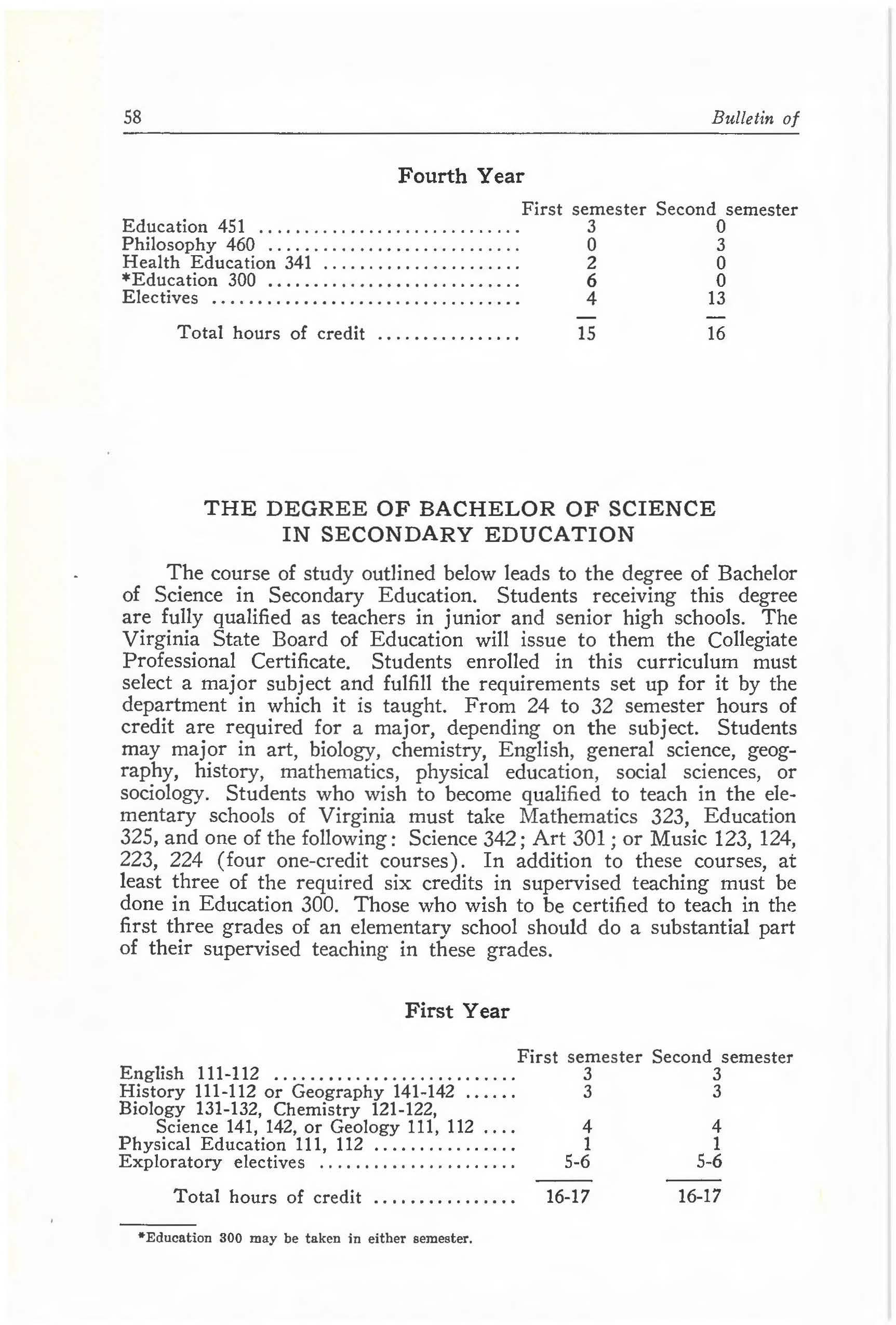
The course of study outlined below leads to the degree of Bachelor of Science in Secondary Education. Students receiving this degree are fully qualified as teachers in junior and senior high schools. The Virginia State Board of Education will issue to them the Collegiate Professional Certificate . Students enrolled in this curriculum must select a major subject and fulfill the requirements set up for it by the department in which it is taught. From 24 to 32 semester hours of credit are required for a major, depending on the subject. Students may major in art, biology, chemistry, English , general science, geography, history, mathematics , physical education , social sciences, or sociology. Students who wish to become qualified to teach in the elementary schools of Virginia must take Mathematics 323, Education 325, and one of the following: Science 342; Art 301; or Music 123, 124, 223, 224 ( four one-credit courses). In addition to these courses, at least three of the required six credits in supervised teaching must be done in Education 300 . Those who wish to be certified to teach in the first three grades of an elementary school should do a substantial part of their supervised teaching in these grades .
First semester Second semester English 111-112 .. .. . .. .. .. .. .. .. .. .. .. .. .. 3 3
History 111-112 or Geography 141-142 . . . . . . 3 3 Biology 131-132, Chemistry 121-122, Science 141, 142, or Geology 111, 112 ... . Physical Education 111, 112 ............... . Exploratory electives ... . . .... ............ .
4 1 5-6
4 1 5-6
Total hours of credit . . . . . . . . . . . . . . . . 16-17 16-17
*Education 300 may be taken in eith er semester.
Longwood Col!l!ge
First seme s ter
Engli sh elective (literature) 3 Psychology 251, 254 . . . . . . . . . . . . . . . . . . . . . . . 3 History 221-222 . . . . . . . . . . . . . . . . . . . . . . . . . . . 3 Mathematics 155-156, or 161-162 3 Phy s ical educati o n elective . . . . . . . . . . . . . . . . . 1
Major Subject . . . . . . . . . . . . . . . . . . . . . . . . . . . . 3-4
Total hours of credit 16-17
First semester
Education 352 0 Art or music (all in one subject) . . . . . . . . . . 3 Health Education 341 2 Major subject 3-4 Electives 7
Total hours of credit 15-16
First se me s ter Philo sop hy 460 . . . . . . . . . . . . . . . . . . . . . . . . . . . . 0
*Educa tio n 400 6 Education 451 . . . . . . . . . . . . . . . . . . . . . . . . . . . . . 3 Major subject or electives 6
Total hour s of credit ........... .... . 15
Second seme s ter 3 3 3 J 1 3-4 16-17 Second semester J 3 0 3-4 6 15-16 Second se m es t e r 3 0 0 12 15
The course of study outlined below leads to the degree of Bachelor of Arts in Secondary Education. Students receiving this de g ree are fully qualified as teachers in junior and senior high schools . The Virginia State Board of Education will issue to them the Collegiate Professional Certificate. Students enrolled in this curriculum must select a major subject and fulfill the requirements set up for it by the department in which it is taught. From 24 to 32 semester hours of credit are required for a major, depending on the subject. Students may major in art, biology, chemistry, English, French, general science, geography, history, Latin, mathematics, social sciences, sociology, or Spanish . Students who wish to become qualified to teach in the elementary schools of Virginia must take Mathematics 323, Education 325, and one of the following: Science 342; Art 301; or Music 123, 124,
*Edu cat ion 400 may be tak e n In eit h er semeste r

223, 224 ( four one-credit courses). In addition to these courses, at least three of the required six credits in supervised teaching must be done in Education 300. Those who wish to be certified to teach in the first three grades of an elementary school should do a substantial part of their supervised teaching in these grades.
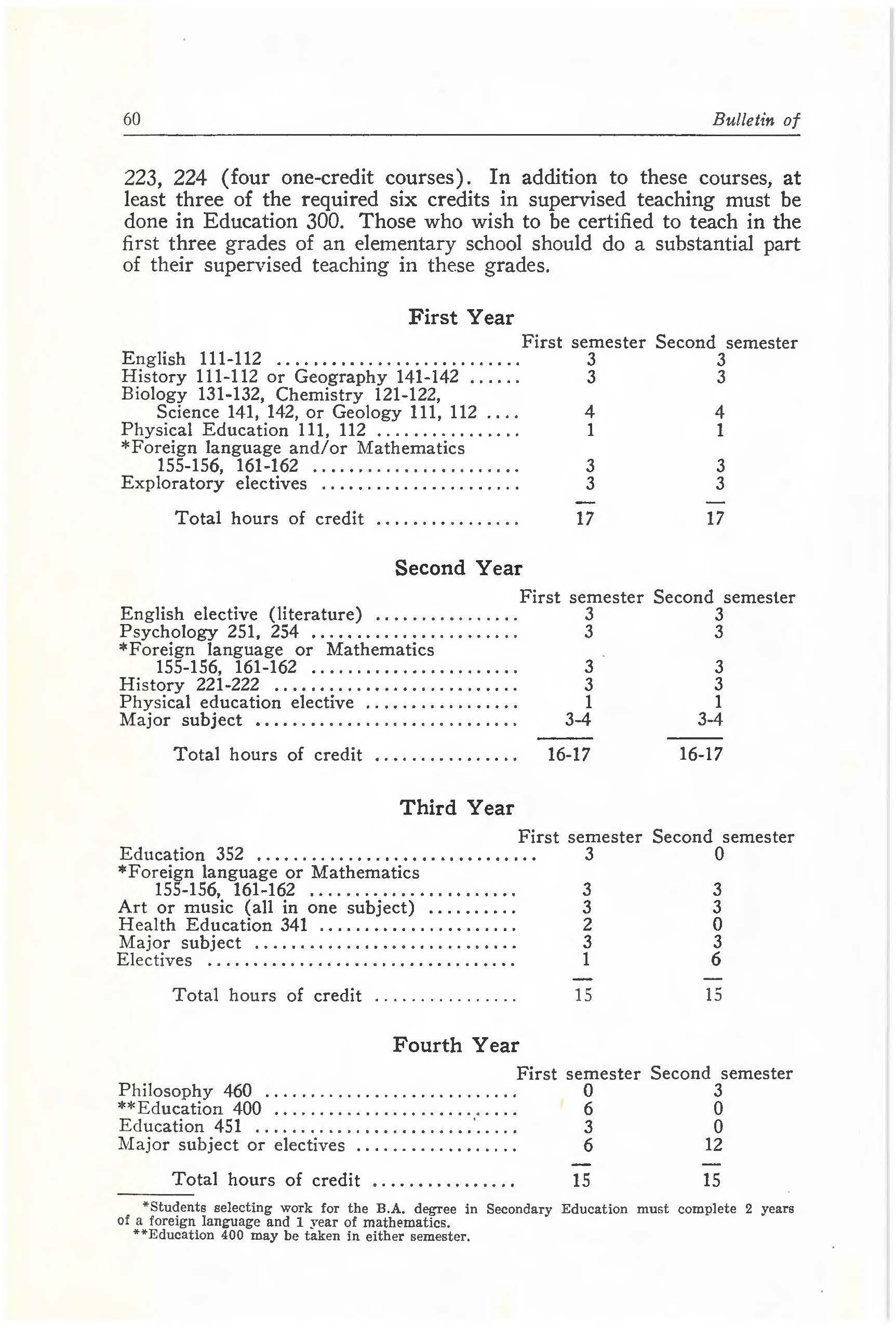
First semester Second semester
English 111-112 . . . . . . . . . . . . . . . . . . . . . . . . . . . 3 3
History 111-112 or Geography 141-142 3 3 Biology 131-132, Chemistry 121-122, Science 141, 142, or Geology 111, 112 ... . Physical Education 111, 112 ............... .
*Foreign language and/or Mathematics 155-156, 161-162 ...................... . Exploratory electives ..................... .
Total hours of credit
4 1 3 3 17
4 1 3 3 17
First semester Second semester
English elective (literature) . . . . . . . . . . . . . . . . 3 3 Psychology 251, 254 • . . . . . . . . . . . . . . . . . . . . . . 3 3
*Foreign language or Mathematics 155-156, 161-162 ...................... . History 221-222 .......................... . Physical education elective Major subject •............................
Total hours of credit
3 3 1 3-4 16-17
3 3 1 3-4 16-17
Year
First semester Second semester Education 352 3 0
*Foreign language or Mathematics 155-156, 161-162 . . . . . . . . . . . . . . . . . . . . . . . 3 3 Art or music (all in one subject) . . . . . . . . . . 3 3
Health Education 341 2 0 Major subject 3 3 Electives . . . . . . . . . . . . . . . . . . . . . . . . . . . . . . . . . . 1 6
Total hours of credit 15 15
First semester Second semester
Philosophy 460 . . . . . . . . . . . . . . . . . . . . . . . . . . . . 0 3
**Education 400 . . . . . . . . . . . . . . . . . . . . . . . . . . . 6 0 Education 451 ....................... .'..... 3 0 Major subject or electives . . . . . . . . . . . . . . . . . . 6 12
Total hours of credit •............... 15 15
*Students selecting work for the B.A. degree in Secondary Education must complete 2 years of a foreign language and 1 year of mathematics.
**Education 400 may be taken in either semester.
The program of study outlined below leads to the degree of Bachelor of Science in Home Economics Education. Students receiving this degree are fully qualified to be teachers of home economics in secondary schools. The Virginia State Board of Education will issue to them the Collegiate Professional Certificate.

First semester Second semester
English 111-112 . . . . . . . . . . . . .. . . . . . . . . . . . . . 3 3 History 111-112 or Geography 141-142 3 3 Chemistry 121-122 . . . . . . . . . . . . . . . . . . . . . . . . 4 4 Physical Education 111, 112 . . . . . . . . . . . . . . . 1 1 Home Economics 121 . . . . . . . . . . . . . . . . . . . . . . 3 0
Home Economics 131, 132 3 3 Electives 0 2
Total hours of credit 17 16
First semester Second semester
Art 121, 20 1 3 3
Home Economics 222, 232 3 3 Home Economics 241 2 0 Mathematics 155, 221 . . . . . . . . . . . . . . . . . . . . . . 3 3 Psychology 251, 254 . . . . . . . . . . . . . . . . . . . . . . . . 3 3 Science 142 • 0 4 Physical education elective ................ ; 1 1
Total hours of credit 15 17
First semester Second semester English elective (literature) . . . . . . . . . . . . . . . . 3 3 History 221-222 ........ ' .. . . . . . . . . . . . . . . . . . 3 3
Home Economics 322 . . . . . . . . . . . . . . . . . . . . . . 0 3
Home Economics 334, 336 . . . . . . . . . . . . . . . . . . 3 3 Home Economics 345 . . . . . . . . . . . . . . . . . . . . . . 3 0 Home Economics 347, 348 2 3 Electives . . . . . . . . . . . . . . . . . . . . . . . . . . . . . . . . . . 1 1
Total hours of credit 15 16
First semester Second semester
Education 451 . . . . . . . . . . . . . . . . . . . . . . . . . . . . . 3 0
*Education 400 . . . . . . . . . . . . . . . . . . . . . . . . . . . . 6 O
Health Education 341 0 2
Home Economics 431 3 0
Home Economics 441 0 4 Home Economics 443 . . . . . . . . . . . . . . . . . . . . . . 0 3
Philosophy 460 . . . . . . . . . . . . . . . . . . . . . . . . . . . . 3 0
Sociology 441 O 3 Electives . . . . . . . . . . . . . . . . . . . . . . . . . . . . . . . . . 0 3
Total hours of credit ............... . 15 15
*Education 400 may be taken in either semester.
The course of study outlined below leads to the degree of Bachelor of Science in Business Education. Students receiving this degree are fully qualified to be teachers of bookkeeping, typewriting, shorthand, office and secretarial practice, and social business subjects in high schools. The Virginia State Board of Education will issue to them the Collegiate Professional Certificate. A total of 12 semester hours in social business subjects and 6 semester hours in clerical practice and office machines is required for complete endorsement in business education by the State Department of Education.
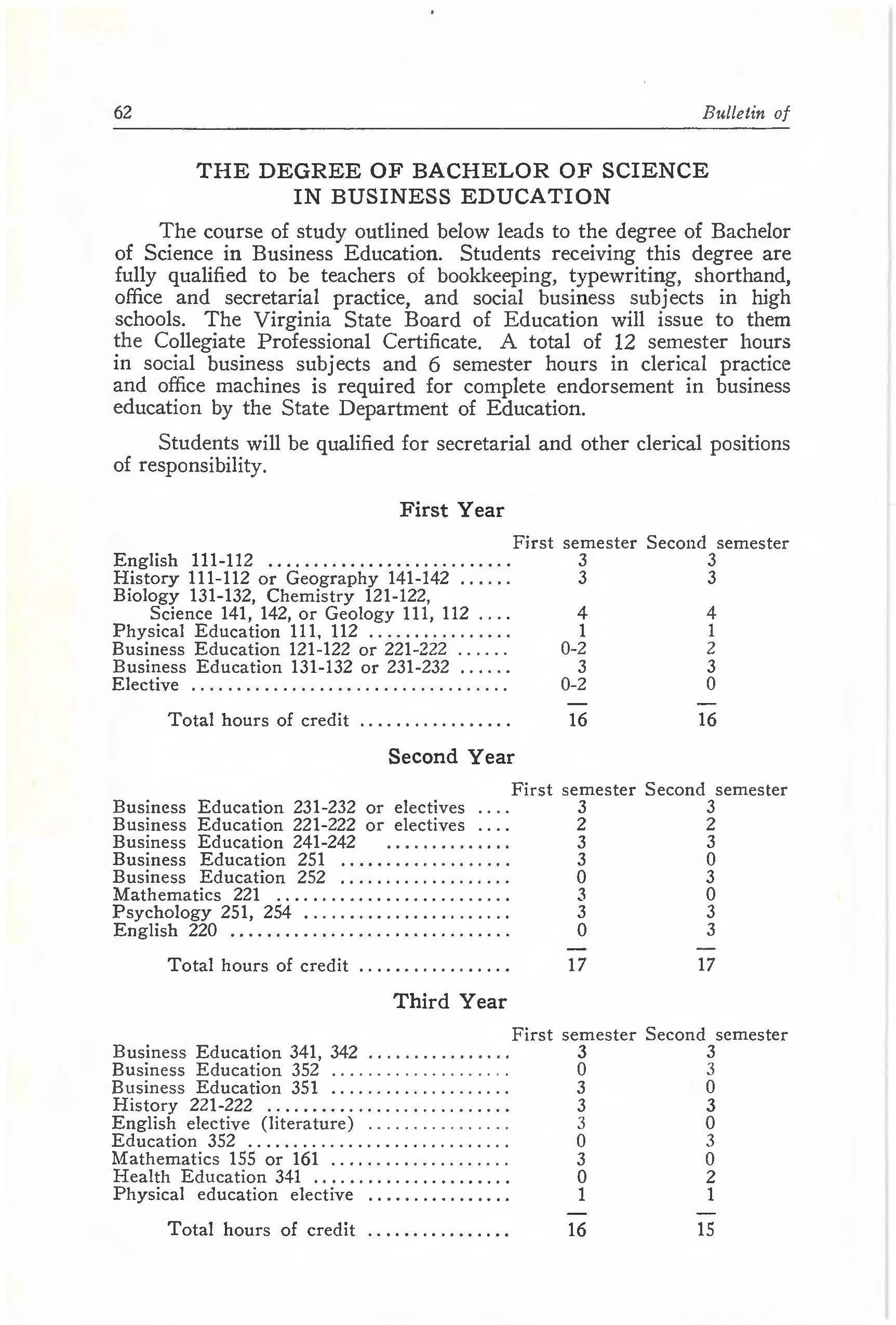
Students will be qualified for secretarial and other clerical positions of responsibility.
First semester Second semester
English 111-112 3 3 History 111-112 or Geography 141-142 3 3 Biology 131-132, Chemistry 121-122, Science 141, 142, or Geology 111, 112 Physical Education 111, 112 Business Education 121-122 or 221-222 Business Education 131-132 or 231-232 ..... . Elective .................................. .
Total hours of credit
4 1 0-2 3 0-2 16
4 1 2 3 0 16
First semester Second semester
Business Education 231-232 or electives 3 3 Business Education 221-222 or electives 2 2 Business Education 241-242 . . . . . . . . . . . . . . 3 3 Business Education 251 . . . . . . . . . . . . . . . . . . . 3 0
Business Education 252 0 3 Mathematics 221 3 0 Psychology 251, 254 . . . . . . . . . . . . . . . . . . . . . . . 3 3 English 220 0 3
Total hours of credit 17 17
First semester Second semester
Business Education 341, 342 3 3 Business Education 352 0 3 Business Education 351 . . . . . . . . . . . . . . . . . . . . 3 0
History 221-222 . . . . . . . . . . . . . . . . . . . . . . . . . . . 3 3 English elective (literature) . . . . . . . . . . . . . . . . 3 0 Education 352 0 3 Mathematics 155 or 161 . . . . . . . . . . . . . . . . . . . . 3 0 Health Education 341 0 2 Physical education elective . . . . . . . . . . . . . . . . 1 1
Total hours of credit ...............• 16 15
Business Education 451 Business Education 452 . . . . ... . ... . ....... .
Business Education 454 Philosophy 460 ........................... .
*Education 400 Education 451 Art or Music or Language ................ . Electives
Total hours of credit
First semester 3 0 0 0 6 3 3 0 15
63 Second semester 0 3 3 3 0 0 3 2 14
The course outlined below leads to the degree of Bachelor of Music Education. Students receiving this degree are fully qualified to be teachers or supervisors of music in the elementary or high schools. The Virginia State Board of Education will issue to them the Collegiate Professional Certificate.
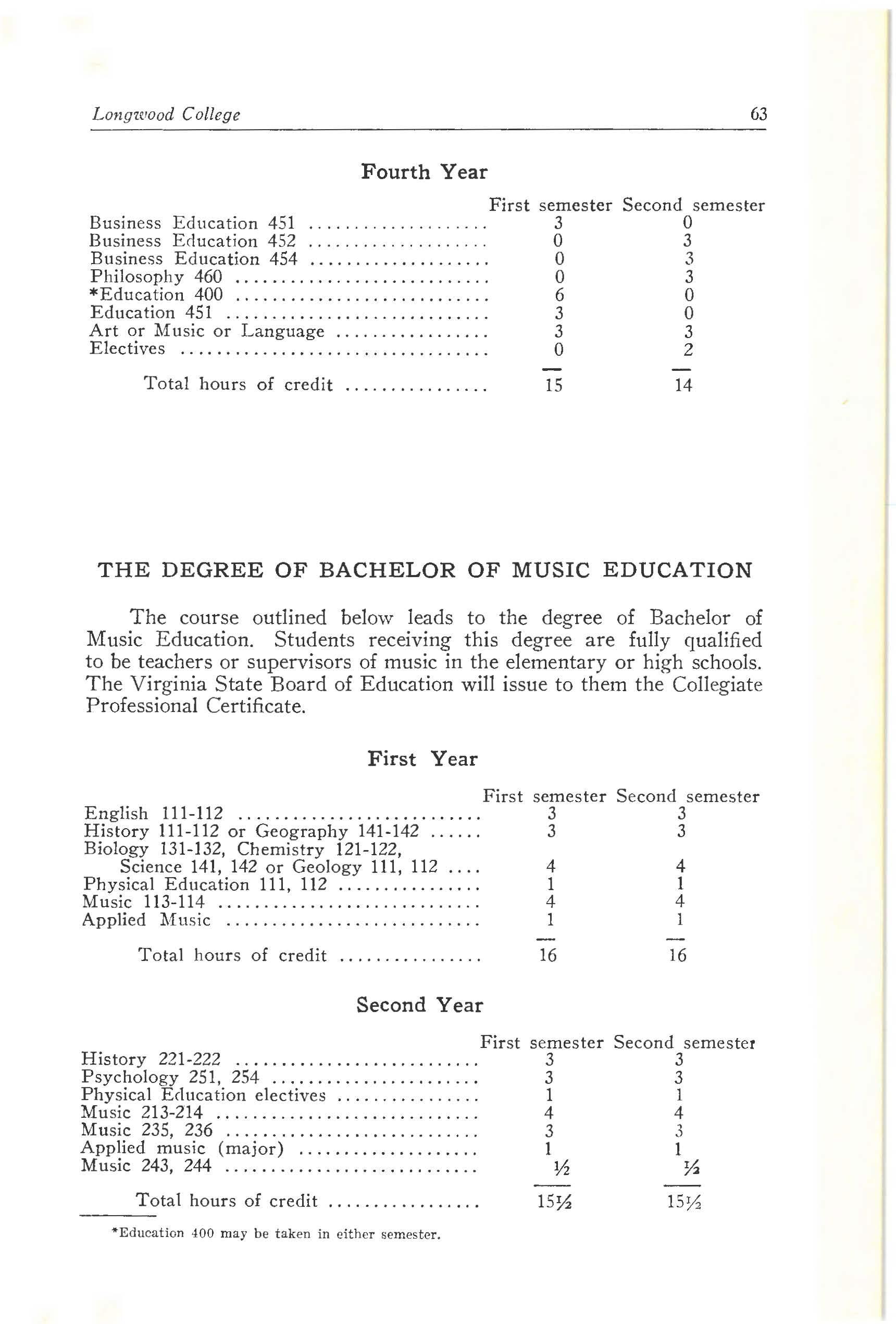
First semester Second semester
English 111-112 3 3 History 111-112 or Geography 141-142 3 3 Biology 131-132, Chemistry 121-122, Science 141, 142 or Geology 111, 112 Physical Education 111, 112 ...... . ........ . Music 113-114 ................... . ..... .. . . Applied :Music ...... . .................... .
Total hours of credit
4 1 4 1 16
First semester
History 221-222 . . . . . . . . . . . . . . . . . . . . . . . . . . . 3 Psychology 251, 254 3 Physical Education electives . . . . . . . . . . . . . . . . 1 Music 213-214 4 Music 235, 236 .. . . . .. . . . .. . .. .. . . .. . .. .. .. 3
Applied music (major) 1 Music 243, 244 . . . . . . . . . . . . . . . . . . . . . . . . . . . . ½
Total hours of credit ......... . ...... . 15¼ *Edu cation 400 may b e taken in either semester.
4 1 4 1 16 Second semester 3 3 1 4 3 1 ¼ 15¼
First semester Second semester
Education 352 0 3
English elective (literature) 3 0 Mathematics 155-156 or 161-162 . . . . . . . . . . . . 3 3 Music 325, 326 . . . . . . . . . . . . . . . . . . . . . . . . . . . . . 3 3 Music 327, 328 2 2 Music 361, 362 or 465, 466 . . . . . . . . . . . . . . . . . 3 3
Applied music (major) . . . . . . . . . . . . . . . . . . . . . 1 1 Music 343, 344 ¼ ½
Total hours of credit 15½ 15½
First semester Second semester Education 451 . . . . . . . . . . . . . . . . . . . . . . . . . . . . . 3 0
English elective (literature) . . . . . . . . . . . . . . . . 0 3 Philosophy 460 0 3 *Education 300, 400 . . . . . . . . . . . . . . . . . . . . . . . 6 0 Music 465, 466 or 361, 362 .. .. . . . . .. .. . . .. . . 3 3 Health Education 341 0 2 Applied Music (major) . . . . . .. .. .. . .. .. .. . . 1 1 Electives . . . . . . . . . . . . . . . . . . . . . . . . . . . . . . . . . . 3 3 Music 443, 444 • • • • • • ¼ ½
Total hours of credit 16½ 15½
Instrumental Emphasis Third Year
First semester Second semester Education 352 . . . . . . . . . . . . . . . . . . . . . . . . . . . . . 0 3 English elective (literature) 3 0 Mathematics 155-156 or 161 162 . . . . . . . . . . . . 3 3 Music 327, 328 . . . . . . . . . . . . . . . . . . . . . . . . . . . . 2 2 Music 361, 362 or 465, 466 3 3 Music 335, 336 . . . . . . . . . . • . . . . . . . . . . . . . . . . . 3 3 Applied music (major) . . . . . . . . . . .. . . . . . . . . 1 1 Music 343, 344 l/2 ½
Total hours of credit 15¼ 15½

First semester Second semester
English elective (literature) . . . . . . . . . . . . . . . . 0 3
Education 451 . . . . . . . . . . . . . . . . . . . . . . . . . . . . . 3 0
Health Education 341 0 2 Philosophy 460 . . . . . . . . . . . . . . . . . . . . . . . . . . . . 0 3
*Eclucation 300, 400 6 0 Music 417 . . . . . . . . . . . . . . . . . . . . . . . . . . . . . . . . . 0 2
Music 465, 466 or 361, 362 3 3
Applied music (major) .. . . .. .. . . . . . . . . .. . . 1 1 Elective 3 1 Music 443, 444 . . . . . . . . . . . . . . . . . . . . . . . . . . . . ¼ ½
Total hours of credit 16½ 15½
*Education 300, 400 way be taken either semester.
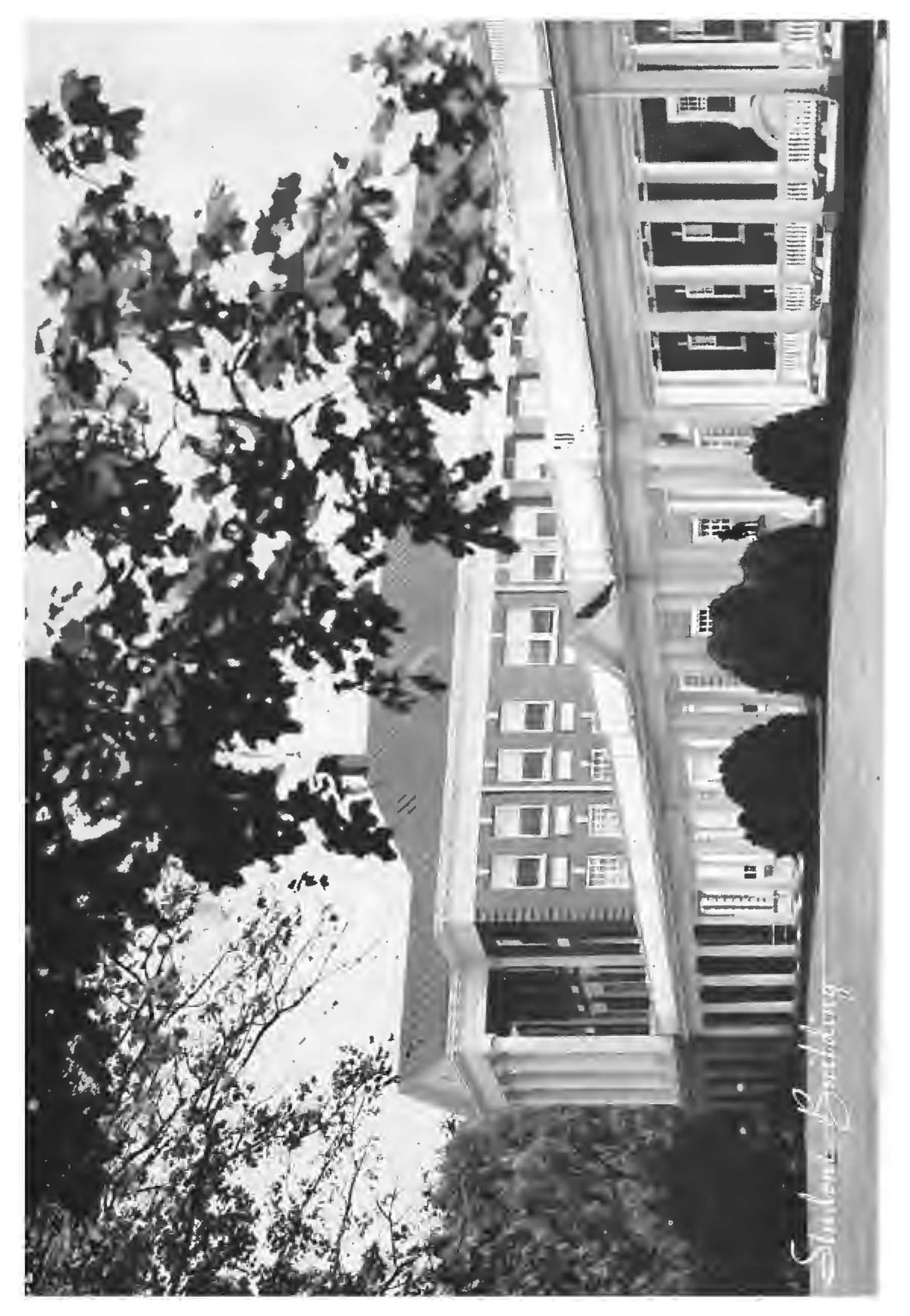
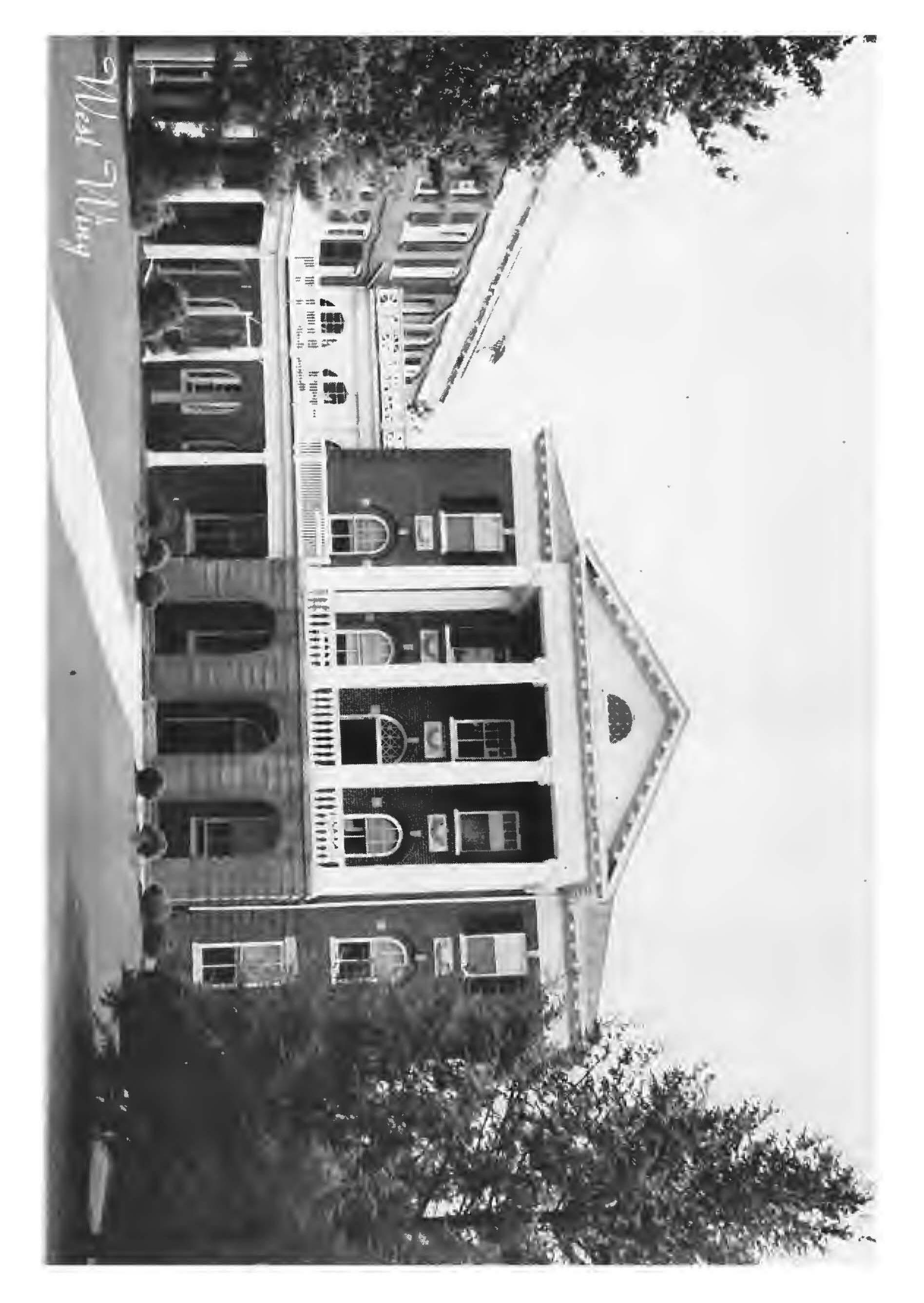
The program of study outlined below leads to the liberal arts degree of Bachel or of Arts. Students enrolled in this may major in art, biology, chemistry, English, French, geography, history, Latin, mathematics, music, psychology-philosophy, secretarial science, social science, sociology, or Spanish. Each student enrolled in this curriculum must select a major subject and fulfill the requirements set up for it by the department in which it is taught. Of the total number of credits required for graduation, the college requires the following credits for this degree: English, 12; foreign language, 18; mathematics, 6; music or art, 6 ( all in one field) ; history and social science, 18 ( six must be in history) ; philosophy, 3; psychology, 6; physical and health education, 6; and science (biology, chemistry, geology, or physics), 8.

First semester Second semester
English 111-112 . . . . . . . .. . . . . . . . . . . . . . . . . . . 3 3 History 111-112 or Geography 141-142 3 3 Biology 131-132, Chemistry 121-122, or Geology 111, 112 .................. . Physical Education 111, 112 Foreign language and/or Mathematics 155-156 or 161-162 ....... . Electives .......................... . ...... .
Total hours of credit
Second Year
4 1 3 3 17
4 1 3 3 17
First semester Second semester English elective (literature) . . . . . . . . . . . . . . . . 3 3 A.rt or music (all in one subject) . . . . . . . . . . . 3 3 Foreign language or Mathematics 155-156 or 161-162 ....... . Physical education electives
Social science ( economics, geography, . government, history, or sociology) .... . MaJor
Total hours of credit
Foreign language and/or Mathematics 155-156 or 161-162 ....... . Social science ( economics, geography, government, history, or sociology) .... . Health Educat;")n 341 Philosophy 360 Psychology 231, 232 ...................... . Major or electives ........................ .
Total hours of credit ............... .
3 1 3 3 16
3 1 3 3 16
First semester Second semester 3 3 2 3 3 1 15
3 3 0 0 3 6 15
First semester Second semester
Major . . . . . . . . . . . . . . . . . . . . . . . . . . . . . . . . . . . . 3 3
Required courses or electives . . . . . . . . . . . . . . 12 12
Total hours of credit 15 15
The program of study outlined below leads to the liberal arts degree of Bachelor of Science. Students enrolled in this may major in biology, chemistry, geography, history, mathematics, secretarial science, social science, or sociology. Each student enrolled in this curriculum must select a major subject and fulfill the requirements set up for it by the department in which it is taught. Of the total number of credits required for graduation, the college requires the following credits for this degree: English, 12; social science, 12 (six must be in history ) ; science (biology, chemistry, geology, or physics), 30 (24 hours required of mathematics majors); foreign language, 12; mathematics, 6; art or music, 6 ( all in one field) ; psychology, 6; and physical and health education, 6.
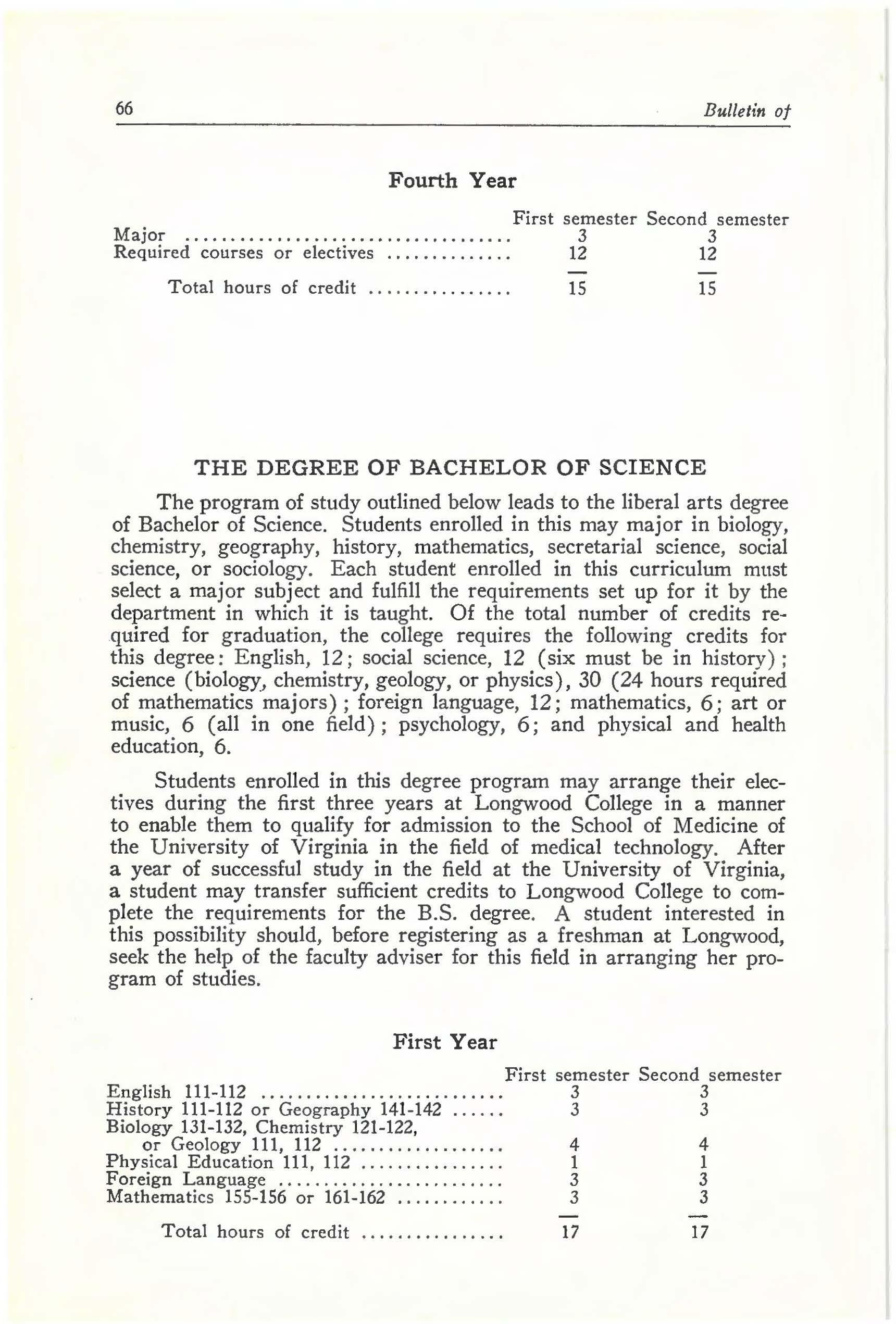
Students enrolled in this degree program may arrange their electives during the first three years at Longwood College in a manner to enable them to qualify for admission to the School of Medicine of the University of Virginia in the field of medical technology. After a year of successful study in the field at the University of Virginia, a student may transfer sufficient credits to Longwood College to complete the requirements for the B.S. degree . A student interested in this possibility should, before registering as a freshman at Longwood, seek the help of the faculty adviser for this field in arranging her program of studies.
First semester Second semester
English 111-112 .. . .. .. .. .. .. . .. .. . . . .. .. .. 3 3 History 111-112 or Geography 141-142 . . . . . . 3 3 Biology 131-132, Chemistry 121-122, or Geology 111, 112 Physical Education 111, 112 . . . ............ . Foreign Language ..... .. . ... ............ . . Mathematic s 155-156 or 161-162
Total hours of credit .. ...... . ...... .
4 1 3 3 17
4 1 3 3 17
First semester
English elective (literature) . . . . . . . . . . . . . . . . 3
Foreign language . . . . . . . . . . . . . . . . . . . . . . . . . . 3
Biology, chemistry, geology, or physics 4 Physical education electives 1 Psychology 231, 232 3 Electives 2
Total hours of credit . . . . . .. ... . . ... . 16
Second semester 3 3 4 1 3 2 16
First semester Second semest e r
Major or electives . . . . . . . . . . . . . . . . . . . . . . . . . 7 9
Social science (economics, geography, government, history, or sociology) Health Education 341 .... . ............... . Biology, chemistry, geology, or physics ... .
Total hours of credit
3 2 3-4 15-16
First seme s ter
Major 3 Science and electives 9 Art or music (all in one subject) 3
Total hour s of credit 15
3 0 3-4 15-16 Second semester 3 9 3 15

This two-year curriculum is designed to prepare students for secretarial and other clerical positions in business, industry, and government.
Students who complete the courses outlined below ( or their approved equivalent) will be eligible for a certificate. Students may decide at any time to change to the four-year program which leads to the Degree of Bachelor of Science in Business Education. This transfer can be made without loss of credit.
English 111-112 History 111-112 or Geography 141-142 Biology 131-132 or Chemistry 121-122 ..... . Physical Education 111, 112 Business Education 121-122 or 221-222 ..... . Business Education 131-132 or 231-232 ..... . Elective
Total hours of credit
First semester Second semester 3 3 4 1 0-2 3 0-2 16
3 3 4 1 2 3 0 16
Business Education 231-232 or electives Business Education 221-222 or electives Business Education 241-242 ............... . Business Education 251 ................... . Business Education 252 .................. . Mathematics 221 Psychology 251, 254 English 220 .............................. .
Total hours of credit
First semester Second semester 3 2 3 3 0 3 3 0 17
3 2 3 0 3 0 3 3 17
This curriculum prepares students for admission to accredited schools of nursing and medical and X-Ray technology. Adjustments in it can be made where necessary to meet any special requirements of professional schools. Students planning to enter schools of medicine or dentistry should complete work for the Bachelor of Science degree.
Students should communicate with the professional schools in which they plan to enroll and obtain advice from them as to the electives that they advise or require. This should be done prior to registration for classes at Longwood.

First semester Second semester
English 111-112 3 3 History 111-112 or Geography 141-142 3 3 Biology 131-132; and/or Chemistry 121-122 .. 4 4 Physical Education 111, 112 I 1 Exploratory e lective 5-6 5-6
Total hours of credit 16-17 16-17

English elective (literatur e )
Art or music (all in one subject) Foreign language ....... .. ..... . .......... . Biology, chemistry or physics , Physical education electives Psychology 231, 232 ....... .. ........... • ..
Total hours of credit
First semester Second semester 3 3 3 4 1 3 17
3 3 3 4 1 3 17
The program of graduate studies at Longwood College provides opportunity for broad training on the part of public school teachers and other qualified persons. The program is open to graduates of recognized colleges or universities. Those who are able to qualify and who complete all of the requirements may earn either the Master of Arts degree in Education or the Master of Science degree in Education. Graduate courses are available during the regular academic year-either full-time or part-time ( evenings and Saturday mornings)-as well as in the Summer Session.
A student who holds the baccalaureate degree from an accredited institution may apply for admission to graduate study. For this purpose he should obtain from the Dean of the College a blank to use in applying for admission. The applicant should have official transcripts of all undergraduate and graduate work taken at other institutions sent to the Dean at least one month prior to the opening of the session. All documents become the property of Longwood College. A student may enroll in graduate courses without becoming a candidate for a degree.

Admission to graduate courses will be granted to persons who meet the following qualifications :
1. United States citizenship, or, in the case of foreign students, possession of an appropriate Department of State study permit.
2. The Bachelor's degree from a college or university accredited by the National Council of Accreditation of Teacher Education, the Southern Association of Colleges and Secondary Schools, or other regional agency.
3. An academic aptitude for graduate work, which will be determined principally from the applicant's undergraduate record.
The following applicants may be admitted conditionally:
a. Applicants for whom all of the necessary entrance information has not yet been received and approved by the Graduate Council.
b. Students whose undergraduate records are not entirely satisfactory or who show minor deficiencies in their major fields.
c. Capable students who lack not more than five semester hours to complete their undergraduate program at Longwood College.
d. Mature persons who have special or personal interest not covered by the above.
The conditional status, however, should be regarded as temporary, and the students should seek to remove all conditions as soon as poss ible.
The special requirements of the several college departments are designed to insure that the student is able to take advantage of the opportunities provided for advanced study. These requirements relate as a rule to the completion of certain undergraduate ' 'prerequisites" but may include satisfactory performance on aptitude or achievement tests. Details will be furnished by the department.

After admission to graduate study a student should seek an early conference with the chairman of the department in which he plans to specialize. On the basis of this conference , the department chairman will aid the student in selecting his advisory committee which will assist the student in planning his program and be available whenever counsel is desired. If the student is uncertain as to the area in which he wishes to specialize, he should confer with a member of the Graduate Council.
A student is considered ready to seek admission to candidacy for a Master's degree when he has:
a. Demonstrated his aptitude to undertake graduate work for at least one summer term or one semester at the graduate level.
b. Removed any conditions attendant upon his admission to the Graduate Program and removed any deficiencies in prerequisites established by his department.
c. Formulated a program of study approved by the student's advisory committee.
d. Satisfied other requirements of the College.
A satisfactory graduate program represents more than a series of cour ses or an accumulation of credits, important as these may be. Th e additional and indispensable element prerequisite to receiving the Master's degree consists of the development of some special competence by the student, together with the satisfactory completion of an approved program of study in which he has displayed a degree of
mastery in his field of specialization. A candidate for a degree may either:
A. Complete 24 semester hours of credit and a thesis, or
B. Complete 30 semester hours -of credit without a thesis.
In plan "A," the thesis is approved by major and minor professors as well as by the student's advisory committee, and two typewritten copies of the thesis are presented to the Graduate Council at least four weeks before the degree is to be conferred.
At the time the graduate degree is awarded , the student must either hold or be eligible for the Collegiate Professional certificate, issued by the Virginia State Board of Education.
The number of departments prepared to offer a graduate major, will be expanded as rapidly as possible. For the present, courses leading to the degree of Master of Arts in Education may be taken when the major is chosen from one of the following fields:
For the degree of Master of Science in Education, the corresponding choice may be made from the following departments: Biology
A major in any subject consists of 18 semester hours of work, or 12 hours of course work plus a thesis. Either the major or the minor must be in the field of education. Furthermore, in order to insure the breadth of training necessary for a teacher, a student may not elect more than 18 semester hours in his major subject.
Nine semester hours in a field constitute a minor in that field. The additional course may be elected from any other subject of the student's choice.
However, if the candidate is a teacher in an elementary school or if he is preparing to teach in the elementary grades, he will be permitted to elect two minors of 6 semester hours each instead of a single minor of 9 hours. In this case where education is not the major, it must be one of the two minors. The departments or fields in which a candidate may minor are the following: art, bi-
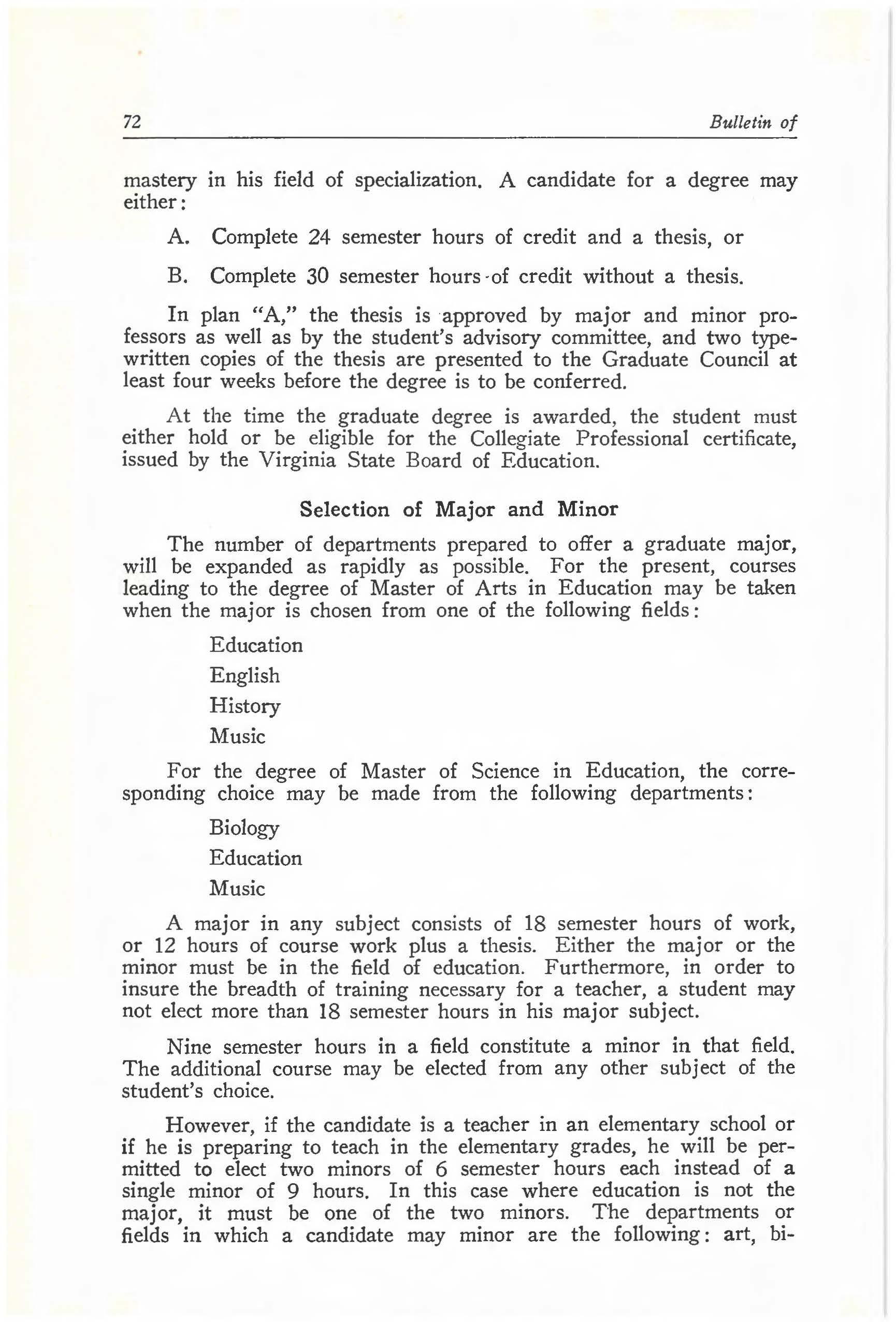
ology, business education, chemistry and physics, education, English, French, Spanish, geology and geography, history, home economics, mathematics, music, physical education, and psychology.
Students interested in commencing work in any of the foregoing fields should contact, and if possible confer with, the head of the department concerned.
Students expecting to graduate in June who do not submit a thesis take an essay type written examination, not to exceed 3 hours' duration, covering the student's major field of study. This examination is designed to evaluate competency in written expression, ability to reason within an area, and the ability to apply information. This examination will be administered bv the Graduate Council the first Saturday in May, 9 a.m. ,
A student electing to do a thesis ( Plan A) is, in general, exempted from taking the comprehensive written examination. An oral examination, not to exceed one hour's duration, is required as a defense of the thesis. The Graduate Council may require a written comprehensive examination if it is recommended by the Head of the Department of the student's major field.
The student electing to write a thesis selects the subject for the thesis in collaboration with the adviser as soon as possible after commencing the graduate program. (See paragraph on Student Load).
The finished thesis must be approved by both the major and minor professors and the student's advisory committee. Two typewritten copies are to be presented to the Graduate Council at least four weeks before the degree is to be conferred.

Two copies of each thesis are presented by the candidate to the college, to be deposited in the college library, one for archival purposes, the other to be circulated to students and faculty and to off-campus persons through inter-library loans.
The candidate for the graduate degree pays the binding fee for the two copies of the thesis in the Business Office at the time the diploma fee is paid. Arrangements for theses bindings are made by the Librarian.
Normal residence requirements of one academic year or its equivalent may be reduced by extension and transfer to a minimum of eighteen semester hours.
Students with undergraduate deficiencies may find it necessary to take more than the normal time to complete requirements.
Transfer of residence as well as transfer of credit from another institution is permitted up to 6 credit ho4rs. (Exceptions to each of the foregoing may be made for students already enrolled in another Virginia institution and who have already earned more than 6 semester hours at the time this program was inaugurated.)
Graduate courses are of two categories : 500-courses are for Graduates and Advanced Undergraduates while 600-courses are for Graduates only. At least 40 per cent of a student's total program must consist of 600-courses.
Fifteen credit hours per semester constitute a normal load during the academic year. For permission to carry more than this the student may petition the Graduate Council. If the student is already employed, the normal load is 3 semester hours ; permission to carry more than 3 semester hours during one semester must therefore be obtained from the Graduate Council.

The work for a graduate degree is to be completed within seven years after commencing such work. An extension of this time-limit is permissible only upon the consent in writing of the Graduate Council.
A student planning to graduate on a certain date should file with the Graduate Council an application for graduation at least 60 days before the degree is to be conferred.
Instruction in the College is offered by the departments describ ed in this section of the catalogue . Included in the description of each department are the requirements for a major in it and the courses which it offers.
Numerous courses in most departments have prerequisites. These will be noted in the descriptions of the courses. Generally, cour s es numbered between 100 and 199 are for freshmen. Those numbered between 200 and 299 are for sophomores ; those between 300 and 399 are for juniors ; and those 400 and above are for seniors. Undergraduate Honors Courses are numbered 500. Courses numbered from 501 to 599 are for graduate students and advanced undergraduates. Numbers from 601, to 699 are for graduate students only and 600 courses are graduate thesis courses. Courses with numbers divided by commas, such as 111, 112 are semester courses. This means that the College gives credit toward a degree for the satisfactory completion of one semester of the course even though the student may not enroll in it for the second . Courses in which the numbers are hyphenated, such as 111-112, are year courses . In these, the College grants credit toward a degree only upon the successful completion of both semesters of work.
The honors program was inaugurated by the College in 1930. Students in all departments of the College are eligible to participate in this program.
Honors courses are designed for capable students who wish to pursue under individual instruction an intensive study of a subject of their choice, thereby becoming acquainted with methods of research, organization of materials, and the presentation of results in a scholarly manner. Such intensive study is intended also to stimulate initiative, resourcefulness, and original thought.
Under this plan, the student is directed in creative research by an instructor who has specialized in the field and who acts as her sponsor. Candidates for honors must be enrolled in honors courses for two semesters, not necessarily consecutive. They may withdraw from such courses only with the consent of the Honors Committee
The subject and plan of the research are decided in conferences between the students and the faculty member sponsoring her program. Students interested in honors courses should submit a brief outline

describing their projected research to the chairman of the department in which the work is to be done. The department chairman will present each student's application to the Honors Committee for approval.
The results of a study under this program must be organized into a formal paper. Furthermore, the candidate must stand an oral examination given by an examining board of three members well acquainted ,vith the field. The candidate receives honors in the department sponsoring her only on the recommendation of this examining board. In the event that she fails to be recommended for honors, a grade will be assigned to the work that she has done by her sponsor who will be guided by the caliber of the work.
The program of honors courses is administered by the Honors Committee which must approve all students enrolled in such courses and must appoint the sponsors and examining boards. Members of this committee are Mr. Swertfeger, Chairman, Mr. Simkins, Mr. Brumfield, Miss Bailey, Mr. Gresham.
The class schedules and records of a student enrolled in the honors programs will indicate that she is enrolled in a "500" course giving six semester hours of credit for two semesters of work. (No credit will be given to a student who does not complete both semesters.) If for example, the honors work is being done in the field of mathematics, the student's record will show the following: Mathematics 500, Honors Course in Mathematics, 6 credits.
Candidates for honors in a department are eligible also for general honors awarded by the College for outstanding academic records.
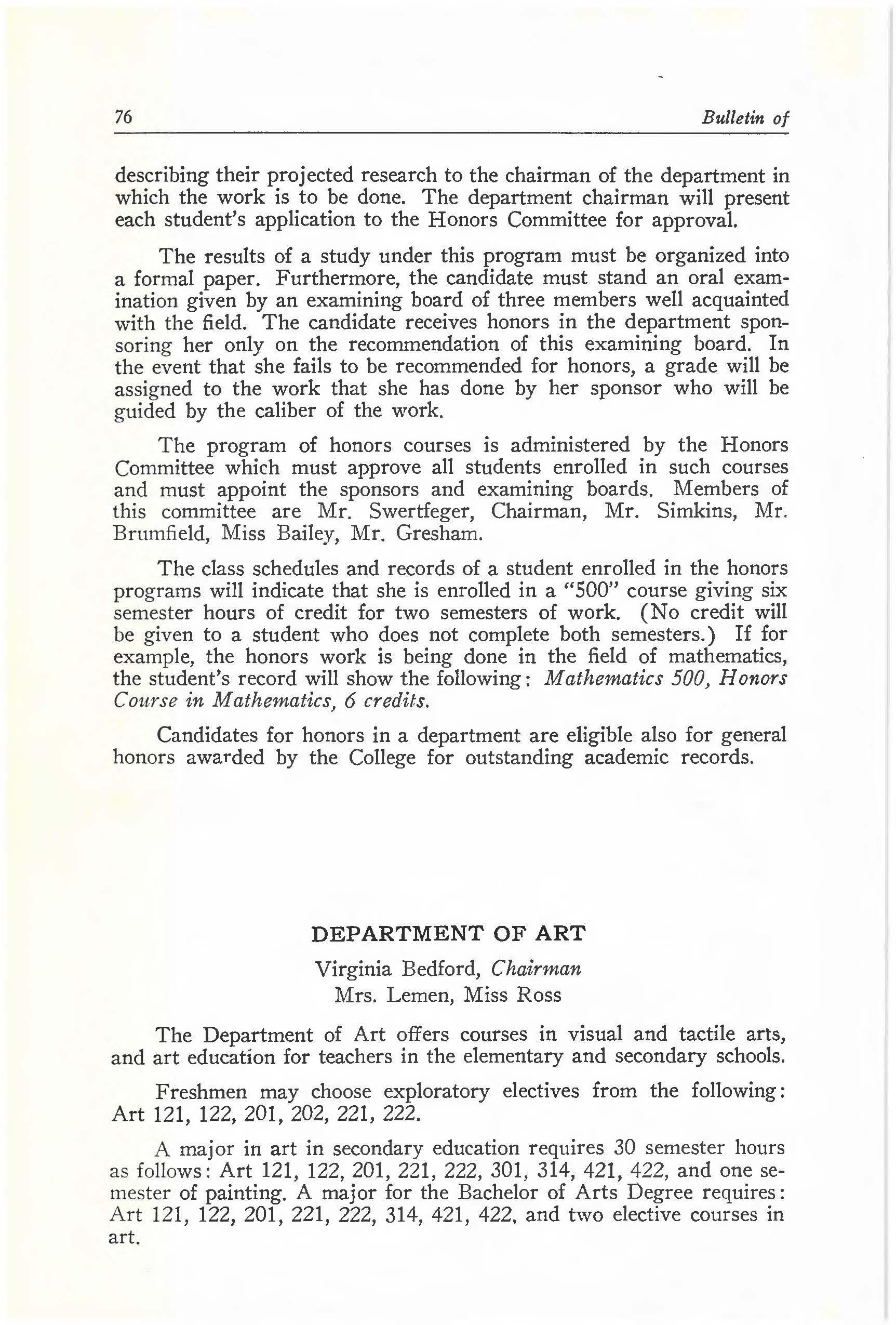
Virginia Bedford, Chairman Mrs. Lemen, Miss Ross
The Department of Art offers courses in visual and tactile arts, and art education for teachers in the elementary and secondary schools.
Freshmen may choose exploratory electives from the following: Art 121, 122, 201, 202, 221, 222.
A major in art in secondary education requires 30 semester hours as follows: Art 121, 122, 201, 221, 222, 301, 314, 421, 422, and one semester of painting. A major for the Bachelor of Arts Degree requires: Art 121, 122, 201, 221, 222, 314, 421, 422, and two elective courses in art.
Art 121, 122. General Art Structure, Understanding the major and minor arts of past and present civilizations through laboratory experiments, criticisms, and discussions to develop appreciation and to give a basis for good judgment as consumers. Art 121: color, compositions, painting, and interior design. Art 122: architecture, city planning, sculpture, and graphics. First and second semesters; 5 periods a week; 3 credits each semester. Instructors: The Staff.
Art 201. Crafts. Design approach to the creative use of tools and materials in vocational and recreational hand icra fts for school, camp, and home. First and second semesters; 6 periods a week; 3 credits. Instructors: Miss Bedford, Miss Ross.
Art 202. Advanced Crafts. Special problems in advanced crafts including ceramics, enamels, textile design, and leather carving Prerequisite: Art 201. Second semester: 6 periods a week; 3 credits. Instructor: Miss Bedford.
Art 221. Drawing and Composition. Fundamentals of drawing, composition, and illustration in various media and techniques. First semester; 6 periods a week; 3 credits. Instructor: Miss Ross.
Art 222. Ceramics. Forming, decorating, glaz ing, and firing pottery and sculpture. Offered each semester; 6 periods a week; 3 credits. I nstructor: Miss Bedford.
Art 301. Art Education. Emphasis on a contemporary philosophy of art education through readings and laboratory problems which include puppetry, murals, constructions, graphics, and poster design. Offered each semester; 6 periods a week; 3 credits. Instructor: Mrs. Lemen.
Art 314. Graphic Arts. Print production as a medium of original expression involving processes in relief, planography and intaglio. Second semester; 6 periods a week; 3 credits. Instructor: Miss Ross.
Art 421, 422. Art Appreciation A sur vey of architecture, sculptu re , painting, and related minor arts of all civilizations from ancient times to the present. Not open to freshmen. Art 421: architecture and sculpture. Art 422: painting. First and second semesters; 3 periods a week; 3 credits each semester. Instructor: Miss Ross.
Art 431. Painting : Oil. Students will furnish all equipment and materials. Not open to freshmen. Second semester; 6 periods a week; 3 credits. Instructor: Mrs. Lemen.
Art 441. Painting: Water Color. Students will furnish all materials and equipment Not open to freshmen. First semester; 6 periods a week; 3 credits. Instructor; Mrs. Lemen.
Art 442. Painting and Composition. Open to students who have completed Art 431 or 441 or equivalent. (May be repeated as 443, 444, etc., with permission of in structor). First and second semesters. Hours to be arranged. Students will furnish all materials and equipment. 6 periods a week; 3 credits. Instructor: Mrs. Lemen.
The graduate minor in Art requires 9 credits. Elementary teachers who wish to take a double minor may wi th the advice of the art staff select any two courses.
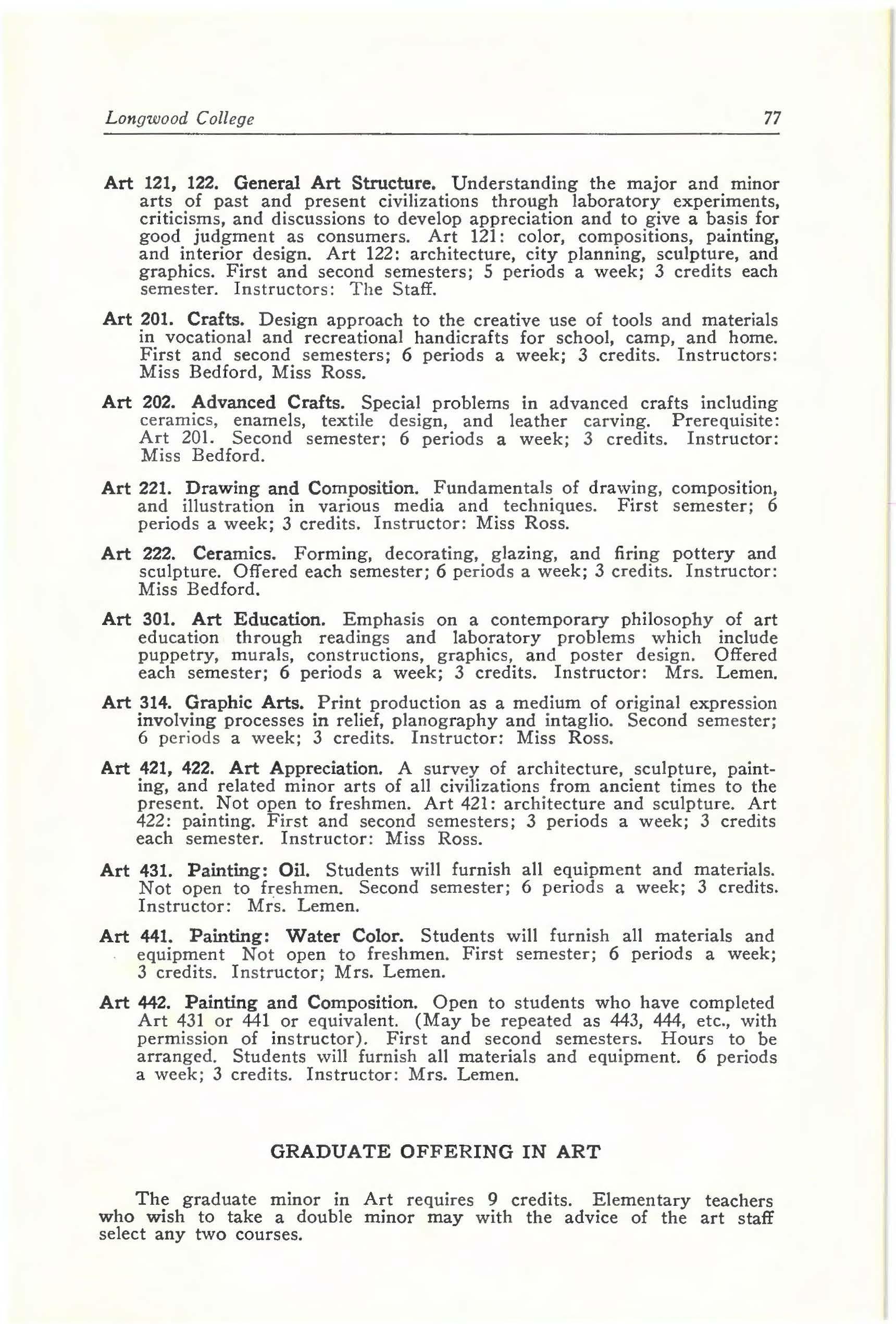
Art 501. Craft Techniques. A progressive series of problems in crafts with emphasis on the use of tools and materials for function and decoration. Ceramics, enameli ng , metal work and jewelry. The student will concentrate in one craft in one semester but may repeat the course for further study (as 502). 3 credits. Instructor: Miss Bedford.
Art 511. Problems in Art Education. The student will select an area of art education for concentrated study through readings, research, and experimentation. The conclusions will be presented as a project or term paper. Prerequisite : Art 121, 301 or equivalent. 3 credits. Instructor: Miss Ross.
Art 531. Painting Studio. Expressive qualities of painting will be stressed. Individual problems will be set up by the student and techniques will be developed in order to achieve sa tisfactory solutions. Slide exhibitions and read ing will be included. (Art 531-0, Oil; 531-W, Water Color; 531 S, Silk Screen). 3 credits each. Instructor: Mrs Lemen.
Art 621. Special Studies in History of Art. A seminar consisting of individual research and group presentation and discussion. Concentration will be on a particular artist, period, school or movement in art and art theory according to the need and interest of the student. Prerequisite: Art 421 , 422 or equivalent. 3 credits. Instructor: Miss Ross.
Merle L. Landrum, Chairman
Mr. Leeper, Mr. Myers, Mrs. Taliaferro
The Department of Business Education offers programs leading to the following :
1. The degree of bachelor of science in business education which qualifies students to teach business subjects in second~ry schools and to hold office positions in the field of business.
2. A certificate which signifies preparation for secretarial and clerical positions in offices in business, industry, and government .
Students who plan to major in secretarial science for the Bachelor of Arts degree or the Bachelor of Science degree must elect a minimum of 32 semester hours in business subjects . In order to facilitate scheduling, all courses in typewriting and shorthand should be completed by the end of the second year . Course work with the required number

of semester hours of credit is as follows: Shorthand 6-12, Typewriting 4-8, Accounting 12, Office Machines 3, Business Law, Insurance and other social business subjects to total a minimum of 32 semester hours.
Students who have successfully completed courses in typewriting and/or shorthand before entering Longwood College may, with the approval of the chairman of the department, be permitted to start work in business education with more advanced courses. This procedure p ermit s such students to be placed in classes with others who have reached similar levels of achievement.
Business Education 121. Beginning Typewriting. (For those who have h a d no typewriting.) Knowledge of the keyboard with emphasis on accuracy, rh y thm , carriage throw and other correct techniques. First semester; S period s a week; no credit
Business Education 122. Intermediate Typewriting. (For those who have had the equivalent of Typewriting 121.) Forty to 60 net words per min u t e o n unfamiliar material of average difficulty for ten to fifteen minute s . Fir s t and second semesters; S periods a week; 2 credits.
Business Education 131-132. Elementary Shorthand. (For those who have had no shorthand.) Mastery of the principles of Gregg shorthand. Reading shorthand plates and practice in writing. Development of ease in taking dictation. Seventy to 90 words per minute on unfamiliar material of average difficulty for three to five minutes. First and second semesters; S periods a week; 3 credits each semester. Instructor: Mr. Myers, Mrs. Taliaferro.
Business Education 133-134. Intermediate Shorthand. (For those who have had the equivalent of one year of shorthand.) Eighty to 100 words per minute on unfamiliar material of average difficulty for four to six minutes. First and s econd semesters; S periods a week; 3 credits each semester. Instructor: Mrs. Taliaferro.
Business Education 221-222. Advanced Typewriting and Transcription. (For those who have had the equivalent of two years of typewriting and shorthand in high school or one year of typewriting and shorthand in college ) Ability to transcribe an acceptable number of business letters within an hour. First and second semesters; S periods a week; 2 credits each semester. Instructors: Mr. Leeper, Mrs. Taliaferro.

Business Education 231-232. Advanced Shorthand. (For those who have had the equivalent of two years of shorthand in high school or one year of shorthand in college.) Ninety to 120 words per minute on unfamiliar material of average difficulty with the ability to transcribe an acceptable number of letters within an hour. First and second semesters; 3 periods a week; 3 credits each semester. Instructors: Mr. Leeper, Mrs. Taliaferro Accounting
Business Education 241-242. Elementary Accounting. Theory of debits and credits; journalizing and posting. Use of special journals and ledgers. The trial balance, work sheets, business statements, and adjusting and closing entries First and second semesters; 3 periods a week; 3 credits each semester. Instructors: Mr. Leeper, Mr. Myers.
Business Education 341. Advanced Accounting. Partnerships corporation, corporation accounts and records, corporate earnings and surplus; corporation securities. Prerequisite: Business Education 241-242 . First semester ; 3 periods a we ek; 3 credits In s tructors : Mr Landrum, Mr. Leeper
Business Education 342. Social Security and Payroll Accounting. Social security legislation, old-age benefits, unemployment compensation, required records, accounting for payroll taxes, tax deductions Prerequisite : Business Education 341. Second semester; 3 periods a week; 3 credits. Instructor: Mr. Landrum.

Business Education 151. Introduction to Business. A general course including the study of current business practices, vocabulary peculiar to business, and professional opportunities in business. Offered both semesters; 2 periods a week; 2 credits. Instructor: Mr. Leeper.
Business Education 251. Merchandising. Problems of managing retail stores, such as organization, personnel , buying , selling , sales campaigns, inventories and advertising. Offered both semesters; 3 periods a week; 3 credits. Instructor: Mr. Landrum.
Business Education 252. Office Machines. Provides operative and maintenance training on common types of ten-key and full-keyboard, manual and electric, key-driven and rotary computing machines. Emph a sis on speed and accuracy to establish vocational competency. Preparation of various types of stencils and master carbons; operation and care of ink, paste, and spirit duplicators. Laboratory projects include telephone techniques, job-analyses, application procedures and their adaptation to the office-classroom situation. Offered both semesters; 5 periods a week; 3 credits. Instructor: Mr. Myers.
Business Education 350. Office Experience or Selling Experience. The completion of a minimum of 300 clock hours of approved successful experience in either office or selling position. Work must be completed before graduation. All prospective -teachers are urged to secure positions during summer or other convenient times. Credits not to be substituted for regular graduation requirements. 3 credits. Instructor : Mr. Landrum.
Business Education 351. Insurance. Life insurance, property insurance, health and accident insurance. social insurance, and liability insurance. Emphasis on the economic importance of insurance in community and individual living. First semester; 3 periods a week; 3 credits. Instructor: Mr. Leeper.
Business Education 352. Business Law. Technical principles involved in contracts, negotiable instruments, and agency. Law of contracts as applied to partnerships, corporations, bailments, carriers, and sales of real and personal property. Practical drafting of legal documents. Second semester; 3 periods a week; 3 credits. Instructor: Mrs. Taliaferro
Business Education 353. General Business Principles. A general business education course designed to give a broader understanding of the practices of present-day business and society. (Offered only in the summer session.) 3 credits. Instructors. Mr. Landrum, Mr. Leeper.
Business Education 451. The Teaching of Business Subjects Organization of subject matter for teachers who plan to guide the learning activities of high school and junior college students in the vocational business subjects. Offered both semesters; 3 periods a week; 3 credits. Instructor: Mr. ; Landrum.
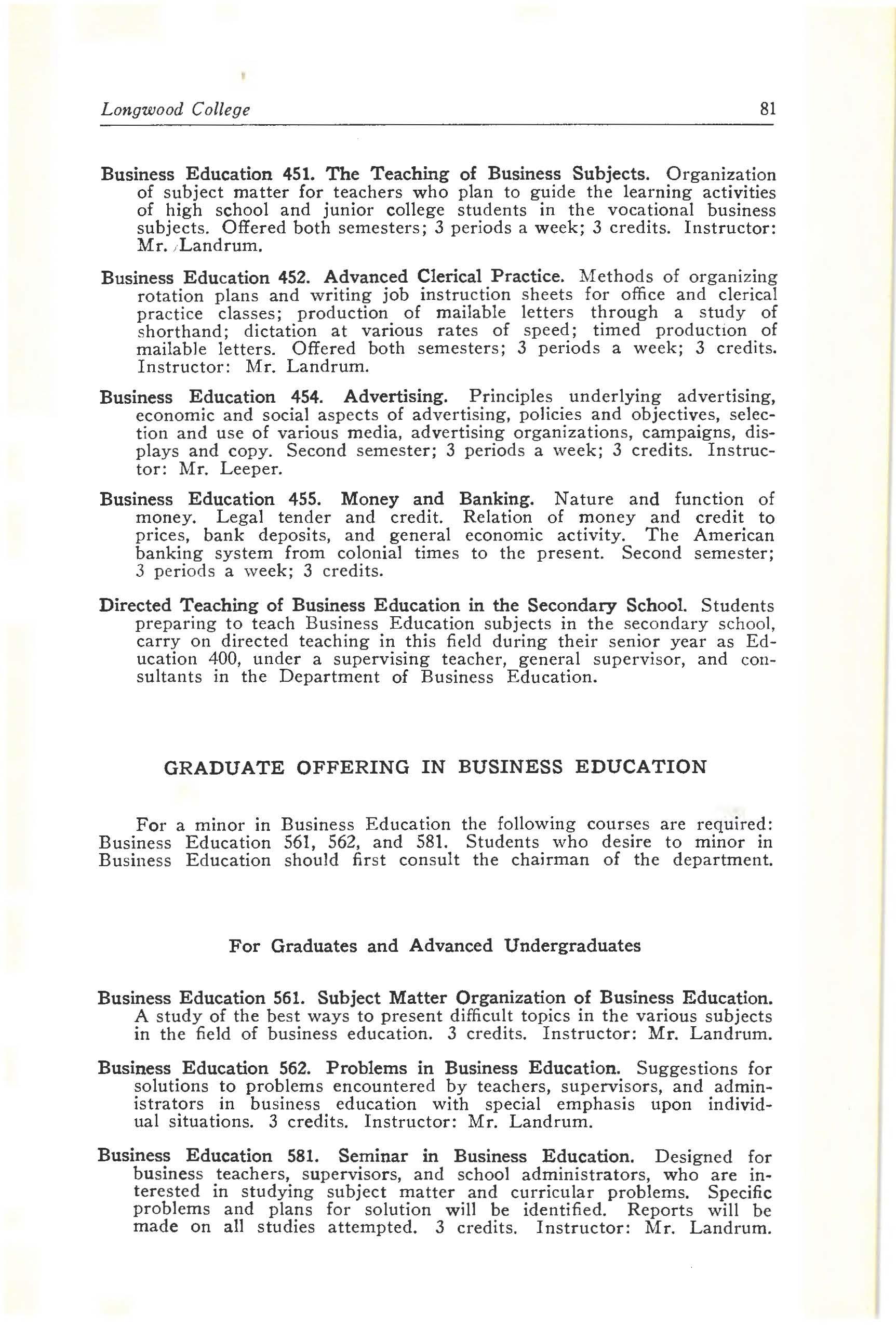
Business Education 452. Advanced Clerical Practice. Methods of organizing rotation plans and writing job instruction s heets for office and clerical practice classes; production of mailable letters through a study of shorthand; dictation at various rates of speed; timed production of mailable letters. Off e red both semesters; 3 periods a week; 3 credits. Instructor: Mr. Landrum.
Business Education 454. Advertising. Principles underlying advertising, economic and social asp e cts of advertising, policies and objectives, selection and use of various media, advertising organizations, campaigns, displays and copy . Second semester; 3 periods a week; 3 credits. Instructor : Mr. Leeper.
Business Education 455. Money and Banking. Nature and function of money. Legal tender and credit. Relation of money and credit to prices, bank deposits, and general economic activity. The American banking system from colonial times to the present. Second semester; 3 peri o ds a week; 3 credits.
Directed Teaching of Business Education in the Secondary School. Students preparing to teach Busine s s Education subjects in the sec o ndary scho o l, carry on directed teaching in this field during their senior year as Education 400, under a supervising teacher, general supervisor, and consultants in the Department of Business Education.
For a minor in Business Education the following courses are required : Business Education 561, 562, and 581. Students who desire to minor in Business Education should fir s t consult the chairman of the department.
Business Education 561. Subject Matter Organization of Business Education. A study of the best ways to present difficult topics in the various subjects in the field of business education 3 credits. Instructor: Mr. Landrum
Business Education 562. Problems in Business Education. Suggestions for solutions to problems encountered by teachers, supervisors, and administrators in business education with special emphasis upon individual situations. 3 credits. Instructor: Mr. Landrum.
Business Education 581. Seminar in Business Education. Designed for busines s teachers, supervisors, and school administrators, who are interested in studying subject matter and curricular problems Specific problems and plans for solution will be identified. Reports will be made on all studies attempted. 3 credits. Instructor: Mr. Landrum.
Mr. Brooks, Mrs. Cover, Miss Gibert, Mr. Johnson, Mr. Patterson, Mr. Swertfeger, Miss Trent, Miss Wilson, Mr. Wynne, Principals, Supervisors, Supervising Teachers
The Department of Education, Psychology, and Philosophy contributes to general education, professional education and specialized education in the program of the College. In some courses the primary emphasis is on general education; in others it is on professional education, and in still others it is on specialized education.
For a major in psychology and philosophy 24 semester hours are required, including the basic courses in these subjects. ( See description of courses.)
Education 100. Orientation. Required of all freshman women for the purpose of aiding in both academic and social adjustment in college. Effective study habits, problems of adjustment, individual daily schedules, personal responsibility, rules of etiquette, extra-curricular activities, recreation, hobbies, and a brief study of the history and development of Longwood College. First semester; Non-credit. Instructors: Miss Spear, Miss Wilson.
Education 325. Language Arts and Reading in the Elementary School. (Same as English 325.) Required for the B.S. degree in Elementary Education. Offered each semester; 3 periods a week; 3 credits. Instructor: Miss Trent.
Education 326. Children's Literature. (Same as English 326.) Required for the B.S. degree in Elementary Education. Offered each semester; 3 credits. Instructor: Mr. Gresham.
Education 345. Introduction to Guidance and Counseling. Introductory course in the techniques of counseling boys and girls in elementary and high schools. Offered each semester; 3 periods a week; 3 credits. Instructors: Mr. Brooks, Mrs. Cover, Mr. Patterson.
Education 347. Audio-Visual Education. Principles of education and uses of audio-visual equipment and materials. Offered each semester; 3 periods a week; 3 credits. Instructors: Mr. Johnson, Mr. Patterson.
Education 352. Principles of Elementary and Secondary Education. Principles of elementary and secondary school practices. Section E required for the B.S. in Elementary Education, Section S required in all other curricula leading to the Collegiate Professional certificate. Offered each semester; 3 periods a week; 3 credits. In structors: Miss Gibert, Mr. Johnson, Mr. Patterson, Miss Trent.
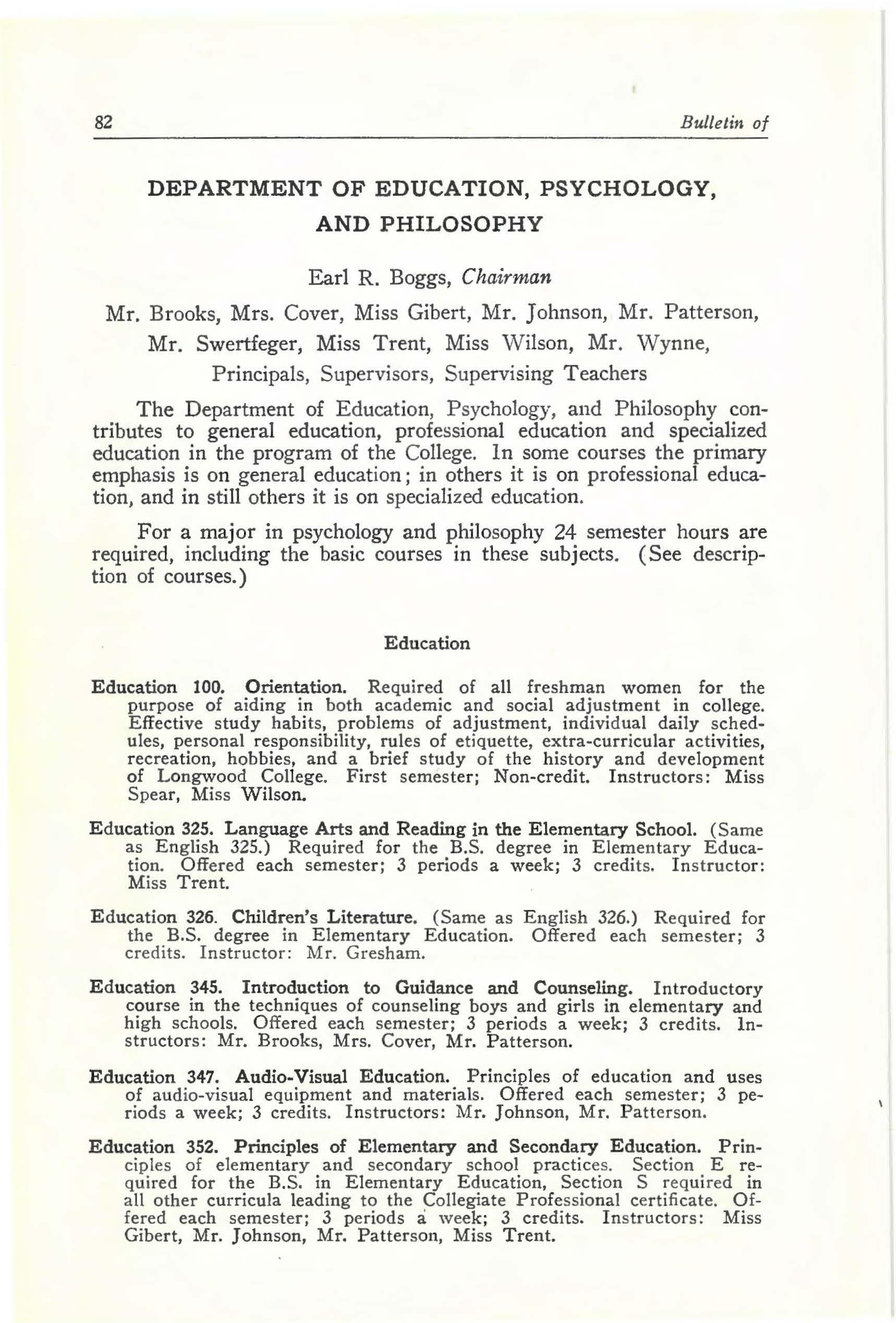
Education 357. Standardized Tests. The selection, administration, scoring, and interpretation of standardized tests used in elementary and high schools. First semester; 3 periods a week; 3 credits. Instructors: Mr. Brooks, Mr. Patterson.
Education 432. Special Problems of the Teacher. Systematic investigation of problems of the teacher. Analysis of educational research bearing upon the particular problems investigated; and analysis of practical situations in which the student is involved. First semester; 3 periods a week; 3 credits. Instructors: Mr. Boggs, Mr. Johnson, Mr. Patters on, Miss Trent, Mr. Wynne.
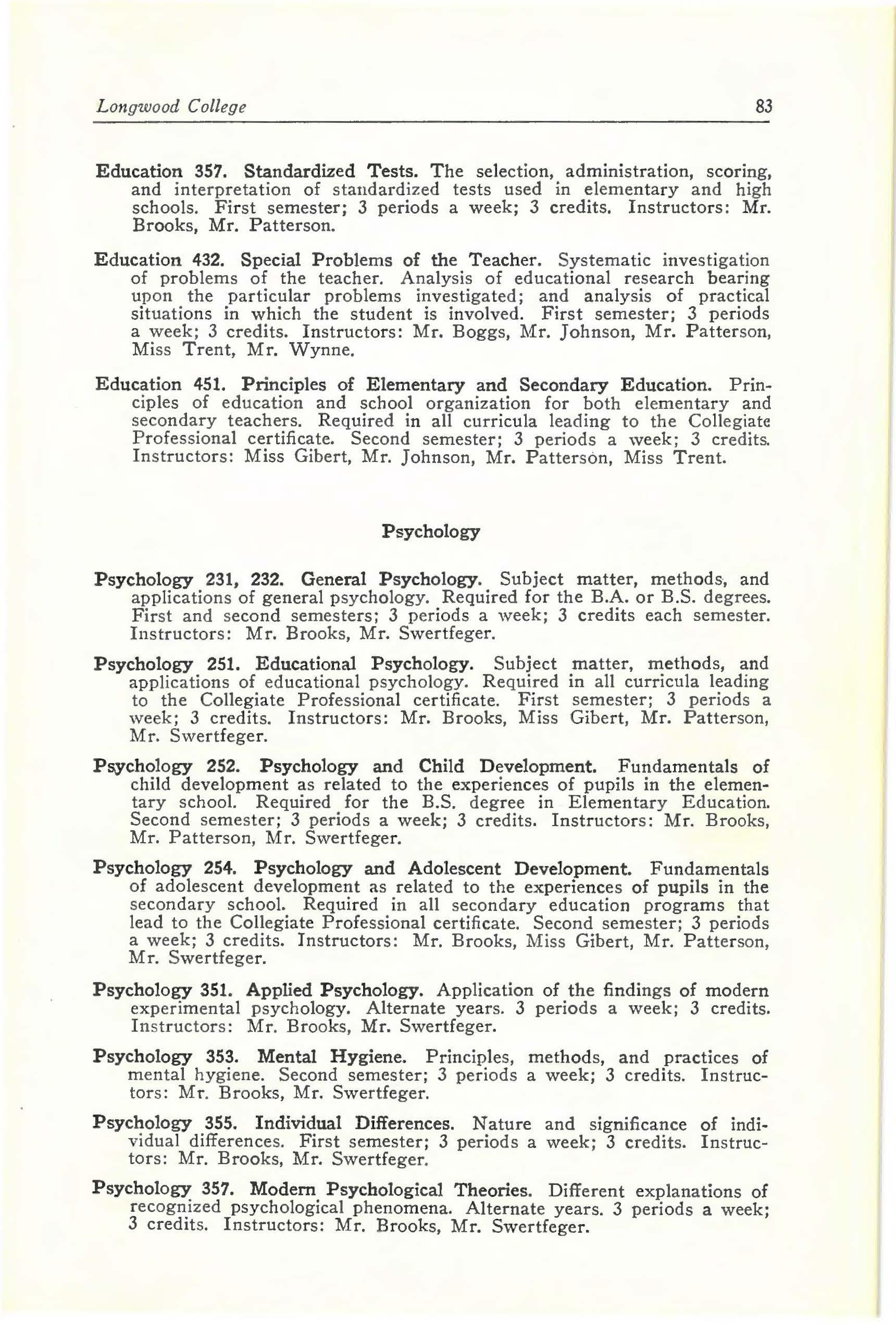
Education 451. Principles of Elementary and Secondary Education. Principles of education and school organization for both elementary and secondary teachers. Required in all curricula leading to the Collegiate Professional certificate. Second semester; 3 periods a week; 3 credits. Instructors: Miss Gibert, Mr. Johnson, Mr. Patterson, Miss Trent.
Psychology 231, 232. General Psychology. Subject matter, methods , and applications of general psychology. Required for the B.A. or B.S. degrees. First and second semesters; 3 periods a week; 3 credits each semester. Instructors: Mr. Brooks, Mr. Swertfeger.
Psychology 251. Educational Psychology. Subject matter, methods, and applications of ed ucational psychology. Re quired in all curricula leading to the Collegiate Professional certificate. First semester; 3 periods a week; 3 credits. Instructors: Mr. Brooks, Miss Gibert, Mr. Patterson, Mr. Swertfeger.
Psychology 252. Psychology and Child Development. Fundamentals of child development as related to the experiences of pupils in the elementary school. Required for the B.S. degree in Elementary Education. Second semester; 3 periods a week; 3 credits. Instructors: Mr. Brooks, Mr. Patterson, Mr. Swertfeger.
Psychology 254. Psychology and Adolescent Development. Fundamentals o f adolescent development as related to the experiences of pupils in the secon dar y school. Required in all secondary education programs that lead to the Collegiate Professional certificate. Second semester; 3 periods a week; 3 credits. Instructors : Mr. Brooks, Miss Gibert, Mr. Patt e r son, Mr. Swertfeger.
Psychology 351. Applied Psychology. Application of the findings of modern experimental psychology. Alternate years. 3 periods a week; 3 credits Instructors: Mr . Brooks, Mr. Swertfeger.
Psychology 353. Mental Hygiene. Principles , methods, and practices of mental hygiene. Second semester; 3 periods a week; 3 credits. Instructors: Mr Brooks, Mr. Swertfeger.
Psychology 355. Individual Differences. Nature and significance of individual difference s First semester; 3 periods a week; 3 credits. Instructors: Mr. Brooks, Mr. Swertfeger.
Psychology 357. Modem Psychological Theories . Different explanations of recogn ized psychological phenomena. Alternate years. 3 periods a week; 3 credits Instructors : Mr. Brooks, Mr. Swertfeger.
Religion 302. Religions. of the World. A study of the principal religions of the world including readings in· the history and literature of the peoples whose religions are discussed. Second semester; 2 periods a week; 2 credits. Instructor: Miss Wilson.
Philosophy 360. Philosophy of Life. Critical examination of the foundations and development of historical and current systems of thought. Required for the Bachelor of Arts degree. Offered each semester; 3 periods a wee k; 3 credits. Instructors: Mr. Boggs, Mr. Swertfeger, Mr. Wynne.
Philosophy 460. Philosophy of Education. Critical analysis of foundations, implications and applications of the different philosophies of education exemplified in current practice. Required in all curricula leading to the Collegiate Professional certificate. Offered each semester; 3 periods a week; 3 credits. Instructors: Mr. Boggs, Mr. Swertfeger, Mr. Wynne.
Philosophy 471. Types of Philosophic Thought. Critical examination of historical theories of knowledge and reality and their practical implications ' and applications involving logic, epistology, and metaphysics Second semester; 3 periods a week; 3 credits. Instructors: Mr. · Boggs, Mr. Swertfeger, Mr. Wynne.
Philosophy 472. Types of Philosophic Thought. Critical examination of historical and current theories of value and their practical implications and applications, including a consideration of ethics, aesthetics, and religion. Second semester; 3 periods a week; 3 credits. Instructors: Mr. Boggs, Mr. Swertfeger, Mr. Wynne.
Education 300. Teaching in the Elementary School. Directed teaching in the elementary school. Offered both semesters; 6 to 12 credits. Required for the B.S. in Elementary Education. (See prerequisite for student teaching on page 53.) Instructors: Mr. Boggs, Miss Gibert, Mr. Patterson, Miss Trent, Miss Adams, Supervisors, and SP.ecial Supervisors.
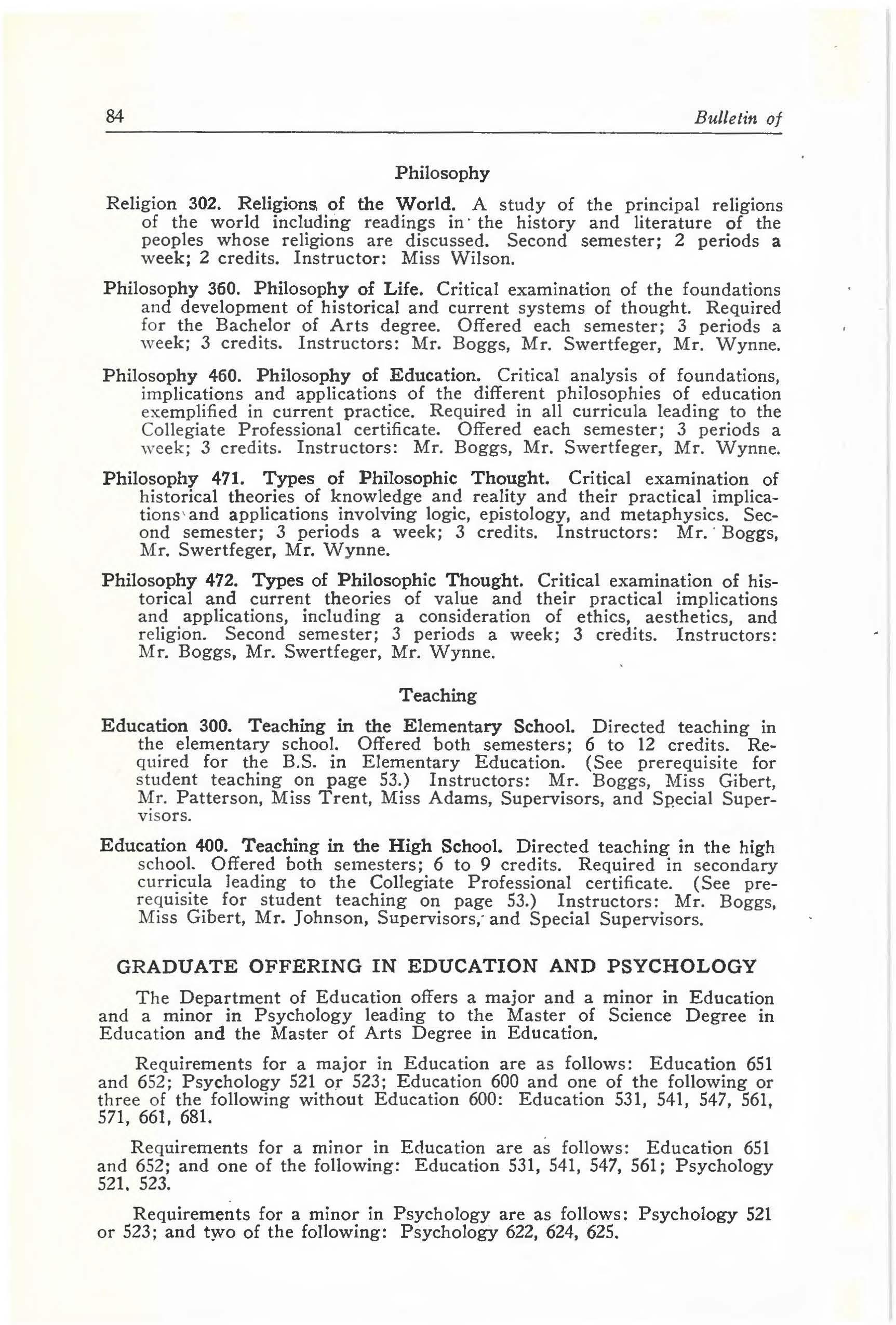
Education 400. Teaching in the High School. Directed teaching in the high school. Offered both semesters; 6 to 9 credits. Required in secondary curricula leading to the Collegiate Professional certificate. (See prerequisite for student teaching on page 53.) Instructors: Mr. Boggs, Miss Gibert, Mr. Johnson, Supervisors; and Special Supervisors.
The Department of Education offers a major and a minor in Education and a minor in Psychology leading to the Master of Science Degree in Education and the Master of Arts Degree in Education.
Requirements for a major in Education are as follows: Education 651 and 652; Psychology 521 or 523; Education 600 and one of the following or three of the following without Education 600: Education 531, 541, 547, 561, 571, 661, 681.
Requirements for a minor in Education are as follows: Education 651 and 652; and one of the following: Education 531, 541, 547, 561; Psychology 521. 523.
Requireme~ts for a minor in Psychology are as follows: Psychology 521 or 523; and t)Vo of the following: Psychology 622, 624, 625.
Education 525. Reading in the Elementary and Secondary School. A study of , the teaching principles and techniques in the field of reading. 3 credits. Instructor: Miss Trent.
Education 531. Problems of Elementary Education.
Education 541. Problems of Secondary Education.
Education 547. Sensory Materials. The philosophy and psychology of sensory •learning and the techniques and materials of audio-visual instruction. 3 credits. Instructors: Mr. Johnson, Mr. Patterson.
Education 561. Supervision of Instruction. A course for teachers, principals, supervisors and administrators. The nature and scope of supervision as educational 1eadership in the improvement of instruction. 3 credits. Instructor: Mr. Boggs.
Education 571. Principles of Instruction. A study and appraisal of different methods of teaching in modern education. 3 credits. Instructors: Mr. Boggs, Mr. Patterson.

Psychology 521. Human Growth and Development.
Psychology 523. Mental Hygiene.
Education 651, 652. Foundations of Education. Critical examination of the philosophical foundations, cultural backgrounds, and the practical implications and applications of historical theories of education currently influencing school practices. (Fundamental courses for all students with a major or minor in education.) 3 credits each. Instructors: Mr. Swertfeger, Mr. Wynne.
Education 661. Research in Education.
Education 681. Evaluation of Education. Techniques and resources of educational evaluation of instructional efficiency helpful to teachers, supervisors and administrators. 3 credits. Instructors: Mr. Boggs, Mr. Brooks.
Psychology 622. Psychology of Learning.
Psychology 624. Principles of Psychological Measurement.
Psychology 625. Social Psychology.
Miss Applegate, Mrs. Davis, Mr. Gresham, Mr. Meeker, Miss Nichols, Mrs. Pollard, Mrs. Schlegel, *Mr. Taplin, Miss Tyree, *Mr. Wellard, Mr. Wiley
The Department of English offers courses in writing, literature, linguistics, journalism, speech, dramatic ~rt, 3:nd in th~ teaching of English. The Department seeks to coordmate its work with that of other departments and with the counseling program of the College. It seeks the cooperation of all instructors in securing and maintaining the use of creditable English in all classes. Improvement in the command and effective use of the mother tongue is further motivated by the extra-curricular activities sponsored by the Department.
Students in advanced courses who show marked deficiencies in the fundamentals of English are required to remedy these deficiencies before receiving credit.
In general, the Department attempts to provide its majors with (1) a philosophy of language, ( 2) a philosophy of literature, and ( 3) some skill in the communication and interpretive arts. To become eligible to take a major in English, a student must make a grade of "C" or above in English 111-112 or the equivalent. The major in English requires also the following: English 211-212; English 224; two courses with numbers on the 300, 400 or 500 level elected from departmental offerings; English SOS and sufficient approved elective courses in the Department to make up a total of the 30 hours required for the major.

Students taking English as their major in curricula leading to teaching in the high school are advised to shape their programs so as to include studies in the related fields of history and the social studies, foreign languages, music, and art.
For students who wish to meet certification requirements for teaching English in the high schools of Virginia, the following courses are recommended: English 111-112; English 211-212; English 224; and English 505.
An English placement test is administered to all beginning freshmen prior to registration for classes. Students will be placed in appropriate sections of either English 111 or 112 according to their performance on this test.
*L e a ve of abs e n ce , 1958-59.
In order to be assured that Longwood students maintain the standards of English usage and reading comprehension required in English 112, all juniors are required to take a test in correctness and effectiveness of written expression and reading ability during the first semester of the junior year. Satisfactory achievement on this test is a prerequisite for graduation in all curricula. Those failing to attain an acceptable standard on the test are expected to enroll in the Remedial English class or Developmental Reading program and may be required to repeat the test at a stated time within a year. This regulation applies also to transfer students.
English 111-112. Freshman English. Oral and written communication. Class and laboratory work in reading, writing, speaking, and listening. Emphasis on correctness, clarity, and effectiveness in use of language. Training in library research and documentation. First and second semesters; 3, 4, or 5 periods a week, according to placement; 3 credits each semester. Instructors: The Staff.
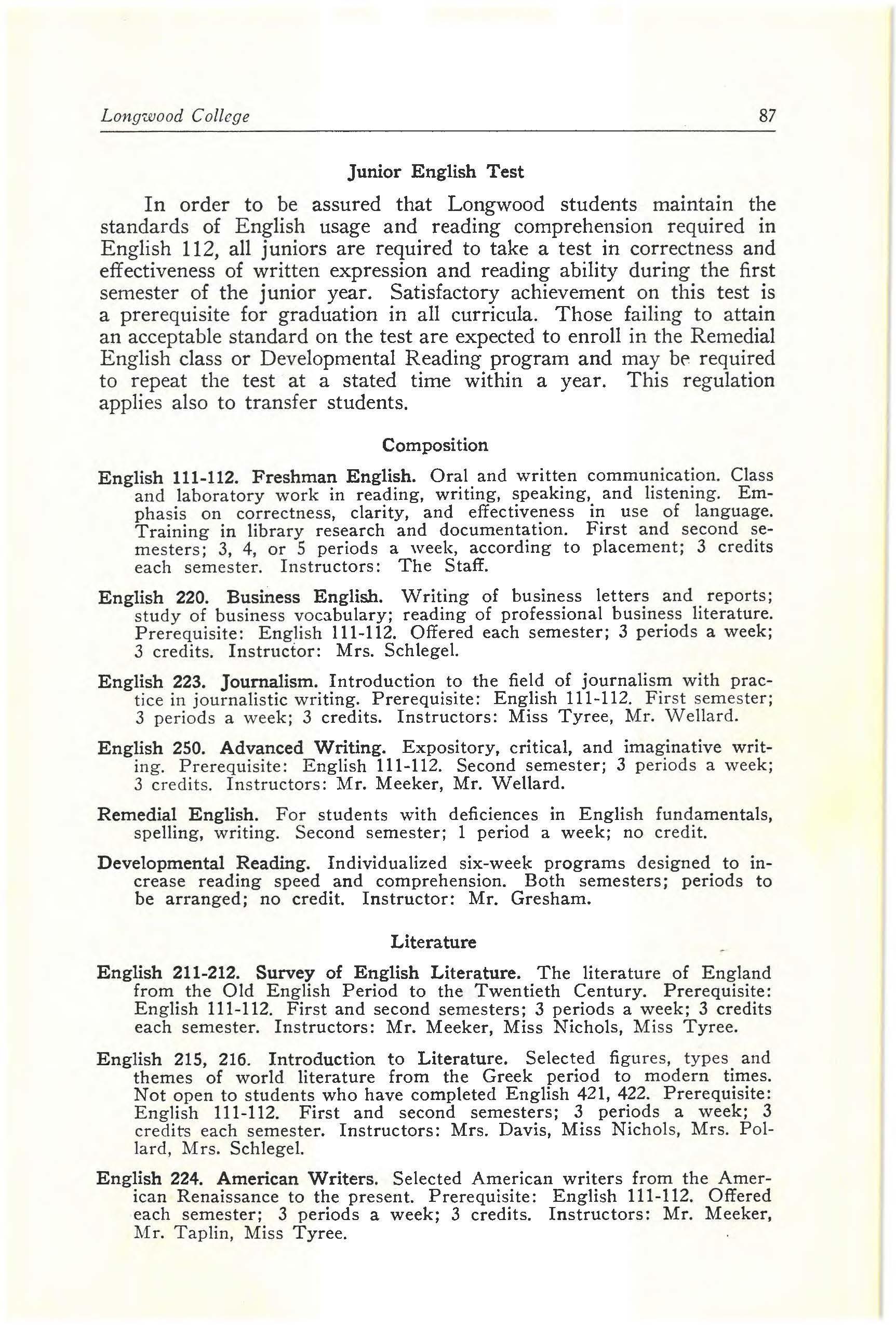
English 220. Business English. Writing of business letters and reports; study of business vocabulary; reading of professional business literature. Prerequisite: English 111-112. Offered each semester; 3 periods a week; 3 credits. Instructor: Mrs. Schlegel.
English 223. Journalism. Introduction to the field of journalism with practice in journalistic writing. Prerequisite: English 111-112. First semester; 3 periods a week; 3 credits. Instructors: Miss Tyree, Mr. Wellard.
English 250. Advanced Writing. Expository, critical, and imaginative writing. Prerequisite: English 111-112. Second semester; 3 periods a week; 3 cr ed it s. In s tructors: Mr. Meeker, Mr. Wellard.
Remedial English. For students with deficiences in English fundamentals, spelling, writing. Second semester; 1 period a week; no credit.
Developmental Reading. Individualized six-week programs designed to increase reading speed and comprehension. Both semesters; periods to be arranged; no credit. Instructor: Mr. Gresham.
English 211-212. Survey of English Literature. The literature of England from the Old English Period to the Twentieth Century. Prerequisite: English 111-112. First and second semesters; 3 periods a week; 3 credits each semester. Instructors: Mr. Meeker, Miss Nichols, Miss Tyree.
English 215, 216 . Introduction to Literature. Selected figures, types and themes of world literature from the Greek period to modern times. Not open to students who have completed English 421, 422. Prerequisite: English 111-112. First and second semesters; 3 periods a week; 3 credits each semester. Instructors: Mrs. Davis, Miss Nichols, Mrs. Pollard, Mrs. Schlegel.
English 224. American Writers. Selected American writers from the American Renaissance to the present. Prerequisite: English 111-112. Offered each semester; 3 periods a week; 3 credits. Instructors: Mr Meeker, Mr. Taplin, Miss Tyree.
English 247. Bible Literature. The Old and New Testaments as works of literature. First semester; 3 periods a week; 3 credits. Instructor: Mrs. Schlegel.
English 326. Children's Literature. Survey of children's literature; evaluation of children's books; study of the use of poetry and prose in the elementary classroom. (Same as Education 326.) Prerequisite: English 111-112. Offered each semester; 3 periods a week; 3 credits. Instructor: Mr. Gresham.

English 331, 332. The Novel. First semester: development of the English novel from Defoe through the nineteenth century. Second semester: trends in the contemporary English and American novel. Prerequisite: English 111-112. First and second semesters; 3 periods a week; 3 credits each semester. Instructor: Miss Nichols. ·
English 360. Shakespeare. Selected comedies, tragedies, and non-dramatic poetry. Prerequisite: English 111-112. Offered each semester; 3 periods a week; 3 credits. Jnstructor: Mr. Simonini.
English 364. Major British Romantic Poet::;. Wordsworth, Coleridge, Byron, Keats, Shelley. Prerequisite: English 111-112. First semester; 3 periods a week; 3 credits. Instructor: Mrs. Davis.
English 365. The Victorian Poets. Tennyson, Browning, and selected minor poets. Prerequisite: English 111-112. Second semester; 3 periods a week; 3 credits. Instructor: Mr. Taplin.
English 366. The Short Story. A study of the modem short story as a literary form with some attention to creative as well as critical work by the class. Prerequisite: English 111-112. Second semester; 3 periods a week; 3 credits. Instructor: Mr. Meeker.
English 367 . Modern Poetry. American and British poetry of the past hundred years. Prerequisite: English 111-112. First semester; 3 periods a week; 3 credits. Instructor: Mrs. Davis. '
English 369. Modern Drama. A study oL the European and American theatre from Ibsen to the present. (Same as Dramatic Art 369.) Prerequi site: English 111-112. Second semester; 3 periods a week; 3 credits. Instructor: Mr. Wiley.
English 421, 422. Comparative Literature. First semester: ancient, medieval, and Renaissance classics with emphasis on their contribution to Western culture. Second semester: world literature of the neo-classical, romantic, and modern periods. (Not open to students who have completed English 215, 216.) Prerequisite: English 111-112. First and second semesters; 3 periods a week; 3 credits each semester. Instructor: Mrs. Schlegel.
English 325. Language Arts and Reading in the Elementary School. Language and reading. (Same as Education 325.) Prerequisites: English 111-112 and English 215, 216. Offered each semester; 3 periods a week; 3 credits. Instructor: Miss Trent.
English 412 . The English Language. Historical linguistics; etymology; dialects; orthography; semantics. Prerequisite: English 111-112. 3 credits. Instructor: Mr. Simonini.
Directed Teaching of English in the High School. Students major!ng in English, preparing to teach English in the high school, ca~ry on directed teaching in this field during their senior year as Education 400, under a general supervisor, supervising teacher and a consultant in the Department of English. Consultant: Mr. Gresham.
Speech 101. Fundamentals of Public Spe_ech. Informative talks and reports; oral interpretation; persuasive speaking. Offered each semester; 2 periods a week; 2 credits. Instructors: Miss Applegate, Mr. Wiley.
Speech 103. Speech for the Classroom Teacher. The role of speech in teaching; physiology of speech, voice training, phonetics, and practice in oral interpretation, public address, and group discussion techniques. Second semester; 2 periods a week; 2 credits. Instructor: Mr. Wiley.
Speech 201. Discussion and Debate. Conduct of the democratic meeting; group discussion; formal debate. First semester; 2 periods a week; 2 credits. Instructor: Miss Applegate.
Dramatic Art 101, 102. Play Production. A laboratory course. First semester: principles of play production; study in lighting, costumes, and scenery. Second semester: practice in directing; study of roles and scenes. First and second semesters; 3 double periods a week; 3 credits each semester. Instructor: Mr. Wiley.
Dramatic Art 301. Problems in Directing. Problems in directing with particular reference to the educational theatre, theatre organization, styles of presentation, composition and picturization, and relationships between the director and other theatre workers. Students will direct one-act plays and assist in direction of the major play of the semester. Prerequisite: Dramatic Art 101 and 102. First semester; 2 double periods a week; 2 credits. Instructor: Mr. Wiley.
Dramatic Art 369. Modern Drama. A study of the European and American theatre from Ibsen to the present. (Same as English 369.) Prerequisite: English 111-112. Second semester; 3 periods a week; 3 credits. Instructor: Mr. Wiley.
The following basic courses are required for both a major and minor in English in the program for the degree of Master of Arts in Eduaction: English 505, 522, and 651. These courses, dealing with fundamental principles of linguistic and literary analysis and composition, are designed for teachers of language arts on both the elementary and secondary levels. Students electing to take a double minor will choose any two of these courses. The graduate major in English requires 9 additional semester hours of courses elected from departmental offerings.

English 505. Modern English Grammar. Structural linguistics: phonology, morphology, syntax, usage. Prerequisite: 2 years of English. First semester; 3 periods a week; 3 credits. Instructor: Mr. Simonini.
English 522. Practical Literary Criticism. A study of the various methods of judging and appreciating literature. Hi sto rical , psychological, philosophical, and esthetic approaches will be demonstrated in analyses of selected works. Prerequisite: 2 years of English. 3 credits. Instructor: Mr. Meeker.
English 532. Litera,ture of the South. A study of literature produced in the Southern United States from Colonial times to the present. Prerequisite : 2 years of English. 3 credits. In s tructor : Mr. Meeker.
English 541. World Classics in Translation.
English 600. Thesis Research. Study of a selected topic for the Master's thesis under the direction of a departmental adviser. 6 credits .
English 631. Study of a Literary Figure: Shakespeare. Prerequisite: 2 years of English. 3 credits. Instructor: Mr. Simonini.
English 651. Seminar in English Composition. Procedures and problems of composition, including readings in current literature on rhetoric and style Prerequisite: 2 years of English. 3 credits. Instructor: Mr. Wellard.
Students desiring a major in French must complete 24 semester hours credit in French, exclusive of French 111-112; those desiring a major in Spanish must complete 24 hours credit in Spanish, exclusive of Spanish 111-112; those desiring a major in Latin must complete 24 seme ster hours credit in Latin , ex clusive of Latin 111-112. All foreign language majors are advised to elect courses in European and South American history and geography. To fulfill the foreign language requirements for the B.A. degree, students must elect 18 semester hours credit in one language , or 12 semester hours credit in one language and 6 semester hours credit in another. The 12 semester hours credit required for the B.A. in Secondary Education and the B .S. degree must be in one language. A student may take 6 hours credit in one language as an elective in any curriculum.
A course in methods of teaching foreign languages, taught by a member of the Department of Foreign Languages, is given with Education 400. It is a course primarily for majors in foreign languages, is conducted entirely in English, and gives no credit toward the major in French , in Spanish, or in Latin.
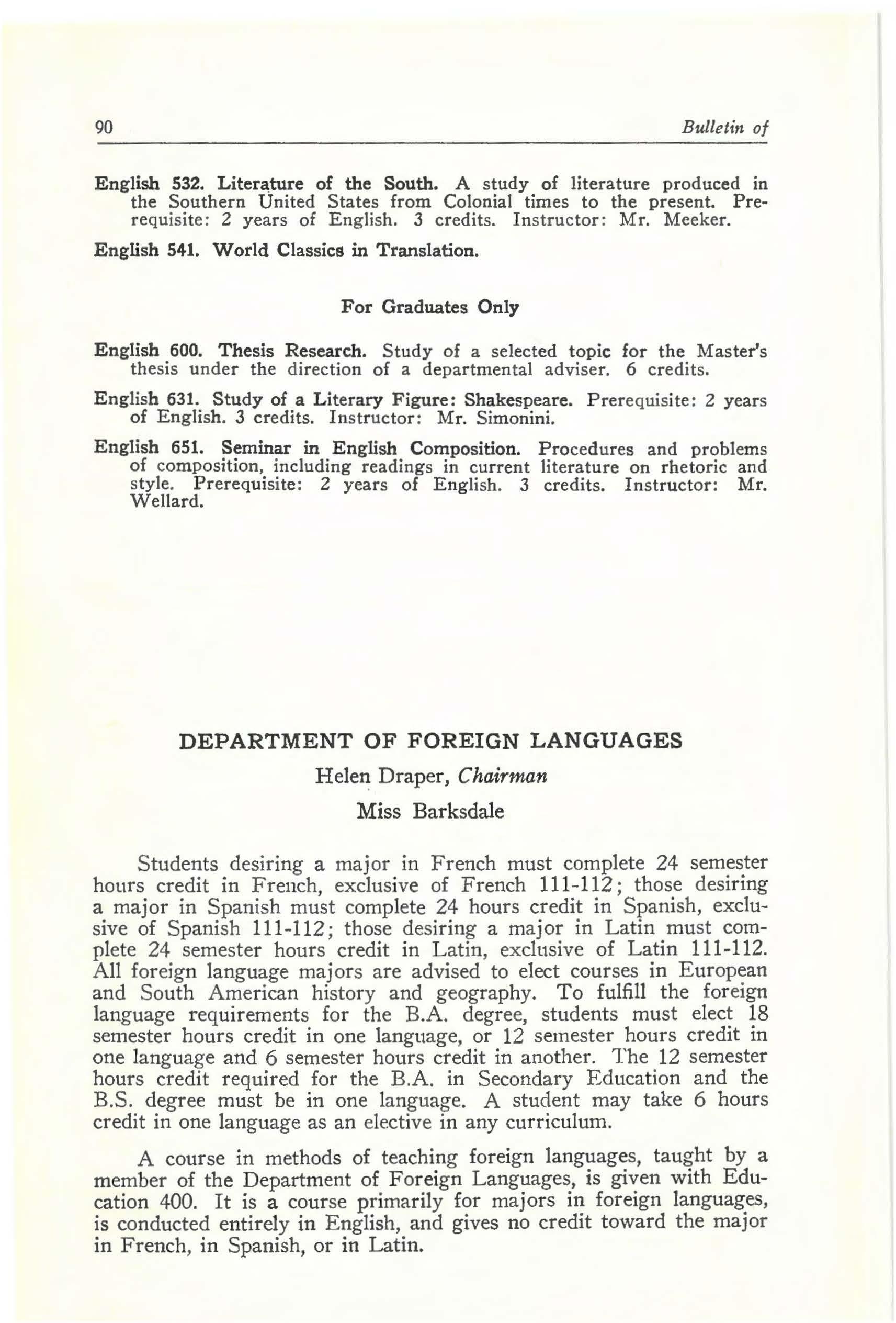
A native Spanish student and a native French student assist in each class once a week for drill in pronunciation and oral use of the languages. They are also hostesses of French and Spanish-speaking tables in the dining room and take part in the club meetings, thus offering unusual opportunities to students for speaking both languages and for learning about customs and cultures.
The Foreign Language Laboratory consists of three rooms: a listening room containing six booths, a larger completely sound-proof room of ten booths, and a sound-proof recording room. The recording room has equipment for making both tape and disc recordings. The booths of the other laboratory rooms are equipped with six dual-channel tape recorders, two Stereotone ·tape recorders, eight record players, and many earphones and microphones. The sound-proof room also has outlets and adapters for the use of large classes. Disc and tape recordings are added each year to the laboratory library.
French 111-112. Beginners' French. Topics and readings about France. First and second semesters; 5 periods a week; 3 credits each semester. Instructor: Miss Draper.
French 121-122. Intermediate French. Topics and reading about French life and culture. Prerequisite: a minimum of two years of high school or one year of college French. First and second semesters; 3 periods a week; 3 credits each semester. Instructor: Miss Draper.
French 221-222. Advaticed French. Language, phonetics, and reading of modern French writers. Prerequisite: Intermediate French. First and second semesters; 3 periods each week; 3 credits each semester. Instructor: Miss Draper.
French 321-322. A Survey of French Literature. Prerequisite: Intermediate French. First and second semesters; 3 periods a week; 3 credits each semester. Instructor : Miss Draper.
French 331. French Literature of the Seventeenth Century. Prerequisite: French 221-222 or French 321-322. Offered alternate years. 3 periods a week; 3 credits. Instructor: Miss Draper.
French 332. French Literature of the Nineteenth Century. Prerequisite : French 221-222 or French 321-322. Offered alternate years. 3 periods a week; 3 credits. Instructor: Miss Draper.
French 421, 422, Contemporary French Literature. Prerequisite: French 221-222 or French 321-322. First and second semesters; 3 periods a week; 3 credits each semester. Instructor: Miss Draper.
French 431, 432. The Modem French Theater. Extensive reading and study of French drama of the nineteenth and twentieth centuries. Prerequisite: French 221-222 or French 321-322. First and second semesters; 3 periods a week; 3 credits. Offered upon demand Instructor : Miss Draper.
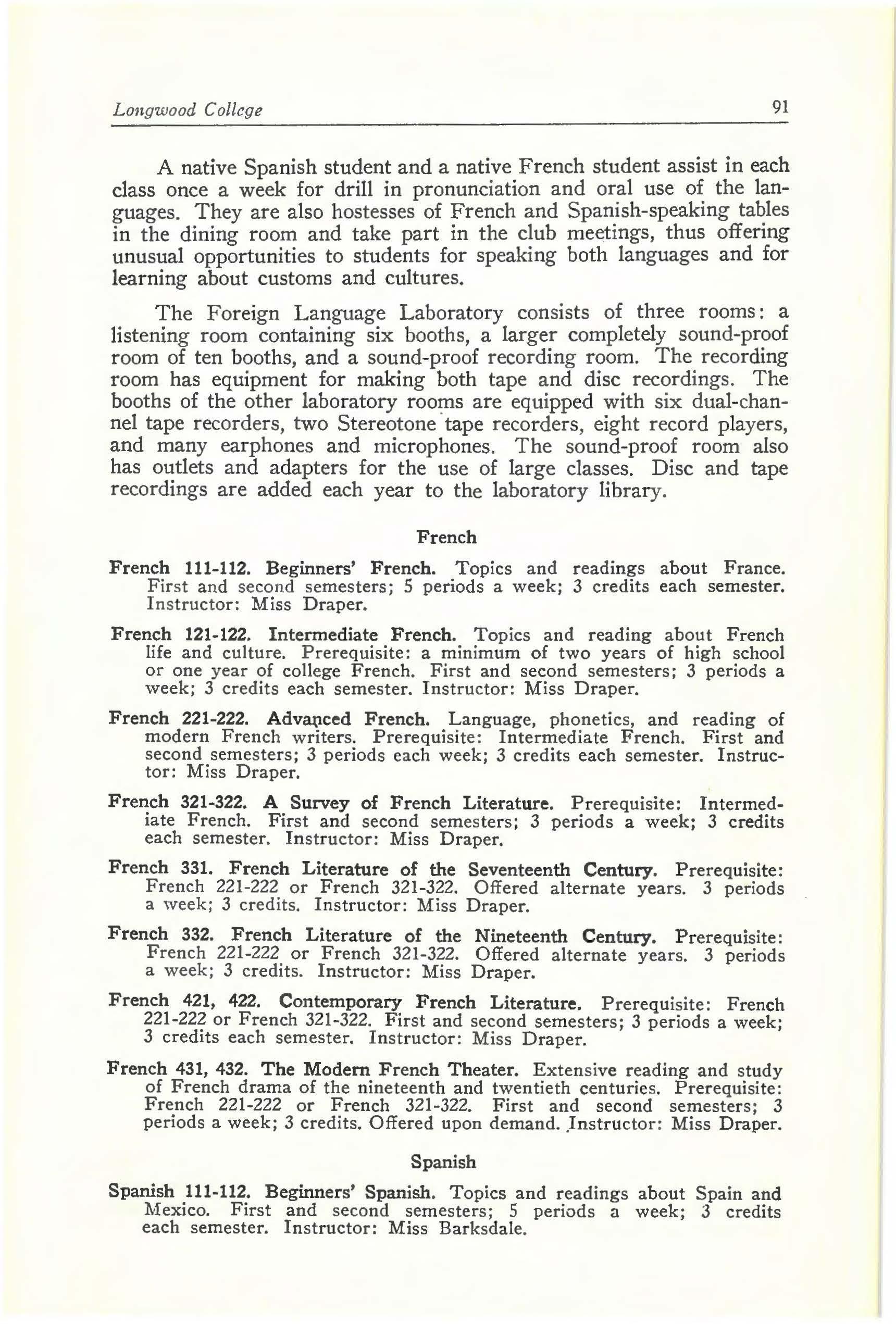
Spanish 111-112. Beginners' Spanish. Topics and readings about Spain and Mexico. First and second semesters; 5 periods a week; 3 credits each semester. Instructor: Miss Barksdale.
Spanish 121-122. Intermediate Spanish. Topics and readings about LatinAmerican life and culture. Prerequisite : A minimum of two years of high school or one year of college Spanish Instructor: Miss Barksdale.
Spanish 221-222. Advanced Spanish. Language and reading of selected works of contemporary Spanish and Spanish-American writers. Prerequisite: Intermediate Spanish. First and second semesters: 3 periods a week; 3 credits each semester. Instructor : Miss Barksdale.
Spanish 321-322. Survey of Spanish Literature. Prerequisite: Advanced Spanish. First and second semeste rs; 3 periods a week; 3 credits each semester. In structor: Miss Barksdale.
Spanish 421, 422. Spanish-American Literature. Prerequisite: Advanced Spanish. First and second semesters; 3 periods a week; 3 credits each semester. Instructor: Miss Barksdale.
Spanish 451, 452. Survey of the Spanish Drama. Prerequisite : Advanced Spanish. First and second semesters; 3 periods a week; 3 credits each semester. Instructor: Miss Barksdale.
Latin 111-112. Beginners' Latin. Will be offered on sufficient demand. First and second semesters; 5 periods a week; 3 credits each semester.
Latin 121-122. Intermediate Latin. Will be offered on sufficient demand Prerequisite: a minimum of two years of high school or one year of college Latin. First and second semesters; 3 periods a week; 3 credits each semester.
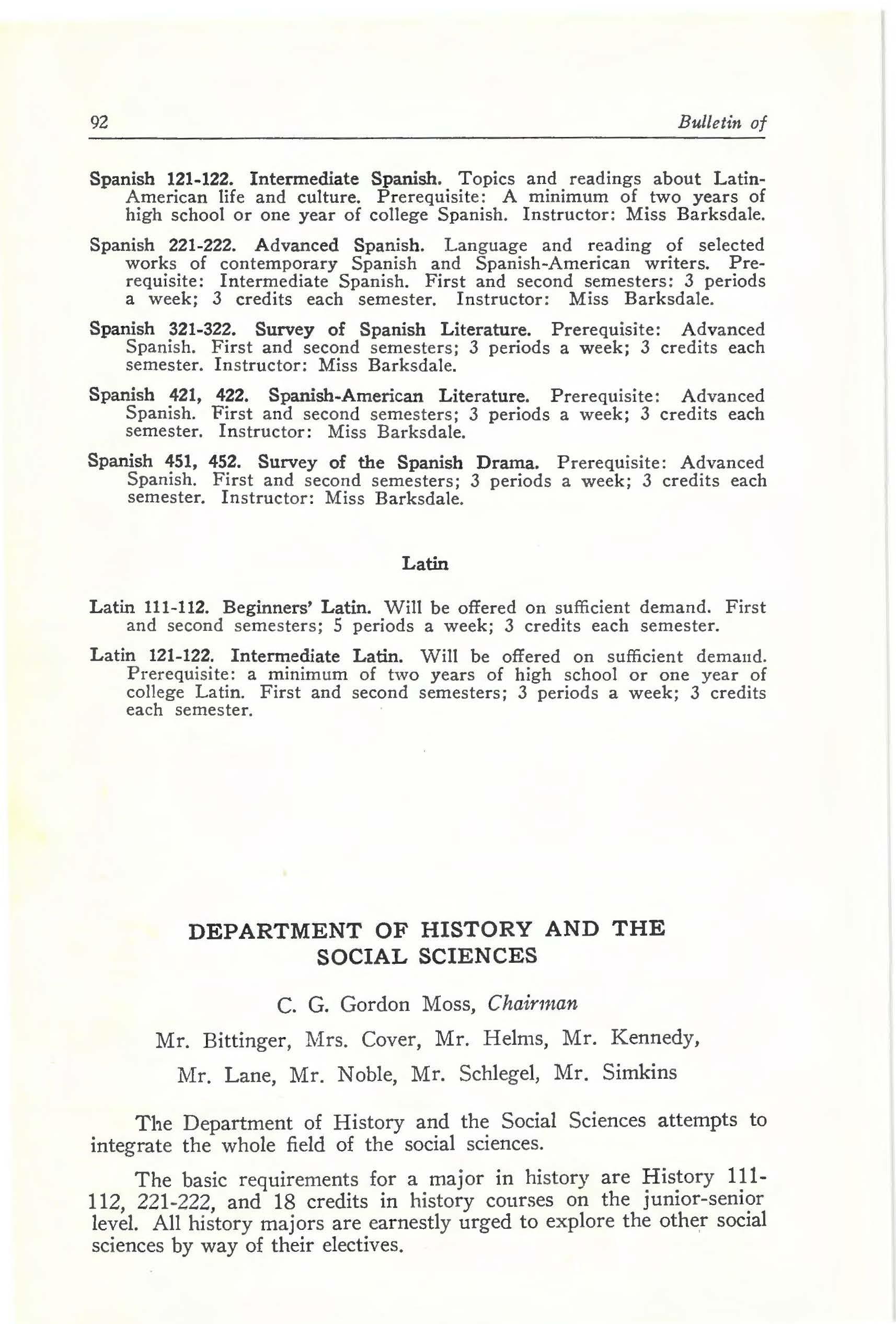
C. G. Gordon Moss, Chairman
Mr. Bittinger, Mrs. Cover, Mr. Helms, Mr. Kennedy, Mr. Lane, Mr. Noble, Mr. Schlegel, Mr. Simkins
The Department of History and the Social Sciences attempts to integrate the whole field of the social sciences.
The basic requirements for a major in history are History 111112, 221-222, and 18 credits in history courses on the junior-seni?r level. All history majors are earnestly urged to explore the othe,r social sciences by way of their electives.
The subject matter of geography includes materials from both the natural and the social science fields. Since major emphasis is placed upon the life of people as it is related to natural environment, courses in geography are counted as credits in social science. A major in this field requires 30 credits.
In sociology a major requires Economics 443-444, Government 335-336 and 18 credits in sociology, which should include Sociology 221, 222.
Students preparing to enter social welfare work should take at least 18 credits i n s ociology, including social psychology; 8 credits in biology; 6 credits in economics; and 6 credits in American government.
A major in the social sciences requires 30 semester hours, not more than 15 of which may be in any one social science.
History 111-112. History of Civilizatjon. A survey course in world civilizations. First and second semesters; 3 periods a week; 3 credits each semester. Instructors: The Staff.
History 221-22~. American History. An introductory survey course in American history. First and second semesters; 3 periods a week; 3 credits each semester. Instructors: The Staff.
History 331. American Civil War and Reconstruction. Prerequisite: History 211-222. Alternate years. Offered second semester 1960-61 ; 3 per iods a week; 3 credits. Instructor: Mr. Schlegel.
History 334. United States History Since 1900. Prerequi s ite: History 221222. Alternate years. Offered second semester 1959-60; 3 periods a week; 3 credits. Instructor: Mr. Moss.
History 335. American Diplomatic History Since the Civil War. Prerequisite: History 221-222. Offered upon demand; 3 periods a week; 3 credits. Instructor: Mr. Moss.
History 337, 338. Southern History. First semester: the Old South; Second semester: the New South. Prerequisite: History 221-222. First and second semesters; 3 periods a week; 3 credits each semester. Instructor: Mr. Simkins.
History 341. European History, Renaissance to Waterloo. Early modern European history. Prerequisite: History 111-112. Alternate years. Offered first semester 1960-61; 3 periods a week; 3 credits. Instructo r: Mr. Helms.
History 342. European History, Waterloo to 1870. Nineteenth century European history. Prerequisite: History 111-112. Alternate years. Offered first semester 1959-60; 3 periods a week; 3 credits. Instructor: Mr. Helms.
History 343. European History, 1870 to the Present. Twentieth century European history. Prerequisite: History 111-112. Alternate years. Offered second semester 19.59-60; 3 periods a week; 3 credits. Instructor: Mr. Helms.
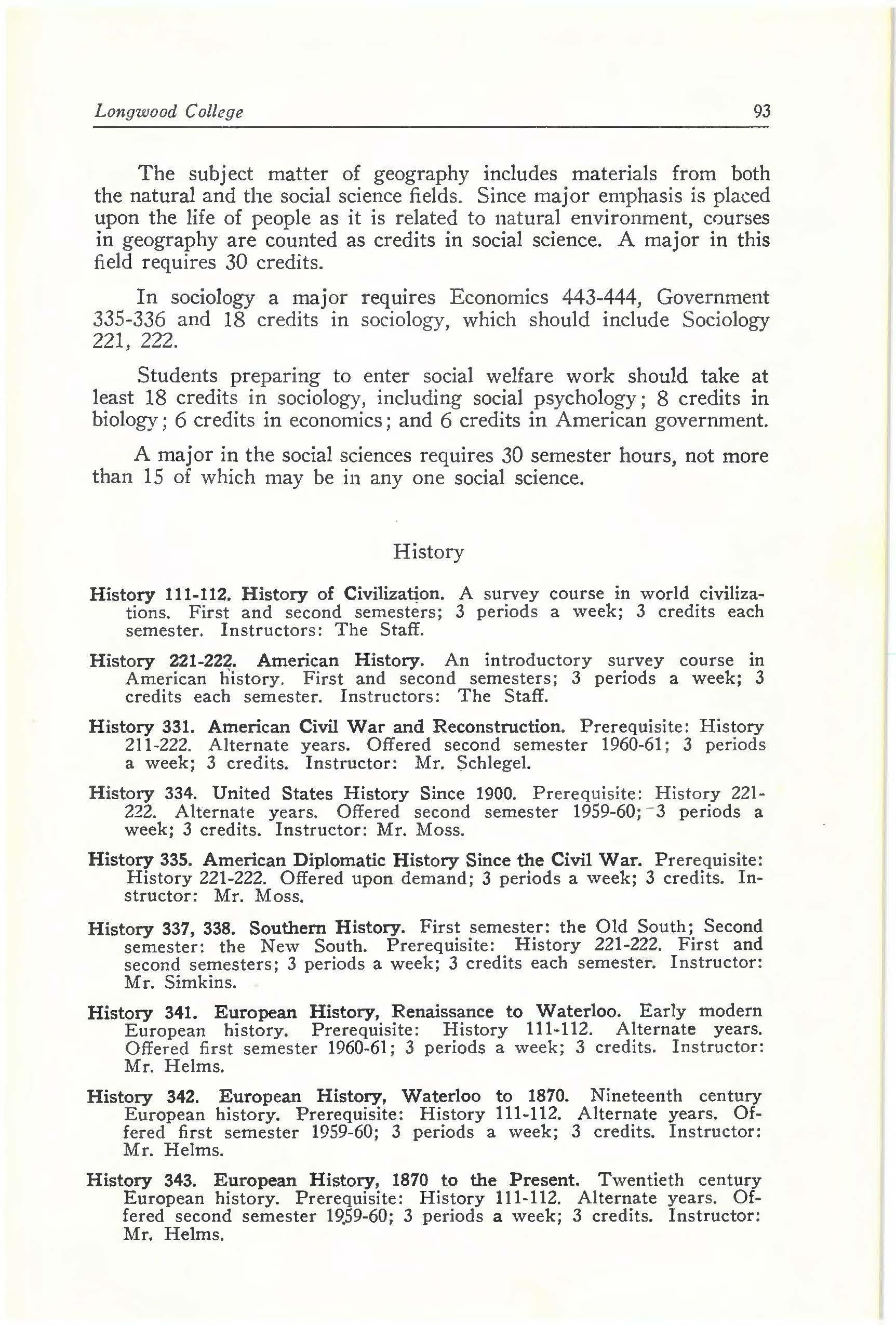
History 344. European Biography. Study of the lives of selected individuals in European history since 1300. frerequisite: History 111-112. Alternate years. Offered second semester 1960-61; 3 periods a week; 3 credits. Instructor: Mr. Helms.
History 430. History Seminar. Offered on demand. 1 period a week; 1 credit. Open only to senior history majors. Instructors: The Staff.
History 441. Virginia History. Prerequisite: History 221-222. Alternate years. Offered first semester 1960-61; 3 periods a week; 3 credits. Instructor: Mr. Schlegel.
History 443-444. British History. Prerequisite: History 111-112. Alternate years. Offered first and second semesters 1960-61; 3 periods a week; 3 credits each semester. Instructor: Mr. Moss.
History 445. Latin American History. Alternate years. Offered first semester 1959-60; 3 periods a week; 3 credits. Instructor: Mr. Simkins.
History 446. History of the Far East. Alternate years. Offered second semester 1959-60; 3 periods a week; 3 credits. Instructor: Mr. Schlegel.
History 447. American Colonial History. Prerequisite: History 221-222. Alternate years. Offered first semester 1959-60; 3 periods a week; 3 credits. Instructor: Mr. Moss.
History 448. History of Russia. Prerequisite: History 111-112. Alternate years. Offered first semester 1959-60; 3 periods a week; 3 credits. In s tructor: Mr. Schlegel.
Economics 443-444. Principles of Economics. First and second semesters. 3 periods a week; 3 credits each semester. Instructor: Mr. Bittinger.
Geography 141-142. Principles of Geography, Fundamentals of geography as a foundation to th.e understanding of man's environment. First and s econd semesters; 3 periods a week; 3 credits each semester. Instructors: Mr. Lane, Mr. Noble.
Geography 211, 212. Geography for Teachers. An experimental and practical approach in teaching world and regional geography. Skills involved in reading and interpreting geographical data will be emphasized. Instructors: Mr. Lane, Mr. Noble.
Geography 242. Economic Geography. Relation of geographic factors to economic conditions in determining the nature and location of the several productive occupations, and the distribution of the output of these occupations, including their transportation and marketing. Second semester; 3 periods a week; 3 credits. Instructor: Mr. Lane.
Geography 353. Geography and Geology of Virginia. Geographi!,:al appraisal of Virginia, including the geology, landforms, soils, climate, economic minerals, original vegetation, and the human geography of Virginia, emphasizing settlement and population, agriculture, industries, and transportation. Second semester; 3 periods a week; 3 credits. Instructor: Mr. Lane.
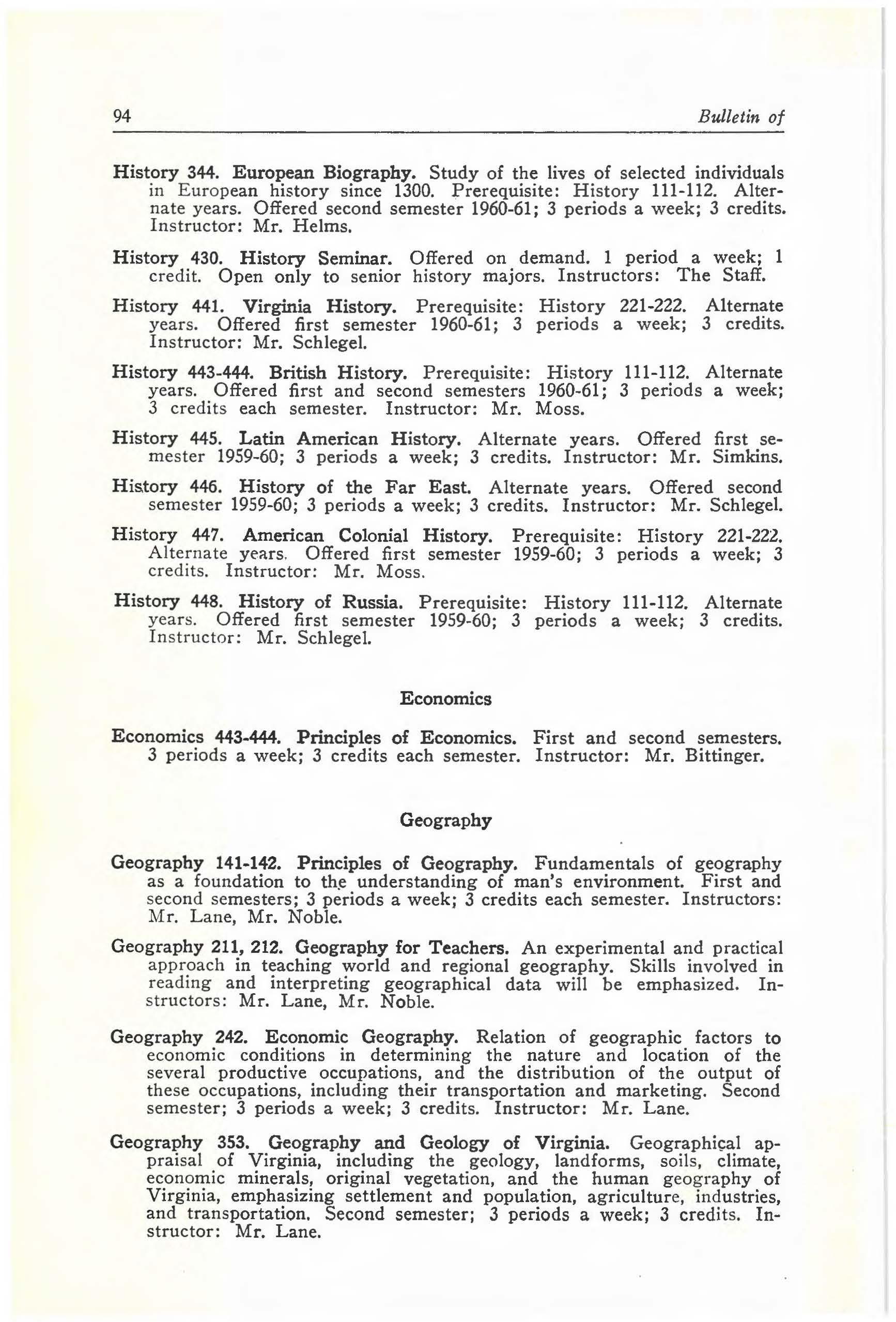
Geography 354. Weather, Climate, and M\\ll. An elementary background of various weather phenomena and climatic pattern s Particular empha si s is given to the effects of weather and climate upon man and his activities. Alternate years. Offered first semester 1960-61; 3 periods a week; 3 credits. Instructor: Mr. Lane.
Geography 356. Conservation of Natural Resources. Survey of resource problems and related conservation techniques in the United States. Particular emphasis is placed upon the resource conservation problems of the Southeastern States . Alternate years. Offered first s emester 1959-60 ; 3 periods a week; 3 credits. Instructor: Mr. Lane.
Geography 401. Geography of Southeast Asia. Regional analy s is of the ph ys ical geography and problems in the economic and politic a l geography o f S ou th ea s t Asia. Emphasis on Ch ina, Japan, and India Alternate years . Offered first semester 1960-61; 3 periods a week ; 3 credits. Instructor : Mr. Lane.
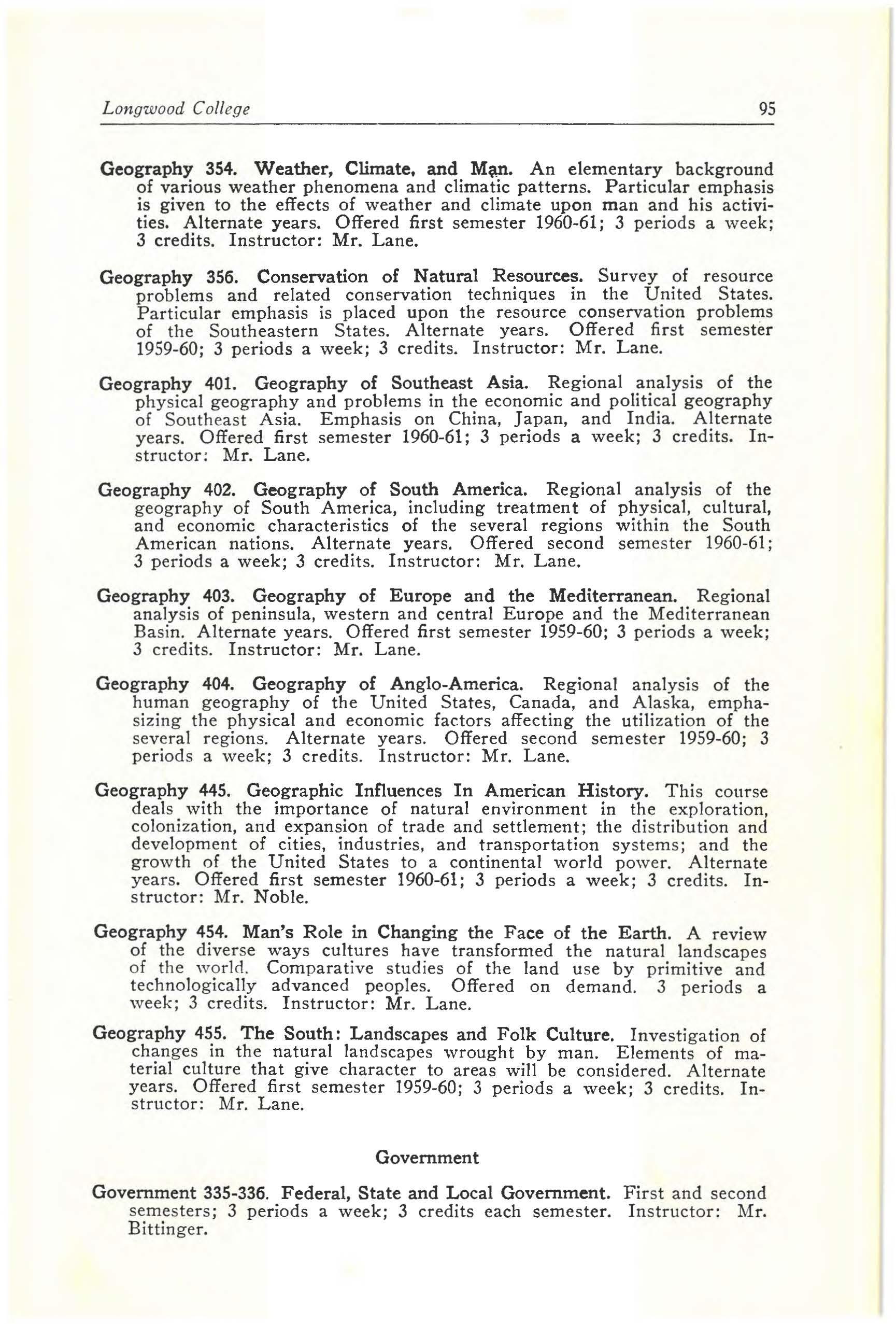
Geography 402. Geography of South America. Regional analysis of the g eography of South America, including treatment of phy s ical , cultural, and economic characteristics of the several regions within the South Am e rican nations. Alternate years. Offered second sem es t e r 1960-61; 3 p e riods a week; 3 credits. Instructor: Mr. Lane.
Geography 403. Geography of Europe and the Mediterranean. Regional analy s is of peninsula, western and central Europe and the Medit e rranean Ba si n Alternate years. Offered first semester 1959-60; 3 p e riods a week; 3 credits . Instructor: Mr. Lane .
Geography 404. Geography of Anglo-America. Regional analy s is of the human g eography of the United States, Canada, and Ala s k a, emphas izi n g th e physical and economic factors affecting the utili z ati o n of the se v e r a l r eg ions. Alternate years. Offered second semester 1959-60; 3 p e ri o d s a week; 3 credits. Instructor: Mr. Lane.
Geography 445. Geographic Influences In American History. Thi s course de a l s with the importance of natural environment in the ex p l o ration, co loni z ation , and expansion of trade and settlement; the di s tributi o n a nd devel op m e nt of cities, industries , and transportation sy st e m s ; and the grow th o f the United States to a continental world po we r. Alternate year s . Offered first seme s ter 1960-61; 3 periods a week ; 3 cr e dits. Ins tructor: Mr. Noble.
Geography 454. Man's Role in Changing the Face of the Earth. A review of th e diver s e ways cultures have transformed the natur a l l a nd s ca pes of the wo rl d. Comparat ive stud ies of the land u s e by p rimitive and t ec hn o log ic a lly advanced people s Offered on demand 3 p eriods a w ee k; 3 cr e dits. Instructor: Mr. Lane.
Geography 455. The South: Landscapes and Folk Culture. Inve s ti ga ti o n of ch a n g es in the natural landscap e s wrought by man. Elements of m a terial culture that give char ac t e r to areas will be considered . Alternate years. Offered first semester 1959-60; 3 periods a week; 3 credit s . In s tructor : Mr Lane.
Government 335-336 . Federal, State and Local Government. Fir st and second s em es ter s ; 3 periods a week; 3 credits each semester. In s truct o r: Mr. Bittin ge r .
Sociology 221. Introductory Sociology. The study of principles and comparisons in society and culture as these relate to social groups and institutions. First semester; 3 periods a week; 3 credits. Instructors: Mrs. Cover, Mr. Kennedy.
Sociology 222. Sociology of Child Development. Second semester; 3 periods a week; 3 credits. Instructors: Mrs. Cover, Mr. Kennedy.
Sociology 331. Social Psychology. Alternate years. Offered first semester 1959-60; 3 periods a week; 3 credits. Instructor: Mrs. Cover.
Sociology 332. Race and Cultural Minorities. Second semester; 3 periods a week; 3 credits. Instructor: Mrs. Cover.
Sociology 335. Juvenile Delinquency. The nature of delinquent behavior. Social determinants of delinquency. Methods of detention, probation and parole, court administration. Alternate years. Offered second semester 1960-6 1 ; 3 periods a week; 3 credits. Instructor: Mrs. Cover.
Sociology 441. Marriage and the Family. Offered each semester; 3 periods a week; 3 credits. Instructor: Mrs. Cover.
Sociology 442. Introduction to Social Service. Second semester; 3 periods a week; 3 credits. Instructor: Mrs. Cover.
Sociology 443. The Community. First semester; 3 periods a week; 3 credits. Instructor: Mrs. Cover.
Sociology 444. Con t emporary Social Problems. Alternate years. Offered first semester 1960-61; 3 periods a week; 3 credits. Instructor: Mrs. Cover.
Sociology 445. Social Pathology. Second semester; 3 periods a week; 3 credits. Instructor: Mrs. Cover.
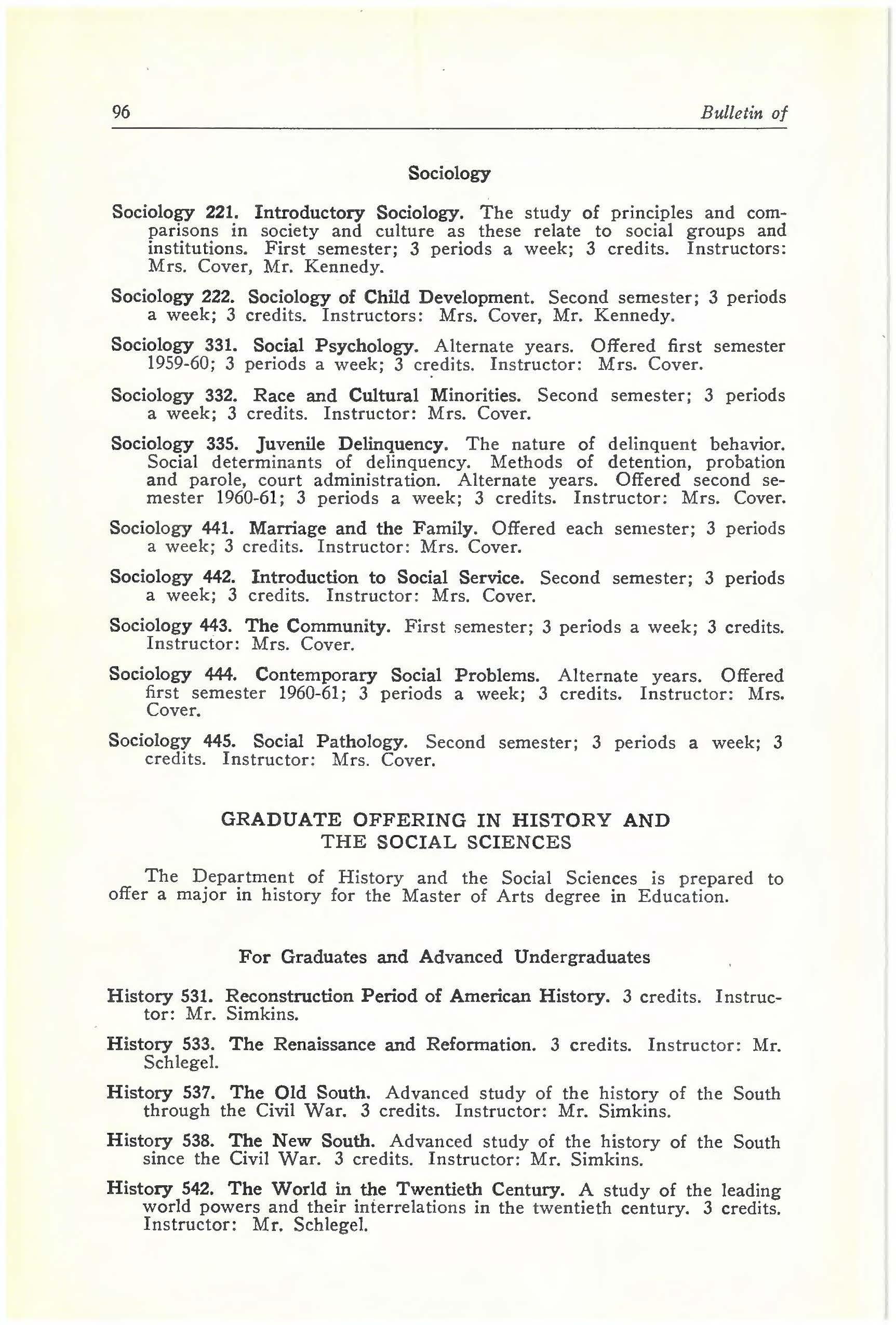
The Department of History and the Social Sciences is prepared to offer a major in history for the Master of Arts degree in Education.
History 531. Reconstruction Period of American History. 3 credits. Instructor: Mr. Simkins.
History 533. The Re n aissance and Reformation. 3 credits. Instructor: Mr. Schlegel.
History 537. The Old South. Advanced study of the history of the South through the Civil War. 3 credits. Instructor: Mr. Simkins.
History 538. The New South. Advanced study of the history of the South since the Civil War. 3 credits. Instructor: Mr. Simkins.
History 542. The World in the Twentieth Century. A study of the leading world powers and their interrelations in the twentieth century. 3 credits. Instructor: Mr. Schlegel.
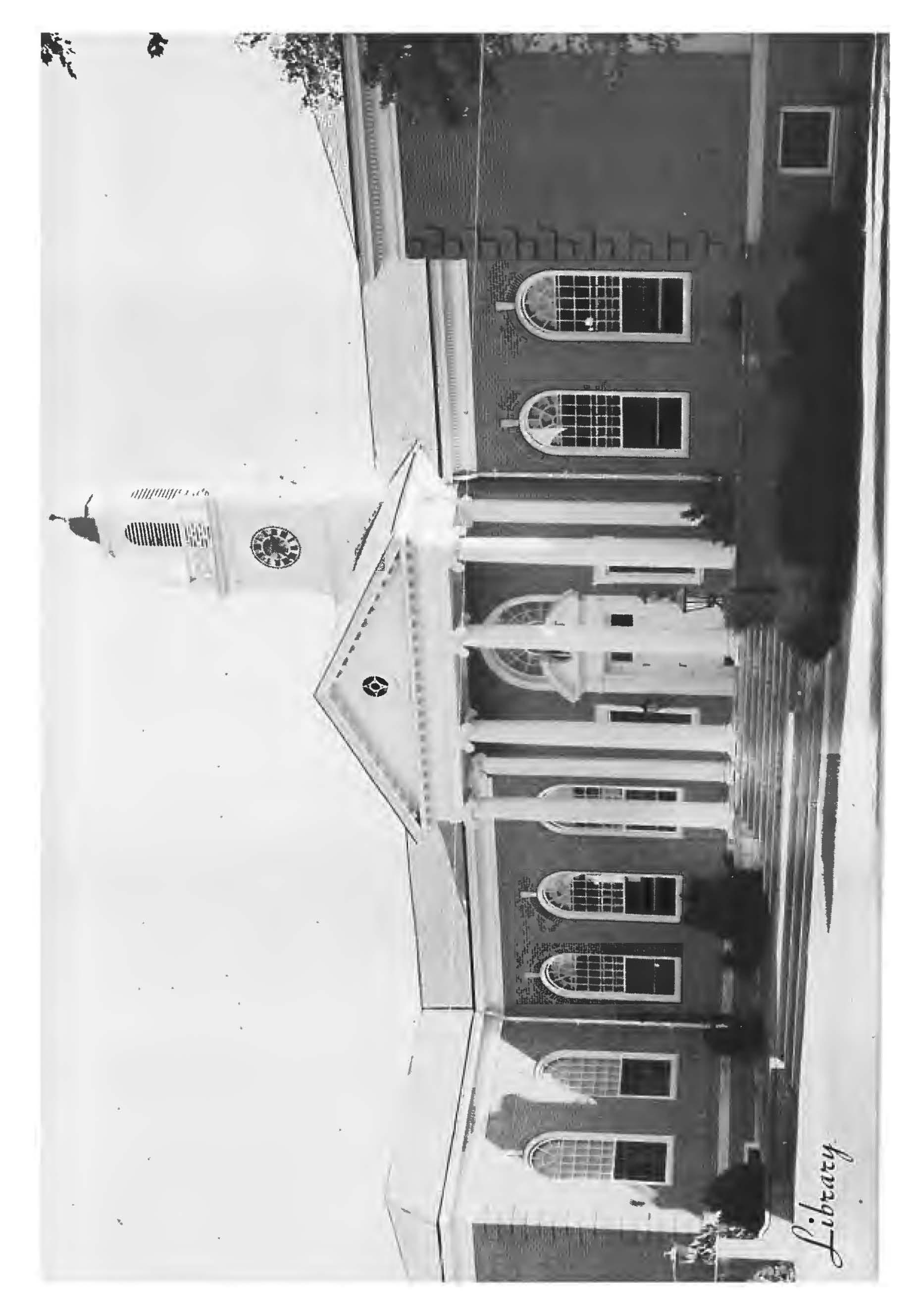
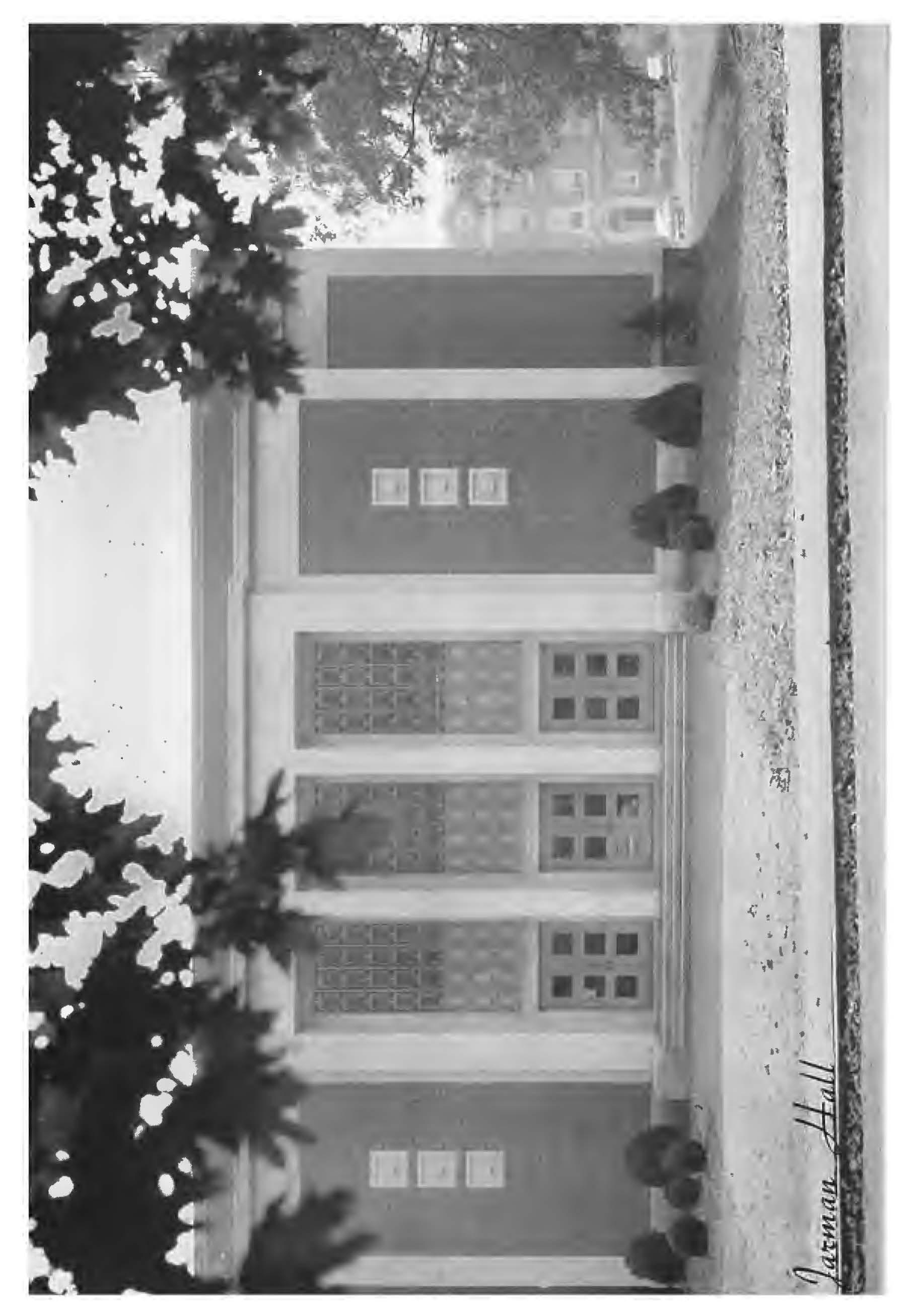
Geography 541. Problems in Political Geography.
Geography 545. Geographical Influences in American History.
Geography 554. Weather, Climate, and Man. •
History 621. Economic History of the British Empire in the 17th and 18th Centuries. A comprehensive examination of mercantilism as applied, and as it worked out, in the British colonial world in the Americas. 3 credits. Instructor: Mr. Moss.
History 651. Reading and Research in American Historical Biography, to the Civil War. Offered on demand. 3 credits. Instructor: Mr. Moss.
History 652. Reading and Research in American Historical Biography, Since the Civil War. 3 credits. Instructor: Mr. Moss.
Geography 601. Research in Regional Geography. 3 credits. Instructor: Mr. Lane.
Mrs. Nell H. Griffin, Chairman Miss Bernard, Mrs. Gee
The Departmen t of Home Economics offers students an opportunity to prepare for teaching home economics in the public schools and to prepare fo r positions as home economists in business. Special emphasis is placed upon the development of the student in the areas of home and family living in all home economics courses. Students meeting the requirements for a bachelor of science degree in home economics education are qualified to teach in state and federal reimbursed secondary schools.
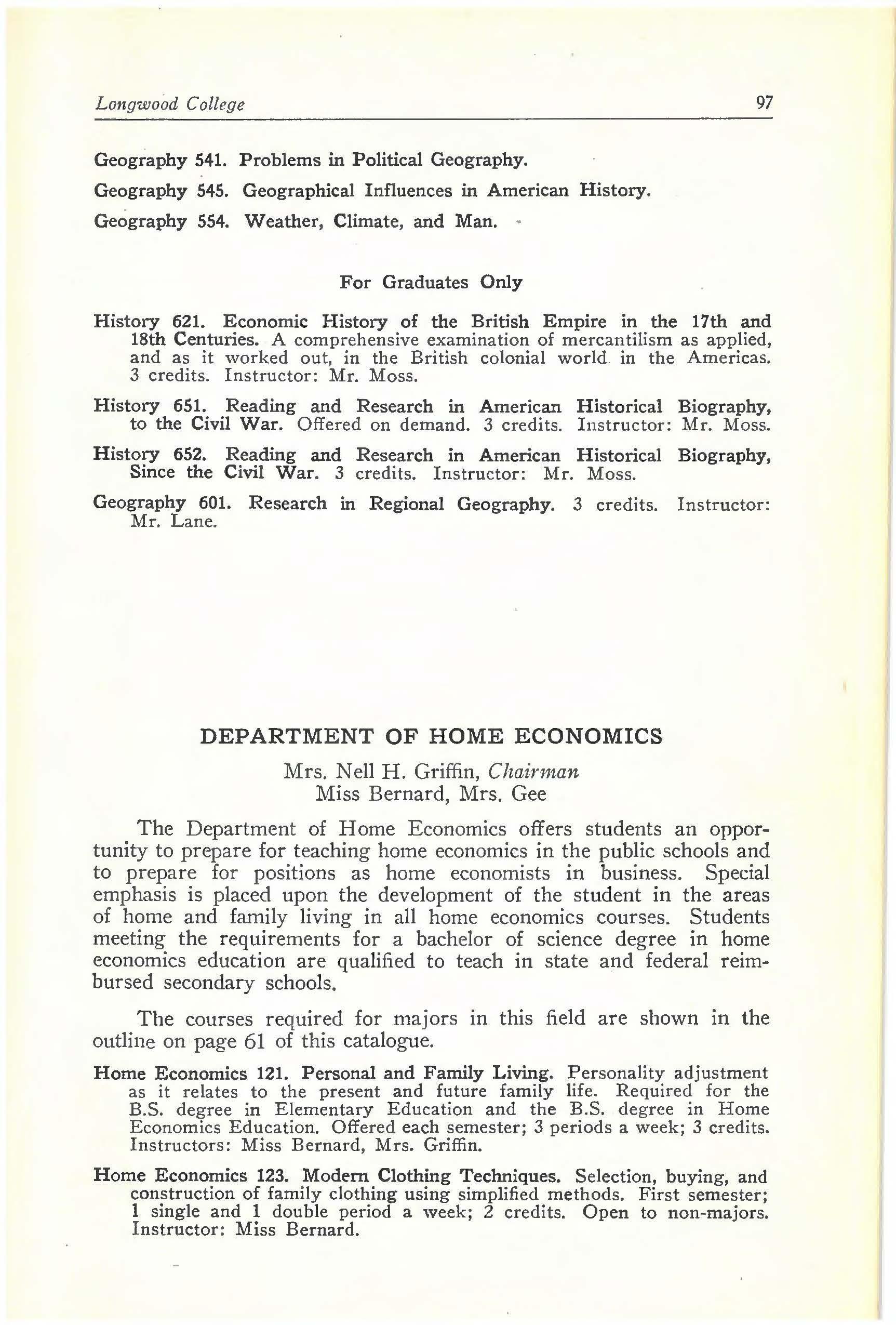
The courses required for majors in this field are shown in the outline on page 61 of this catalogue.
Home Economics 121. Personal and Family Living. Personality adjustment as it relates to the present and future family life. Required for the B.S. degree in Elementary Education and the B.S. degree in Home Economics Education. Offered each semester; 3 periods a week; 3 credits. Instructors: Miss Bernard, Mrs. Griffin.
Home Economics 123. Modern Clothing Techniques. Selection, buying, and construction of family clothing using simplified methods. First semester; 1 single and 1 double period a week; 2 credits. Open to non-majors. Instructor: Miss Bernard.
Home Economics 131. Clothing Construction A study of fundamental principles as applied to selection and use of textile fabrics for clothing; principles of fitting; developing good standards in construction techniques. First semester; 1 single and 2 double periods a week; 3 credits. Instructor: Miss Bernard.
Home Economics 132. Food Preparation. Principles of food preparation. Study and practice in buying and preparing foods. Second semester; 1 single and 2 double periods a week; 3 credits. Instructor: Mrs. Gee.
Home Economics 222. Meal Management. New trends in planning, marketing, preparing, and serving family meals. Prerequisite: Home Economics 132. First semester; 1 single and 2 double periods a week; 3 credits. Instructor: Mrs. Gee.
Home Economics 232. Textiles and Clothing. A study of fibers and fabrics. Application of principles in the selection and use of fabrics; fittings, construction, techniques, and the use of commercial patterns. Prerequisite: Home Economics 131. Second semester; 1 single and 2 double periods a week; 3 credits. Instructor: Miss Bernard.
Home Economics 241. Health of Family. Individual and family health opportunities. Simple procedures for the home care of a patient. First semester; 1 single and 1 double period a week; 2 credits. Instructor: Mrs. Gee.
Home Economics 300, 301. New Trends in Homemaking: Foods. Clothing. Home Economics 300: Furnishing the new kitchen, preparation of family meals and refreshments. Home Economics 301: Selection and care of family clothing and home furnishings, constructon of simple garments. For non-majors. Second semester; 1 single and 2 double periods a week; 3 credits. Instructors: Mrs. Gee, Miss Bernard.
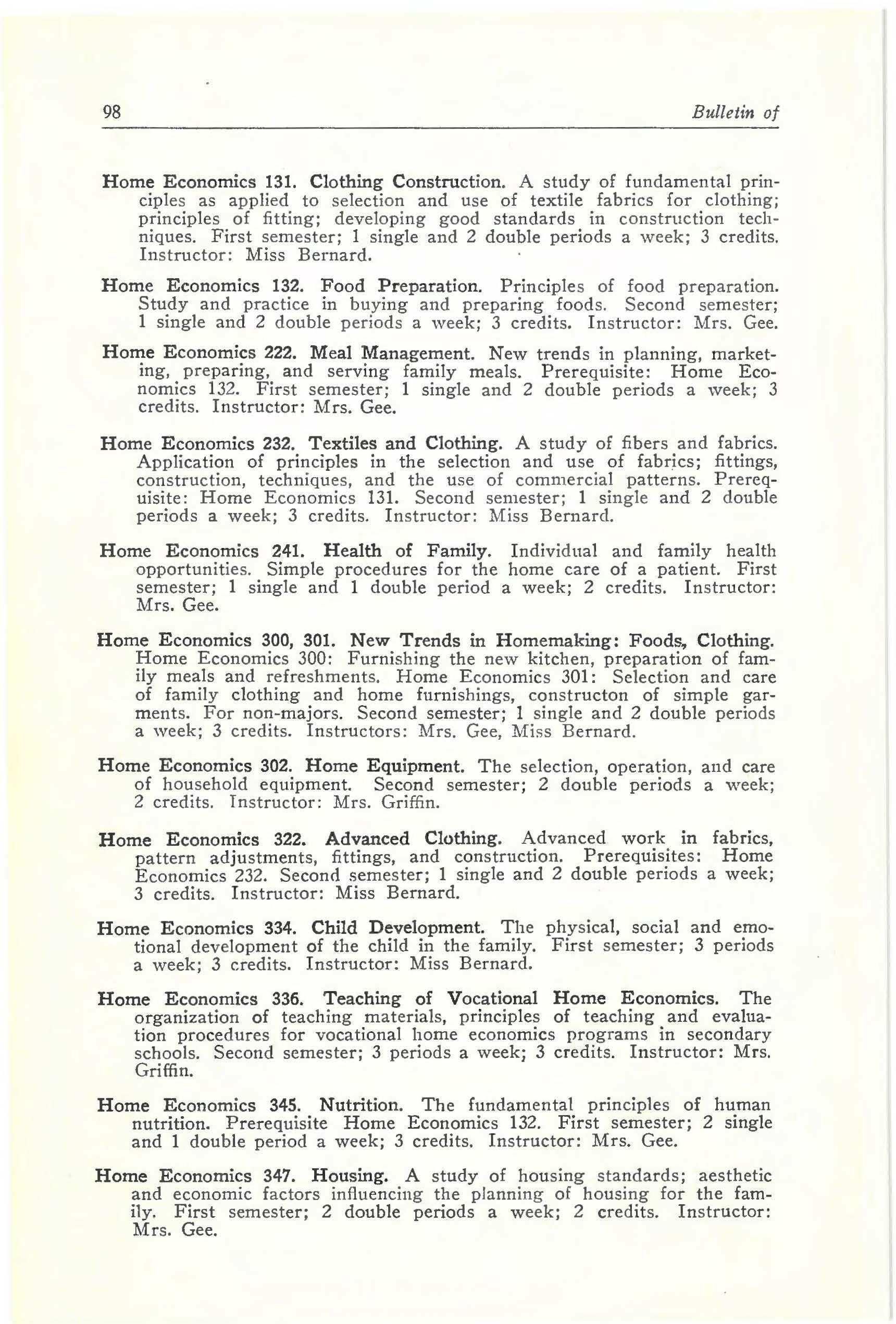
Home Economics 302. Home Equipment. The selection, operation, and care of household equipment. Second semester; 2 double periods a week; 2 credits. Instructor: Mrs. Griffin.
Home Economics 322. Advanced Clothing. Advanced work in fabrics, pattern adjustments, fittings, and construction. Prerequisites: Home Economics 232. Second semester; 1 single and 2 double periods a week; 3 credits. Instructor: Miss Bernard.
Home Economics 334. Child Development. The physical, social and emotional development of the child in the family. First semester; 3 periods a week; 3 credits. Instructor: Miss Bernard.
Home Economics 336. Teaching of Vocational Home Economics. The organization of teaching materials, principles of teaching and evaluation procedures for vocational home economics programs in secondary schools. Second semester; 3 periods a week; 3 credits. Instructor: Mrs. Griffin.
Home Economics 345 . Nutrition. The fundamental principles of human nutrition. Prerequisite Home Economics 132. First semester; 2 single and 1 double period a week; 3 credits. Instructor: Mrs. Gee.
Home Economics 347. Housing. A study of housing standards; aesthetic and economic factors influencing the planning of housing for the family, First semester; 2 double periods a week; 2 credits. Instructor: Mrs. Gee.
y Science 347. Audio-Visual Education. Same as Education 347. Ofred both semesters; 2 lecture and one laboratory period a week; 3 e dits. Instructors: Mr. Johnson, Mr. Patterson.
y Science 400. Directed Library Service in High School Library. This urse may be substituted for part of the required teaching in Education 0. Offered both semesters; 10 periods a week; 3 credits. Instructors: iss Ruffin, Miss O'Brien.
y Science 454. Administration of Libraries. Includes a consideran of the philosophy and standards for school libraries; the cooperative ationship among school officiais, teachers, and librarians; the library a reading and information center; the physical equipment and quarters j techniques essential in the selection, acquiring, processing and : vicing of books and other library materials. Second semester; 2 !riods a week; 3 credits. Instructor: Miss Ruffin.

y Science 456. Organization of Materials. (Cataloguing and Classiation) Library procedures and techniques in the processing and servng of books and other school library materials. Second semester; double periods a week; 3 credits. Instructor: Miss Terry.
l y Science 458. Public School Librarianship. The school library in social order; its relationship to various types of libraries on the tional, state, regional, and local level; its place in the Virginia educamal pattern; accreditation and certification. Second semester; 3 riods a week; 3 credits. Instructor: Miss Ruffin.
ri cal development of books, writing implements, and libraries, with emphasis on their social implication in modern times. Second se!Ster; 3 periods a week; 3 credits. Instructor: Miss Ruffin.
Mr. Brooks, Mrs Magnifico
he Department of Mathematics offers two types of courses : ( 1) :lesigned to meet the needs of students who plan to teach in the ttary and secondary schools of the State; (2) those designed to e the mathematics required of students for the B.A. degree e B.S . degree.
major in mathematics in the programs leading to teaching secondary schools requires a minimum of 24 semester hours as ; : Mathematics 161, 162 (or 155, 156), 345,346,447, 451, 460, least three credits from the following electives : Mathematics 35, 34Z 521,525,531,543,545 .
l y Science 460. History of Books and Libraries. A study of the hist} el p i at m fa at 2:
A major in mathematics for the B.A. degree or the B.S. degree requires a minimum of 24 semester hours as follows: Mathematics 161, 162 ( or 155, 156), 345, 346, 447, 460, and at least six credits from the following electives: Mathematics 231, 235, 342, 521, 525, 531, 543, 545.
Students majoring in mathematics are urged to elect general physics and other courses lending themselves to mathematical interpretations.
One and one-half units of high school credits in algebra and one unit in geometry are prerequisites for a major in mathematics in any curr iculum.
Mathematics 123. Mathematics for Teachers in the Elementary School. The subject matter of arithmetic from the teacher's point of view; emphasis on meanings and understandings; social usage of certain topics; analysis and solution of problems. Both semesters; 3 periods a week; 3 credits. Required for the B. S. degree in Elementary Education. Instructor: Mrs. Magnifico.
Mathematics 155, 156. Elements of College Mathematics. A correlation of the fundamental concepts of algebra, trigonometry, and analytic ge0metry. (Mathematics maj~rs, science majors, and others desiring a course of a more comprehensive and rigorous nature should elect Mathematics 161, 162.) First and second semesters; 3 periods a week; 3 credits each semester. Instructors: The Staff.
Mathematics 161, 162. Fundamentals of College Mathematics. A close correlation of the essentials of algebra, trigonometry, analytic geometry, and the elementary calculus, with emphasis upon the interrelation of the various branches of mathematics; applications of mathematics to other fields, including the physical sciences, engineering, and statistics. First and second semesters; 3 periods a week; 3 credits each semester. Instructor: Mrs. Badger.
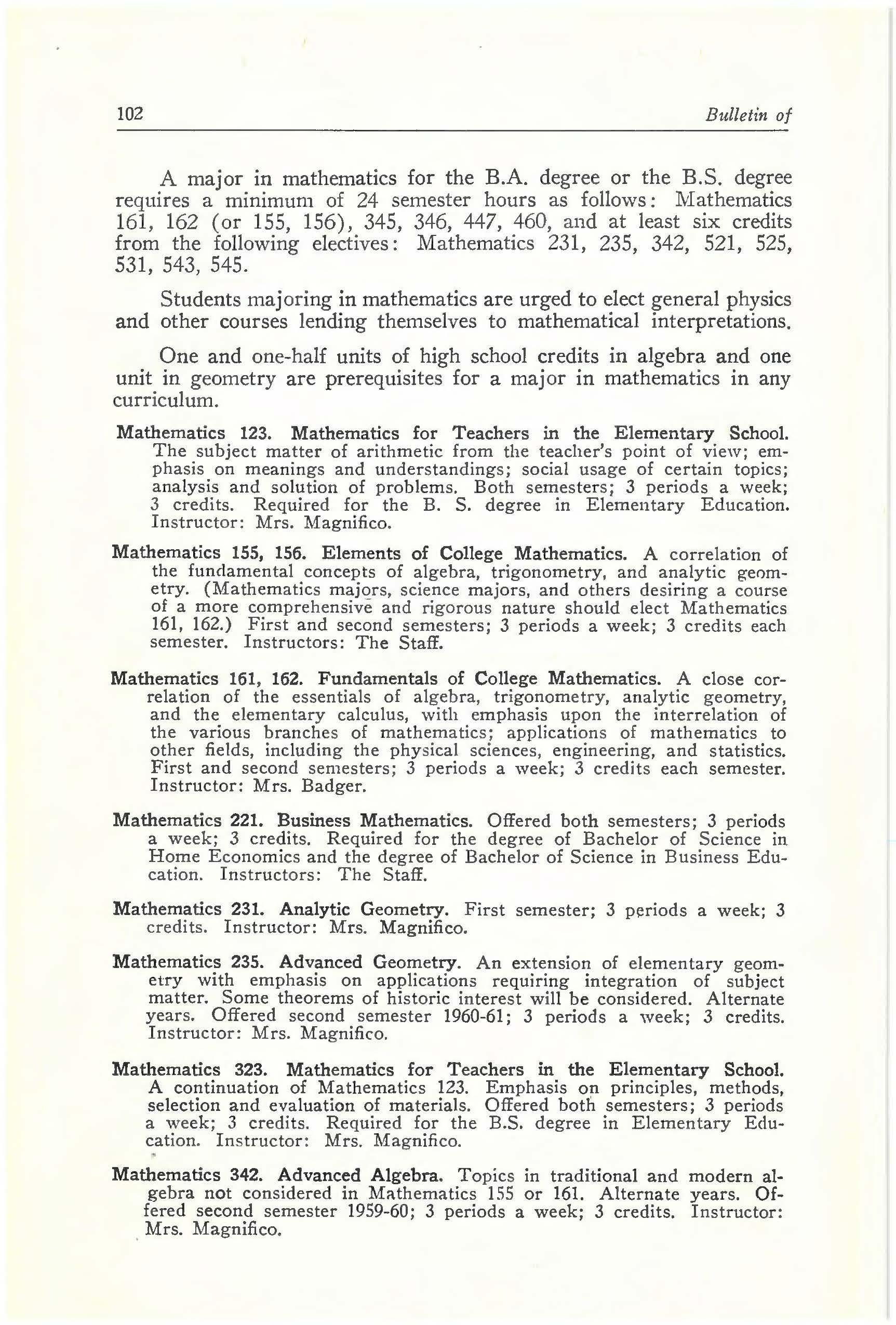
Mathematics 221. Business Mathematics. Offered both semesters; 3 periods a week; 3 credits. Required for the degree of Bachelor of Science in Home Economics and the degree of Bachelor of Science in Business Education. Instructors: The Staff.
Mathematics 231. Analytic Geometry. First semester; 3 periods a week; 3 credits. Instructor: Mrs . Magnifico.
Mathematics 235. Advanced Geometry. An extension of elementary geometry with emphasis on applications requiring integration of subject matter. Some theorems of historic interest will be considered. Alternate years. Offered second semester 1960-61; 3 periods a week; 3 credits. Instructor: Mrs. Magnifico.
Mathematics 323. Mathematics for Teachers in the Elementary School. A continuation of Mathematics 123. Emphasis on principles, methods, selection and evaluation of materials. Offered both semesters; 3 periods a week; 3 credits. Required for the B.S. degree in Elementary Education. Instructor: Mrs. Magnifico.
Mathematics 342. Advanced Algebra. Topics in traditional and modern algebra not considered in Mathematics 155 or 161. Alternate years. Offered second semester 1959-60; 3 periods a week; 3 credits. Instructor: Mrs. Magnifico.
Mathematics 345, 346. The Differential and Integral Calculus. First and seco n d se mesters; 3 periods a week; 3 credits each semester. Instructor: M r s . Badg er.
Mathematics 447. Advanced Calculus. Advanced topics in calculus not considered in Mathematics 345 or 346. Open to students who have completed a year's study of the calculus. First semester; 3 periods a , v e e k; 3 c redits. Instructor: Mrs. Badger.
Mathema t ics 451. The Teaching of High School Mathematics. Alternate yea r s . Off ered first semester 1959-60; 3 periods a week; 3 credits. Ins tru c t o r: M rs. Magnifico.
Mathematics 460. Differential Equations. Primarily a study of ordinary diffe r entia l eq uations of the first and second order with applications to e lementary work in mechanics and physics. Second semester; 3 periods a week; 3 credits. Instructor: Mrs. Badger.
T he D epar tment of Mathematics offers a graduate minor in mathematics fo r t eache r s in the secondary school. One full year of differential and integr a l calc u lus is prerequisite for graduate study in mathematics. To meet the nine-h ou r requ irement for a graduate minor three courses may be selected fro m th ose list ed below.
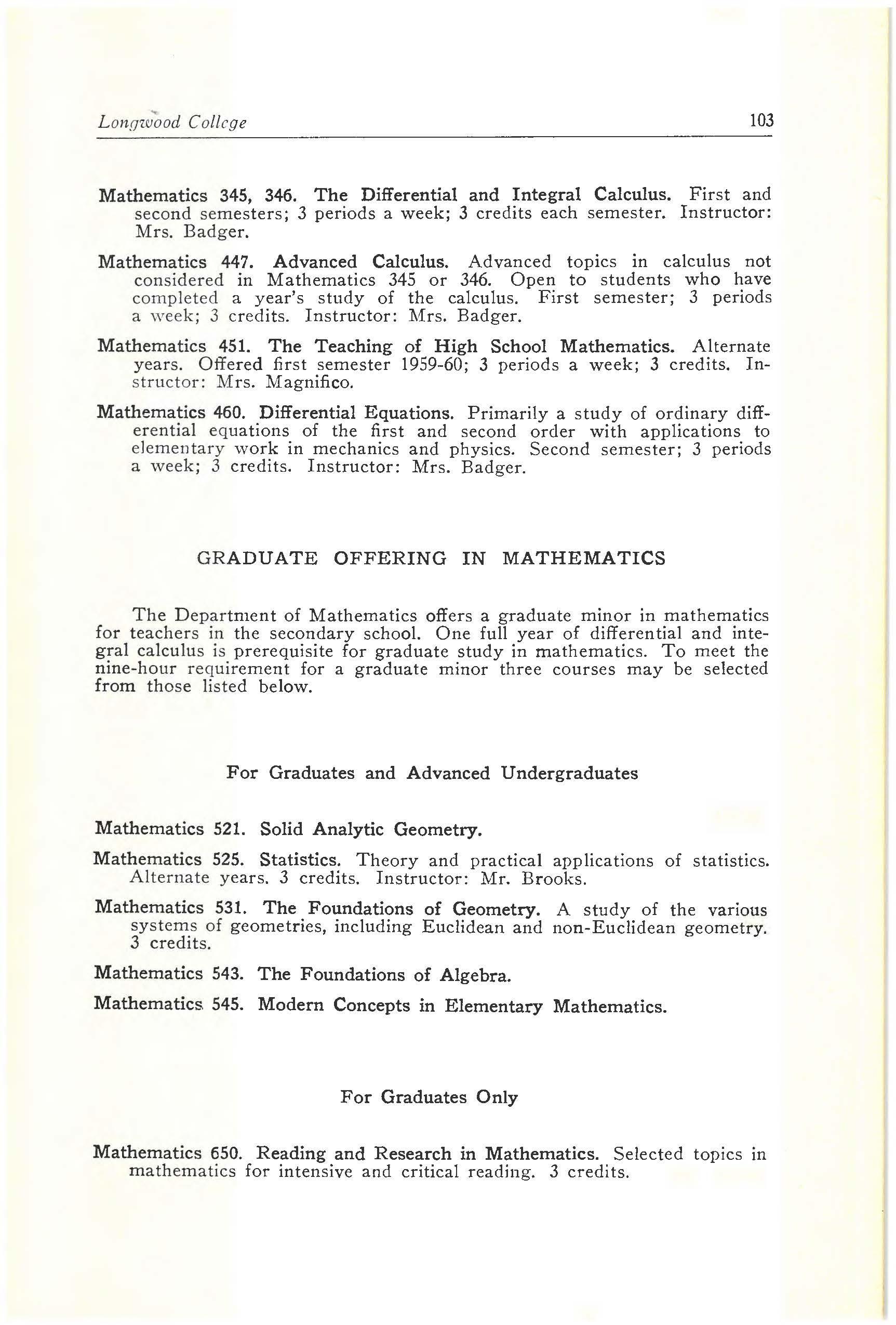
For Graduates and Advanced Undergraduates
Mathematics 521. Solid Analytic Geometry.
Mathematics 525. Statistics. Theory and practical applications of statistics. Alternate y ears. 3 credits. Instructor: Mr. Brooks.
Mathematics 531. The Foundations of Geometry. A study of the various systems of geometries, including Euclidean and non-Euclidean geometry. 3 cr e di t s .
Mathematic s 543. The Foundations of Algebra.
Mathematic s 545. Modern Concepts in Elementary Mathematics.
For Graduates Only
Mathematics 650. Reading and Research in Mathematics. Selected topics in m at h e m atic s for intensive and critical reading. 3 credits.
Miss Bailey, Miss Clark, Mrs. Kemble, Mr. McCombs, Miss Patterson, Mr. Smith, Mr. Urben
The aims of the Department of Music are to emphasize the emotional, esthetic, intellectual, and social values of music; to broaden the concept of music in life and in the public schools; to prepare grade teachers to teach music in their respective grades; to prepare supervisors and special teachers of vocal and instrumental music in elementary and high schools; to prepare church choir directors; to help students attain an artistic proficiency on their instruments and in the use of the singing voice ; and to develop an understanding and appreciation of the best music through participation in instrumental and vocal ensembles, and through directed listening to the world's great musical literature.

The required courses for the B.S. degree in Elementary Education are Music 123, 124, Music 223, 224, and Music 331. Elementary majors and physical education majors are urged to enroll in Music 193 (Piano).
Students enrolled for the B.A. degree who plan to major in music should enroll in Music 113-114 during their freshman year. A major in the B.A. degree program requires the following courses: Music 113-114; Music 213-214; the study of voice or an instrument until artistic standards of achievement are attained; plus sufficient electives in music to total 30 credits.
Students enrolled for the B.A. degree who plan to major in music with emphasis in sacred music should enroll in Music 113-114 during their freshman year. Such an emphasis requires the following: Music 113-114; Music 213-214; proficiency in piano, organ, and voice, with a major emphasis upon either voice or organ; plus sufficient electives in music to total 30 credits.
The amount of credit in applied music that may be transferred from other institutions will be determined through evaluation of a student's proficiency by the Department of Music.
Music 113-114. Structure of Music. An integrated study of music theory through the keyboard, written and creative work, ear training, form and analysis, and music reading. Topics include diatonic chords an<l n0nharmonic tones in examples from all types of music literature. Prerequisite: one year of piano or its equivalent. First and second semesters; 5 periods a week; 4 credits each semester. Instructor: Miss Clark.
Music 213-214. Structure of Music. Continuation of Music 113-114, with similar objectives but on a more advanced level, emphasizing modulations to related keys and non-harmonic tones. Prerequisite: Music 113114. First and second semesters; 5 periods a week; 4 credits each semester. Instructor: Miss Clark.
Music 284. The Auxiliary Choir. Technigues of organization and training of children's, boys', and youth choirs for the church service. Second semester; 1 period a week; 1 credit. Instructor: Miss Bailey.
Music 313, 314. Structure of Music. Continuation of Music 213-214, with emphasis upon larger forms, chromatic harmony, and advanced part writing. Prerequisite: Music 213-214. Alternate years. Offered 1960-61; 3 periods a week; 3 credits each semester. Instructor: Mr. Urben.
Music 317. Keyboard Harmony. Keyboard harmonization of melodies and basses with sequences, cadences, modulations and harmonic dictation at the piano. Prerequisite: Music 213-214. Second semester; 2 periods a week; 2 credits. Instructor: Miss Clark.
Music 322. Church Choir Conducting. Organization, administration, and trammg of the church choir; integration of music with the service; materials; chanting; conducting from the console. Prerequisite: Music 327, 328. Alternate years. Offered second semester 1959-60; 3 periods a week; 3 credits. Instructor: Miss Bailey.

Music 327, 328. Conducting. Technique of the baton; score reading; interpretation; terminology; rehearsal procedures; program building; choral and instrumental materials. First and second semesters; 2 periods a week; 2 credits each semester. Instructor: Mr. Molnar.
Music 417. Orchestration. Practical writing for school bands and orchestras, including accompaniments. Prerequisite: Music 213-214. Offered on sufficient demand. Second semester; 2 periods a week; 2 credits. Instructor: Mr. Smith.
Music 483, 484. Church Choir Repertoire. A survey of sacred music of all periods for the mixed chorus, youth, and auxiliary choirs; choral preparation of the cantata, oratorio, and special services. Prerequisite: Music 322 and keyboard facility. Alternate years. Offered 1960-61; 2 periods a week; 2 credits each semester. Instructor: Miss Bailey.
Music 151, 152. Concert Hour. A directed listening course with emphasis on orchestral masterpieces. Alternate years. Offered 1960-61; 2 periods a week; 1 credit each semester. Instructor: Mr. Molnar.
Music 251, 252. Concert Hour. A directed listening course with emphasis on choral and operatic literature. Alternate years. Offered 1959-60; 2 periods a week; 1 credit each semester. Instructor: Mr. McCombs.
Music 351, 352. Concert Hour. A directed listening course with emphasis on solo, chamber, and ensemble music. Alternate years. Offered 196061; 2 periods a week; 1 credit each semester. Instructor: Mr. Molnar.
Music 361, 362. A Survey of Music Literature. A survey of vocal and instrumental music; directed listening with the use of available scores; examples of significant compositions from major periods of music development. Alternate years. Offered 1960-61; 3 periods a week; 3 credits each semester. Instructor: Mr. Molnar.
Music 363, 364. Music in Our Daily Lives. A general music course for students not majoring in music. Study of the place of music in the "' life of today; participation in and listening to examples of music literature. First and second semesters; 3 periods a week; 3 credits each semester. Instructor : Mr. Smith.
Music 465, 466. The History and Appreciation of Music. The study of music in relation to world history from ancient times to the present, stressing significant periods in music history, composers and their works, and vocal and instrumental development, with examples Alternate years. Offered 1959-60; 3 periods a week ; 3 credits each semester. Instructor: Mr. Molnar.

Music 123, 124. Elementary Music. Participation in musical experiences for the lower grade child. Song singing, dramatization, listening , rhythmic response, rhythm instruments, keyboard experience, and creative expression. Elements of music. First and second semesters; 2 periods a week; 1 credit each semester. Instructors: Mrs. Kemble, Miss Patterson
Music 223, 224. Elementary Music. Continuation of Music 123, 124. Participation in musical experiences for the upper grade child. Melody instruments added. Prerequisite: Music 123 , 124. First and second semesters; 2 periods a week; 1 credit each semester. Instructors: Mrs. Kemble, Miss Patterson.
Music 235, 236. Instrumental Music in the Schools. The study of the basic instruments of the band and orchestra, especially violin, clarinet, and trumpet. Class techniques in the teaching of instruments; materials; organization of the instrumental program in the school. First and second semesters; 3 periods a y.,eek; 3 credits each semester. Instructor: Mr. Smith.
Music 325, 326. Music in the Schools. Participation in experience s, and the teaching of music, in the school. Materials; singing , dramatization, listening, rhythmic response, keyboard experiences, creative experiences; organization and administration of the school music program. Open only to music majors, and others with the consent of the department chairman. First and second semesters; 3 periods a week; 3 credits each semester. Instructor: Mrs. Kemble.
Music 331. Organization and Presentation of the Elementary Music Program. Materials; care of the child voice; integration and correlation with the regular school program; organization and presentation of musical experiences for the school child , Prerequisite: Music 223, 224. Offered each semester; 3 periods a week; 2 credits. Instructors : Mrs. Kemble, Miss Patterson.
Music 335, 336. Instrumental Music in the Schools. Continuation of Music 235, 236. Study of all the band and orchestral instruments; embouchure and technical development; breathing, tone development; rehearsal techniques; fundamentals of marching; materials. First and second semesters; 3 periods a week; 3 credits each semester. Instructor: Mr. Smith.
Music 397, 398. Techniques of Voice Teaching. Principles of vocal instruction, with stress on methods of breathing and articulatory freedom; laboratory work with beginning voice class students under supervision of the instructor. Required of voice majors; open to others with consent of the instructor. :Ejrst and second semesters; 2 periods a week; 2 credits each semester. Instructor: Mr. McCombs.
Music 449. The Consultant Teacher. The duties and place of the consultant music teacher in the school system; extensive study of materials and their application to the curriculum; techniques of assisting the classroom teacher; practice in classroom situations Alternate years. Offered first semester 1959-60; 3 periods a week; 3 credits. Instructor: Mrs. Kemble.
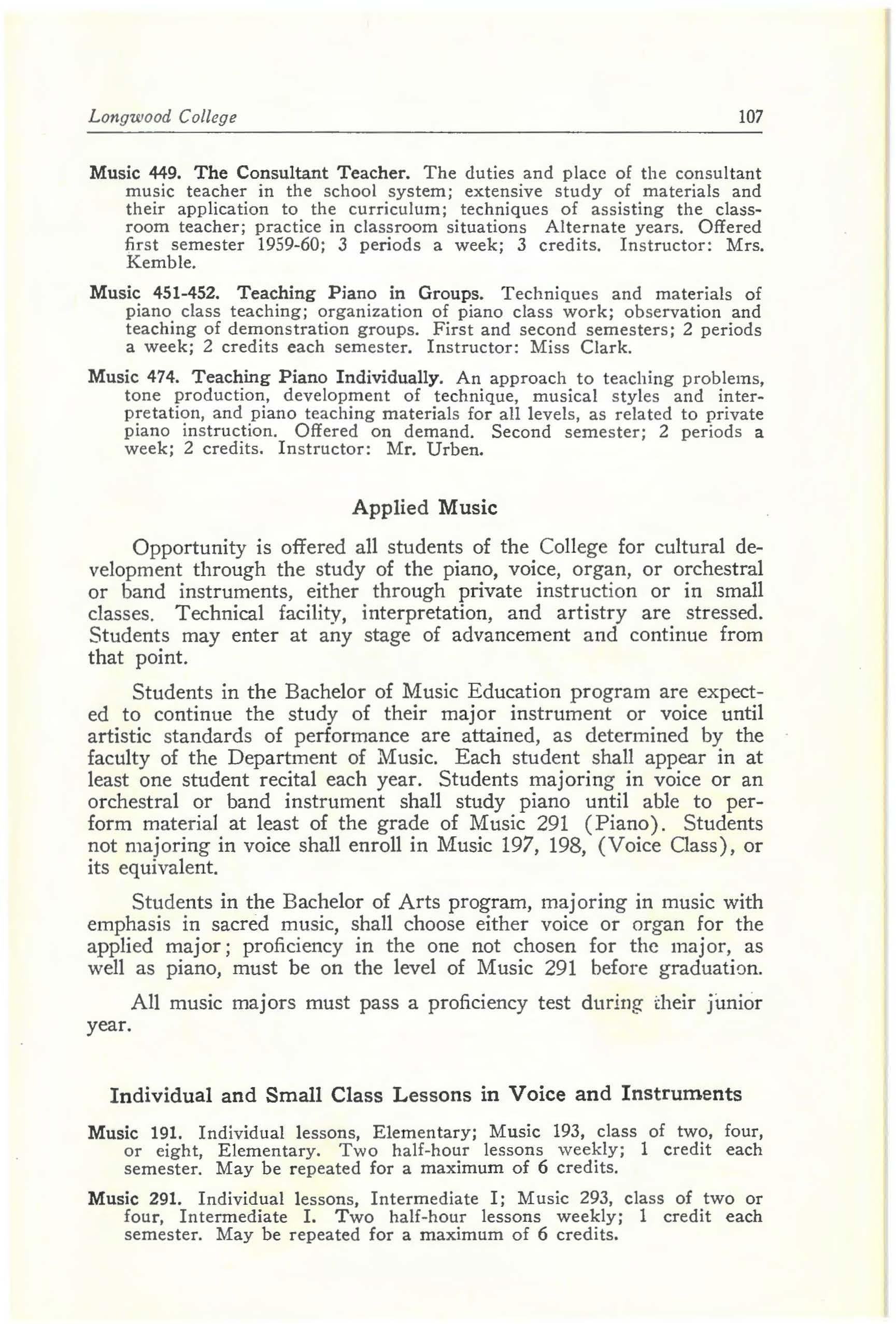
Music 451-452. Teaching Piano in Groups. Techniques and materials of piano class teaching; organization of piano class work; observation and teaching of demonstration groups. First and second semesters; 2 periods a week; 2 credits each semester. Instructor: Miss Clark.
Music 474. Teaching Piano Individually. An approach to teaching problems, tone production, development of technique, musical styles and interpretation, and piano teaching materials for all levels, as related to private piano instruction. Offered on demand. Second semester; 2 periods a week; 2 credits. Instructor: Mr. Urben.
Opportunity is offered all students of the College for cultural development through the study of the piano, voice, organ, or orchestral or band instruments, either through private instruction or in small classes. Technical facility, interpretation, and artistry are stressed. Students may enter at any stage of advancement and continue from that point.
Students in the Bachelor of Music Education program are expected to continue the study of their major instrument or voice until artistic standards of performance are attained, as determined by the faculty of the Department of Music. Each student shall appear in at least one student recital each year. Students majoring in voice or an orchestral or band instrument shall study piano until able to perform material at least of the grade of Music 291 (Piano). Students not majoring in voice shall enroll in Music 197, 198, (Voice Class), or its equivalent.
Students in the Bachelor of Arts program, majoring in music with emphasis in sacred music, shall choose either voice or organ for the applied major; proficiency in the one not chosen for the major, as well as piano, must be on the level of Music 291 before graduation.
All music majors must pass a proficiency test during their junior year.
Music 191. Individual lessons, Elementary; Music 193, class of two, four, or eight, Elementary. Two half-hour lessons weekly; 1 credit each semester. May be repeated for a maximum of 6 credits.
Music 291. Individual lessons, Intermediate I; Music 293, class of two or four, Intermediate I. Two half-hour lessons weekly; 1 credit each semester. May be repeated for a maximum of 6 credits.
Music 391. Individual lessons, Intermediate II; Music 393, class of two or four, Intermediate II. Two half-hour lessons weekly; I credit each seme s ter. May be repeated for a maximum of 4 credits.
Music 491. Individual lessons, Advanced; Music 493, class of two or four, Advanced. Two half-hour lessons weekly; 1 credit each semester. May be rep eated for a maximum of 8 credits
Music 197, 198. (Voice Class.) Carriage, breathing, placement, diction, phrasing, song singing; students will be assisted by advanced voice majors under the supervision of the instructor. Offered on demand. First and second semesters; 2 periods a week; I credit each semester. Instructor: Mr. McCombs.
Music 181, 182. Piano Sightreading. Reading of materials at sight; solo, ensemble, and accompanying materials; improvisation of accompaniments to s ongs and dances. Offered on demand. First and second semesters; 2 periods a week; I credit each semester. Instructor: Miss Clark.
Music 281, 282 . Piano Sightreading. Continuation of Music 181, 182, on a more advanced level. Offered on demand First and second semesters; 2 periods a week; I credit each semester. Instructor: Miss Clark.
Music 381, 382. Piano Sightreading. Continuation of Music 281, 282, on a more advanced level. Offered on demand. First and second semesters ; 2 p e riods a week; I credit each semester. Instructor: Miss Clark.
Music 383, 384. Service Playing. A practical study of hymn playing for the various denominations; chant accompaniments; modulations and improvisations; suitable service organ music; suitable accompaniments for solos, anthems, and larger choral works; conducting from the console; use of the organ with other instruments. Prerequisite: Music 191 (Organ). F ir s t and second semesters; 3 periods a week; 3 credits each semester. Instructor: Miss Bailey.
Music 399. Half Recital. Preparation and presentation of one half of a solo recital from memory. First and second semesters 1 credit Instructors: The St a ff
Music 456. Piano Accompanying. A study of the techniques of accompanying through acquaintance with vocal and instrumental solo and ensemble accompaniments, with a practical application in actual experiences in accompanying fellow students and ensembles. Offered on demand. First and second semesters; 2 periods a week; 2 credits. Instructor: Mr. Urben.
Music 463. Piano Literature. A study of pianoforte literature through performance and through listening to recordings; the history, formal structure, and aesthetic values of representative compositions of each composer or period Required of piano majors. Alternate years. Offered fir s t semester 1959-60; 2 periods a week 2 credits Instructor: Mr. Urben.
Music 464. Voice Literature. A study of solo vocal and choral music through performance and listening to recordings; the history, formal structure, and aesthetic values of representative compositions of each composer or period. Required of voice majors. Alternate years. Offered second seme s ter 1960-61; 2 periods a week; 2 credits. Instructor: Mr. McCombs .
Music 499. Full Recital. Preparation and presentation of a full solo recital from memory. First and second semesters; 2 credits. Instructors: The Staff.

Grades in applied music will be recorded in the following manner : Music 191 (piano) or Music 191 (voice).
Opportunity is offered to all students of the College, who are qualified, to participate in music ensembles. Credit and grades in ensembles will be recorded in the following manner : Music 143-144 (Orchestra) or Music 143-144 (Choir). Ensembles may be par t icipated in without credit.
Music 143, 144 (Ensemble), two periods a week; one-half credit each semester.
Music 243, 244 (Ensemble), two periods a week; one-half credit each semester.
Music 343, 344 (Ens e mble), two periods a week; one-half credit each semester.
Music 443, 444 (Ensemble), two periods a week; one-half credit each semester.
Orchestra. Open to all students who perform on orchestral instruments upon audition with the conductor. Study and performance of materials ranging from high school to symphonic music. Conductor: Mr. Smith.
Band. Open to all students who perform on band instruments upon audition with the conductor Study and performance of band music ranging from high school to symphonic band level. Conductor: Mr. Smith.
Choir. Open to students upon audition with the conductor. Standard choir and chorus literature, accompanied and a cappella. Formal programs are given each semester, several off the campus. 3 periods a week. Conductor: Mr. Molnar.
Chorus. Open to all students who wish to sing glee club and chorus materials. Formal programs are given each semester. Conductor: Miss Bailey.
Madrigal Singers. Sixteen voices selected by audition. Vocal chamber music, motets, and part songs are studied and performed. Conductor: Mr. McCombs.
Instrumental Ens embles. String quartettes, woodwind and brass ensembles, and piano ensembles will be formed if sufficient demand exists.
Music 348. Piano Ensemble Literature. Survey and performance of outstanding original compositions and transcriptions for duets and two pianos on an intermediate level. First and second semesters; 1 period a week; 1 credit. Instructor: Miss Clark.
Music 448. Piano Ensemble Literature. Survey and performance of outstanding original compositions and transcriptions for duets and two pianos on an advanced level. First and second semesters; 1 period a week; I credit. Instructor: Mr. Urben.
The Department of Music offers a major and a minor in Music Education. The requisite number of hours will be selected from the departmental offerings by the student in consultat ion with her adviser.

Bulletin of
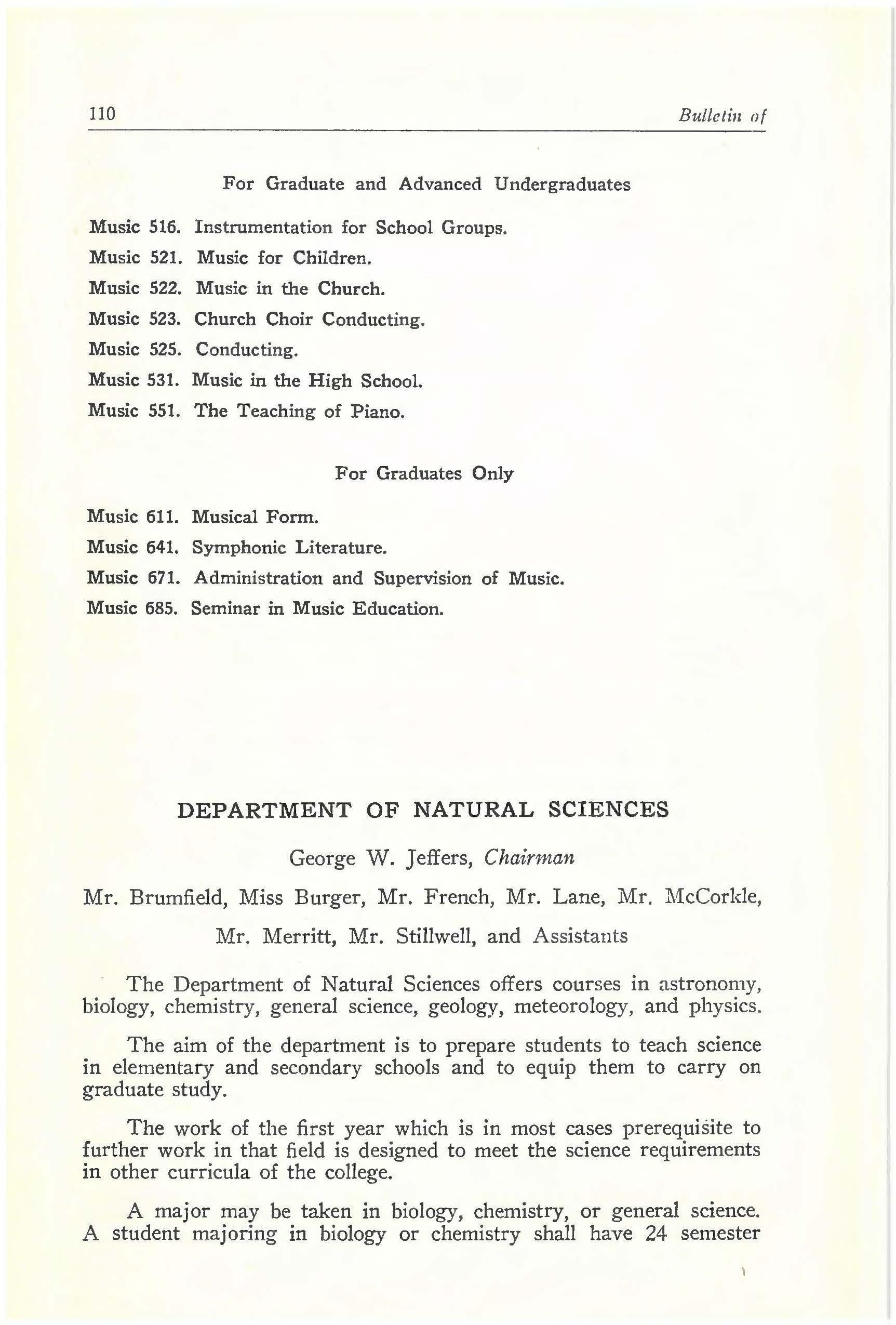
Music 516. Instrumentation for School Groups.
Music 521. Music for Children.
Music 522. Music in the Church.
Music 523. Church Choir Conducting.
Music 525. Conducting.
Music 531. Music in the High School.
Music 551. The Teaching of Piano.
Music 611. Musical Form.
Music 641. Symphonic Literature.
Music 671. Administration and Supervision of Music.
Music 685. Seminar in Music Education.
George W. Jeffers, Chairman
Mr. Brumfield, Miss Burger, Mr. French, Mr. Lane, Mr. McCorkle, Mr. Merritt, Mr. Stillwell, and Assistants
The Department of Natural Sciences offers courses in astronomy, biology, chemistry, general science, geology, meteorology, and physics.
The aim of the department is to prepare students to teach science in elementary and secondary schools and to equip them to carry on graduate study.
The work of the first year which is in most cases prerequisite to further work in that field is designed to meet the science requirements in other curricula of the college.
A major may be taken in biology, chemistry, or general science. A student majoring in biology or chemistry shall have 24 semester
hours in the primary field and 8 semester hours in a second field. The B.S. degree requires a year of mathematics and a year in a third science; these additional subjects are strongly recommended for majors in other curricula.
A major in general science requires 8 semester hours in each of the four areas: biology, chemistry, geology, and physics, plus 4 hours in astronomy and meteorology-a total of 36 hours.
General Science majors are strongly advised to elect a second year of biology or chemistry so that they may be certified (16 hours) to teach that subject as well.
Biology 131-132. General Biology. Prerequisite to all other courses in biology. Biology 131: Zoology. Biology 132: Botany. First and second semesters; 2 single and 2 double periods a week; 4 credits each semester. Instructors: Mr. Jeffers, Mr. Brumfield, Mr. Merritt, Mr. Stillwell, and Assistants.
Biology 231, 232. Botany. The first semester treats morphology and physiology, the second taxonomy, ecology and horticulture. First and second semesters; 2 single and 2 double periods a week; 4 credits each semester. Instructor: Mr. Brumfield.
Biology 320. Anatomy and Physiology. The body as a whole; cells and tissues; the skeletal, muscular and nervous systems; the special sense organs. First semester; 2 single and one double period a week; 3 credits. Instructor.: Mr. Stillwell.
Biology 321. Physiology. A consideration of the circulatory, digestive, excretory, endocrine, and reproductive systems. Second semester; 2 single and one double period a week; 3 credits. Instructor: Mr. Stillwell.
Biology 331. Invertebrate Zoology. First semester; 2 single and 2 double periods a week; 4 credits. Instructor: Mr. Jeffers.
Biology 332. Comparative Anatomy. Alternates with Biology 333. Offered second semester 1960-61; 2 single and 2 double periods a week; 4 credits. Instructor: Mr. Jeffers.
Biology 333. Vertebrate Zoology. A continuation of Biology 331. Alternates with Biology 332. Offered second semester 1959-60; 2 single and 2 double periods a week; 4 credits. Instructor: Mr. Merritt.

Biology 352. Genetics. First semester; 3 periods a week; 3 credits. Instructor: Mr. Brumfield.
Biology 354. Methods in Experimental Biology. First semester; 2 double periods a week; 2 credits. May be repeated (as 355) for credit. Instructor: Mr. Merritt.
Biology 361. Bacteriology. First semester; 1 single and 3 double periods a week; 4 credits. Instructor: Mr. Brumfield.
Biology 362. Mammalian Anatomy. May be taken only with the consent of the instructor. Second semester; 1 single and 3 double periods a week; 4 credits. Instructor: Mr. Jeffers.
Biology 430. Biological Seminar. Open only to a few qualified students subject to the approval of the professors of biology. Offered both semesters, and may be repeated for credit by a student. In that event the number will be 431, 432, etc. One period a week; 1 credit. Instructors: The Staff.
Biology 441. Evolution. An introductory course dealing with the history, types of evidence, and theories of evolution. Second semester; 3 periods a week; 3 credits. Instructor: Mr. Brumfield.
Biology 455. Field Biology. Second semester; 2 double periods a week; 2 credits. May be repeated (as 456) for credit. Instructor: Mr. Merritt.
Chemistry 121-122. General Chemistry. Prerequisite to all other courses in chemistry. First and second semesters; 2 single and 2 double periods a week; 4 credits each semester. Instructor: Mr. French.
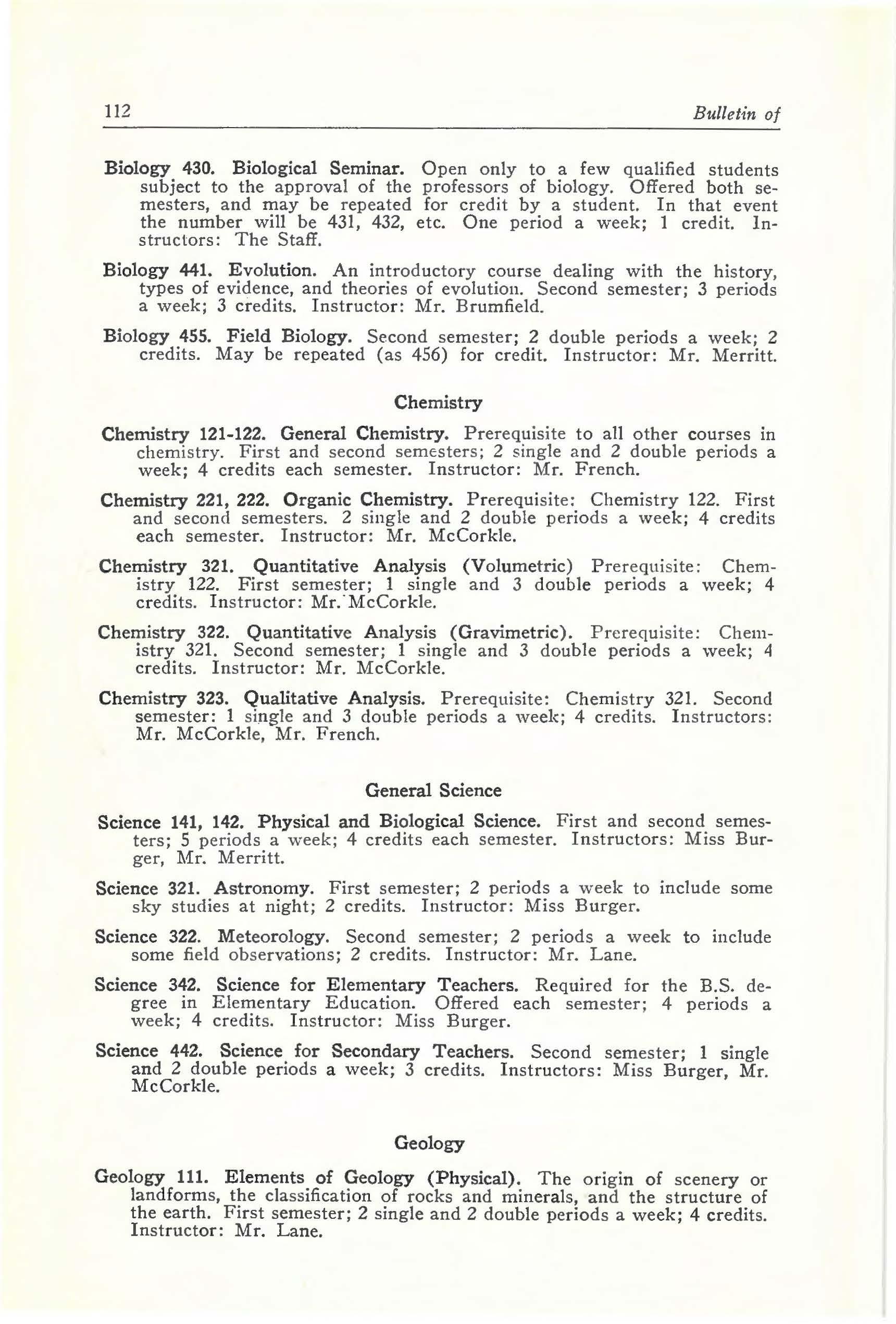
Chemistry 221, 222. Organic Chemistry. Prerequisite: Chemistry 122. First and second semesters. 2 single and 2 double periods a week; 4 credits each semester. Instructor: Mr. McCorkle.
Chemistry 321. Quantitative Analysis (Volumetric) Prerequisite: Chemistry 122. First semester; I single and 3 double periods a week; 4 credits. Instructor: Mr:McCorkle.
Chemistry 322. Quantitative Analysis (Gravimetric). Prerequisite: Chemistry 321. Second semester; 1 single and 3 double periods a week; 4 credits. Instructor: Mr. McCorkle.
Chemistry 323. Qualitative Analysis. Prerequisite: Chemistry 321. Second semester: 1 single and 3 double periods a week; 4 credits. In structors: Mr. McCorkle, Mr. French.
Science 141, 142. Physical and Biological Science. First and second semesters; 5 periods a week; 4 credits each semester. Instructors: Miss Burger, Mr. Merritt.
Science 321. Astronomy. First semester; 2 periods a week to include some sky studies at night; 2 credits. Instructor: Miss Burger.
Science 322. Meteorology. Second semester; 2 periods a week to include some field observations; 2 credits. Instructor: Mr. Lane.
Science 342. Science for Elementary Teachers. Required for the B.S. degree in Elementary Education. Offered each semester; 4 periods a week; 4 credits. Instructor: Miss Burger.
Science 442. Science for Secondary Teachers. Second semester; 1 single and 2 double periods a week; 3 credits. Instructors: Miss Burger, Mr. McCorkle.
Geology 111. Elements of Geology (Physical). The origin of scenery or landforms, the classification of rocks and minerals, and the structure of the earth. First semester; 2 single and 2 double periods a week; 4 credits. Instructor: Mr. Lane.
Geology 112. Elements of Geology (Historical). Geography of the past dealing with the plants and animals of pre-historic time. Second semester; 2 single and 2 double periods a week; 4 credits. Instructor: Mr. Lane.
Physics 311, 312. General Physics. First and second semesters; 2 s ingle and ·2 double periods a week; 4 credits each semester . Instructor: Mr. McCorkle.
Physics 401, 402. Selected Topics in General Physics. First and secon d semesters; 2 single and 2 double periods a week; 4 credits each seme s ter. In s tructor: Mr. McCorkle.
A graduate major requires 18 sem es ter hours and a minor nine hours.
Biology 501E. Outdoor Life. (May be repeated for credit in which ca se it will be numbered 502E, 503E, etc.)
Biology 505E. Plants in the Classroom.
Biology 506E. Animals in the Classroom. How to handle , feed a nd maintain li vi ng animals ; their structure, habit s and life histori es; what to watch for and how to ex periment so as to arrive at scientific answers. 3 credits. Instructor: Mr. Jeffers.
Biology 520. Great Experiments in Biology.
Biology 521. Organic Evolution. Historical development of th e evolution ary concept; appraisal of m ode rn theories; current status in the l ight of modern day genetics. Prer eq uisite: 12 se mesters hours of biology or permission of the instructor. 3 credits. Instructor: Mr. Jeffer s.
Biology 555 . Field Biology (May be r epe ated for credit.)
Science 501. Selected Topics in Physical Science. Discu ss ions, laboratory, and directed reading on one or more of the following topics: mechanics, properti es of m ?- tter, light, electricity, and magnetism. Suit ed to both el em entary and secondary teachers. Pr e requisite: 8 semester h ours of sci ence or permission of th e instructor. 3 credits. In s tructor: Mr. McCorkle.
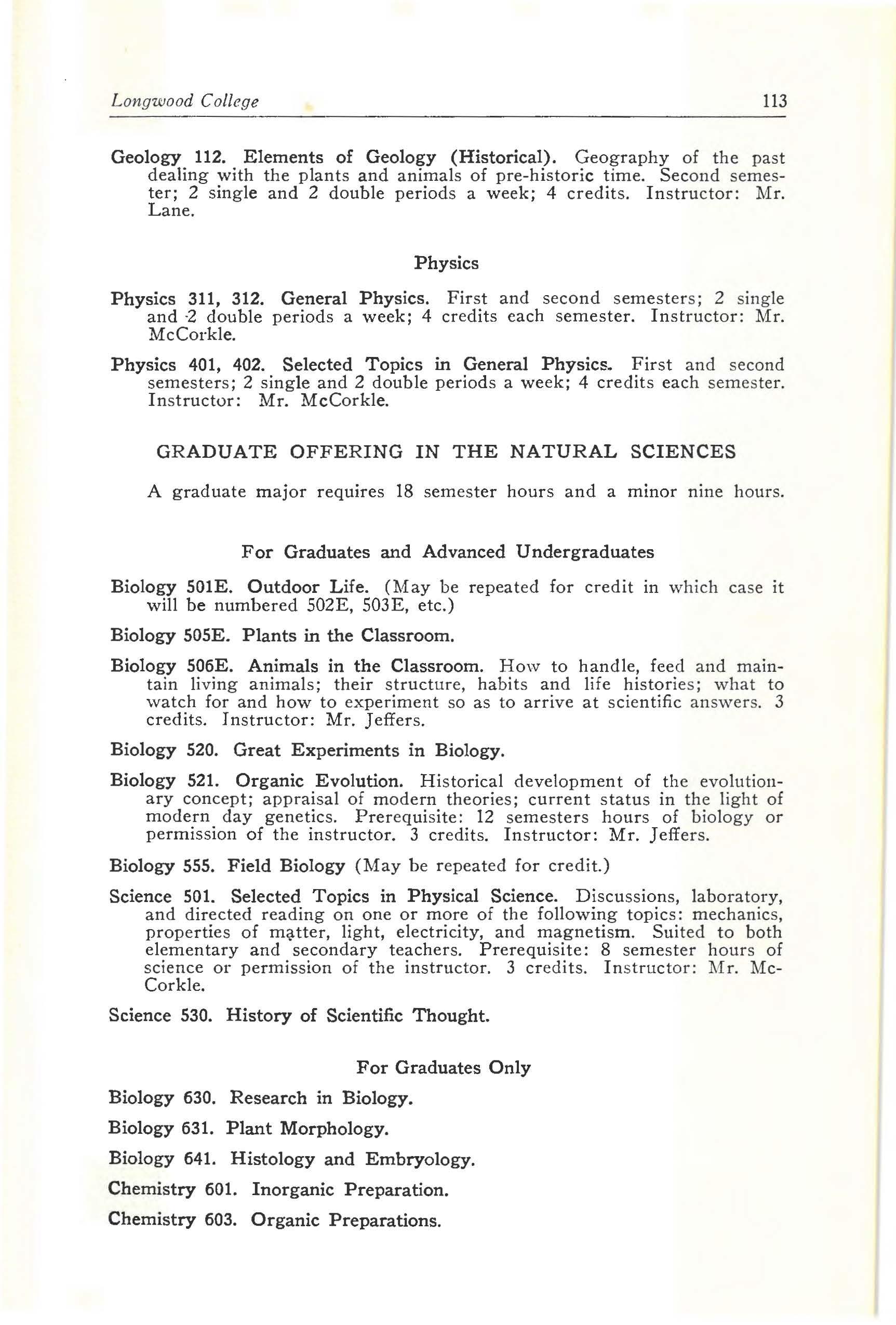
Science 530. History of Scientific Thought.
Biology 630. Research in Biology.
Biology 631. Plant Morphology.
Biology 641. Histology and Embryology.
Chemistry 601. Inorganic Preparation.
Chemistry 603. Organic Preparations .
The department has a two-fold purpose: first, to provide professional courses in physical and health education that will prepare students to teach physical education in the elementary schools, high schools and colleges, and health education in elementary and high schools ; second, to provide opportunity for all students to engage in developmental and recreational activities.
A regulation suit is required in all activity courses. The suits are purchased through the College. See page 41.
The swimming pool will be open to students at certain hours for recreational purposes. Those desiring this privilege must register at the swimming pool office and wear the regulation swimming suit.
All students are required to pass a beginner's swimming test or a course in swimming before the end of the junior year and two years of activity courses in physical education, unless excused by the College Physician.
A degree of Bachelor of Science with a major in physical education requires 30 semester hours. Required courses are: Physical Education 102, 103, 137, 202, 203, 212, 232, 250, 302, 303, 322, 329, 339, 340, 351, 353, 354, and 402; Health Education 239, 342, and 343. Physical Education 214, 321, 328, 330, and 352 are recommended as electives. ·
Students with a major in physical education who have not had a course in physiology and anatomy are required to take Biology 320, 321, as prerequisites for Physical Education 339.
It is desirable for the teacher of physical education or a worker in the field of recreation to have ability in music, dancing, handcrafts, camping and various sports. It is recommended that they enroll in Music 193. (piano).
All students with a major in physical education are expected to participate in the intramural program offered by the Athletic Association and the May Day festi val.
Physical Education 102-103. Basic Techniques. Techniques of activities basic to the physical education and recreation programs; hockey, golf, folk dancing, gymnastics, s tunts and tumbling, archery. Required of all physical education majors. Offered first and second semesters 195960; 2 periods a week; ¾ credit each semester. Instructors: The Staff.
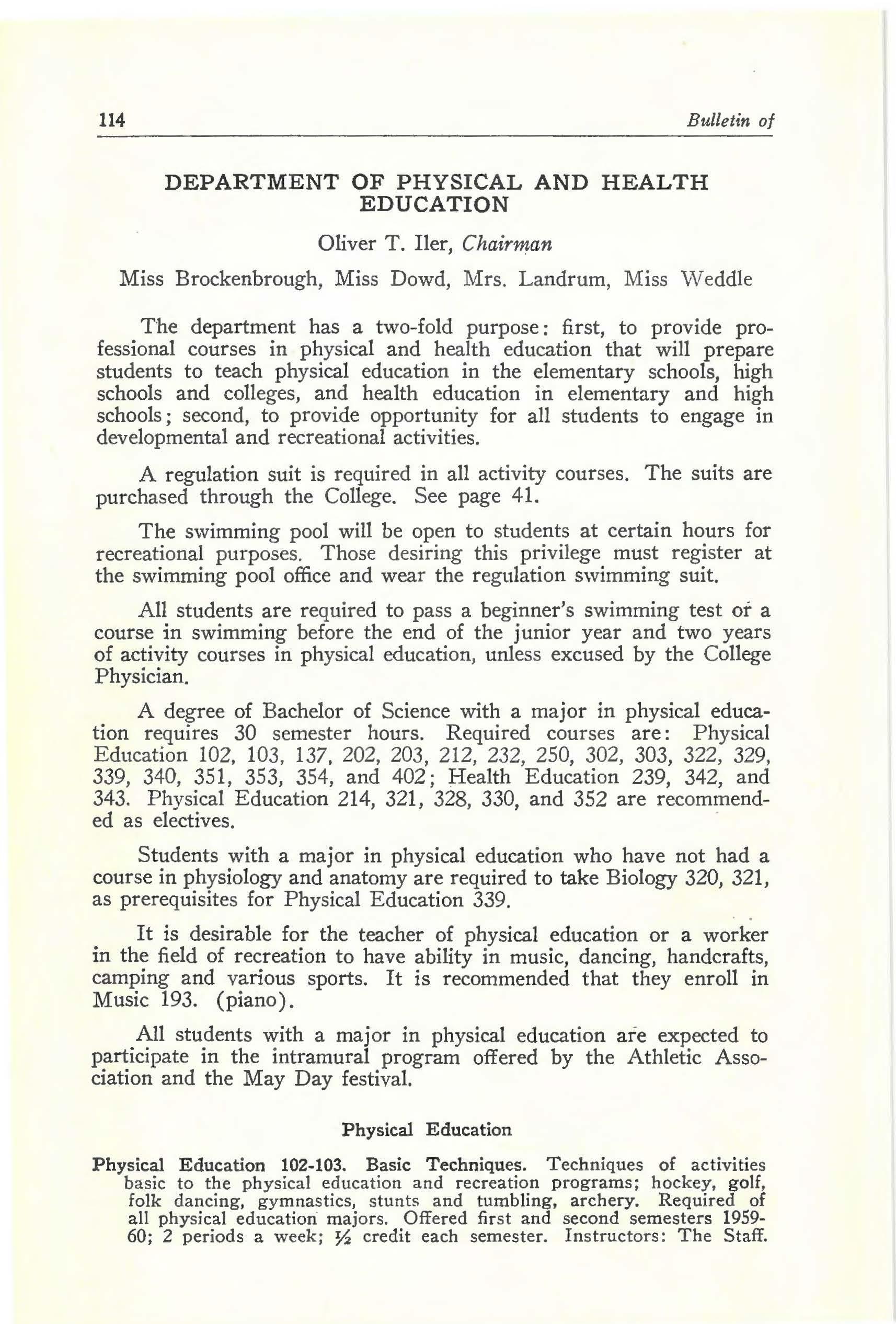
Physical Education 111-112. Freshmen Physical Education. Participation in games, athletics, gymnastics and dance. Required in all curricula. First and second semesters; 3 periods a week; 1 credit each semester. Instructors: The Staff.
Physical Education 113. Seasonal Sports. Practice and study of techniques in hockey and volleyball. First semester; 3 periods a week; 1 credit. Instructor: Miss Brockenbrough.
Physical Education 114. Seasonal Sports. Practice and study of techniques .in volleyball and archery. Second semester; 3 periods a week; 1 credit. Instructor: Miss Brockenbrough.
Physical Education 115, 116. Seasonal Sports. Practice and study of techniques in tennis and volleyball. First and second semesters; 3 periods a week; 1 credit each semester. Instructor: Miss Iler.
Physical Education 137. Recreational Leadership. Study of the varied activities comprising a balanced recreational and camping program. Includes discussion and practice. First semester; 3 periods a week; 2 credits. Instructor: Miss Iler.
Physical Education 202-203. Basic Techniques. Techniques of activities basic to the physical education and recreation programs; field ball, soccer, volleyball, speedball, swimming, recreational activities. Required of all physical education majors. Offered first and second semesters 1960-61; 2 periods a week; ½ credit each semester. Instructors: The Staff.
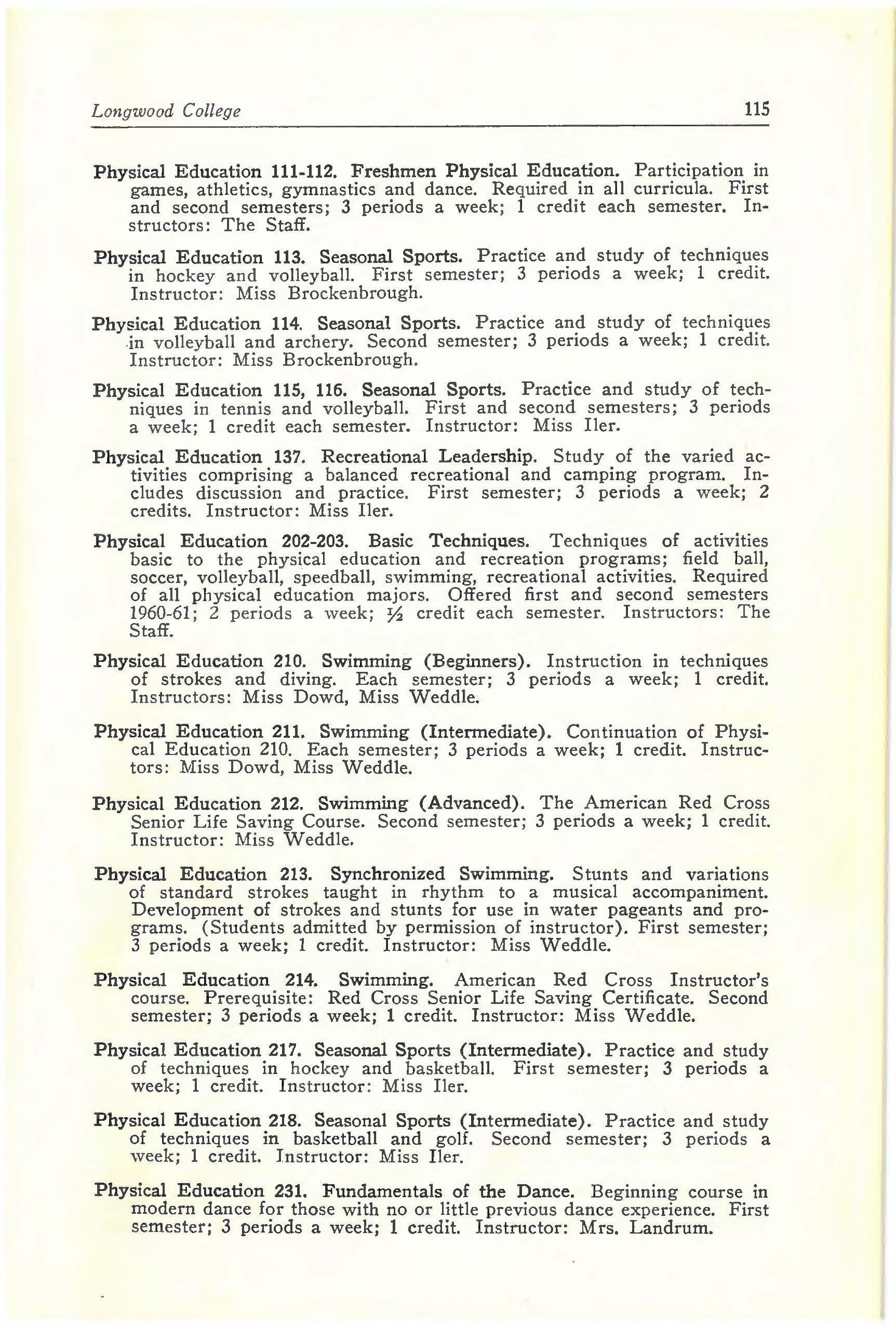
Physical Education 210. Swimming (Beginners). Instruction in techniques of strokes and diving. Each semester; 3 periods a week; 1 credit. Instructors: Miss Dowd, Miss Weddle.
Physical Education 211. Swimming (Intermediate). Continuation of Physical Education 210. Each semester; 3 periods a week; 1 credit. Instructors: Miss Dowd, Miss Weddle.
Physical Education 212. Swimming (Advanced). The American Red Cross Senior Life Saving Course. Second semester; 3 periods a week; 1 credit. Instructor: Miss Weddle.
Physical Education 213. Synchronized Swimming. Stunts and variations of standard strokes taught in rhythm to a musical accompaniment. Development of strokes and stunts for use in water pageants and programs. (Students admitted by permission of instructor). First semester; 3 periods a week; 1 credit. Instructor: Miss Weddle.
Physical Education 214. Swimming. American Red Cross Instructor's course. Prerequisite: Red Cross Senior Life Saving Certificate. Second semester; 3 periods a week; 1 credit. Instructor: Miss Weddle.
Physical Education 217. Seasonal Sports (Intermediate). Practice and study of techniques in hockey and basketball. First semester; 3 periods a week; 1 credit. Instructor: Miss Iler.
Physical Education 218. Seasonal Sports (Intermediate). Practice and study of techniques in basketball and golf. Second semester; 3 periods a week; 1 credit. Instructor: Miss Iler.
Physical Education 231. Fundamentals of the Dance. Beginning course in modern dance for those with no or little previous dance experience. First semester; 3 periods a week; 1 credit. Instructor: Mrs. Landrum.
Physical Education 232. Modern Dance. Intermediate course in modern dance for the student who has acquired a vocabulary of movement. Prerequisite: Physical Education 231 or upon recommendation ot instructor. Second semester; 3 periods a week; 1 credit. Instructor: Mrs. Landrum.
Physical Education 250. History and Principles of Physical Education. Historical survey of the field of physical and health education; present day trends and practices; theoretical concepts and underlying principles. Alternate years. Offered second semester 1959-60; 2 periods a week; 2 credits. Instructor: Miss Iler.
Physical Education 302-303. Basic Techniques. Techniques of activities basic to the physical education and recreation programs; tennis, social dance, basketball, field and track, softball. Required of all physical education majors. Offered first and second semesters 1961-62; 2 periods a week; ½ credit each semester. Instructors: The Staff.

Physical Education 318. Gymnastics. Techniques of fundamental gymnastics, marching and stunts. Offered if sufficient demand. Second semester; 3 periods a week; 1 credit. Instructor: Miss Iler.
Physical Education 319. Seasonal Sports (Advanced). Practice and study of techniques in hockey and basketball. First semester; 3 periods a week; 1 credit. Instructor: Miss Iler.
Physical Education 320. Seasonal Sports. (Advanced). Practice and study of techniques in basketball and golf. Second semester; 3 periods a week; l credit. Instructor: Miss Iler.
Physical Education 321. Advanced Modern Dance. An advanced course in dance choreography for the student interested in the creative aspect of dance, in dance as an art form, and dance in the theatre. Class limited to those with an extensive dance (ballet or modern dance) background, or those having taken Physical Education 231 and 232. Offered if sufficient demand. Second semester; 3 periods a week; 1 credit. Instructor: Mrs. Landrum.
Physical Education 322. Dance in Education. The place of dance in the high school physical education program. A survey of existing forms with special emphasis on the teaching of modern dance. Designed for the physical education major student. Second semester; 3 periods a week; l credit. Instructor: Mrs. Landrum.
Physical Education 328. Dance in Our Daily Lives. A course in dance appreciation open to all students. A study of the relationships of music and dance, of the interrelationships of the arts of painting, sculpture, drama, poetry and literature to dance, and of the existing forms of dance in our daily lives. First semester; 2 periods a week; 2 credits. Instructor: Mrs. Landrum.
Physical Education 329. Tap Dance. A beginning course in tap dance for those without previous experience. Emphasis is upon development of creative group response through basic fundamentals. First' semester; 3 periods a week; 1 credit. Instructor: Mrs. Landrum.
Physical Education 330. American Square Dance. Practice in regional forms of American dance with some emphasis on social dance fundamentals. Second semester; 3 periods a week; 1 credit. Instructor: Mrs. Landrum.
Physical Education 331. Creative Tap Dance. Intermediate or advanced techniques of tap dance for those with previous experience. Techniques for projecting or furthering the development of individual and/or group creativity in tap dance. Prerequisite: Physical Education 329 or equivalent. Offered upon sufficient demand. Second semester; 3 periods a week; 1 credit. Instructor: Mrs. Landrum.
Physical Education 332. Folk Dance. A presentation of a wide range of folk dances drawn from American and European sources. Designed for the elementary teacher. (Offered in the summer session.) 1 credit. Instructor: Miss Weddle.
Physical Education 339. Kinesiology. Analysis of movement in daily life skills, sports, dance and swi mming. Prerequisite: Biology 320, 321. 3 periods a week; 3 credits. Instructor: Mrs. Landrum.
Physical Education 340. Physical Education for the Handicapped. Study of and practice in teaching the handicapp_~d. atypical and temporarily disabled. Prerequisite: Physical Education 339. 3 periods a week; 2 credits. Instructor: Mrs. Landrum.
Physical Education 349. Games and · Rhythms for the Elementary School. Practice and theory in games and rhythms adapted to the elementary school curriculum. Open only to experienced teachers. (Offered in the summer session.) 3 credits. Instructor: Miss Weddle.
Physical Education 351. Methods and Materials of Teaching Physical Education in Elementary Schools. Principles and techniques involved in the selection and presentation of physical education activities for the elementary school. Required for the B.S. degree in Elementary Education. Prerequisite: Physical Education 111-112. First semester; 2 single and 1 laboratory period a week; 2 credits. Instructor: Miss Brockenbrough.
Physical Education 352. Methods and Materials of Teaching Physical Education in Elementary Schools. A continuation of Physical Education 351. Required for the B.S. degree in Elementary Education. Prerequisite: Physical Education 351. Second semester; 2 single and 1 laboratory period a week; 2 credits. Instructor: Miss Brockenbrough.
Physical Education 353-354. Methods and Materials of Teaching Physical Education in Junior and Senior High Schools. Selection and presentation of activities in physical education for junior and senior high school girls. First and second semesters; 2 single and 1 laboratory period a week; 2 credits each semester. Instructor: Miss Iler.

Physical Education 402. Organization and Administration of Physical Education. Problems and precedures in physical education, with special emphasis on the Virginia program. Second semester; 3 periods a week; 2 credits. Instructor: Miss Iler.
Health Education 239. First Aid, Safety and Driver Education. Meets the requirement of basic American Red Cross courses in first aid and accident prevention; certificates are issued to those who complete the course. First semester; 3 periods a week; 2 credits. Instructor: Miss Brockenbrough.
B-ulletin of
Health Education 341. Personal Health. This course is planned to build an understanding of health factors appropriate to college and adult living, including health guidance in relation to the home, school and community. Each semester; 2 periods a week; 2 credits. Instructor: Miss Brockenbrough, Miss Dowd, Miss Weddle.
Health Equcation 342. Methods and Materials of Teaching Health in the Elementary and Secondary Schools. Study of aims, methods and materials for health education instruction and guidance in the elementary and secondary schools. Prerequisite: Health Education 341. Alternate years Offered second semester 1960-61; 2 periods a week; 2 credits. Instructor: Miss Brockenbrough.
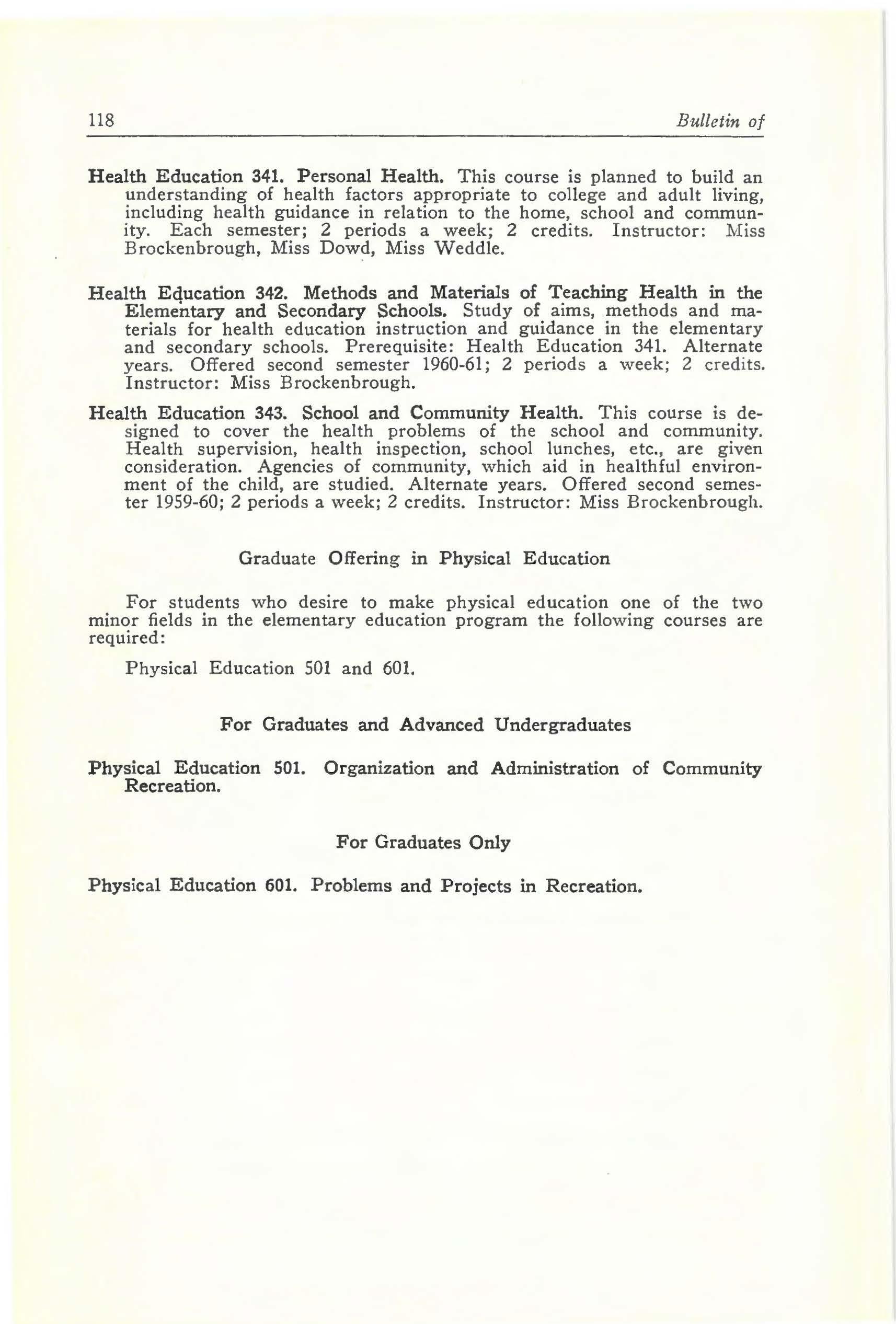
Health Education 343. School and Community Health. This course is designed to cover the health problems of the school and community. Health supervision, health inspection, school lunches, etc. , are given consideration. Agencies of community, which aid in healthful environment of the child, are studied. Alternate years. Offered second semester 1959-60; 2 periods a week; 2 credits. Instructor: Miss Brockenbrough.
For students who desire to make physical education one of the two minor fields in the elementary education program the following courses are required:
Physical Education 501 and 601.
Physical Education 501. Organization and Administration of Community Recreation.
Physical Education 601. Problems and Projects in Recreation.
The Alumnae Association serves both the College and its former students. It keeps the alumnae informed of, the activities of the College and keeps the College informed as to the problems and needs of the alumnae. The Association is a kind of clearing house through which the alumnae and the College can work together to their mutual benefit. It also serves to keep former students of the College interested in one another by organizing them into local associations and bringing them back to the College on special occasions.
The Association operates in many ways. It keeps a record of former students, holds reunions, aids worthy students through the Fraser Memorial Loan Fund, Cunningham Memorial Loan Fund, J. L. Jarman Loan Fund, Mary White Cox Memorial Loan Fund, and Jennie Masters Tabb Memorial Fund, and organizes local chapters of alumnae in counties and cities. It makes available the College news through The Rotunda, the weekly publication of the College, and the Alumnae Magazine, and brings to the attention of the College the achievements and needs of individual alumnae. It holds an annual meeting at the College on Founders Day in March.

DR. FRANCIS G. LANKFORD, JR., President, Longwood College, Farmville, Virginia.
DR. DABNEY S. LANCASTER, President-Emeritus, Longwood College, Farmville, Virginia.
President: Miss Elsie C. Stossel, 3105 W. Grace St., Richmond, Va. Executive Secretary and Treasurer• Mrs. Elizabeth Shipplett Jones, Sheppards, Virginia. ·
Alitmnae House Chairman: Mrs. Nora Jones Heizer
Miss ANN BRIERLEY, Richmond
MRS. FRANCES SALE LYLE, Danville
MRS. BETTY DAVIS EDWARDS, WinchesterMRs. NANCY HARI''SON McLAUGHLIN, Miss JOAN HARVEY, Appomattox Woodbury Forest
Miss Jo HrLLSMAN, Martinsville
Miss ROSEMARY HOWELL, Richmond
MISS MARIA JACKSON, Richmond
Miss EMILY JOHNSON, Arlington
MRS. PAT TUGGLE MILLER, Ellerson
MRS. VIRGINIA McLEAN PHARR, Richmond
Miss SAMMY Scarr, Tazewell
MRS. FRANCIS B. SIMK!NS, Farmville
MRS. THELDERT M. TRENT, Appomattox, Va.
MRS. R.H. MARCUSON, 1713 Glen Ridge Rd., Baltimore 12, Md.
MRS. JAMES McDONALD GRAYSON, Roanoke St., Blacksburg, Va.
MRS. C. M. QUILLEN, JR., 1108 Euclid Ave., Bristol, Va.
MRS. H. M. IRWIN, 1654 Sterling Rd., Charlotte, N. C.
Miss ELLEN MINOR JONES, Clifton Forge, Va.
MRS KENT EvANS, 327 Hawthorne St., Covington, Va.
Mrss MARY GEORGE BOLEN, Culpeper, Va.
Mrss MARIAN LEE HEARD, 220 Robertson Ave., Danville, Va.
MRS. J.C. WATKINS, 304 Battery Ave., Emporia, Va.
MRS. CLIFFORD NOTTI NGHAM, Exmore, Va.
MRS. ROBERT T. JEROME, 1403 Farm Hill Circle, Falls Church, Va.
MRS. A. M. DEMUTH, Farmville, Va.
Mrss BARBARA Scorr, Box 13, Fishersville, Va. (Staunton)
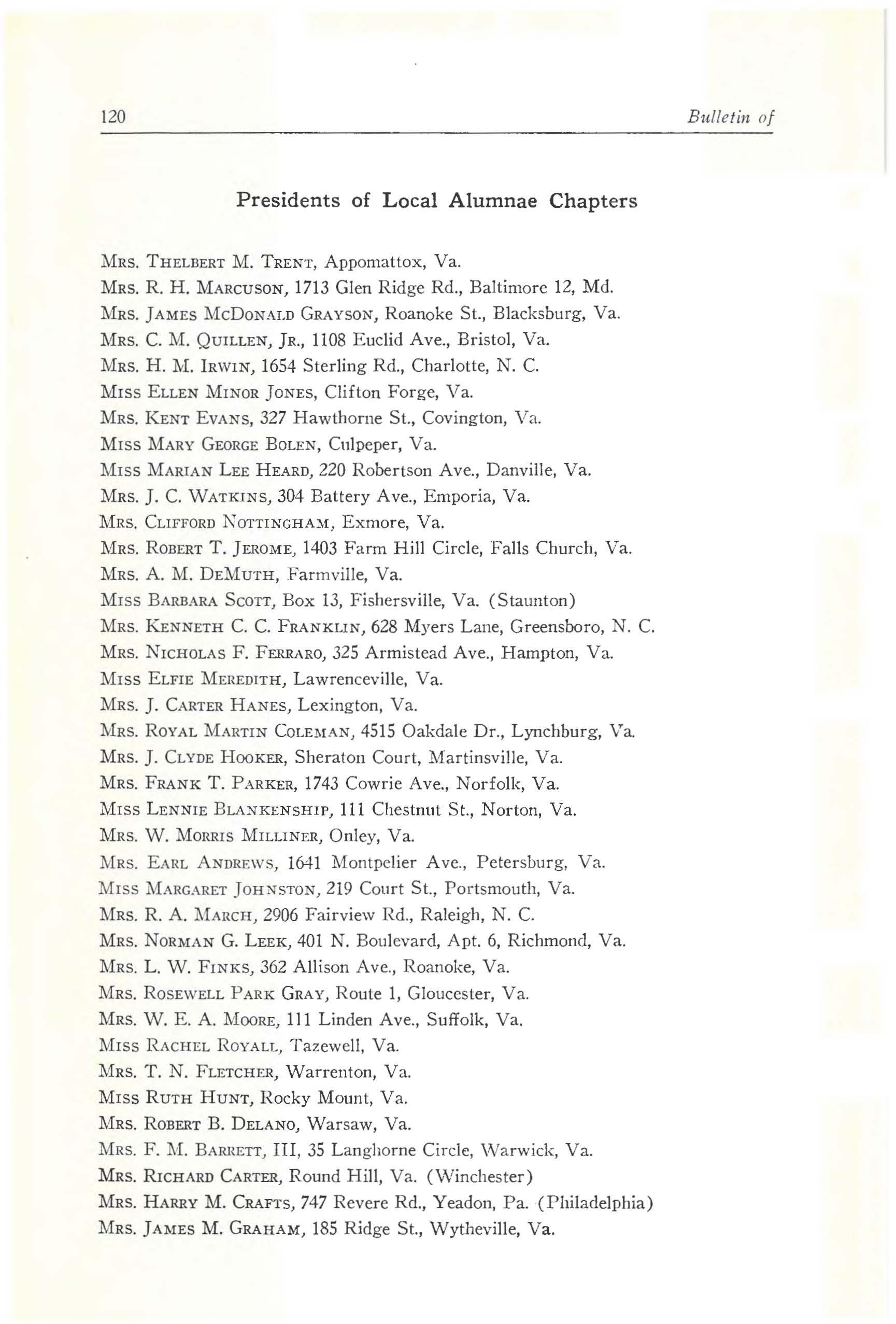
MRS. KENNETH C. C. FRANKLIN, 628 M yers Lane, Greensboro, N. C.
MRS. NICHOLAS F. FERRARO, 325 Armistead Ave., Hampton, Va
Miss ELFIE MEREDITH, Lawren cev ille, Va.
MRs. J. CARTER HANES, Lexin gto n, Va.
MRS. ROYAL MARTIN COLEMAN, 4515 Oakdale Dr., Lynchburg, Va.
MRS. J. CLYDE HOOKER, Sheraton Court, Martinsville, Va.
MRS. FRANK T. PARKER, 1743 Cowrie Ave., Norfolk, Va.
Mrss LENNIE BLANKE NSHIP, 111 Chestnut St., Norton, Va.
MRS. W. MORRIS MILLINER, Onley, Va.
MRS. EARL ANDREWS, 1641 Montpelier Ave., Petersburg, Va.
MISS MARGARET JOHNSTON, 219 Court St., Portsmouth, Va.
MRS. R. A. MARCH, 2906 Fairview Rd., Raleigh, N. C.
MRS. NORMAN G. LEEK, 401 N. Boulevard, Apt. 6, Richmond, Va.
MRS. L. W. FINKS, 362 Allison Ave., Roanoke, Va.
MRS. RosEWELL PARK GRAY, Route 1, Gloucester, Va.
MRS. W. E. A. MOORE, 111 Linden Ave., Suffolk, Va.
Miss RACHEL R OY ALL, Tazewell, Va.
MRS. T. N. FLETCHER, Warrenton, Va.
Miss RuTH HUNT, Rocky Mount, Va.
MRS. ROBERT B. DELANO, Warsaw, Va.
MRS. F. lvI. BARRETT, III, 35 Lan ghorne Circle, \V arwick , Va.
MRS. RICHARD CARTER, Round Hill, Va. (Winchester)
MRS. HARRY M. CRAFTS, 747 Revere Rd., Yeadon, Pa. (Philadelphia)
]\fas. JAMES M. GRAHAM, 185 Ridge St., Wytheville, Va.
Total Enrollment . . . . . . . . . . . . . . . . . . . . . . . . . . . . . . . . . . . . . . . 1,427
SUMMER SESSION, 1958 SESSION, 1958-59 (oN NOVEMBER 1, 1958)
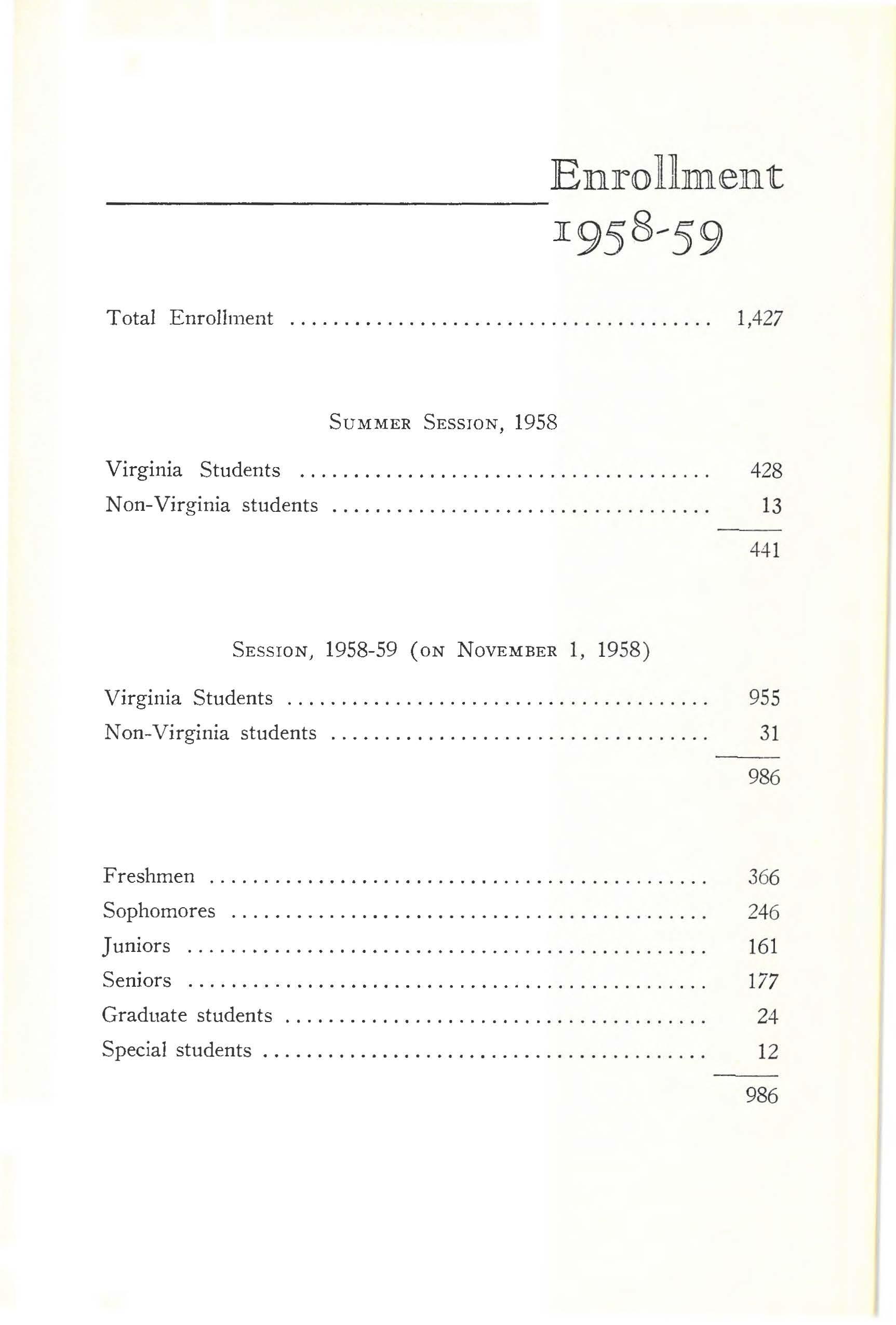
428 13 441 Virginia Students 95 5 Non-Virginia students 31 986 Freshmen . . . . . . . . . . . . . . . . . . . . . . . . . . . . . . . . . . . . . . . . . . . . . . 366 Sophomores 246 Juniors . . . . . . . . . . . . . . . . . . . . . . . . . . . . . . . . . . . . . . . . . . . . . . . . 161 Seniors . . . . . . . . . . . . . . . . . . . . . . . . . . . . . . . . . . . . . . . . . . . . . . . . 177 Graduate students 24 Special students . . . . . . . . . . . . . . . . . . . . . . . . . . . . . . . . . . . . . . . . . 12 986
Virginia Students Non- Virginia students
Absences Page 50
Academic and profe s sio nal life 32
Academic honors . . . . . . . . . . . . . . 53
Academic regulations . . . . . . . . . . 48
Accreditation . . . . . . . . . . . . . . . 1, 23
Adjustments in curriculum requirements . .. . . .. . .. .. ... .
Administrative offic e rs . ...... . .
Administrative offices .. ... .. .. .
Admiss ion r e quirement s . ... ... .
Advanced standing ..... . . .. .. .
49 6 19 2 5 50
Alumnae Associat ion . . . . . . . . . . . 119
Application blank . . ..... .. .. . .. 127
Application fee . . . . . . . . . . . . . . . . 40
Art . . . . . . . . . . . . . . . . . . . . . . . . . . . 76
Athletic Association . . . . . . . . . . . 35 Athletic facilities 20
A u ditoriums . . . . . . . . . . . . . . . . . . . 20
Auditor's fee 40
Band 37 , 109
Biology . ... ... . .. .. ..... . . . ... . . 111
Board, room, laundry, fees . . . . . 39
Book Shop . . . . . . . . . . . . . . . . . . . . 19
Busin e ss education . . . . . . . . . . . . . 78
Ca l endar, 1959-60 session . . . . . 2 , 3
Can1pus 19
Campus Bank 42
Changes in requirements 56
Chemistry 112
Choir and Chorus . . . . . . . . . . . . 37, 109
Class attendance 50
Class rooms 19 College year 23 Course change s . . . . . . . . . . . . . . . . 48
Course numbers Credits
Cultural , social and
Page 48 48 recreational life 31 Day students 39 D epartment s of instruction . . . . . . 75
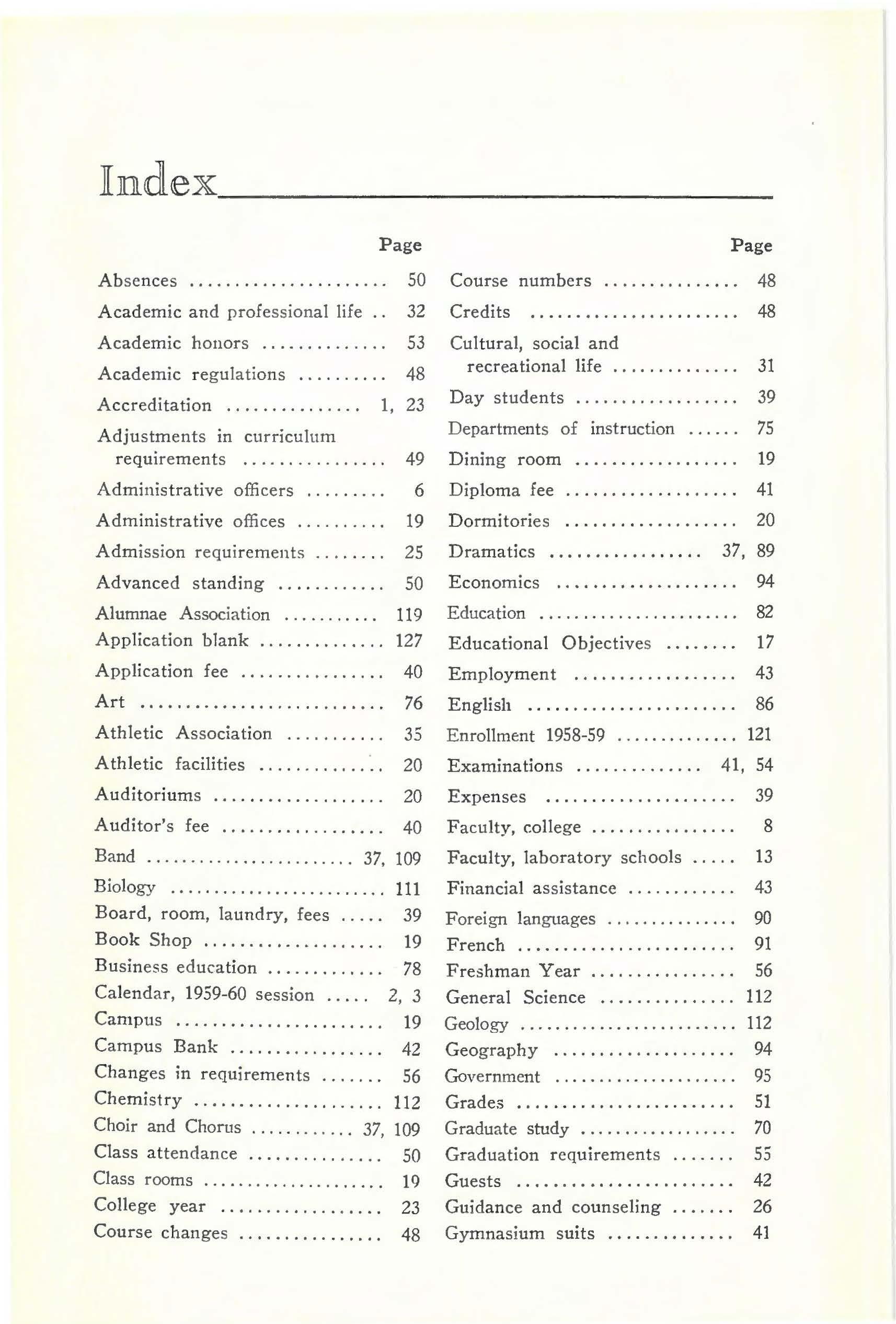
Dining room ................. . Diploma fee 19 41 Dormitorie s Dramatics Economics
20 . . . . . . . . . . . . . . . . . 37, 89 94 Education . . . . . . . . . . . . . . . . . . . . . . . 82
Educational Objective s 17 Employment . . . . . . . . . . . . . . . . . . 43 English 86 Enrollment 1958-59 121 Examinations 41, 54 Expenses
Faculty, college .. . .... . . . ..... .
39 8 Faculty, laboratory schools 13 Financial assistance . . . . . . . . . . . . 43
Foreign languages . . . . . . . . . . . . . . . 90 French 91 Freshman Year 56 General Science 112 Geology 112 Geography . . . . . . . . . . . . . . . . . . . . 94
Gov e rnment . . . . . . . . . . . . . . . . . . . . . 95 Grades 51 Gradu a te study 70 Graduation r e quirement s 55 Guests . . . . . . . . . . . . . . . . . . . . . . . . 42
Guidance and counseling . . . . . . . 26 Gymnasium suits 41
Longwood College
Health service
Page 27 Philosophy

123 Page 84
History and social sciences 92 Physical and health education 114
History of the college 17 Physics 113
Home economics 97 Placement service 29
Horne management house . . . . . . 21
Honor Code 34 Honor societies 35
Honor courses . . . . . . . . . . . . . . . . . . . 75 House Council 34 Infirmary 20 Institute of Southern Culture . . . 32 Laboratories 21 Laboratory schools 23 Latin 92 Laundry . . . . . . . . . . . . . . . . . . . . . . 22
Liberal arts . . . . . . . . . . . . . . . . . . . 65, 66 Library . . . . . . . . . . . . . . . . . . . . . . . 20
Library science Library service Loan funds
100 28 45
Location of college 19 Mathematics ...... .............. . 101
Moral and religious life . . . . . . . . 30 Music ........................... 104 Music fees . . . . . . . . . . . . . . . . . . . . 40
Music building Natural sciences ... . .... . ....... . Nursing ...................... .
21 110 68
Orchestra 37, 109 Organizations . . . . . . . . . . . . . . . . . 33
Out-of-state students . . . . . . . . . . 39
Payments 41 Phases of College Life 30
Post office 19
Prerequisite s for student teaching 53
Programs of study . . . . . . . . . . . . . 57 Psychology . . . . . . . . . . . . . . . . . . . 83 Publication s . . . . . . . . . . . . . . . . . . . 38
Quality credits 52 Recreation centers 22 Refunds . . . . . . . . . . . . . . . . . . . . . . . 41
Repetition of courses 54 Scholarships 43
Science Laboratorie s . . . . . . . . . . . 21
Secretarial work . . . . . . . . . . . . 67, 78
Social regulations ............. . Sociology Sororities
33 96 37 Spanish . . . . . . . . . . . . . . . . . . . . . . . . . 91 Speech 89 State Board of Education 5
Student activity centers 20 Student Government Association 33
Student life on the campus . . . . . 30
Student load 48
Student organizations . . . . . . . . . . . . 33
Student per so nnel program 25 Student teaching . . . . . . . . . . . . . . 53, 84 Tearoom . . . . . . . . . . . . . . . . . . . . . . 22
Transfer of credits ............. 54, 70 Y. W. C. A ................... 35
Communications relative to general college policies should be addressed to the President of the College.

Applications for admission, inquiries regarding scholarships, loan funds, and selfhelp, and requests for summer and regular session catalogues should be addressed to the Dean of the College.
Requests for specific information about courses and curricula and for evaluation of credits should be addressed to the Executive Secretary.
Requests for information about the Graduate Program should be addressed to the Dean of the College.
Requests for credits and transcripts of records should be addressed to the Registrar.
Remittances and correspondence relating to students' accounts should be addressed to the Business Manager. Checks should be made payable to Longwood College.
Requests for information about dormitories and social regulations should be addressed to the Dean of Women.


Date______________
Name (print) ____________ first middle last Street or R. F. D, _________________________ Town or City_______________Stat."----------Ag,.,_______ Se.~------- Rae,,_________
Name of parent or guardian_____________________
Name and address of high school from which you have been or will be graduated
Date of graduation from high schoo,._________-'-,ames and addresses of colleges you have attende'-'---------------------(over)

1. Fill out the preliminary application above and mail it to the Dean of the College, Longwood College, Farmville, Virginia.
2. Submit with the application an application fee of ten dollars. Send check or money order made payable to Longwood College. DO NOT send cash.
3. If you have attended any other college or university, request that the registrar of that institution send an official transcript of your record.
4. When the College receives the preliminary application, a detailed application blank will be mailed to you. This must be filled out and returned before the Committee on Admissions can begin its consideration of your application.
Will you be a boarding student?
Date that you wish to enter
Remarks
Your signature ________________________
In addition to the publications listed inside the front cover, Longwood College has the following publications which may be obtained by writing to the Director of Public Relations.
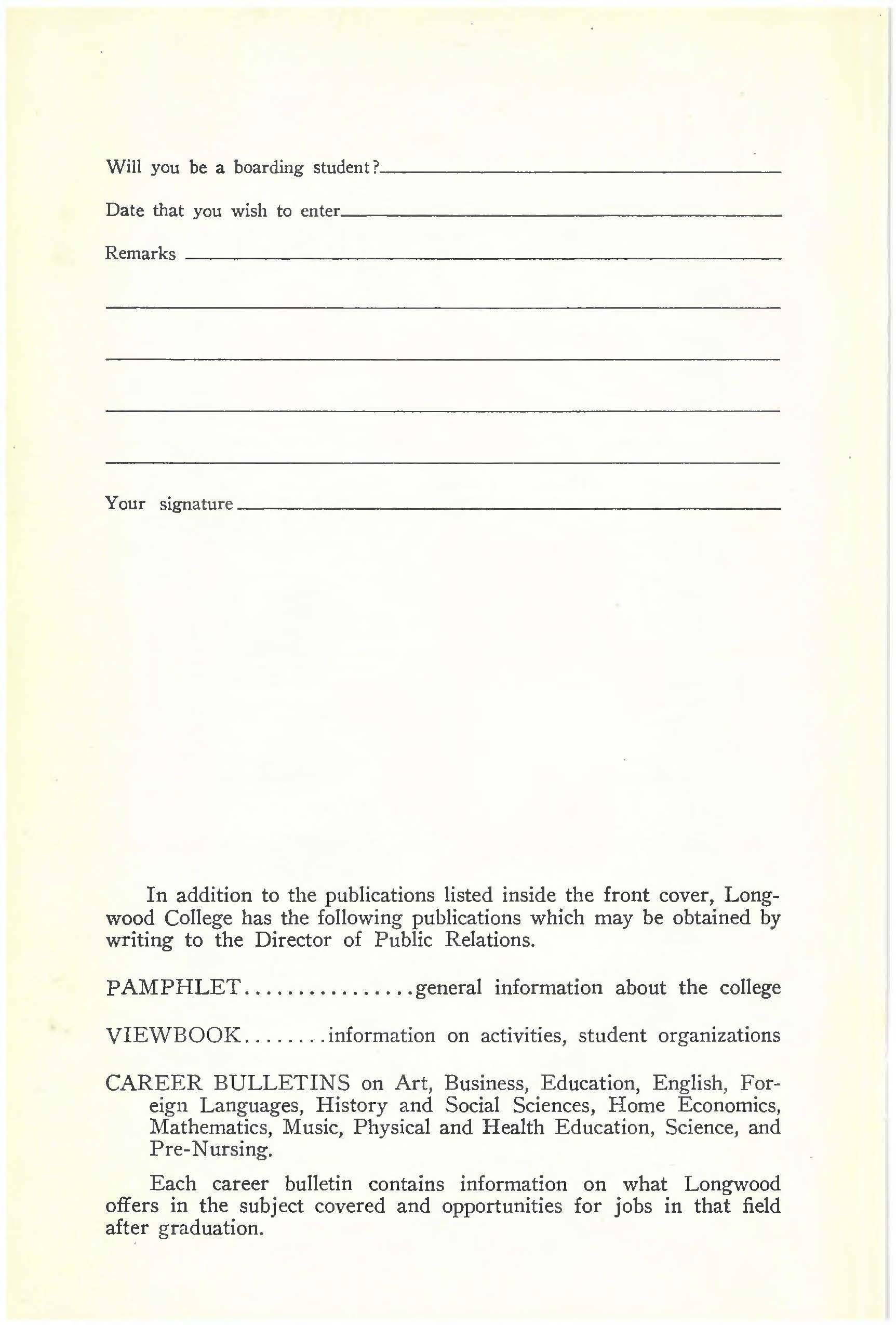
PAMPHLET ................ general information about the college
VIEWBOOK ........ information on activities, student organizations
CAREER BULLETINS on Art, Business, Education, English , Foreign Languages, History and Social Sciences, Home Economics, Mathematics, Music, Physical and Health Education, Science, and Pre-Nursing.
Each career bulletin contains information on what Longwood offers in the subject covered and opportunities for jobs in that field after graduation.

